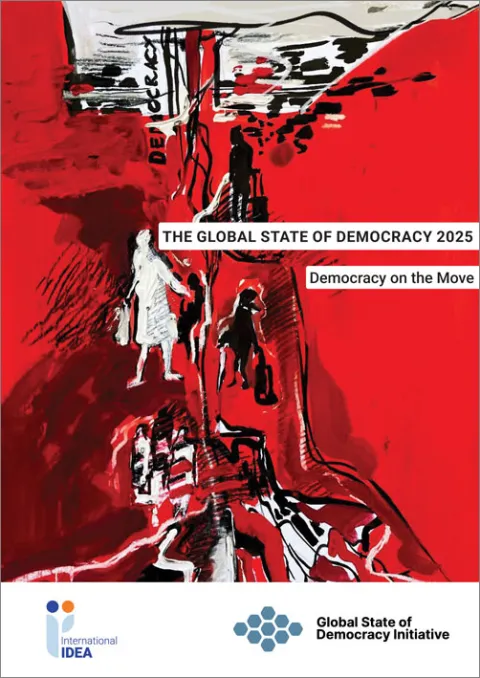
The Global State of Democracy 2025
Democracy on the Move
When I wrote in The Economist at the start of 2024 about the challenges for democracy from mounting global uncertainty, I did not know the extent to which this would bear out over the year. In the following months, political developments in the United States highlighted a trend of democratic slippage in new forms and places, while conflict and insecurity shifted policy and funding priorities in ways that put democracy—and democracy support—into ever greater jeopardy. Today, the state and fate of democracy in the world is perhaps more uncertain than it has been in our lifetimes.
In addition to this macro trend, this year’s Global State of Democracy report reveals democratic instability at a thematic level. Representation is the strongest aspect of democracy overall, according to International IDEA’s indices. Yet, amid an unprecedented 74 national elections in 2024, Representation scores collapsed to their worst level in over 20 years, with seven times more countries declining than advancing. Meanwhile, Rule of Law—the weakest overall performer—fell most strikingly in Europe, where performance has been historically robust. Only Participation scores stayed relatively constant, confirming our previous findings that much of democracy’s lingering resilience comes from civic engagement, including in regions suffering deterioration in other aspects of democracy.
If this age of radical uncertainty is visible in the data, it is felt in human lives. This is certainly true with respect to where people live and what it means for them to live there. More than 300 million people now reside outside the country of their birth, a figure that has tripled since the 1970s, modestly outpacing total population growth. The political inclusion or exclusion of these people in their countries of citizenship reflects important questions—both philosophical and practical—about national belonging and civil rights in a modern democracy. Current migration trends render those questions unavoidable for democracies around the world.
To shed some light on these issues, the second part of this report focuses on the topic of voting rights for citizens living abroad. Leveraging our Institute’s global expertise at the nexus of electoral processes and democracy assessment, the report finds that expanding political participation—such as through effective enfranchisement of out-of-country voters—supports democratic resilience in both the home and host countries. However, the report also documents inconsistencies in data collection and vote administration for out-of-country electorates, calling attention to the need for further research and refinement of electoral mechanisms for this growing group of eligible voters.
Amid all the changes and challenges in the world, our Institute must constantly evaluate whether our indicators and analysis reflect the full spectrum of democratic principles. As I write this preface, the heart-wrenching crisis in Gaza continues. In the two years since Hamas’ horrific mass murder and hostage-taking, Israel’s war in Gaza has killed tens of thousands of innocent people, displaced most of the population, and destroyed nearly every livelihood. Israel is a mid-to-high performing democracy across all our categories, albeit one that has, like many others, suffered some recent declines. That is what this report shows. What the report does not show—what our current methodology cannot show—is that Israel’s war and occupation represent a systematic and brutal assault on Rights, Representation, Rule of Law and Participation in Palestine. Nor does the report show that, on a daily basis, in broad daylight, the authorities of a democratic nation appear to be perpetrating gross violations of international human rights laws in another jurisdiction, as stated by numerous human rights organizations from around the world, a panel of independent United Nations experts, and the International Court of Justice. Such behaviour debases norms designed to protect the values that lie at the heart of the democratic system. Every country has the right to defend itself, but not at the price of making a mockery of international law and democratic principles. While not unique, the case of Israel raises serious, global questions about what it means to be a democracy, and whether the duties of democracy extend beyond borders. Those questions will not be answered in this report, but our Institute is committed to examining them in the months and years ahead.
International IDEA’s guiding vision is a world in which everyone lives in inclusive and resilient democracies. This report is about how democracy is faring to this end—and what might be done, in ways big and small, to bring us closer.
Dr Kevin Casas-Zamora
Secretary-General, International IDEA
The findings of the 2025 Global State of Democracy (GSoD) report underscore the current global climate of radical uncertainty, exemplified by political developments in the United States that are shaking long-held assumptions about democratic resilience and multilateralism.
The events in the United States are not happening in a vacuum, as global patterns show that democracy around the world continues to weaken. In 2024, 94 countries—representing 54 per cent of all countries assessed—suffered a decline in at least one factor of democratic performance compared with their own performance five years earlier. In contrast, only 55 countries (32 per cent) advanced in at least one factor over that period.
The GSoD Indices are organized around four core categories of democratic performance—Representation, Rights, Rule of Law and Participation. Each of the four categories includes several factors, such as Credible Elections or Judicial Independence. Among the four categories, performance was strongest overall in Representation, with 47 countries (27 per cent) achieving high scores in 2024. However, in the 2024 electoral super-cycle year, the global score for Representation fell to its lowest level since 2001, with seven times more countries declining than advancing. These declines occurred around the world in both low- and high-performing democracies. Rule of Law continues to be the category with the weakest performance. In 2024, 71 countries (41 per cent) were categorized as low-performing. The highest number of aggregate-level declines also occurred in the Rule of Law category; 32 countries (19 per cent of those assessed, and most low- or mid-range-performing) registered downturns in this category in 2024. European countries accounted for 38 per cent of these downturns, followed by countries in Africa, the Americas, Asia and the Pacific, and West Asia. Declines within the Rule of Law category were most concentrated in the factor of Judicial Independence.
Within the Rights category, the most extensive global decline occurred in Freedom of the Press, followed by Freedom of Expression, Economic Equality and Access to Justice. Performance in Freedom of the Press declined in 43 countries, nearly one quarter (24.9 per cent) of those covered. This marks the broadest decline in this factor since the beginning of our data set (1975), signalling a serious threat to public accountability and informed political participation.
Participation remained relatively stable, with only 11 countries experiencing notable changes when comparing 2024 to 2019. Declines (9 countries) outweighed advances (2 countries), with most of the declines occurring in countries that were already low-performing, including Afghanistan, the Central African Republic, Kuwait, Myanmar, Nicaragua and Russia. The two countries that improved were Brazil and Fiji, both high performers in this category.
The second part of this document discusses the intersection of global migration flows and their relationship to democracy and democratic institutions. Migration now affects a growing share of the world’s population, with 304 million people (or 3.7 per cent of the global population) living outside their country of birth in 2025. Contrary to some popular narratives, most of the people who leave their country of birth move to a neighbouring country or stay within their region.Global migration has emerged as a key factor contributing to the current climate of uncertainty, raising complex questions about citizenship, belonging, the universality and equality of rights, and what it means to be an inclusive democracy today.
Building on trends identified in the GSoD Indices and in the Democracy Tracker, this report focuses on the technical, legal and institutional dimensions of voting rights for citizens residing abroad. We find that expanding political participation contributes to democratic resilience, and that out-of-country voting (OCV) contributes to the sense of belonging that fosters this resilience. Benefits can accrue to both home and host countries, including by spreading democratic norms across borders. However, data collected for this report show that diaspora turnout rates are relatively low, and the information that is publicly available about eligible diaspora voters is limited and uneven. While there is no one-size-fits-all OCV model, we know that the legal and administrative design of OCV systems strongly affects participation rates, and broad-based enfranchisement requires carefully designed policies—for both registration and encouraging turnout. To persevere, democracy requires patience, maintenance and, at times, reinvention. The work of democracy is never finished: as the scale and patterns of migration evolve, democracies will have to maintain and regularly re-evaluate institutional frameworks, including, as noted here, the meaning, boundaries and mechanisms of involving non-resident citizens in political decision making.
Data sources
The Global State of Democracy (GSoD) report, the flagship publication of the International Institute for Democracy and Electoral Assistance (International IDEA), provides annual analysis of democratization across the globe.
Version 9 of the GSoD Indices, a quantitative data set, provides the majority of the data on which this report is based (unless otherwise stated). The Indices measure national performance across discrete areas of democracy, broadly understood as a system in which there is public control over decision making and decision makers, and in which there is equality in the exercise of that control. While this report refers to the five-year period from 2019 through December 2024, the complete data set covers the years 1975–2024 (International IDEA n.d.e).
The Indices employ a hierarchical conceptual framework oriented around four core categories of democratic performance: Representation, Rights, Rule of Law and Participation (see Figure 0.1). Each category is subdivided into factors (such as Credible Elections or Judicial Independence) and subfactors (such as Freedom of Expression or Social Group Equality).
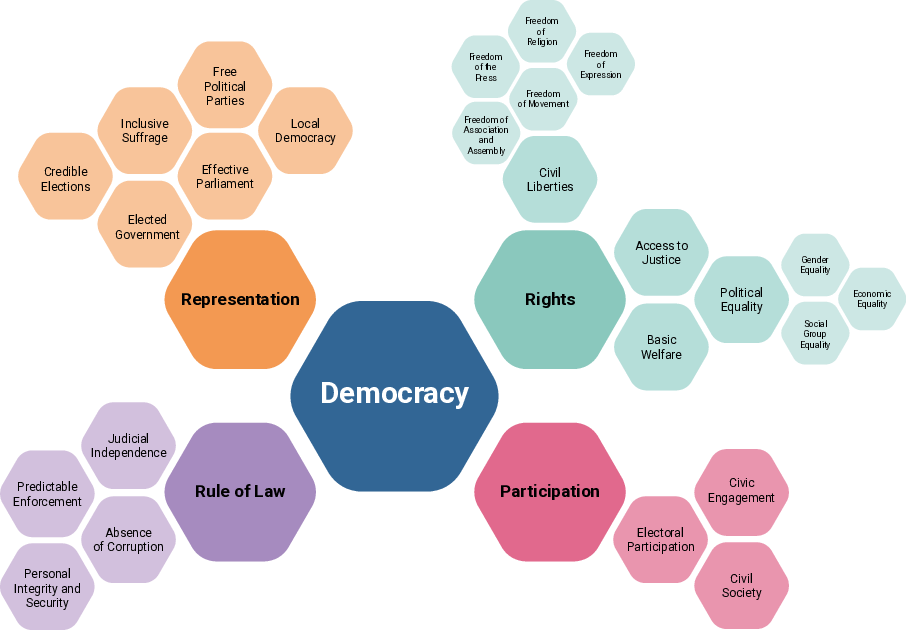
The GSoD Indices aggregate indicators from 22 data sources (see Box 0.1), which include observational data from United Nations agencies, expert-coded data from academic programmes and some data collected directly by International IDEA. The Indices are based on a total of 154 indicators. The result is a collection of 1,676,362 data points collected on 174 countries1 over 50 years.
Box 0.1. The Global State of Democracy Indices: Source data sets
| Data set | Data provider | Reference |
|---|---|---|
| Bertelsmann Stiftung’s Transformation Index (BTI) | Bertelsmann Stiftung | <https://bti-project.org> |
| Bjørnskov-Rode Regime Data (BRRD) | Bjørnskov and Rode | <https://sites.google.com/unav.es/martin-rode/home/data> |
| Child Mortality Estimates (CME) | UN Inter-agency Group for Child Mortality Estimation | <https://childmortality.org> |
| Civil Liberties Dataset (CLD) | Møller and Skaaning | <https://doi.org/10.7910/DVN/0TKJWX> |
| Food and Agricultural Organization of the United Nations (FAO) Food Balances | Food and Agricultural Organization of the United Nations (FAO) | <https://www.fao.org/faostat/en/#data/FBS> |
| Freedom in the World | Freedom House | <https://freedomhouse.org/report/freedom-world> |
| Freedom on the Net | Freedom House | <https://freedomhouse.org/report/freedom-net> |
| Global Educational Attainment Distributions | Institute for Health Metrics and Evaluation (IHME) | <https://ghdx.healthdata.org/record/ihme-data/global-educational-attainment-distributions-1970-2030> |
| Global Findex Database | World Bank | <https://data.worldbank.org> |
| Global Gender Gap Report | World Economic Forum | <https://www.weforum.org/publications/global-gender-gap-report-2024> |
| Global Health Observatory | World Health Organization (WHO) | <https://www.who.int/data/gho/data/themes/topics/indicator-groups/indicator-group-details/GHO> |
| Global Media Freedom Dataset (MFD) | Whitten-Woodring and Van Belle | <https://faculty.uml.edu//Jenifer_whittenwoodring/MediaFreedomData_000.aspx> |
| ILOSTAT | International Labour Organization (ILO), Department of Statistics | <https://ilostat.ilo.org> |
| International Country Risk Guide (ICRG) | Political Risk Services | <http://epub.prsgroup.com/products/icrg> |
| Lexical Index of Electoral Democracy (LIED) | Skaaning, Gerring and Bartusevičius | <https://doi.org/10.7910/DVN/WPKNIT> |
| Political Terror Scale (PTS) | Gibney, Cornett, Wood, Haschke, Arnon and Pisanò | <http://www.politicalterrorscale.org> |
| Polity5 | Marshall, Jaggers and Gurr | <http://www.systemicpeace.org/inscrdata.html> |
| Standardized World Income Inequality Database (SWIID) | Solt | <https://fsolt.org/swiid> |
| United Nations E-Government Survey | UN Department of Economic and Social Affairs | <https://publicadministration.un.org/egovkb/en-us/Reports/UN-E-Government-Survey-2024> |
| Varieties of Democracy data set | V-Dem Project | <https://www.v-dem.net> |
| Voter Turnout Database | International IDEA | <https://www.idea.int/data-tools/data/voter-turnout> |
| World Population Prospects (WPP) | UN Department of Economic and Social Affairs Population Division | <https://population.un.org/wpp> |
A complementary source of evidence for this report is International IDEA’s Democracy Tracker, a qualitative data set that provides event-centric information on democracy developments in 173 countries, with a data series beginning in August 2022 and updated every month after that. The Tracker reports democracy-related developments that may signal significant advances or declines in a country’s democratic performance in a particular month, and monitors developing events that could signal that such a change is very likely in the next year (International IDEA 2025h). The Tracker has enabled this edition of the GSoD report to reflect key democratic trends through June 2025, offering additional depth to country-specific discussions, including cases where notable developments occurred after the December 2024 cut-off for the GSoD Indices data.
Some country examples featured in the report, such as those from the USA, are included based on the relevance of their democratic developments to broader regional or global patterns. The Tracker ensures that these examples are evidence-based and grounded in recent developments.
In addition to data, the report also draws on the subject matter and regional expertise of International IDEA’s staff at the Institute’s headquarters in Sweden, as well as the work of staff at regional and country offices across Africa and West Asia, the Americas, Asia and the Pacific, and Europe. The insights of International IDEA staff who are closely involved in democracy-building efforts help to contextualize the data and identify critical trends as they unfold.
Structure and approach of the report
This year’s report begins with a broad overview of trends at the global level, shining a light on the aspects of democracy that experienced the most change—positive and negative—comparing 2024 to 2019. Specifically, Part 1 of the report provides a description of what has changed within each category of democratic performance—Representation, Rights, Rule of Law and Participation. It uses country cases2 to draw out illustrative examples and highlight noticeable patterns. These descriptions are meant to serve not as exhaustive lists of the events that are driving change but as illustrations of the kinds of developments that explain what the data reflect. In most cases, the analysis illustrates advances and declines by referencing statistically significant changes that have occurred in comparison with five years earlier. When that is not the case, the specific interval is referenced.
Quantitative scores from the GSoD Indices for each category, factor and subfactor are also categorized into levels of performance. All the indices at the different levels have been normalized to range from 0 (lowest achievement) to 1 (highest achievement). If a country’s score exceeds 0.7, its performance is labelled ‘high’. Scores below 0.4 correspond to ‘low’ performance. Scores between 0.4 and 0.7 classify a country’s performance as ‘mid-range’.
Several countries currently experiencing armed conflict or war—such as Haiti, Palestine3, Sudan and Ukraine—have suffered declines in their democratic performance. These declines are closely linked to institutional disruption, political instability and deteriorating security conditions. The complexity and fluidity of such conflict-affected environments mean that existing democratic indices may not fully capture the on-the-ground realities. Further research is warranted to better understand how armed-conflict dynamics interact with democratic resilience or declines, and to assess the methodological limits of measuring democracy in such contexts.
In response to growing global migration and a resurgence of inward-looking policies, Part 2 of the report focuses on demonstrating why and how democracies can lead the way in responding to a world on the move. It explains how democracies and countries with democratic aspirations can foster inclusion by helping to facilitate political participation for non-resident nationals. This section of the report also includes a set of guiding questions for policymakers who are considering how to craft out-of-country voting policies in line with democratic values.
The first half of 2025 underscored the extent to which radical uncertainty remains a defining feature of the global context. The return of Donald Trump to the US presidency reflects this volatility, contributing to the erosion of long-held assumptions across multiple domains—from the economic impacts of tariffs, to the authority of supranational institutions responsible for protecting global peace and stability, to the inviolability of international borders among liberal democracies.
For actors genuinely concerned about democratic principles, recent developments have raised serious concerns about the state of global democracy. The USA—a country long regarded as a leading advocate for democracy worldwide—has, in 2025, significantly reduced both its diplomatic engagement and its financial support for international democracy assistance. These developments have contributed to a weakening of international democratization efforts. In less than six months, US domestic political institutions have also lost much of their symbolic sheen, increasingly serving as a reference point for executive overreach and offering more encouragement to populist strongman leaders than to pro-democracy hopefuls.
Between January and April 2025, International IDEA issued 20 alerts (twice as many as in any of the previous two full years), documenting instances in which the US Government has eroded and abolished the rules, institutions and norms that have shaped US democracy (International IDEA n.d.c). Examples include efforts to restrict academic freedom, criminalize protest activity, question the legitimacy of certified elections, selectively restrict media access to the executive and circumvent due process norms.
These developments have not yet been captured in full by the GSoD Indices due to the time lag, but they are well documented in the Democracy Tracker and illustrate a rapid rate of change. Some observers have described these developments as a ‘presidential coup’ in the USA, warning that the country lies at the ‘cusp of autocracy’ (Center for Systemic Peace n.d.).
While these recent developments have raised alarms in many quarters, some academic analysts and civil society actors see the US case as a reminder of the danger inherent in assuming that the work of democracy is ever done. The political scientist Adam Przeworski (2025), for example, noted that, in apparent contradiction to decades of accepted wisdom, the combination of wealth and a history of peaceful political transitions may foster a false perception of democratic consolidation. This, in turn, can lead to reduced vigilance against authoritarianism and weaker societal resistance to democratic erosion.
Perspectives outside the Western democratic tradition have often been more measured, with some observers identifying the current moment as an opportunity for new voices, perspectives and influences on the shape of democracy—perhaps even the chance for a post-liberal model with resonance in regions beyond the West (Koelble and Lipuma 2008; Schmitter 2018). The domino effect of US developments—particularly the deprioritization of democracy promotion in parts of Europe (Carothers and Stuenkel 2025; Farinha 2025; Youngs 2025)—has also elicited renewed interest in democratic resilience (Raad van State 2024; Council of the European Union 2025)—the idea that democratic systems are uniquely equipped to weather crises, uncertainty and change.
1.1. Migration, inclusion and democracy
Global migration has emerged as a key factor contributing to the current climate of uncertainty (Casas Zamora 2024), raising complex questions about citizenship, belonging, the universality and equality of rights, and what it means to be an inclusive, resilient democracy today. The scale of migration continues to grow, with the latest data showing that 304 million people are international migrants—three times the estimate in 1970. Today, this figure represents 3.7 per cent of the world’s population (UNDESA 2025).
Figure 1.1 uses 2024 data from the UN Department of Economic and Social Affairs (UNDESA) to illustrate global migration patterns, with regions defined according to the GSoD framework. Contrary to many commonly held assumptions, the data show that most migration happens within, not between, regions. This pattern is particularly evident in the strong inward and outward flows (originating from the base), within each region, shown as wide colour-coded bands anchored at the regional bases. For example, the flow from Africa to Europe includes a purple band marked with blue on the outer rim of the circle, indicating migrants moving from Africa to Europe—yet this is just a fraction compared with the populations migrating within either region. Neighbouring bars at the European base show migrants arriving from the Americas (green), Asia and the Pacific (red), West Asia (gold) and Europe itself (purple).
Data from the International Organization for Migration listing the world’s top five country-to-country migration corridors (as of 2024) confirm this trend. All five corridors are intraregional or between neighbouring countries: (a) Mexico to the USA; (b) Syria to Turkey; (c) Ukraine to Russia; (d) India to the United Arab Emirates; and (e) Russia to Ukraine (McAuliffe and Oucho 2024; note that the data reflect total numbers of migrants regardless of the cause of movement).
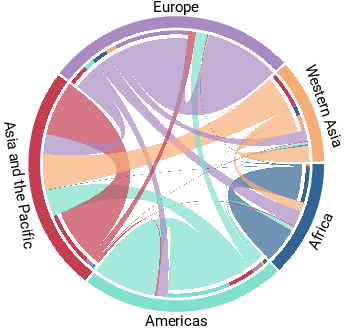
Although migration has significant implications for democracy, some of the most well-known democracy assessment frameworks (such as those by Freedom House, International IDEA and V-Dem) do not have specific indicators that systematically measure how institutions include or exclude immigrants and emigrants (as distinct from resident citizens). As a result, migration-related problems are not reflected in quantitative measures of democracy such as the GSoD Indices. However, these issues are conceptually part of the broader GSoD Indices’ Social Group Equality subfactor, which measures inequality across social class and identity group, especially in terms of civil liberties and access to political power. It also tracks socio-economic and urban–rural exclusion. Since many migrants face more than one kind of disadvantage, looking at how countries perform on broader inclusion measures—like Social Group Equality—can help us understand how migration and democracy are connected. This link is explored further in Part 2 of this year’s report.
There was very little overall change in global terms in the Social Group Equality factor (comparing scores in 2024 to 2019). Where shifts did occur, they were predominantly negative. Only two countries (Moldova and Montenegro) registered improvements, while 16 countries experienced declines over the same period. The most severe deterioration occurred in Afghanistan, though five high-performing countries also saw negative changes (Canada, Luxembourg, the Netherlands, Slovenia and Uruguay).
Part 2 of this report examines the intersection of migration and democracy, and we ask how democracies can facilitate inclusive participation in a context where individuals increasingly maintain multiple identities and affiliations, often across national borders (Schlenker and Blatter 2013). The specific focus is on the question of emigrants’ participation, particularly through out-of-country voting.
While there are many drivers of migration4 and several categories of migrants that are based on those drivers, such classifications are generally more relevant to analysis that focuses on migrants’ rights in destination countries, where they are immigrants. In contrast, the analysis in Part 2 focuses on participation in migrants’ countries of origin, where the reasons for and contexts of their departure have less impact on the laws and mechanisms their home countries design (or fail to design) to facilitate their continued political participation. Accordingly, the analysis does not differentiate between various kinds of emigrants; instead, it focuses only on whether or not these emigrants can vote from abroad.
Global patterns show that democracy around the world continues to weaken. In 2024, 94 countries—representing 54 per cent of all countries assessed—suffered a decline in at least one factor of democratic performance, compared with their own performance five years earlier. In contrast, only 55 countries (32 per cent) advanced in at least one factor over that period. As Figure 2.1 illustrates, this represents an almost 8-percentage-point increase in the number of declines and a 2-point increase in advances compared with the previous year’s patterns (changes between 2018 and 2023).

All regions experienced some degree of change in democratic performance (see Figure 2.2). African countries accounted for the largest share of global declines, with 33 per cent, followed by Europe, with 25 per cent. Asia and the Pacific and the Americas accounted for a smaller share of overall deterioration (20 per cent and 16 per cent, respectively), with West Asia, already the lowest-performing region globally, comprising the smallest portion (6 per cent).
These regional patterns of decline, however, were not all unidirectional. Countries in Africa and the Americas recorded the highest share of advances (24 per cent each of all advances), while Europe and Asia and the Pacific saw smaller shares of global progress (23 per cent and 21 per cent, respectively). West Asian countries accounted for 8 per cent of all improvements (see Figure 2.2 for a breakdown of changes at the factor level in each region).

Beneath the global shifts in democratic performance lies a more subtle but important trend—stability. Comparing 2024 to 2019, every country in the data set maintained stable performance in at least one factor of democratic quality.
Among the four categories, country performance was strongest in Representation, with 47 countries (27 per cent) achieving high scores in 2024. Performance was weakest in Rule of Law, with 71 countries (41 per cent) falling into the low-performance band (see Figure 2.3 for a breakdown of the number of countries in each performance band at the category level).
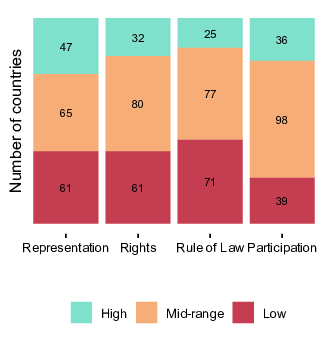
2.1. Global declines and advances
Declines at the factor level have been most concentrated in the categories of Representation, Rights and Rule of Law (see Figure 0.1 for an overview of how we measure democratic performance). Despite countries’ relatively strong overall performance in Representation, numerous declines were seen in Credible Elections and Effective Parliament (see Figure 2.4 for an overview of advances and declines at the factor level).
Within Rights, Civil Liberties was one of the factors that saw the broadest declines, with the most significant impacts seen in Freedom of the Press, followed by Freedom of Expression, Economic Equality and Access to Justice. Performance in Freedom of the Press declined in 43 countries, nearly one quarter (24.9 per cent) of those covered, marking the broadest decline in this factor since the beginning of our data set (1975) (see Box 2.1 for more details). Declines within the Rule of Law category were most concentrated in Judicial Independence, though Predictable Enforcement and Personal Integrity and Security were almost equally affected.
Box 2.1. Global declines in Freedom of the Press
Global regression was most severe in Freedom of the Press, with 43 countries experiencing declines when comparing 2024 to 2019. This is the broadest decline in this factor since the beginning of the GSoD Indices data set (1975). Performance in Freedom of the Press deteriorated across all regions, in 15 African and 15 European countries, as well as 6 countries each in the Americas and Asia and the Pacific. One country in West Asia also saw a decline. While the large majority of the countries experiencing declines were mid-range performers, four countries were in the high-range band (Finland, Portugal, Sweden and Uruguay).
The severity of the downturn in performance in this factor is reflected in the findings of the 2025 World Press Freedom Index, which noted that the global state of press freedom was categorized as a ‘difficult situation’ for the first time in the history of the Index. In 2025, the Index’s economic indicator, which measures ownership concentration, pressure from advertisers and financial backers, and the restriction or opaque allocation of public aid, fell to its lowest point yet (Reporters without Borders 2025).
The diversity of contexts that are experiencing this pattern can be seen from two examples—New Zealand and Palestine. In New Zealand, a media crisis has been marked by the shrinking of the press landscape. In 2024, the television and online news company Newshub shut down, leaving the country with only one television news service, the state-owned broadcaster TVNZ, which also reduced its news programming and staff. Media has become severely concentrated, as 78.5 per cent of journalists work for one of five employers (Reporters without Borders n.d.). Since October 2023, nearly 200 journalists have been killed, and Israel has imposed a blockade on the Gaza Strip for over 18 months (Reporters without Borders 2025). The treatment of Al Jazeera provides an example of the environment for media in the region. Between 2024 and 2025, Al Jazeera was targeted by both Israel and the Palestinian Authority, which have suspended the media outlet’s operations over alleged national security concerns and tensions over its coverage of certain events (International IDEA 2024z).
Twelve countries across all regions experienced significant advances in Freedom of the Press (comparing 2024 scores to 2019). Most of these were in the Americas (Bolivia, Brazil, the Dominican Republic and Honduras) and Europe (Bulgaria, Czechia, Montenegro and Poland). Only one country (Zambia) in Africa saw improvements, and there were two in Asia and the Pacific (Fiji and Sri Lanka) and one in West Asia (Syria). Syria was the only low-performing country to have seen any improvement in this factor. Brazil, Czechia and Poland moved from mid-range to high performance between 2019 and 2024.
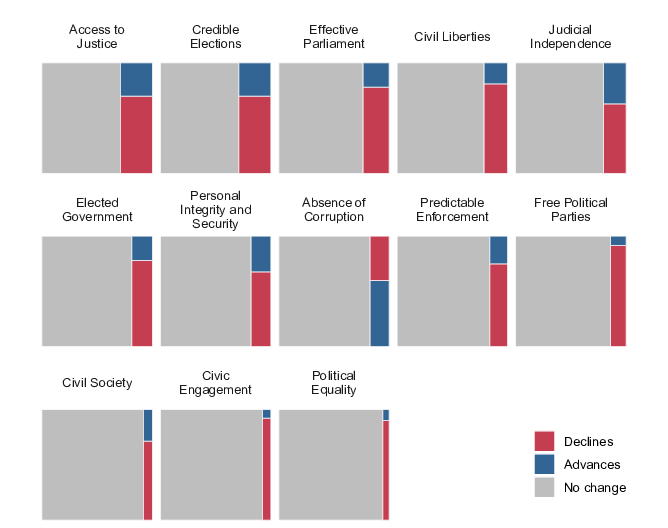
The three largest declines in Freedom of the Press were seen in Afghanistan, Burkina Faso and Myanmar, all low-performing contexts that have been marked by violence and undemocratic transfers of power. The fourth-largest decline took place in South Korea, a country that fell from high to mid-range performance in this subfactor between 2019 and 2024. There, the media has faced multiple challenges over the past several years. Examples include the cancellation of a well-known investigative journalist’s daily political programme, a spike in defamation cases initiated by the government and its political allies against journalists, and raids on journalists’ residences (Civicus 2024). Such incidents continued in 2024, with the establishment of a special investigative prosecutorial team targeting journalists for defamation (Lee, Cho and Jo 2023; Jang 2024). After a tumultuous year that included the now-former president’s declaration of martial law and his subsequent impeachment, a snap election in June 2025 brought a new administration to power. It remains to be seen how this transition may affect the country’s media landscape in the coming months.
Although advances were less frequent overall within the Rights category, Freedom of Expression stood out as a notable exception. Comparing 2024 to 2019, 20 countries (12 per cent of those assessed) registered improvements in this factor, and they were fairly evenly distributed across the regions. Still, declines in Freedom of Expression were also notable, impacting 39 countries around the world.
Chile recorded the largest improvement in Freedom of Expression (comparing 2024 scores to 2019), due in part to landmark draft legislation aimed at enhancing the safety of journalists and others in the field of communications, as well as their families. If approved by the legislature, the bill would introduce several novel features, including a broad definition of ‘aggression’ that goes beyond physical aggression to include digital harassment and surveillance (Pagola 2023; Gobierno de Chile 2024).
Progress was also observed in other areas of democratic performance worldwide, particularly in Absence of Corruption, Access to Justice and Credible Elections. Botswana recorded the largest improvement in Credible Elections (comparing 2024 scores to 2019), with observers noting an increased number of polling stations both in the country and abroad, the official designation of two public holidays (on the day of and day after polling) to enable the maximum number of voters to participate and pre-election debates organized by the media. While observers also cited challenges—for example, with communication and the appointment of election authorities—they commended Botswana for holding transparent elections. The 2024 election was a landmark in the country’s post-independence history, marking the end of the Botswana Democratic Party’s 58-year tenure in power (ECF–SADC 2024a; International IDEA 2024af).
2.2. Representation
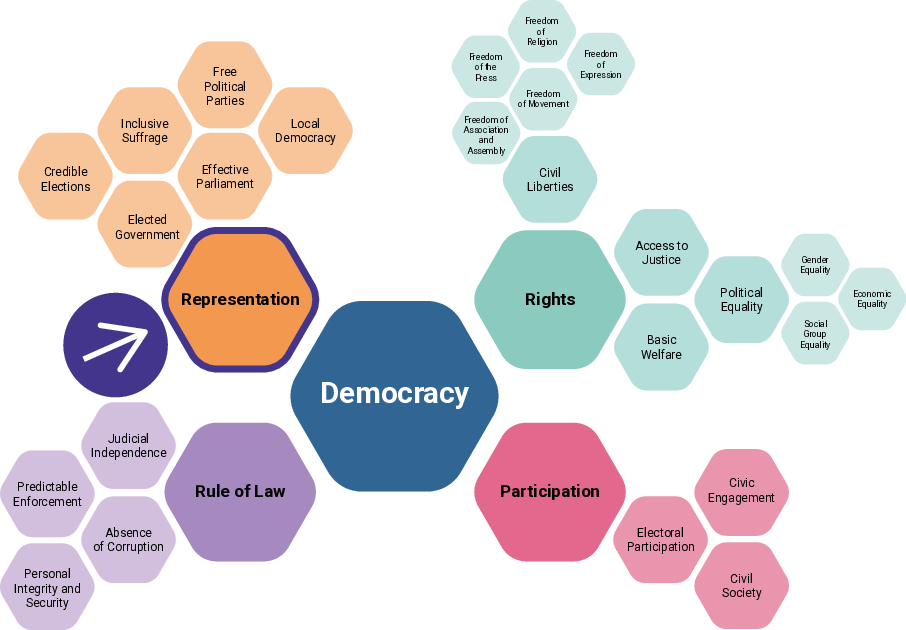
In the GSoD Indices, Representation is an aggregate measure of the extent of representative democracy, building from component measures of credible elections, inclusive suffrage, freedom to organize through political parties, the effectiveness of the legislature and the practice of democracy at the local level.
Representation symbolizes what is often considered to be the core of democracy, including the mechanisms through which the people choose their leaders and representatives (elections and political parties), and the institutions (legislatures) responsible for translating the expression of public will into actionable policy.
Table 2.1 highlights the top 10 countries in Representation performance for 2024, showing both regional diversity and year-on-year movement in the rankings. Germany, Denmark and Norway continue to lead globally. It is also noteworthy that Mauritius’s performance in Representation experienced a notable improvement, climbing 23 places in the rankings.
| 2024 rank | Country | 2023 rank | Change 2023–2024 | |
|---|---|---|---|---|
| 1 |  | Germany | 1 | 0 |
| 2 |  | Denmark | 3 | +1 |
| 3 |  | Norway | 2 | -1 |
| 4 |  | Costa Rica | 4 | 0 |
| 5 |  | Chile | 5 | 0 |
| 6 |  | Sweden | 6 | 0 |
| 7 |  | Finland | 10 | +3 |
| 8 |  | Italy | 13 | +5 |
| 8 |  | Netherlands | 9 | +1 |
| 10 |  | Estonia | 12 | +2 |
These top performers stand in contrast to broader global trends in 2024, which point to the lowest global performance in Representation since 2001. Category-level declines were recorded in 21 countries, outnumbering advances by a ratio of 7 to 1, with deterioration observed in all regions. Most declines impacted low-performing countries, but mid-range- and high-performing countries were also affected.
Comparing 2024 to 2019, improvements in Representation were recorded in just three countries—mid-range-performing Honduras and Montenegro and high-performing Latvia. Some of the advances in Honduras were associated with the 2021 elections, which European Union observers described as competitive and calm. Other markers of improvement included a more reliable voter register and high turnout (European Union Election Observation Mission 2022).
At the factor level, Credible Elections and Effective Parliament continued to see the broadest declines, impacting 35 countries (20 per cent) and 32 countries (19 per cent), respectively. These declines occurred across all levels of performance and in every region of the world. Africa experienced the highest concentration of declines in these two factors, with nearly one in four countries (23 per cent) exhibiting a significant drop in either Credible Elections or Effective Parliament. In no region did the number of advances outweigh the number of declines in any factor of Representation. Figure 2.5 illustrates the trends over time for advances and declines in the factors of Representation.
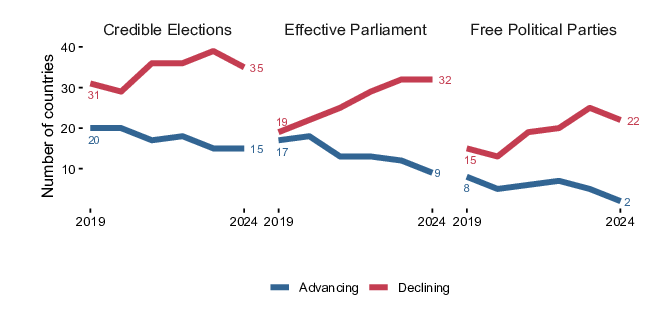
Despite widespread declines in related factors, elections continue to hold unique power and promise as a means of democratic renewal. Comparing 2024 to 2019, 24 countries around the world (14 per cent) experienced improvements in Credible Elections or Effective Parliament.
Notable examples include Brazil and Poland, where the election of new governments (in 2022 in Brazil and 2023 in Poland) brought an end to years of consistent democratic deterioration that included executive aggrandizement, the undermining of the rule of law and the independence of the courts, constraints on the media and restrictions in the space for civil society. In Poland’s case, this period was also characterized by a strained relationship with the EU, which withheld millions of euros in funding over concerns regarding the deliberate weakening of the rule of law (Carothers and Carrier 2025).
Since the most recent elections, both countries have recorded measurable improvements. Brazil recorded advances in 10 factors related to the quality of democracy between 2022 and 2024, while Poland improved in 6 factors between 2023 and 2024. Although both contexts remain challenging, due in part to the divided government in both countries, there has been progress in reversing several non-democratic policies of the past. For example, both countries have taken steps to seek accountability for previous rule-of-law violations and to expand civic space (International IDEA 2024s, 2025j). In Poland, a key development to monitor will be the role of the newly elected president, aligned with the opposition, whose veto power may shape the reform trajectory going forward.
Credible Elections
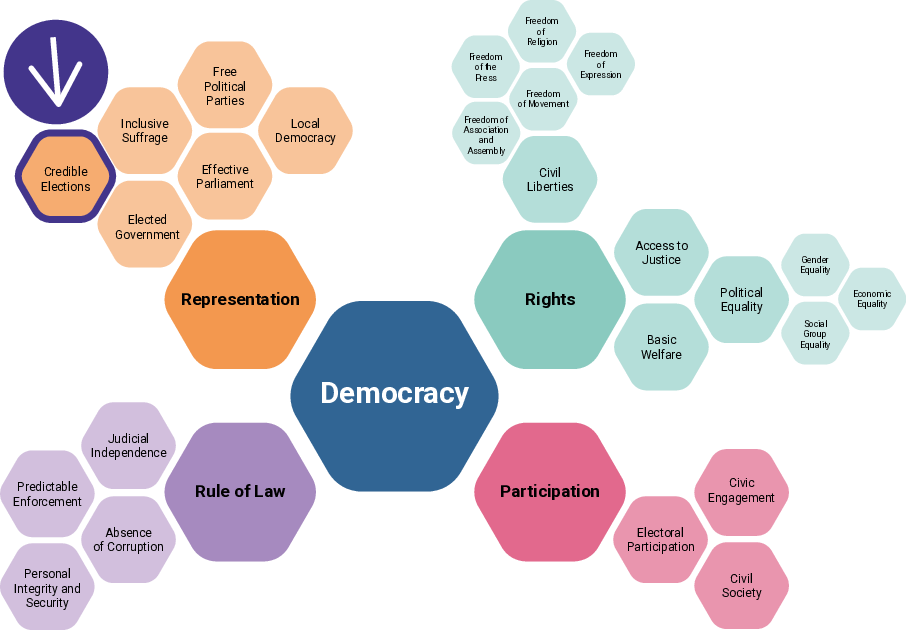
The Credible Elections index aggregates indicators that measure the extent to which elections for national representative political office are free from irregularities, such as flaws and biases in the voter registration and campaign processes, voter intimidation and fraudulent counting.
As of the end of 2024, data from the GSoD Indices showed that 35 countries (20 per cent of those covered) had recorded declines in Credible Elections compared with 2019. Countries with declines were found at all levels of performance, from higher performers, such as Georgia and South Korea, to low-performing contexts, such as Mozambique and Pakistan.
Following the 2024 elections super-cycle year, a few countries stand out for sharp declines between 2022 and 2024. Georgia’s 2024 legislative elections were marked by controversy, with election observers pointing to irregularities that included alleged intimidation, ballot-box stuffing and vote buying. The former president, alongside civil society and members of the opposition, rejected the results, and opposition lawmakers boycotted the legislature’s inaugural session. Mass protests continued throughout the year (International IDEA n.d.c; Megrelidze 2024).
Mozambique also experienced a significant decline, falling from mid-range to low performance in this factor between 2022 and 2024. The country’s October 2024 election was controversial, with observers raising concerns about an inflated voter roll, ballot-box stuffing, irregularities in vote counting and tabulation, and the management of complaints and appeals. The post-election period was marred by violence; police used live ammunition on protesters, and hundreds perished. Talks between the government and opposition leaders were initiated in March 2025 to resolve the impasse, with an agreement reached in April 2025 (Budoo-Scholtz 2025; International IDEA 2025o).
These disputes are emblematic of a broader trend identified in previous editions of this report, and they signal both danger and promise (International IDEA 2024a). The people remain the ultimate check on power, but the connection between their voice and authorities’ actions, especially when elites are unwilling to let go of power, can often be tenuous. In the wake of the 2024 super-cycle year of elections, four countries experienced improvements in indicators of Credible Elections. All of these were in Africa: Botswana, Chad, Mauritius and South Africa. In Mauritius, observers noted the credible work of the EMB, a peaceful electoral environment and smooth and timely operations at most polling stations (ECF–SADC 2024b).
Effective Parliament
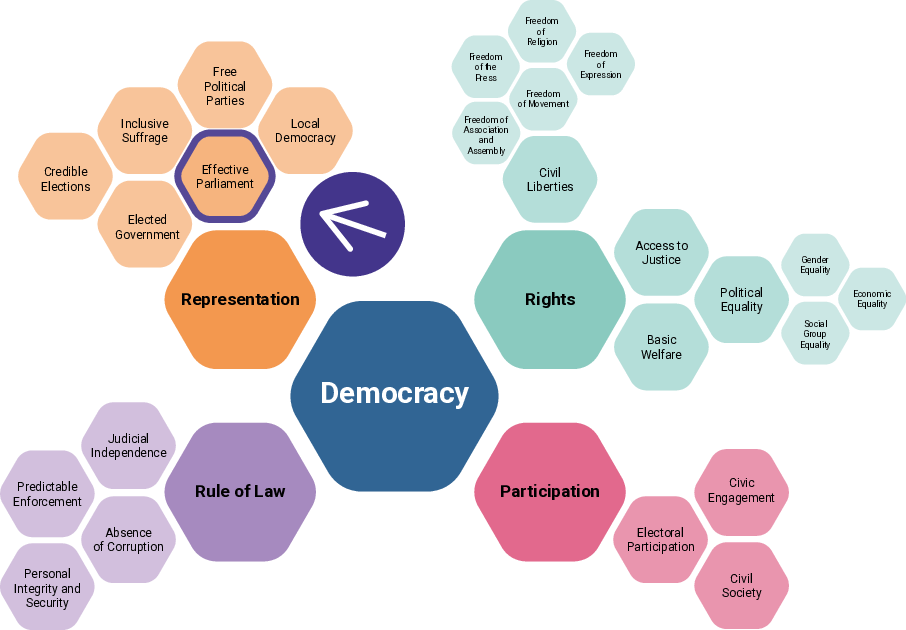
The Effective Parliament index aggregates indicators that measure the presence of opposition parties, legislative investigations and questioning of officials, as well as broader measures of executive oversight and executive constraints.
Nearly one in five countries has experienced a decline in Effective Parliament, signalling problems with legislative checks on executive power. Comparing 2019 to 2024, 32 countries (19 per cent) registered declines, while only 9 (5 per cent) showed improvements. Among the countries with declining performance, Japan was the only high-performing country; the remainder were split almost evenly between low-performing and mid-performing contexts (for two examples, see Box 2.2). Several of the lowest performers experienced a coup d’état or other undemocratic transfer of power, while others continued to be affected by ongoing violent conflicts: examples include Afghanistan, Burkina Faso, Gabon, Guinea, Haiti, Mali, Niger, Myanmar and Syria. Others, such as El Salvador, Kuwait, Russia and Venezuela, do not have effective legislatures because they have been co-opted by executives or abolished. Mid-range performers with deteriorating parliamentary effectiveness are found across all regions and include countries as diverse as Kyrgyzstan, Lebanon, Mauritius, Paraguay and Slovakia. These declines often coincide with setbacks in other areas of their democratic performance, including in varied factors of Representation, Rights and Rule of Law.
Box 2.2. Effective Parliament and political exclusion in Kuwait and Qatar
In small Gulf states such as Kuwait and Qatar, citizens make up a minority of the total population—approximately 30 per cent in Kuwait and just 12 per cent in Qatar (Gulf Research Center n.d.). Both countries maintain a clear distinction between so-called original citizens—defined as descendants of families residing in Kuwait before 1920 and in Qatar before 1930—and naturalized citizens,5 who face restrictions in access to public-sector employment, social benefits and political participation6 (Ali and Cochrane 2024).
In 2024, separate developments in Kuwait and Qatar highlighted this citizenship divide and the relatively weak power of the legislature (both countries have a score of 0 in Effective Parliament).
In Kuwait, amendments to the 1959 Nationality Law expanded the state’s powers to revoke citizenship and retroactively ended automatic naturalization for foreign wives7 (International IDEA 2024x; Benswait 2025). These changes coincided with the Emir’s May 2024 dissolution of parliament and suspension of constitutional safeguards (International IDEA 2024m). Between August 2024 and March 2025, around 42,000 people lost their citizenship (The New Arab 2025). Women who had acquired nationality through marriage were severely impacted. Despite the establishment of a new appeals committee (Arab Times Kuwait 2025), the system lacks judicial oversight, functioning as an administrative body under the Council of Ministers. In a televised address, the Emir framed the campaign as a way of ‘purifying’ the national identity and ‘returning the country to its original people’ (Al-Bilad 2025; ATV Kuwait 2025).
In Qatar, a November 2024 referendum ended legislative elections and reverted the Shura Council (the country’s advisory legislative chamber) to a fully appointed body (International IDEA 2024ai). The Emir argued that this change was needed to prevent identity-based divisions within society, following tensions sparked by the 2021 elections, in which naturalized citizens were excluded from voting rights (Al-Hajri 2021; The Shura Council 2024). The referendum passed with 91 per cent approval and an 84 per cent turnout (Qatar News Agency 2024). Through this measure, Qatar revoked voting rights for original citizens rather than extending suffrage to naturalized citizens, thus maintaining their political exclusion (Postigo Sánchez 2024).
Nine countries experienced improvements in their performance with regard to the Effective Parliament factor (comparing 2024 scores to 2019). These include high-performing Brazil, Czechia, France and Poland, as well as mid-range-performing Fiji, Jordan, Montenegro, Papua New Guinea and Thailand.
Brazil, whose score in Effective Parliament increased the most between 2019 and 2024, is a notable example of how the legislature can assert its role in holding the executive to account. In October 2023, a legislative committee accused former President Jair Bolsonaro and his allies of crimes in connection with January 2023 riots. The committee characterized the events as a premeditated coup attempt and recommended that the attorney general pursue charges against Bolsonaro that included political violence, criminal association, abolition of the rule of law and an attempted coup. While the legislative committee lacks prosecutorial authority, its recommendations contributed to formal police charges and the Supreme Court’s unanimous vote to accept the charges. Bolsonaro and his allies are now due to stand trial (International IDEA 2023e, 2024ag).
2.3. Rights
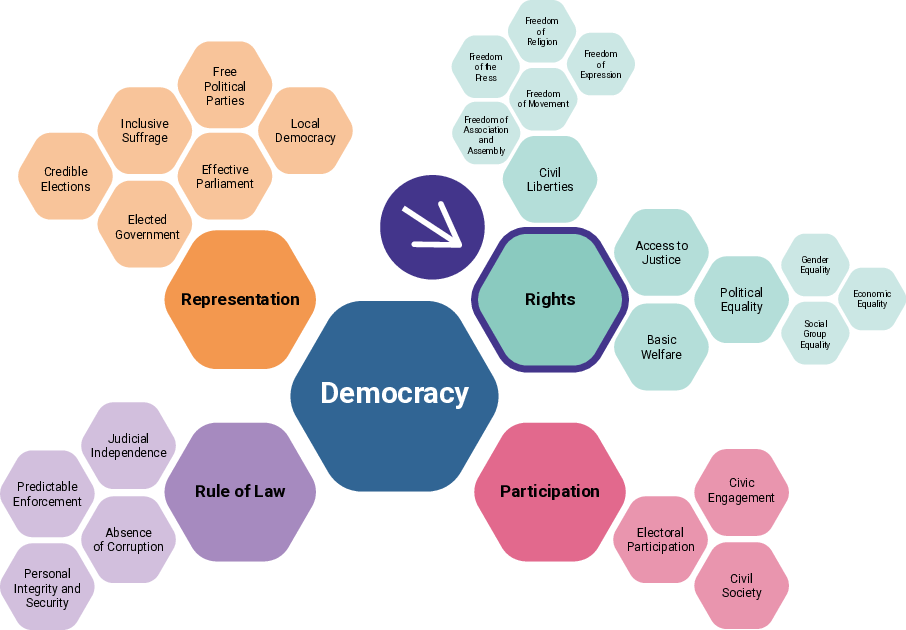
In the GSoD Indices, the Rights category is made up of liberal and social rights that support both fair representation and accountability. It is built upon four component measures of Access to Justice, Civil Liberties (including Freedom of the Press, Freedom of Expression, Freedom of Association and Assembly, Freedom of Religion and Freedom of Movement), Basic Welfare and Political Equality (including Gender Equality, Social Group Equality and Economic Equality).
A small group of countries continues to lead on rights protections. As illustrated in Table 2.2, Denmark, Switzerland and Germany held the top three positions in 2024, maintaining stable performance, while countries such as Norway, Ireland and Sweden registered notable improvements. These top performers represent the global high-water mark in safeguarding rights and freedoms.
| 2024 rank | Country | 2023 rank | Change 2023–2024 | |
|---|---|---|---|---|
| 1 |  | Denmark | 1 | 0 |
| 2 |  | Switzerland | 2 | 0 |
| 3 |  | Germany | 3 | 0 |
| 4 |  | Luxembourg | 4 | 0 |
| 5 |  | Belgium | 5 | 0 |
| 6 |  | Norway | 14 | +8 |
| 7 |  | Finland | 8 | +1 |
| 8 |  | Ireland | 9 | +1 |
| 9 |  | Japan | 6 | -3 |
| 10 |  | Sweden | 11 | +1 |
Nevertheless, these countries remain exceptions to a broader pattern of decline. Comparing 2024 scores to 2019, significant erosion was seen in the Rights category, with category-level declines outnumbering advances by a ratio of 9 to 1; the sole advance was in Vanuatu. The steepest declines took place in low-performing Belarus and Myanmar, which are among the countries with the largest number of declines across many factors (in all categories) from 2019 to 2024. Declines have also been recorded, however, in mid-range contexts like Greece and Burkina Faso. Greece dropped from high to mid-range performance in Rights between 2023 and 2024 (though it remains close to the threshold for high-range status).
Declines were most common in Freedom of the Press, Freedom of Expression, Economic Equality and Access to Justice. The decline in Freedom of the Press, impacting nearly 25 per cent of countries, is the most widespread drop since the beginning of the data set in 1975. Approximately one in five countries also saw declines in Freedom of Expression (22 per cent of countries), Economic Equality (21 per cent) and Access to Justice (20 per cent) (see Figure 2.6). This deterioration was reflected across all regions, with Africa and Europe accounting for the largest share of declines in each of these factors.
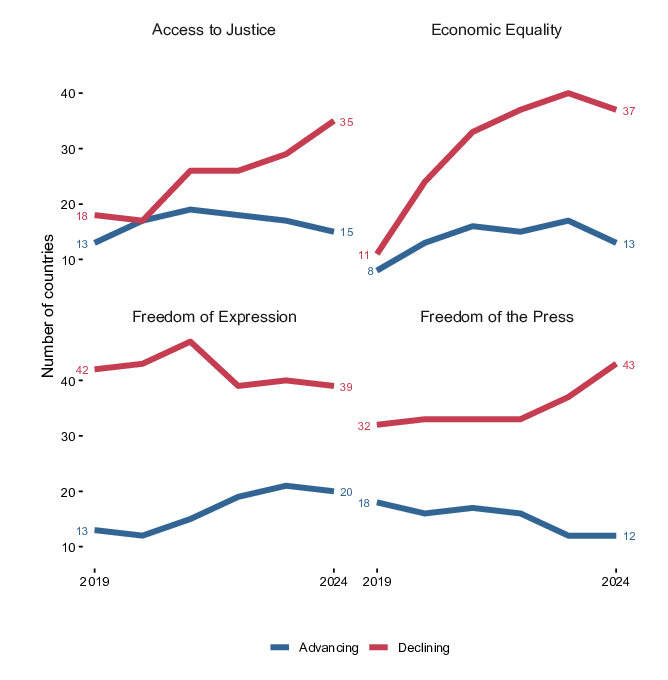
At the same time, however, a smaller number of countries made notable gains, demonstrating that positive trajectories are still possible, particularly in mid-range- and high-performing contexts. Advances were most common in Freedom of Expression, where 20 countries (12 per cent) saw progress. With the exception of two low-performing countries (Bangladesh and Thailand), all improvements were observed in countries with mid-range or high performance in this factor. Countries in the Americas and Asia and the Pacific account for 60 per cent of all advances, and no such improvements were observed in West Asia.
Some of these country-level advances may prove fragile. This is the case in Thailand, where struggles for control over the direction of political reforms are ongoing between the older, more traditional leadership and newer, more progressive parties (Simpson 2024). For example, events in 2025—especially plans to indict members of parliament from the now-dissolved Move Forward Party for sponsoring a bill in parliament to reform Thailand’s lèse-majesté law—cast doubts on the sustainability of recent gains (International IDEA 2025l).
Freedom of the Press and Freedom of Expression
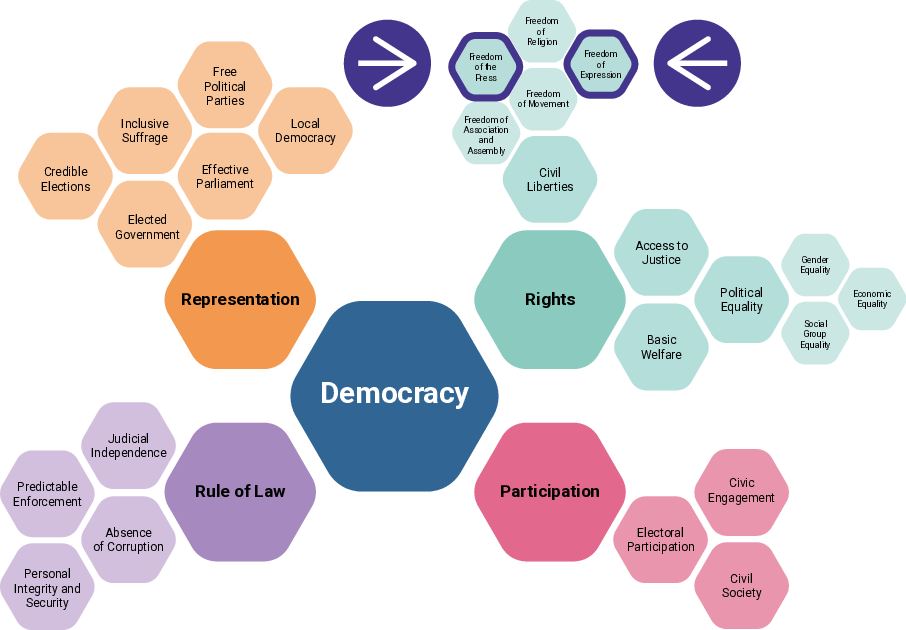
The Freedom of the Press subfactor measures the extent to which the news media are diverse, honest, critical of the government and free from censorship (on the part of the government or self-imposed); it also measures independence of the media.
The Freedom of Expression subfactor refers to the right to openly discuss political issues and express political opinions outside the mass media and to considerations of the broader information environment.
Freedom of the Press was the factor that saw the broadest declines in 2024, impacting 43 countries at all levels of performance and in all regions. Similar downturns took place in Freedom of Expression, seen in 39 countries globally. Some of the steepest declines in both factors between 2019 and 2024 occurred in countries marked by closed and insecure contexts, including Afghanistan, Belarus, Burkina Faso and Myanmar. However, even relatively higher-performing countries such as Argentina, Austria, Georgia, Greece, Italy, Senegal, Taiwan and the United Kingdom saw mounting pressure on the exercise of one or both of these freedoms.
The office of the UN’s special rapporteur on the promotion and protection of the right to freedom of opinion and expression emphasized the threats to media and expression in a report published in June 2025. The document detailed attacks on independent media and called attention to campaigns, organized by vested political interests in a diverse array of contexts, to ‘undermine the credibility of independent media outlets and journalists who speak truth to power’ (Khan 2025: 7). The report also raised concerns about attacks on journalists, both in person and online, with women journalists facing particular risks (Khan 2025).
Recent developments in Georgia underscore the mounting pressure on media freedom and freedom of expression. In April 2025, the Georgian Parliament adopted several laws restricting civil society and media, including a so-called ‘foreign agents’ law that imposes expansive registration requirements and sanctions on independent organizations and media outlets. The April 2025 law is a harsher version of a law originally passed in 2024. The 2025 version tightens regulation on broadcasters, including new state-imposed coverage standards, and includes prohibitions on foreign funding, which journalists have criticized as mechanisms of state control and censorship (International IDEA 2025x).
Despite widespread declines in Rights-related indicators, there has also been some progress, most notably in Freedom of Expression, which shows the highest number of improvements among all factors in the Rights category. Low-performing Bangladesh and high-performing Spain illustrate how such advances can take place in highly divergent contexts.
In Bangladesh, one example of progress is the interim government’s annulment of the Cyber Security Act in November 2024, which had been widely criticized for suppressing free speech, press freedom and political dissent. The repeal of the act created space for a new law that omitted several of the most controversial provisions of the previous version (International IDEA 2024ah). In Spain, the government’s new Action Plan for Democracy includes measures meant to enhance both media independence and the right to information. Key initiatives include the drafting of an Open Administration Law to enhance the quality and accessibility of public information, the establishment of an independent whistleblower protection authority in public administration, measures for the disclosure of assets and interests by ministers and political parties, and legal safeguards to protect journalists’ sources. The plan also envisages the creation of a media register to improve transparency around media ownership and funding, to be maintained by an independent regulatory body (International IDEA 2024y).
Economic Equality
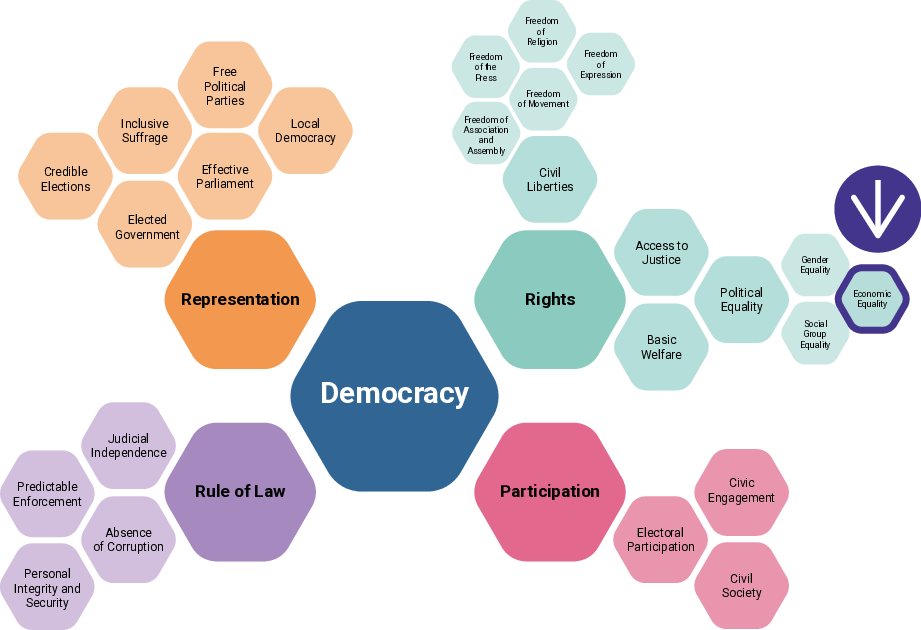
The Economic Equality index aggregates expert-coded measures of the extent to which people are excluded from political processes on the basis of economic factors, along with observational data about economic inequality.
Comparing 2024 to 2019, the number of countries experiencing declines (37) in Economic Equality was nearly triple the number registering advances (13) around the world (see Figure 2.6). Although the largest number of declining countries were in Africa, the regions were all fairly equally impacted, with the exception of West Asia, which saw only three such declines. The declines were largely concentrated in low or mid-range performers, with Singapore the only high performer to register a drop. Some of the steepest declines occurred in low-performing contexts (Afghanistan, Azerbaijan, Libya, Myanmar, Nicaragua and Qatar), but mid-range performers were also impacted (Canada, Iceland, Mauritius, Niger, Portugal, Romania and the USA).
The USA, which is among the 10 countries with the largest drops (its score fell from 0.69 in 2019 to 0.59 in 2024), has long struggled with high rates of inequality, illustrating how persistent economic disparities continue to challenge even long-established democracies. According to the latest data, the top 10 per cent of families in the USA hold 60 per cent of all wealth in the country, while the bottom 50 per cent hold just 6 per cent (Congressional Budget Office 2024). This disparity is reinforced by tax laws that apply lower rates to investment income—a major source of wealth for higher-income groups—than those applied to income earned from wages and salaries (Inequality.org 2025). In the first half of 2025, a series of policy decisions by the government raised concerns about deepening inequality. These decisions included the revocation of a prior executive order that had raised the minimum wage for federal contract workers and the elimination of collective bargaining rights for federal workers (Anderson 2025). The administration’s plans to cut Medicaid funding and change the rules that determine who qualifies for food subsidies also threaten to worsen inequality, particularly impacting lower-income groups (Luhby 2025).
Although the number of countries showing advances in Economic Equality was relatively small, gains were recorded across the full spectrum of performance. These included low-performing Bangladesh, Sudan and Timor-Leste; mid-range-performing Fiji, Jordan, Moldova, Saudi Arabia, Sierra Leone, Suriname, Togo and Zambia; and high-performing Malta and Slovenia.
Access to Justice
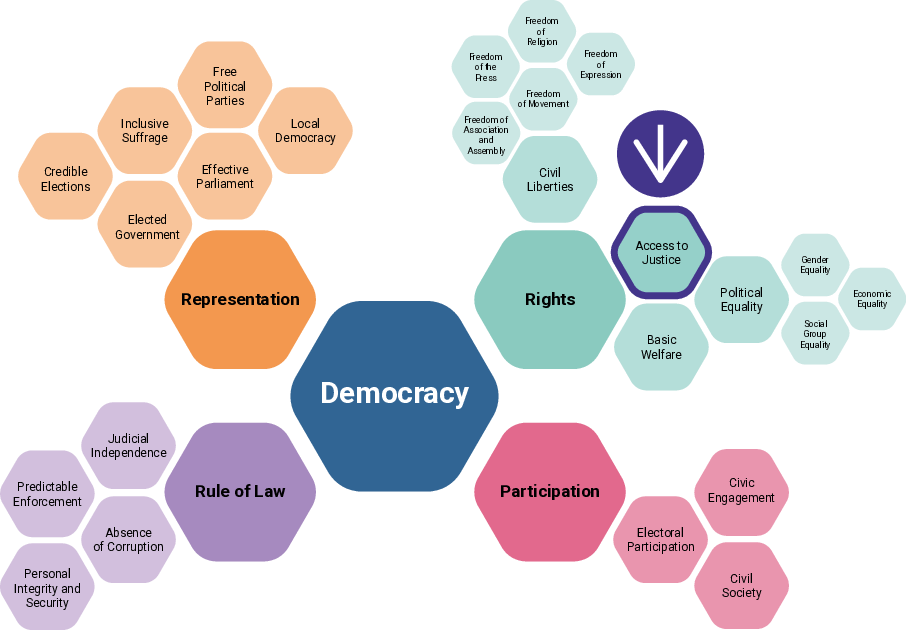
The Access to Justice factor denotes the extent to which the legal system is fair (i.e. citizens are not subject to arbitrary arrest or detention and have the right to be under the jurisdiction of and to seek redress from competent, independent and impartial tribunals without undue delay).
Comparing 2024 to 2019, performance in Access to Justice declined in 35 countries, which is more than twice the number of countries (15) that recorded advances. The majority of these declines occurred in mid-range-performing contexts, but two countries with much higher baseline performance also experienced notable deterioration in this area—France and South Korea. At the regional level, Africa and Asia and the Pacific accounted for the majority (57 per cent) of all the declines in Access to Justice.
Three of the five steepest drops worldwide occurred in low-performing Mauritania and Myanmar and in mid-range-performing Greece. Other mid-range-performing countries that experienced setbacks in this factor represent diverse contexts, including Ethiopia and Lebanon (both on the lower end of the mid-range spectrum).
In Greece, persistent concerns about impunity have hampered the pursuit of justice, especially for crimes related to media and journalists. Two high-profile cases in 2024 exemplify these challenges. The first involves the murder of a crime journalist, Giorgos Karaivaz, in 2021. Critics raised concerns about irregularities during the trial, including damaged evidence, and the eventual acquittal of the two men accused of the murder. The second case concerns the so-called Predatorgate scandal, in which state agencies were alleged to have used Predator spyware against multiple prominent individuals. Despite documented evidence of the National Intelligence Service’s role, the Supreme Court prosecutor cleared all state agencies of involvement (Human Rights Watch 2025). The decision was depicted by some observers as part of a pattern of impunity, especially in light of other longer-standing problems with the Predatorgate investigation. These include accusations against independent watchdog agencies that warned targets about the spyware and allegations that prosecutors were attempting to intentionally delay the investigations (Reporters without Borders 2023).
While declines in Access to Justice have been more prevalent, several countries across all levels of performance have also registered improvements. A particularly notable example is The Gambia, where steady improvement has been noted since 2017, when the country transitioned from low to mid-range performance. One of the most significant recent developments is the backing by the Economic Community of West African States of the establishment of a special tribunal for The Gambia to prosecute crimes committed under former President Yahya Jammeh’s rule (1994–2017). That period was marked by widespread repression, serious human rights violations, and control over the government and media. In 2022, the government accepted nearly all of the Gambian Truth, Reconciliation and Reparations Commission’s recommendations, and there is strong public support for the prosecution of former Jammeh officials (International IDEA n.d.b). The coming years will be critical in assessing the extent to which these commitments are implemented and whether they translate into lasting institutional reform and justice for victims.
2.4. Rule of Law
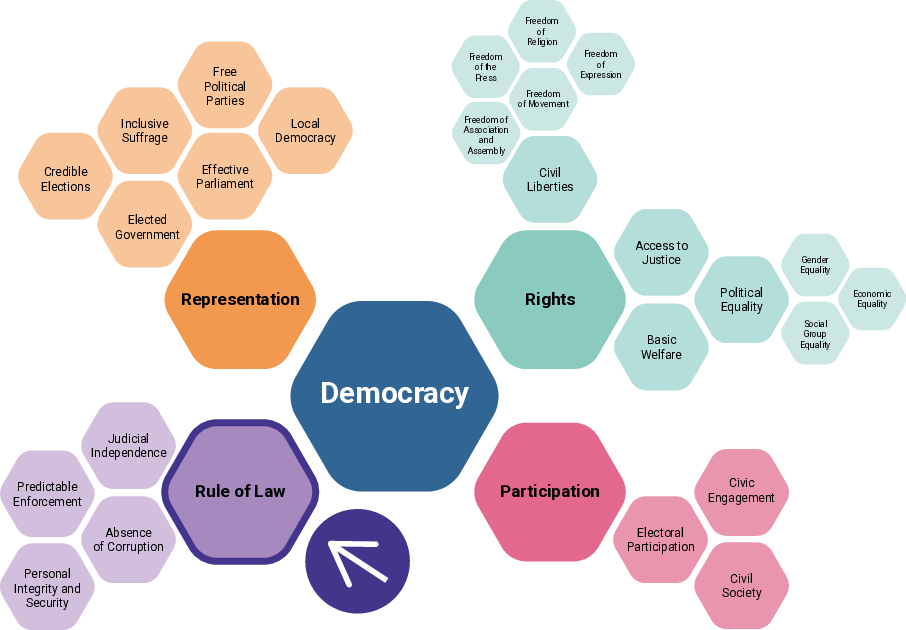
In the GSoD Indices, Rule of Law is an aggregate measure that includes assessments of the independence of the judiciary from government influence, the extent to which public administrators use their offices for personal gain, how predictable enforcement of the law is and the degree to which people are free from political violence.
Despite widespread challenges to the Rule of Law globally, a number of countries continue to set high standards in this area. These top performers demonstrate consistent strengths in judicial independence, low levels of corruption, predictable legal enforcement and strong protections against political violence. See Table 2.3 for the top 10 countries in 2024 in this category.
| 2024 rank | Country | 2023 rank | Change 2023–2024 | |
|---|---|---|---|---|
| 1 |  | Denmark | 1 | 0 |
| 2 |  | Germany | 2 | 0 |
| 3 |  | Switzerland | 3 | 0 |
| 4 |  | Luxembourg | 5 | +1 |
| 5 |  | Australia | 11 | +6 |
| 6 |  | Estonia | 9 | +3 |
| 7 |  | Norway | 8 | +1 |
| 8 |  | Ireland | 7 | -1 |
| 9 |  | New Zealand | 6 | -3 |
| 10 |  | Finland | 4 | -6 |
Yet these positive examples stand in contrast to broader global trends. Out of all democratic performance categories, the highest number of aggregate-level declines occurred in the Rule of Law category. Comparing 2024 to 2019, 32 countries (19 per cent of those assessed) registered downturns in this category; most of these countries were either low- or mid-range-performing. European countries accounted for 38 per cent of the downturns, followed by countries in Africa, the Americas, Asia and the Pacific, and West Asia. The declines were evenly distributed across three factors—Judicial Independence, Personal Integrity and Security, and Predictable Enforcement—each representing between 28 and 29 per cent of the total. Absence of Corruption accounted for a smaller (16 per cent) portion of the total number of downturns. Nevertheless, corruption remains a salient political issue even when significant downturns are not present. In Serbia, for example, anger over entrenched political corruption fuelled months of massive nationwide protests instigated by the deadly collapse of the railway station in Novi Sad (Stojanovic 2024; International IDEA 2025b). Other cases are more mixed. India, for example, experienced a small decline in Judicial Independence (comparing its 2024 score to 2019). At the same time, however, it also saw the Supreme Court successfully order the first elections in Jammu and Kashmir in a decade, in October 2024, as well as issue a landmark ruling in November restricting the ability of state and local governments to conduct arbitrary demolitions of private property (International IDEA 2024ad, 2024ak).
See Figure 2.7 for an overview of how these trends changed between 2019 and 2024.
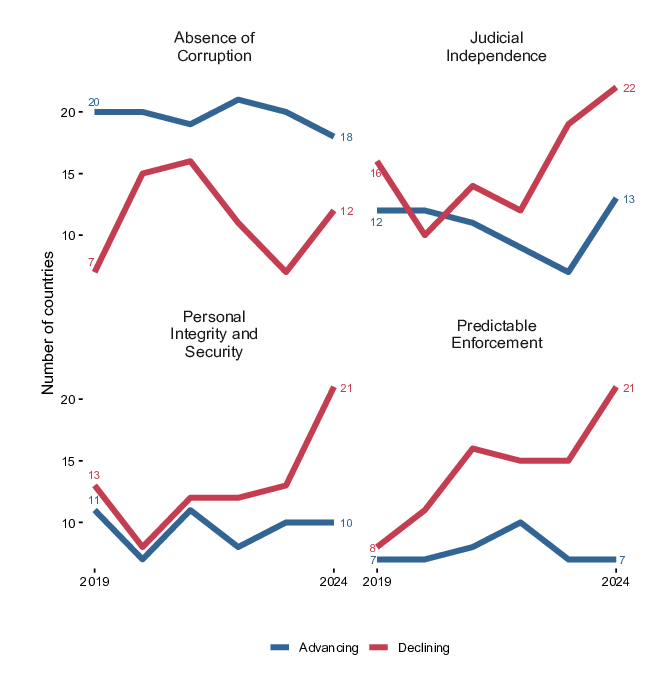
The rule of law has come under intensified pressure under the second Trump administration in the USA. Since Trump took office in January 2025, his administration has issued a series of executive orders attempting to overhaul key aspects of governance, including the day-to-day functioning of the federal civil service, the country’s migration and asylum systems, and the balance of power between federal and state-level governments (International IDEA n.d.c). In response, the federal district and circuit courts largely fulfilled their constitutional roles, staying or rejecting the policies and practices deemed arbitrary or capricious, compelling the executive to meet due diligence requirements, and upholding fundamental protections such as habeas corpus. In one notable instance, a court went so far as to threaten contempt proceedings against the government for non-compliance.8 Despite these interventions, the administration has at times disregarded or circumvented court rulings, prompting concerns about a potential constitutional crisis (Levy 2025). The degree to which the balance of powers is respected in the months and years to come will be a key determinant of whether Rule of Law indicators in the USA remain resilient or continue to deteriorate.
Advances in the Rule of Law were limited, impacting four countries in the Americas (Brazil, the Dominican Republic, Honduras and Suriname), three in Europe (Czechia, Latvia and Poland) and two each in Africa (Malawi and South Sudan) and Asia and the Pacific (Bangladesh and Fiji). These gains were largely concentrated in mid-range-performing countries. Bangladesh and South Sudan remain low-performing, and Czechia and Latvia are high-performing. No advances were recorded in West Asia.
Absence of Corruption
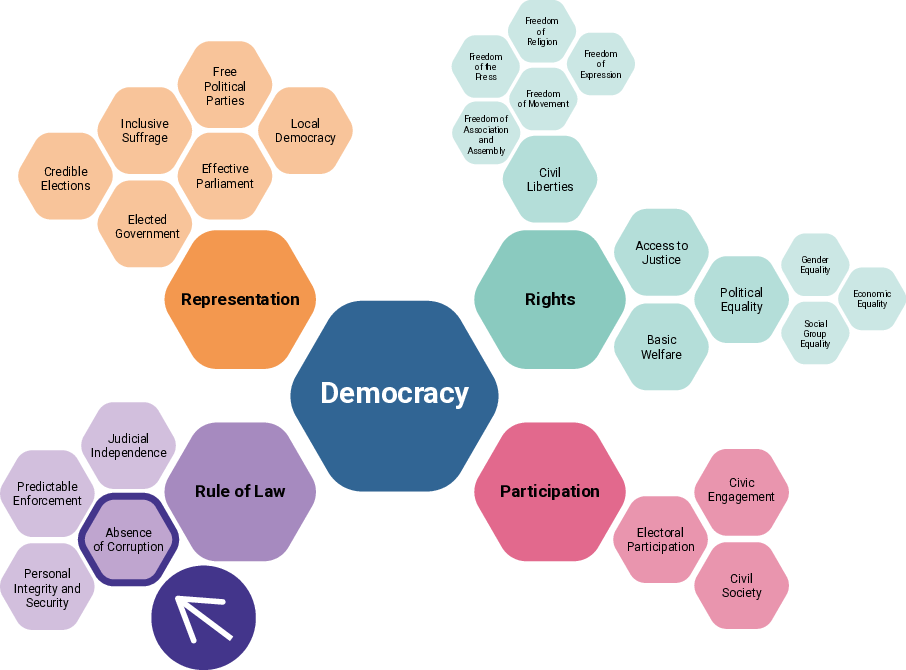
The Absence of Corruption factor denotes the extent to which the executive and the public administration more broadly do not abuse their office for personal gain. It is based on four indicators that measure corruption in the executive and public administration, and does not address courts and parliaments.
Gains in Absence of Corruption were recorded in 18 countries (10 per cent) across all regions (see Figure 2.7), marking the 15th consecutive year in which more countries improved than declined in this key area. While many of these gains were modest and should be interpreted with caution, they might signal growing attention to efforts to curb corruption.
Still, half of the countries showing progress remain in the low range of performance in this factor. The Americas accounted for one third of all advances in Absence of Corruption, with Guatemala standing out as an illustrative case of both progress and challenges. President Bernardo Arévalo, elected on an anti-corruption platform, assumed office in a context marked by entrenched corruption (International IDEA 2024w). Arévalo has undertaken initial steps towards reforms, including the removal of approximately 1,300 people from government positions on the basis of insufficient qualifications or a lack of merit-based recruitment. He has also led efforts to take complaints to the Public Prosecutor’s Office and has sought accountability from the attorney general—an official who has publicly opposed his presidency. At the same time, Arévalo faces significant resistance from actors who continue to challenge the legitimacy of his electoral victory and who have vested interests in maintaining the status quo (García 2024; Maldonado 2024).
Judicial Independence and Predictable Enforcement
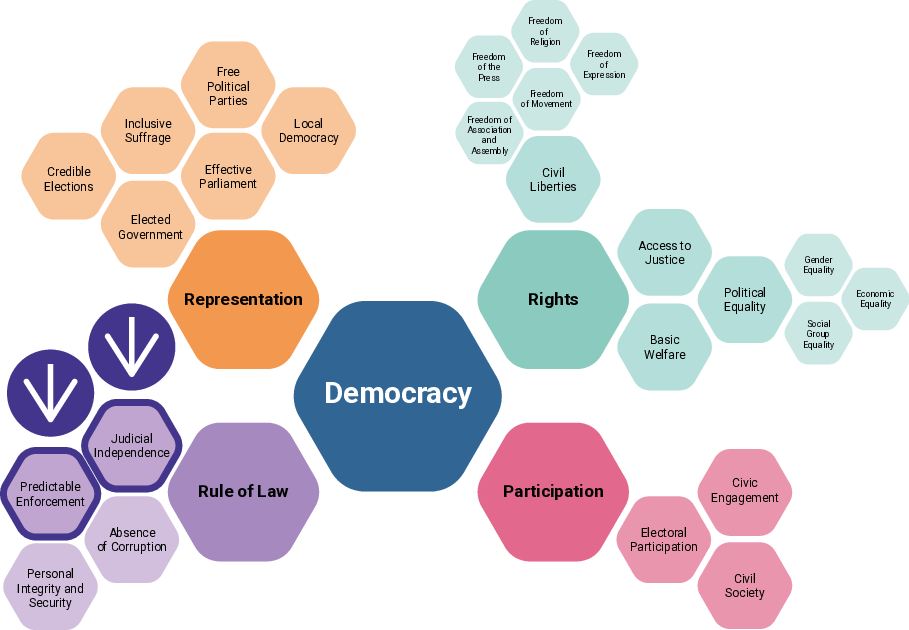
The Judicial Independence factor denotes the extent to which the courts are not subject to undue influence from the other branches of government, especially the executive.
The Predictable Enforcement factor denotes the extent to which the executive and public officials enforce laws in a predictable manner.
Judicial Independence deteriorated (when comparing 2019 to 2024) across countries at all levels of democratic performance. Declines were evenly distributed between low- and mid-range-performing countries (10 countries each), and 2 high-performing countries—Norway and Spain—also experienced setbacks. The most severe declines were observed in contexts facing significant instability and violence, including Afghanistan, Chad, Myanmar, Palestine, as well as in El Salvador and Tunisia.
In other contexts as well, concerns emerged about judges’ ability to deliver impartial rulings. In Mexico, for example, a package of judicial reforms enacted in 2024 sparked intense debate. The reforms introduced the election by popular vote of all federal judges (including Supreme Court justices and Electoral Tribunal magistrates) and state judges, raising concerns about the possible impact on judicial independence. The reforms also created a Judicial Discipline Tribunal and an administrative organ of the judiciary to replace the Judiciary Council (formerly in charge of discipline and administration of the federal judiciary). The reforms reduced the experience and eligibility requirements for judgeships and amended judges’ length of tenure. While proponents of the reform argued that it was necessary to address judicial corruption and nepotism (International IDEA 2024aa), critics have warned of serious threats to judicial independence. The first judicial elections in Mexico took place on 1 June 2025, with low voter turnout and a significant share of spoiled ballots. The Organization of American States, of which Mexico is a member, has warned that these changes pose potentially far-reaching risks to the quality and independence of Mexico’s democratic institutions (Organization of American States 2024, 2025).
Additional mid-range countries experiencing declines in this factor include countries such as Argentina, Armenia, Bhutan, India, Indonesia, Nigeria and Slovenia.
There was also notable deterioration in Predictable Enforcement, with declines recorded in 21 countries—three times the number of advances (7). The distribution of declines was similar to that of Judicial Independence, with 9 low performers and 10 mid-range-performing countries. Two high-performing countries—the Netherlands and Spain—also registered declines in this factor. Regionally, African and European countries accounted for 62 per cent of the global declines in this factor, followed by Asia and the Pacific, the Americas and West Asia (see Figure 2.7).
Two mid-range-performing countries illustrate different dimensions of this decline. In Burkina Faso, the Transitional Legislative Assembly adopted a law granting amnesty for individuals convicted of participating in the failed coup attempt of September 2015. To qualify, applicants had to acknowledge their involvement in the coup attempt, demonstrate their commitment to national defence efforts, display good conduct during detention and agree to be deployed in military operations. While analysts suggest that the law aims to leverage the military and diplomatic expertise of certain figures in the fight against militant groups linked to the Islamic State group and al-Qaeda, critics warn that the move undermines accountability and the rule of law in the country, potentially entrenching impunity and weakening governance institutions (International IDEA 2024al).
In Ecuador, declines occurred in a very different context. Despite the outcome of a 2023 national referendum to end oil drilling in the Yasuní National Park, the government had not ceased operations as of mid-2024. A high court decision had given authorities a one-year period to stop oil exploration and comply with the results of the referendum. In August 2024, environmental activists and Indigenous leaders and groups asked the court to hold an urgent hearing on the matter (International IDEA 2024u).
Personal Integrity and Security
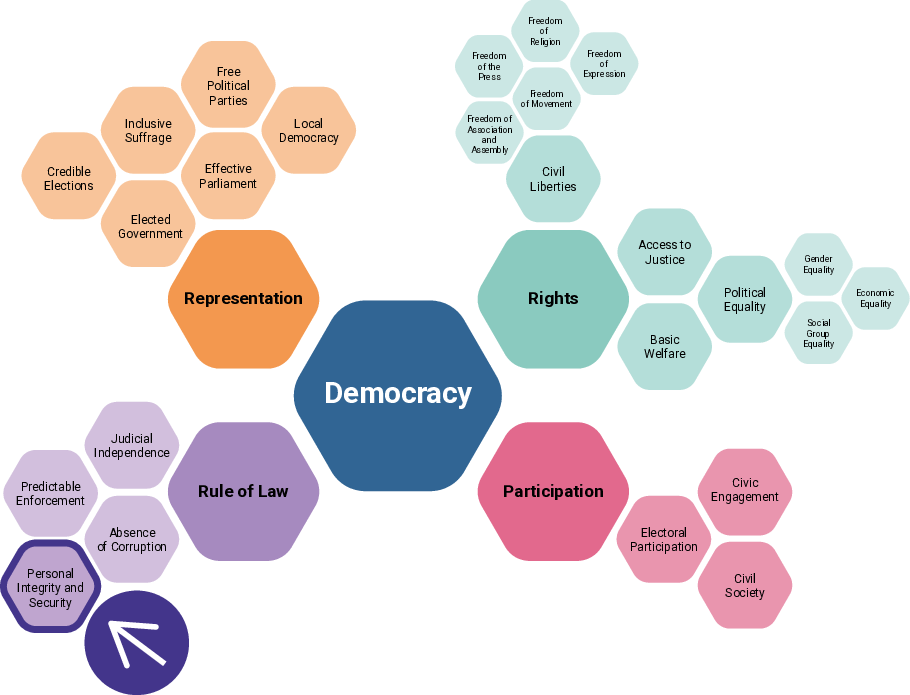
In the GSoD Indices, Personal Integrity and Security is a measure of the extent to which individuals’ bodily integrity is respected and people are free from state and non-state political violence. This factor includes measures of torture, political and extrajudicial disappearances and killings.
Comparing 2019 to 2024, more countries experienced declines than advances in Personal Integrity and Security. Over half (52 per cent) of these declines occurred in low-performing contexts, including countries such as Afghanistan, Belarus, Burkina Faso, Cambodia, El Salvador (see Box 2.3), Eswatini, Ethiopia, Guinea, Myanmar and Russia. People’s security also faced threats in higher-performing contexts like Portugal and Uruguay, the only high-performing countries that experienced drops in this factor.
Box 2.3. Personal integrity and security in El Salvador
Since March 2022, the people of El Salvador have been living under a state of exception instated at the request of President Nayib Bukele. Its purpose has been to combat gang violence, bring down the extremely high murder rate—a long-standing issue—and address persistent insecurity problems that are partly a legacy of the 1980–1992 civil war. The government has argued that the state of exception—and the ensuing suspension of certain rights—is justified and necessary to restore public security and enable citizens to go about their lives without fear.
Data from the United Nations Office on Drugs and Crime show that in 2022, the year the state of exception began, El Salvador’s intentional homicide rate declined by more than half (UNODC n.d.). According to government records, by 2024 it had declined to 1.9 per 100,000 people, down from 107.6 per 100,000 in 2015 (UNODC n.d.; Cavalari, Manjarrés and Newton 2025). Although the exact statistics are disputed by some organizations and experts, authorities say homicide, extortion and gang violence have all declined considerably, and President Bukele is extremely popular (Vyas and Pérez 2023; Avelar 2025a). Despite a constitutional ban on consecutive re-election, Bukele was re-elected in 2024 with more than 80 per cent of the vote, reflecting the value placed on security by Salvadorans, the extremely disruptive effects of crime and lingering fatigue with previous leaders’ failure to contain it (International IDEA 2024b).
The ‘Bukele model’ has not been without devastating costs. El Salvador now has the highest rate of incarcerated people in the world (Watts 2015; Vyas and Pérez 2023; Stack 2024; Ventas 2024; Eisen 2025). Over 1 per cent of the population and about 5 per cent of men aged between 18 and 35 are imprisoned (Graham 2024; Méndez Dardón and Welch 2025). Over 85,000 have been incarcerated during the state of exception, including thousands of children (Human Rights Watch 2024; Méndez Dardón and Welch 2025). Mass hearings, arraignments and trials of up to 900 defendants are authorized under the state of exception. In addition to the issues related to mass incarceration, the country has experienced severe declines in Freedom of Expression, Freedom of the Press and Freedom of Association (International IDEA 2025y). Torture, enforced disappearances, deaths in custody and police abuse and intimidation are reportedly commonplace (Cristosal 2023; Stack 2024; OHCHR 2025).
In July 2025, Bukele’s allies in the Legislative Assembly even amended the country’s constitution to allow him to run for office indefinitely (Alemán 2025). Nevertheless, other countries in the region have praised and sought to emulate the Bukele model through the use of emergency powers, suspension of rights or the militarization of security forces (Freeman 2023; Phillips et al. 2025).
Threats to personal safety are a persistent challenge in the region, and popular demands that governments act to contain them are legitimate. But the success of the Bukele model against gang violence has come at the cost of the co-option of independent branches of government and institutions, human rights violations, and the severe deterioration of the rule of law and of civic space (International IDEA 2024g, 2025f, 2025y; Delgado 2025).
Three years into the state of exception, polls show that most Salvadorans still support Bukele’s security policies, although a large minority say that other methods should be explored (Kitroeff 2024; Valencia 2024; EFE 2025). Other surveys show that most Salvadorans fear negative consequences for criticizing their government (nearly half fear that the consequence could be incarceration) (Bergengruen 2024; Avelar 2025b). Salvadorans seem to have gained safety vis-à-vis criminals and gangs at the expense of safety from their own government.
Belarus saw some of the steepest declines in this factor compared with 2019. In April 2025, the UN and independent human rights experts raised concerns over a report that Belarusian authorities had sentenced at least 33 people to punitive psychiatric confinement since 2020, in retaliation for government criticism or participation in public protests. The trials were conducted in secret, and the resulting psychiatric confinement was typically of indefinite duration. Twenty-five people remained in confinement as of June 2025, with no publicly available information concerning their whereabouts. Political prisoners held in psychiatric institutions may be subject to forced medication or electric shocks. The opaque nature of the process means it is not possible to determine with certainty whether these transfers to closed medical facilities were made for political or medical reasons. Belarus has used psychiatric confinement as a punishment for political activism in the past, but the practice appears to have accelerated since the 2020 uprisings against President Alyaksandr Lukashenka (International IDEA 2025w).
Portugal has experienced different challenges, particularly in relation to police brutality. In October 2024, a police officer fatally shot 43-year-old Odair Moniz, originally from Cabo Verde, triggering large protests in Lisbon against police violence, organized by the rights organization Just Life (Vida Justa). In parallel, riots broke out around Lisbon, resulting in injuries, torched vehicles and 16 arrests. According to police reports, Moniz fled and resisted arrest on the night of the shooting; officers initially claimed that he was armed with a knife. The officer involved has since been charged with manslaughter, and both the General Inspectorate of Internal Administration and the police have opened investigations into the incident. The UN Committee on the Elimination of Racial Discrimination had previously expressed concern over the excessive use of force by Portuguese police, particularly against people of African descent (International IDEA 2024ae).
Scores for Personal Integrity and Security are improving in 10 countries across all levels of performance—Bangladesh, Burundi, Chile, Egypt, The Gambia, Iraq, Montenegro, Singapore, Syria and Tanzania. Chile’s recent efforts provide one example. Following a surge in violent crime, including a rise in firearm-related homicides and an increase in organized crime activity, President Gabriel Boric announced new measures to address insecurity. The government’s proposals include a push for an immediate congressional debate on two draft laws that have been stalled in Congress for several years. One of these drafts focuses on economic intelligence and aims to improve the traceability of illicit money, while the other seeks to strengthen and modernize the state’s intelligence system. Additional measures include the construction of a high-security prison, expansion of the current maximum-security prison’s capacity and the creation of a special task force on security in Santiago. While some of the measures are promising, civil society groups allege that they are insufficient; it remains to be seen what impact they will have (International IDEA 2024r).
2.5. Participation
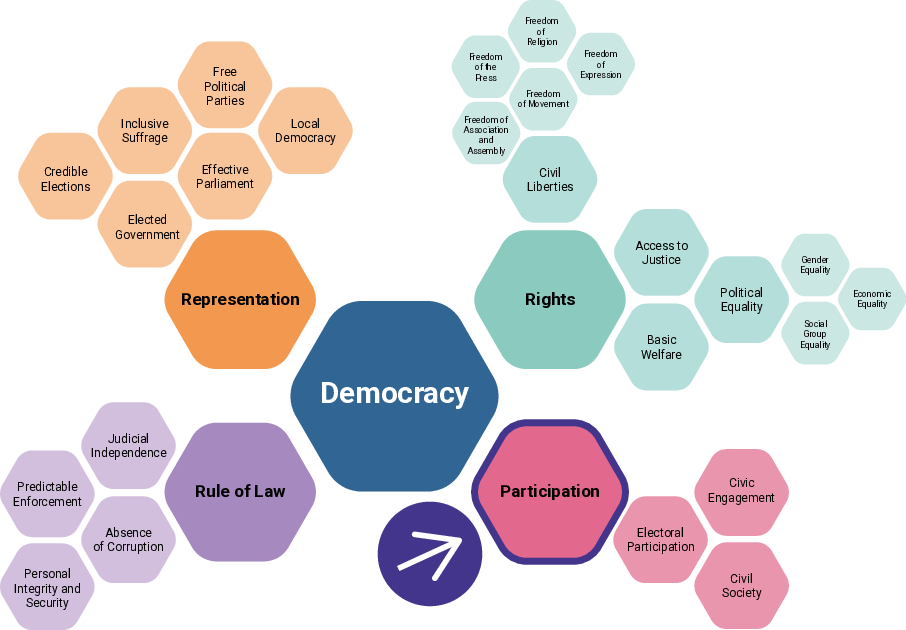
In the GSoD Indices, Participation is an aggregate measure of the extent to which people are actively involved in all levels of government. It is comprised of three factors that measure the space for civil society to freely operate (Civil Society), the extent to which people engage in political and non-political associations and trade unions (Civic Engagement) and voter turnout (Electoral Participation).
While overall change in this category has been limited in recent years, a number of countries continue to demonstrate exemplary levels of public participation. These top performers excel in various subdimensions of Participation, from high voter turnout to robust civil society activity. See Table 2.4 for the top 10 countries in Participation.
| 2024 rank | Country | 2023 rank | Change 2023–2024 | |
|---|---|---|---|---|
| 1 |  | Denmark | 1 | 0 |
| 2 |  | Germany | 7 | +5 |
| 3 |  | Switzerland | 3 | 0 |
| 4 |  | Uruguay | 5 | +1 |
| 5 |  | Norway | 4 | 0 |
| 6 |  | Brazil | 6 | 0 |
| 6 |  | United States | 8 | +2 |
| 8 |  | Taiwan | 2 | -6 |
| 9 |  | France | 15 | +6 |
| 10 |  | Sweden | 12 | +2 |
At the same time, however, Participation remained relatively stable from 2019 to 2024, with only 11 countries experiencing notable changes. Declines (nine countries) outweigh advances (two), and most of the declines occurred in countries that were already low-performing, including Afghanistan, the Central African Republic, Kuwait, Myanmar, Nicaragua and Russia. The two countries that experienced improvement were Brazil and Fiji, both high performers.
There were setbacks in Civic Engagement and Civil Society, with 22 total declines recorded across these two factors, compared with only 5 advances. Deterioration in Civic Engagement was observed in low-performing and mid-range-performing countries, with African countries accounting for 58 per cent of all declines. At the same time, the region continues to perform relatively well on this measure overall: 6 of the 20 highest scores in Civic Engagement are found in African countries (Botswana, Gabon, Ghana, Mauritius, Senegal and South Africa).
Compared to 2019, declines in Civil Society were limited to 10 countries and were more evenly distributed across all regions, with the exception of the Americas. The latter saw no declines in this factor and only one in Civic Engagement (Nicaragua). At the same time, the five-year window from 2019 to 2024 belies the actual situation, as there are more deep-seated concerns about shrinking civic space in the region. A longer view of 10 years reveals significant declines in civil society’s ability to operate freely in mid-range-performing Argentina, Bolivia and El Salvador, as well as in low-performing Nicaragua and Venezuela.
Advances at the factor level were rather limited (see Figure 2.8). Civic Engagement improved only in France, and Brazil, Fiji, Malawi and Zambia experienced improvements in Civil Society. The latter four countries are all relatively high-performing contexts with respect to these factors.
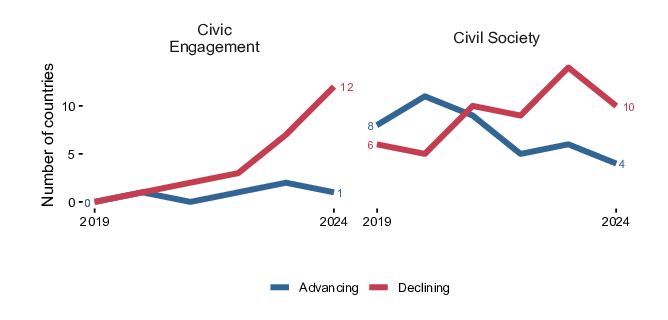
Civil Society and Civic Engagement
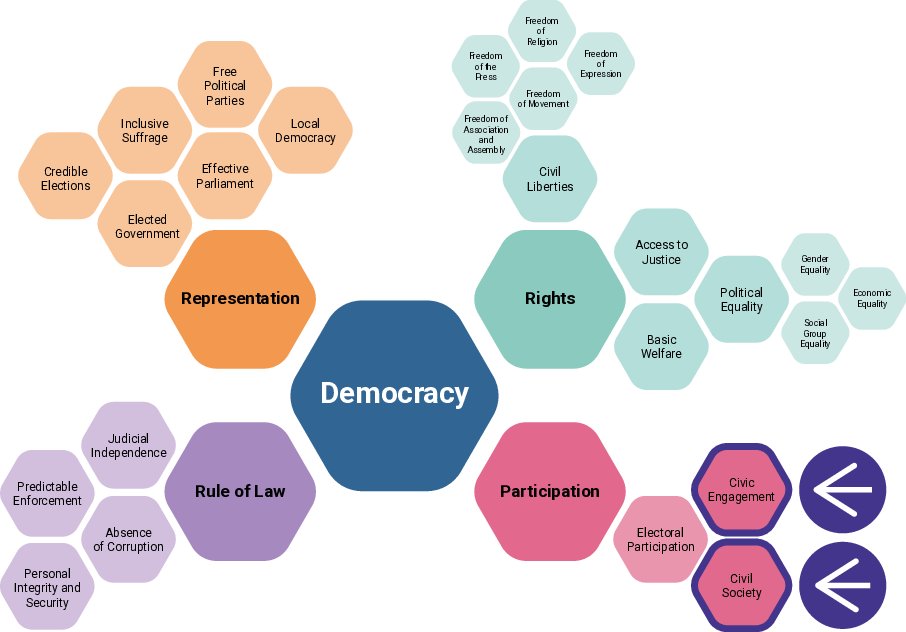
The Civil Society index aggregates indicators that measure the extent to which organized, voluntary, self-generating and autonomous social life is institutionally possible.
The Civic Engagement index measures the extent to which people engage in political and non-political associations and trade unions, as well as mobilization for democracy. We also include an indicator of civil society traditions.
Public participation at all levels of government and in local communities is a key aspect of any thriving democracy. Civil society is often the backbone of this participation, acting as a channel through which local communities and individuals can express shared priorities and ensure that local needs are not neglected at higher levels of decision making. Alongside the indices of Free Political Parties and Freedom of Association and Assembly, the Civil Society index captures the quality of the environment in which civil society organizations (CSOs) operate. Although there were fewer declines in this index than in many other factors, they largely occurred in contexts that were already challenging and where authoritarian practices had become further entrenched. Comparing 2024 scores to 2019, the countries whose performance declined were Afghanistan, Armenia, Burkina Faso, Georgia, Kuwait, Myanmar, Palestine, Philippines, Russia and Tunisia.
At the same time, there are encouraging examples that underscore how strong civic infrastructure and political will can help reverse participation declines and revitalize inclusive governance. Brazil has long been recognized as a global leader in public participation; its participatory budgeting processes, for example, have been cited as a model since the late 1980s (Cabannes 2004). After a period of decline in the 2000s, there are signals that suggest a renewed commitment to participatory governance. Since taking office in 2023, the new administration has pledged to revitalize participatory budgeting and has introduced additional measures to strengthen citizens’ engagement. In 2023, Brazil launched Participatory Brazil (Brasil Participativo), a digital channel designed to facilitate public input into federal policymaking. The initiative integrates both digital and in-person modalities to mitigate barriers to equal participation. Users can take part in voting processes, deliberations and in-person events. Public participation in the development of the country’s 2024–2027 Multi-Year Plan garnered 8,254 citizen proposals, 76 per cent of which were incorporated into the Plan (Open Government Partnership n.d.).
This chapter presents regional trends in the GSoD Indices data in four broad regions of the world as defined by International IDEA—Africa and West Asia, the Americas, Asia and the Pacific, and Europe. Unless otherwise stated, all data in these sections come from the GSoD Indices. Each regional section is organized in three parts: (a) an overview of the statistically significant changes comparing 2024 to 2019; (b) a snapshot of the current state of democracy in the region; and (c) an exploration of how migration dynamics intersect with democracy in the region, with a focus on the democratic factors most likely to experience change in the near future.
3.1. Africa and West Asia
Net changes in Africa and West Asia
In Africa and West Asia, advances and declines at the factor level were most concentrated in the category of Representation, which accounted for 64 of 157 changes (41 per cent) when comparing 2019 and 2024. As illustrated in Figures 3.1 and 3.2, the overarching pattern is one of decline, especially with regard to Credible Elections, Effective Parliament and Elected Government, all within the Representation category, as well as Access to Justice, under Rights.
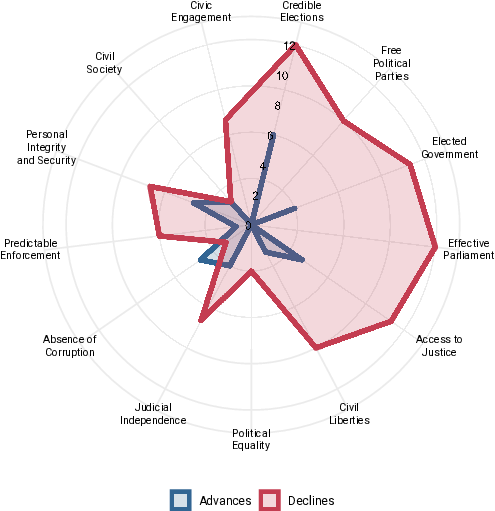
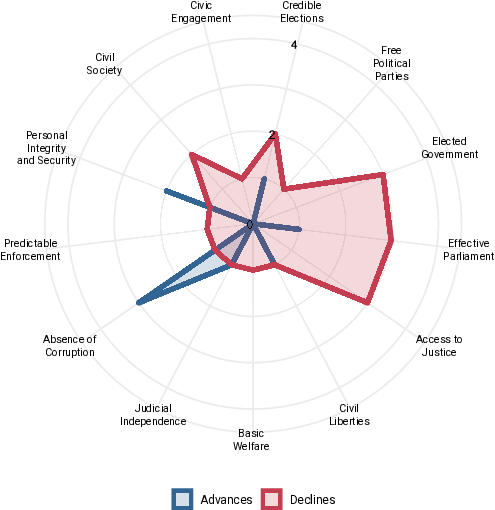
Twenty-three countries (35 per cent) experienced significant declines (comparing 2024 scores to 2019) in at least one of three measures—Elected Government, Credible Elections and Effective Parliament—with 20 of these countries affected by armed conflict, coups d’état or other forms of political instability. This trend is particularly pronounced in West Africa, the subregion with the greatest number of declines in these three factors (20 of 43). In Burkina Faso, Guinea, Mali and Niger, juntas delayed promised elections and extended transition periods, thereby preserving the unelected legislative and executive bodies they have established (International IDEA 2024h, 2024n, 2024am, 2025u). Freedom of the Press has declined in almost one in four countries in the region. While such declines (comparing 2024 scores to 2019) are often a consequence of political instability—as in Burkina Faso and Mali—they can also reflect other dynamics, like regulatory crackdowns in Senegal (Media Foundation for West Africa 2025).
The downward trend, however, is not universal. Botswana and South Africa have both experienced consistent advances over the past five years in Credible Elections and, in 2024, held polls that resulted in historic changes. In South Africa, the long-governing African National Congress lost its absolute majority, leading to the country’s first national coalition government since 1994 (International IDEA 2024l). Botswana witnessed its first transition of power between parties since independence in 1966 (International IDEA 2024af).
In West Asia, Jordan advanced in Effective Parliament comparing 2019 to 2024. A large part of this advance occurred in 2024, when legislative elections resulted in political parties significantly increasing their share of seats in the country’s parliament, marking a shift away from the historical dominance of independent and tribal candidates (International IDEA 2024ab).
Performance at the category level, 2024
While Representation is the weakest category in West Asia and the second-weakest in Africa, regional performance remains poor in most areas, with a majority of countries in the low-performing range with regard to almost every category (see Figures 3.3 and 3.4). The only exception is Participation, in which mid-performing African countries outnumber low performers 38 to 11.
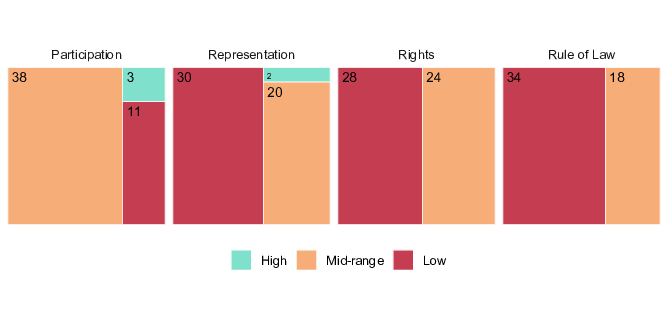
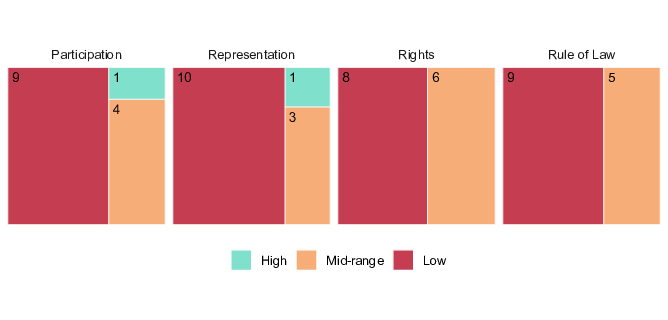
In many countries across Africa and West Asia, a key driver of weak performance has been armed conflict, which undermines social cohesion, destroys infrastructure and erodes fundamental rights (Peace Research Institute Oslo 2024). In Sudan, for example, the prospects of a democratic transition have grown increasingly remote, as civil war has fractured the country and stoked extreme ethnic and gender-based violence (International IDEA 2024ac, 2025k).
What to watch
Conflict has driven up regional migration levels, forcibly displacing communities both within and across national borders, although the vast majority remain displaced within the region (Africa Center for Strategic Studies 2024; IOM 2025). Those displaced externally are often marginalized in host countries and vulnerable to mistreatment by both the government and the populace. Recent events illustrate this dynamic, including the mass arrest and deportation of Sudanese refugees in Egypt (International IDEA 2024q) and violent attacks on their compatriots living in South Sudan during anti-Sudanese riots (International IDEA 2025d).
A key development to watch is the rising political tension in South Sudan, which threatens to return the country to civil war and imperil its first post-independence elections, scheduled for 2026 (International IDEA 2025m). Also noteworthy is the indefinite suspension of Kuwait’s Parliament by Sheikh Meshal al-Ahmad in May 2024 (International IDEA 2024m; Al Jasser and Brown 2025). Taken together, these events indicate that Representation is likely to remain an area of performance change in Africa and West Asia, especially as intraregional migration continues to rise. How both origin and host countries address the issues of citizenship, identity, political participation and rights protections will be important in shaping the region’s democratic outlook (Williams 2025).
3.2. The Americas
Net changes in the Americas
Comparing 2024 to 2019, more countries in the Americas experienced a decline in at least one factor of democratic performance than those with an advance (15 versus 11, respectively; see also Figure 3.5).
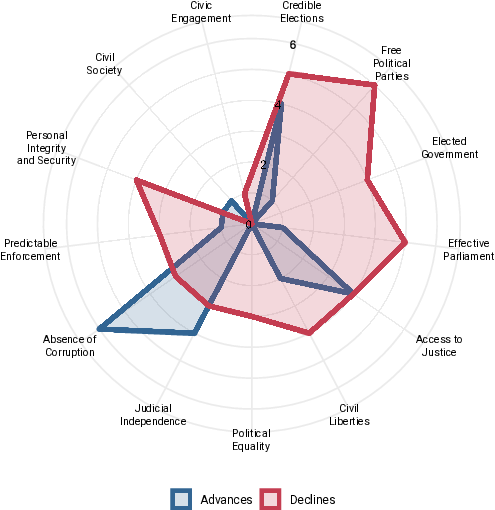
Countries whose performance declined include El Salvador (declined in 10 factors), Nicaragua (declined in 8 factors) and Haiti (declined in 5 factors). Despite the disparate histories of these three countries’ democratic deterioration, there is significant overlap among the deteriorating factors: all three experienced significant declines in Access to Justice, Credible Elections, Elected Government and Free Political Parties.
A plurality of the 45 declines at the factor level (comparing 2019 and 2024) occurred in the category of Representation: five countries declined in Credible Elections; six, in Free Political Parties; four, in Elected Government; and five, in Effective Parliament. The largest declines in these measures—in El Salvador, Haiti and Nicaragua—occurred in cases of democratic backsliding and state collapse (Martinez 2024; Fatton Jr 2025; McConnell 2025). El Salvador and Nicaragua account for two of the region’s three largest declines in Freedom of the Press. Peru also saw a decline in this measure, in part due to persistent violence against and intimidation of journalists (Duchiade 2025; Li 2025).
At the same time, several countries experienced multiple advances at the factor level: Honduras advanced in five factors (Absence of Corruption, Access to Justice, Credible Elections, Judicial Independence and Predictable Enforcement); Brazil, in four (Civil Liberties, Civil Society, Effective Parliament and Judicial Independence); Chile, in three (Access to Justice, Civil Liberties, and Personal Integrity and Security); and the Dominican Republic, in three (Absence of Corruption, Free Political Parties and Judicial Independence). These advancements were more varied in nature than the declines seen in El Salvador, Haiti and Nicaragua. There is no single factor in which all four countries made advances, and only one factor—Judicial Independence—is shared by more than two of the four countries.
There were also some improvements distributed widely across the region, including in Credible Elections (Bolivia, Ecuador, Honduras and the USA) and Absence of Corruption (Dominican Republic, Guatemala, Haiti, Honduras, Suriname and the USA).
Performance at the category level, 2024
At the same time, these downward trends should not obscure the fact that the baseline level of democratic performance across much of the region remains relatively stable (see Figure 3.6). The majority of countries in the Americas continue to perform in the mid-range across most categories and factors of democracy, as they have in recent years. Eleven countries perform in the high range in the category of Representation (only four have low-range performance), and 20 of 27 perform in the high range in the Elected Government factor, reflecting the region’s prevailing commitment to holding periodic elections.
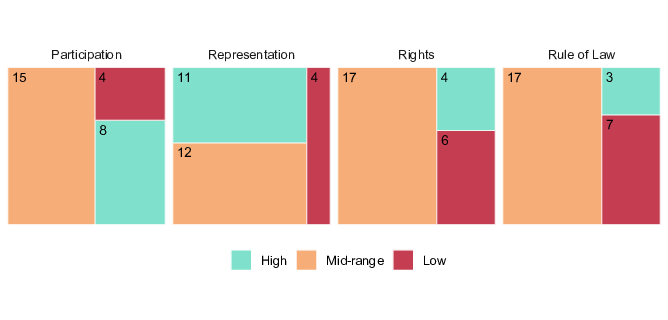
What to watch
Migration is a key issue for the entire region. Intraregional migration has long been substantial, with recent surges in insecurity and ongoing political and economic crises prompting significant migration from countries such as Colombia, Cuba, Haiti and Venezuela (Selee et al. 2023). Anti-migrant sentiment has also been a long-standing challenge, triggered by the perception that insecurity is linked to the transnationalism of organized crime (Asmann and Shuldiner 2024; Lebow et al. 2024). The US Government’s increased restrictions on migrants and asylum seekers (including pushing the boundaries of what is constitutionally permissible) have added to these pre-existing issues and have contributed to more anti-migrant sentiment within the USA (The Economist 2025; International IDEA 2025s).
Political debates on migration in the region are closely linked to long-standing debates over equality, or lack thereof, between different ethnic and racial groups. The GSoD Social Group Equality index measures the extent of such equality in each country. Eighteen of 27 countries in the region score in the mid-range; only Canada, Costa Rica and Uruguay are high-performing. The remaining six countries—El Salvador, Guatemala, Haiti, Nicaragua, Paraguay and Venezuela—are all among the bottom 25 per cent globally. This lagging performance reflects the profound economic inequality in Latin America and the Caribbean, as well as in the USA (IDB 2024).
The intersection of ethnic, racial, gender and income inequalities—particularly as they affect educational and job opportunities—continues to widen the gap between social groups throughout the Americas (Telles et al. 2023; Pan American Health Organization 2024). These inequalities are compounded by pervasive structural discrimination against Indigenous, Afro-descendant and migrant people, which in turn undermines countries’ democratic performance (Washington Office on Latin America 2024).
At the same time, some Latin American countries—including Brazil, Colombia and Uruguay—have introduced positive practices for the regularization and inclusion of migrants, asylum seekers and returning emigrants. These practices offer a potential paradigm shift in the region’s approach to migration, one that could gradually reshape patterns of labour, capital and inclusion. If sustained, such reforms could lead to tangible improvements in Social Group Equality and Basic Welfare in the years ahead.
3.3. Asia and the Pacific
Net changes in Asia and the Pacific
When comparing 2024 to 2019, significant declines at the factor level outnumbered advances 60 to 23 across the whole region, with the average magnitude of decline exceeding that of the average advance. The factors that saw the most change across the region were Access to Justice (changes in 13 countries), Credible Elections (9 countries) and Effective Parliament (9 countries) (see Figure 3.7).
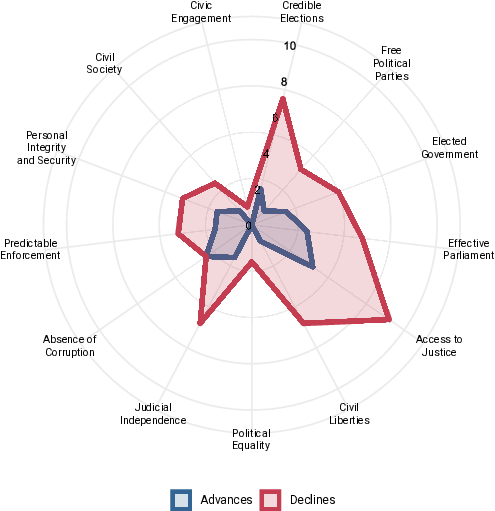
The majority of factor-level changes occurred in the subregions of South and South-East Asia, which accounted for 55 of 83 changes. Excluding the outliers of Afghanistan and Myanmar, Bangladesh is among the countries that saw the most changes in these subregions, with large declines in Credible Elections, Elected Government and Effective Parliament as well as advances in Predictable Enforcement and Personal Integrity and Security. The reasons for the declines are multifaceted: some can be credited to the repressive policies of former Prime Minister Sheikh Hasina’s government, and others, such as Elected Government, are a result of the temporary replacement of an elected, if authoritarian, government with an interim unelected one (International IDEA 2024v). The ongoing reform processes this government is carrying out to reset Bangladeshi democracy following Hasina’s resignation and flight from the country, as well as a general election due to be held by early 2026, may reverse or reinforce some of these trends.
Fiji had 11 positive changes at the factor and subfactor levels, the most in the entire region, including in Civil Society, Credible Elections, Effective Parliament, Freedom of Expression and Freedom of the Press. Most of the changes occurred in 2023, reflecting the relative consolidation of democratic institutions following the electoral defeat and political sidelining of former Prime Minister Frank Bainimarama (International IDEA 2024k).
Kyrgyzstan is among the countries with the highest number of declines in the region. Under Sadyr Japarov’s presidency, there have been declines in Access to Justice, Civil Liberties, Credible Elections, Political Equality, Predictable Enforcement, and Personal Integrity and Security, reflecting the centralization of power in the presidency and restrictions on civil society and independent media (International IDEA 2025i, 2025p).
India declined in five measures (comparing its 2024 scores to 2019). These declines included Free Political Parties and Judicial Independence, reflecting, among other things, repeated federal investigations into members of the opposition Indian National Congress Party in the run-up to the 2024 general election (International IDEA 2024d, 2024e). Contrary to pre-election concerns, independent observers considered the election to have been well-organized and fair, and all political actors involved immediately accepted the results. Despite warnings that the ruling Bharatiya Janata Party would mobilize state resources to suppress the opposition, it instead secured 63 fewer seats in the Lok Sabha, the lower house of parliament, and lost the absolute majority it had held in the chamber since 2014 (International IDEA 2024p).
Declines were not limited to mid- and low-performing countries. South Korea recorded six declines, including in Civil Liberties, Political Equality and Predictable Enforcement. While these developments coincided with the political crisis surrounding former President Yoon Suk Yeol’s declaration of martial law and his subsequent impeachment, they also reflect longer-term trends and earlier events in Yoon’s administration, such as labour disputes that escalated into nationwide strikes for truckers and doctors, and efforts by the presidential administration to restrict press freedom (International IDEA 2022a, 2024f, 2025t).
Performance at the category level, 2024
Despite the prevailing trend of democratic decline, the overall quality of democracy in the region remains moderate to high. As seen in Figure 3.8, most countries in Asia and the Pacific are high- or mid-range-performing across all categories. Regional averages for all four categories remain close to their all-time high, with no category average falling more than 0.03 points (on a scale from 0.00 to 1.00) below its peak performance. Sri Lanka’s 2024 presidential and parliamentary elections—marked by relative peace and the surprise victory of the former revolutionary Anura Kumara Dissanayake—account for gains in Predictable Enforcement and Personal Integrity and Security (DeVotta 2025). Further advances in other measures of democracy will depend on whether Dissanayake’s government delivers on its promise of anti-corruption and stability.
However, these averages do not reflect disparities between categories and across countries. The region’s strong performance in Participation is partly driven by very high Electoral Participation scores reported in several authoritarian states, including Laos, Tajikistan, Turkmenistan and Vietnam—figures that are widely understood to be inflated or misreported (Radio Free Europe/Radio Liberty 2012; OSCE/ODIHR 2021; Sochua 2021; Tuoi Tre News 2021). A plurality of countries in the region are also low-performing in Rights and Rule of Law, which continue to be the weakest categories.
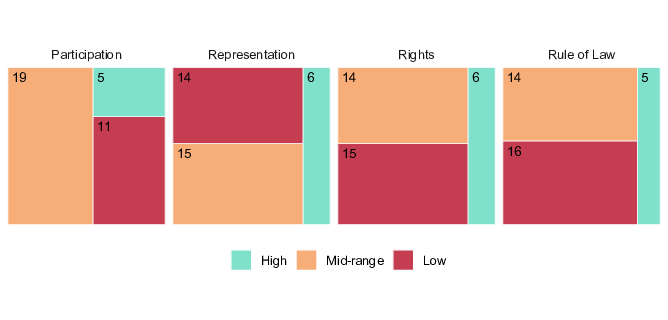
What to watch
South and South-East Asia are likely to remain in democratic flux. In addition to Bangladesh’s complex reform processes and the high-stakes trial of former Philippines President Rodrigo Duterte at the International Criminal Court, the region must also contend with challenges as varied as the aftermath of the worst fighting between India and Pakistan in a generation and concerns over the increasing role of the military in civilian politics under Indonesian President Prabowo Subianto (International Crisis Group 2024; International IDEA 2025g, 2025n). The region and its relationship with the broader world are also rapidly changing, and democratic institutions may have to adapt to keep pace—for example, the significant global growth in South–South migration over the last 30 years is largely attributable to a migration pipeline from South Asia to the Middle East that barely existed in 1990 (Schewel and Debray 2024). Given the significant population of intraregional migrants (many of whom are internally displaced or are refugees from within the region), electoral processes will need to be adapted to ensure that an increasingly mobile population is not disenfranchised (Spinelli forthcoming).
3.4. Europe
Net changes in Europe, 2024
Europe saw 63 declines and 23 advances at the factor level when comparing 2024 to 2019 (see Figure 3.9). The factors of Civil Liberties and Credible Elections accounted for the most declines (10 and 9, respectively). Nearly half of all declines (28 of 63) occurred in Eastern Europe, with the majority driven by crackdowns on civil society and political opposition in Belarus, Georgia and Russia (International IDEA 2024i). In Georgia, curbs on impartial public administration and the media have precipitated declines in Predictable Enforcement and Civil Liberties (International IDEA 2024an, 2025e).
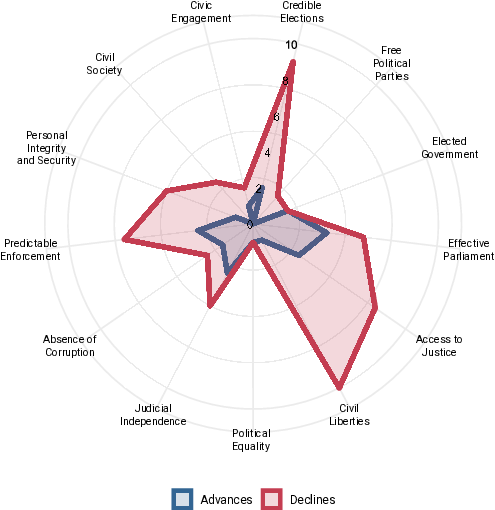
In contrast, Czechia and Montenegro experienced the highest numbers of improvements among European countries (five and four, respectively). In Czechia, the advance in Absence of Corruption can be credited in part to new and expanded whistleblower protections (International IDEA 2023c). Poland saw advances in Civil Liberties, Effective Parliament and Predictable Enforcement, which can be attributed to a new government that has implemented more robust parliamentary oversight and other rule-of-law reforms (International IDEA 2023d).
Another notable trend is that one in three countries in Europe saw a decline in Freedom of the Press from 2019 to 2024. This includes countries where Civil Liberties have been negatively affected by Russia’s full-scale invasion of Ukraine—Belarus, Ukraine and Russia itself. However, declines were also observed in EU member states, including Italy, whose intelligence agencies used spyware against migrant rights activists and journalists (International IDEA 2025r), and Slovakia, where the 2024 closure of the public broadcaster was decried as political interference in independent media (International IDEA 2024o).
Performance at the category level, 2024
While some recent declines have been observed in Civil Liberties, Freedom of the Press and other areas, Europe remains the highest-performing region in the GSoD Indices. An overwhelming majority of all 45 European countries remain high- or mid-range-performing in all categories of democratic performance: the weakest performance is in the category of Rule of Law, where 11 per cent of countries are low-performing (see Figure 3.10).
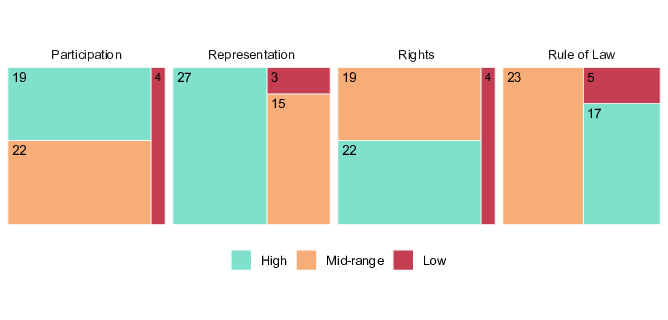
What to watch
As documented in International IDEA’s Democracy Tracker, issues such as the equitable treatment of migrants and minority communities and the state’s adherence to principles of non-discrimination pose a challenge to democratic resilience. Because such issues often concern non-citizens or marginalized groups, they are difficult to capture in standard quantitative indices of democracy, which tend to focus largely or solely on the rights of legal citizens (Cheesman et al. 2024).
These measurement gaps are particularly relevant in the context of evolving migration policies. For example, European governments have increasingly turned to methods such as outsourcing migration management. Italian-funded migration centres in Albania have raised human rights concerns and fuelled tensions between Italy’s Government and judiciary (International IDEA 2024c, 2024ao). A legal challenge to parts of Denmark’s Law on Public Housing—commonly referred to as the ‘ghetto law’—is currently awaiting a final ruling by the European Court of Justice, which will determine whether it constitutes ethnic discrimination under the EU’s Race Equality Directive (Court of Justice of the European Union 2025; Ganty and de Vries 2025). Finland, Poland and several other countries have adopted emergency legislation that permits the temporary suspension of the right to asylum (International IDEA 2024t, 2025q). In 2025, the European Court of Human Rights ruled that Greece had carried out systematic pushbacks in violation of human rights standards (International IDEA 2025a).
By contrast, Spain has led efforts to regularize the status of undocumented immigrants, recognizing migration’s economic and cultural contributions (International IDEA 2024aj). France has also approved access to legal aid for undocumented immigrants (International IDEA 2024j).
Looking ahead, Poland may be a country to watch, particularly in terms of how the reformist government of Donald Tusk navigates its relationship with the new opposition-aligned President, Karol Nawrocki (Easton 2025). In the Western Balkans, the forthcoming publication of a European Court of Human Rights ruling will be significant for ongoing debates about the role of ethnic identity in the way political rights are conferred in Bosnia and Herzegovina. The court’s conclusions, announced in June, overturned a 2023 judgment9 that found discriminatory treatment in state-level elections based on ethnic and territorial requirements (International IDEA 2023b). Also relevant to the region’s Social Group Equality scores are upcoming rulings by the European Court of Justice and the European Court of Human Rights regarding alleged pushbacks in Latvia, Lithuania and Poland at their borders with Belarus—cases that may set important legal precedents regarding the human rights implications of instrumentalized migration.
4.1. Introduction
Using both quantitative and qualitative methods, this chapter of the report examines the relationship between migration and democratic participation, addressing a core question that democracies face in an age of large-scale migration—how to extend the franchise to citizens residing outside the physical territory of their country of origin or nationality. As rates of international migration grow, democracies may increasingly contend with questions about whether and how to design and implement systems for out-of-country voting (OCV). Indirectly, the report explores whether resilience in democracies is better served by expanding the demos or safeguarding its internal coherence.
The issue of migration is only set to grow in importance, as global migration flows are almost certain to increase in the coming decades—driven by conflict, climate change, inequality and digital mobility. Given the ever-increasing numbers of people living outside their home countries, the inclusion of non-resident citizens in political processes is a pressing democratic question, not a peripheral one. Electoral management bodies (EMBs) and legislators must act now to ensure that systems are fit for purpose, as enfranchisement across borders becomes a defining issue for the future of democratic legitimacy. This report intends to help them navigate that challenge.
The report focuses on the technical, legal and institutional dimensions of voting rights for citizens residing abroad (for a note on terminology, please see Box 4.1). It provides an overview of where OCV exists, explains how it works in practice and examines levels of participation. It also provides a set of policy recommendations for legislatures that may consider adopting or amending OCV systems, for EMBs and other agencies that are responsible for implementing and overseeing OCV, and for civil society organizations (CSOs) that advocate for OCV reforms.
International migration raises political debates around citizenship and identity that are complex and often contentious. Although International IDEA has examined the ways in which immigrants can and cannot participate in the political processes of host countries—for example, in a context of resident non-citizen voting (International IDEA 2025c) or recent US deportation policies (International IDEA 2025s), these are topics that are beyond the scope of this report. Instead, the analysis is confined to the institutional mechanisms for electoral inclusion of citizens living abroad, not addressing the broader political or normative considerations surrounding citizenship and the political inclusion of immigrants in host countries. It also examines some of the key debates related to extending the franchise across borders, including questions around what may and may not justify inclusion, as well as the financial, administrative and logistical challenges to implementing OCV procedures.
While migration intersects with many political and social dynamics, this report remains anchored in three decades of International IDEA’s core area of expertise—the institutional and procedural dimensions of democratic participation, especially in relation to electoral enfranchisement for citizens abroad. The report builds on International IDEA’s data resources, including trends identified in the GSoD Indices and in the Democracy Tracker, especially related to metrics of Social Group Equality, and data on electoral processes and OCV, including the design of OCV modalities, diaspora voter turnout data and context-specific OCV experiences (Ellis et al. 2007; Aman and Bakken 2021; International IDEA 2022b). International IDEA’s most recent work on this topic includes case studies on the challenges to enfranchisement in the context of mobility in South Asia (International IDEA n.d.a) and a report on the practice of out-of-country campaigning by political parties in Europe (Otiashvili et al. 2025). In addition to the above, the report uses international migration data primarily from the UN Department of Economic and Social Affairs (UNDESA) to track long-term trends in migrant stock by region, income group and over time. It also relies on International IDEA’s Voting from Abroad Database, which includes legal provisions and practices regarding OCV across 216 countries, including data on voting methods, eligibility criteria and regulatory gaps, as available. Additional data from the GSoD Indices, particularly regarding performance in the category of Representation, compare migrant stocks with democratic quality in origin and destination countries. Turnout data collected by International IDEA from 210 national elections between 2002 and 2025 are analysed to assess levels of diaspora participation. The empirical findings are supported by references to academic literature and country case examples to contextualize the data and explore normative implications.
While international data sets and electoral reports provide valuable comparative insights, data availability and quality remain uneven. Turnout and registration figures for OCV are inconsistently collected and reported, with limited disaggregation by voting method or eligibility category. Legal provisions do not always translate into meaningful access, and implementation gaps, particularly in lower-capacity or conflict-affected settings, are often poorly documented. Widely used migrant stock figures include non-voting populations and do not capture variations in citizenship retention or political engagement. These limitations point to the need for more comprehensive and policy-relevant research, including on the credibility and accessibility of OCV mechanisms, perceived barriers among diasporas, the role of political parties and campaigning across borders, and host-country responses to extraterritorial representation. Expanding and standardizing data in these areas would enable more informed policy decisions and help ensure that diaspora enfranchisement supports democratic resilience in both sending and receiving countries.
Box 4.1. Terminology
Discussing migration and democracy requires specialized terminology that reflects more than the emigrant/immigrant distinction and emphasizes matters of citizenship and residence. We use the term ‘non-citizen residents’ when discussing voting rights with reference to migrants’ country of destination and mirror this term with ‘non-resident citizens’ when discussing voting rights in the country of origin. A key concern of this analysis is ‘diaspora enfranchisement’, meaning the legal and practical ability to participate in political processes—especially elections—for non-resident citizens.
The remainder of this section provides an empirical overview of migration flows, regime characteristics of origin and destination countries, and comparative experiences with OCV. The report concludes with a set of recommendations to support context-appropriate OCV system design.
The boundary problem
As people traverse state boundaries and forge transnational identities, the so-called boundary problem, first raised by Robert Dahl (1970: 60) more than half a century ago, is again relevant. What determines who ‘the people’ of a state are? Answering this question is pivotal, largely because it determines who does and does not ‘belong’ and who can legitimately claim rights to equal participation—an issue at the heart of democratic systems (Dahl 1998: 65; Song 2012: 41). Today, this question is no longer abstract: countries must now define electoral and participatory rights for growing numbers of non-resident citizens in diasporas around the world.
Even though the borders of many modern-day countries were not democratically drawn, the assumption has long been that these borders define the citizenry. The resulting tautology, however, presents a problem: if the people determine the boundaries of a country, then the boundaries cannot, in turn, define the people (Zilla 2022: 1524). International migration and the transnational identities and relationships it generates pose a further challenge—determining how democracies conceptualize ‘the people’ and their rights to participation and representation when identities and affiliations stretch across borders. For countries of origin, international migration raises practical questions. For example, how can non-resident citizens—whether long-term emigrants, temporary workers, students, exiles or leisure travellers—continue to participate in national elections? What legal and institutional frameworks exist to ensure this participation, and how does such participation affect both emigrants and those who remain?
While there are many drivers of migration and several categories of migrants that are based on those drivers, such classifications are primarily relevant to analysis that focuses on migrants’ rights in destination countries, where they are immigrants. In contrast, the present analysis focuses on participation in migrants’ countries of origin, where the reasons for and contexts of their departure have less impact on the laws and mechanisms established by origin-country authorities to ensure their continued political participation.
4.2. Global trends in migration
The human experience with migration encompasses two superficially contradictory truths. First, our species has always engaged in migration, often at a significant scale (Manning and Trimmer 2020). Second, most humans throughout history have never travelled very far from the place where they were born—a pattern that remains true today. This reality is reflected in 2024 data: while international migration is an important political issue in many countries (both sending and receiving ones), the number of international migrants worldwide in 2024 was estimated at 304 million people, or 3.7 per cent of the global population (UNDESA 2025). In other words, 26 of every 27 people alive today still make their home in the country of their birth. Moreover, when people do migrate internationally, the majority stay within the continent of their birth (see Figure 4.1).

However, the trend over the past three decades has been towards ever higher levels of international migration (see Figure 4.2), and this trend is expected to continue (Azose and Raftery 2015; Dao et al. 2021). In 1970, the share of the global population who had migrated internationally was only 2.3 per cent (McAuliffe and Oucho 2024). The change in terms of the percentage of the global population is modest compared with the absolute increase, growing to 2.9 per cent in 1990 and 3.7 per cent in 2024 (McAuliffe and Oucho 2024; UNDESA 2025). However, as Figure 4.2 illustrates, the total number of people who have migrated internationally grew from just over 150 million in 1990 to more than 300 million in 2024.

Domestic migration has also been a key demographic phenomenon in the 21st century, as patterns of urbanization continue apace, and this trend is particularly notable in developing countries (UNDESA 2018). However, the focus of this report is on international migration, given its distinct implications for participation and enfranchisement across borders.
Drivers of migration
Those who migrate internationally do so for a variety of reasons—many by choice, but many others do so owing to factors outside their control. The International Organization for Migration, for example, describes a continuum between voluntary and forced migration (IOM n.d.b). Factors that drive the decision to migrate are commonly grouped into five categories—political, demographic, economic, social and environmental (IOM n.d.b).
It is important to note that the data on migration presented here are estimates of migrant stock from UNDESA in both sending and receiving countries (country dyads).10 This means that long-term migrants are counted alongside recent movers, without distinction. Still, stock data can reveal patterns that have important economic and democratic implications. First, migration from low-income countries to high-income countries is much rarer than commonly perceived and accounted for only a small portion (5 per cent) of the total migrant stock in high-income countries in 2024. While high-income countries are the destination for the majority of migrants, a large proportion come from other high-income countries, and the majority come from middle-income, not low-income, countries (see Figure 4.3). This dynamic is consistent with long-standing empirical research on migration, dating back to the 19th century (Ravenstein 1889) but especially formalized in the second half of the 20th century (Zelinsky 1971).
Second, economic opportunities remain the most significant driver of migration decisions, but politics and political regimes have also become important factors over the last half century (Breunig, Cao and Luedtke 2012). One economic concern that has received growing attention is the departure of skilled professionals from middle-income countries (Docquier, Lohest and Marfouk 2007). Migration has different impacts on the labour market in high-income and low-income countries. For example, rising inequality has been shown to lead to more restrictive immigration laws in low-income countries but less restrictive ones in high-income countries (Peters and Shin 2023).

4.3. Migration and democracies
There is a well-established, strong and positive correlation between national wealth and democratic performance (Lipset 1959; Przeworski et al. 2000). It follows, then, that the patterns of international migration also reflect this relationship, as the majority of migrants have settled in countries with both higher levels of development and higher levels of democratic performance. Figure 4.4 illustrates this relationship by connecting migration stocks to performance in the category of Representation, which includes indicators commonly associated with many core attributes of representative government (such as credible elections, free political parties, effective parliaments and other aspects of representative government) in both the country of birth and the country of residence for migrants in 1990 and 2024. Tens of millions of people have migrated between high-performing countries, but relatively few people have migrated from high-performing countries to mid-range-performing (4.5 million people) or low-performing ones (1.7 million people) (see Figure 4.4).
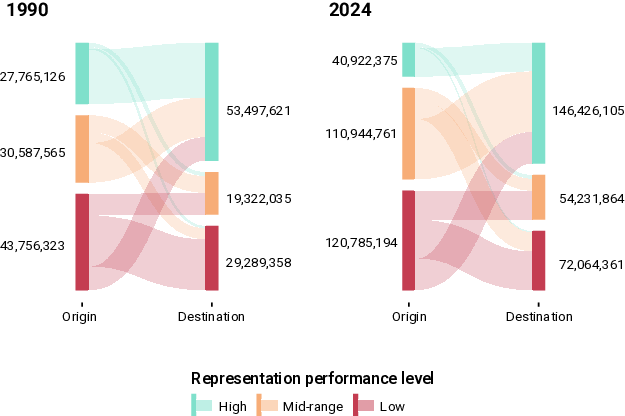
This aspect of the relationship between migration and democracy raises two important issues that merit closer examination. First, since high-performing countries host relatively larger numbers of immigrants, the major challenge they face concerns the scale and meaningfulness of the inclusion of non-citizen residents in their democratic institutions and processes. In Australia, for example, immigrants from non-democratic contexts may struggle to understand how to meaningfully exercise their rights and express their preferences (Cultural & Indigenous Research Centre Australia 2006; Yim 2025). Second, as mid-range- and low-performing countries are the countries of origin of a relatively larger number of emigrants, their primary challenge concerns the inclusion of their non-resident citizens in domestic democratic institutions and processes. The first issue involves questions around the expansion of the franchise and the conditions under which immigrants can gain citizenship through naturalization. This is an area with important normative considerations, and for which there is less empirical basis for policy recommendations.
The second issue is more straightforward for many countries. If a polity decides (as many have) that non-resident citizens should retain the right to vote, the issue shifts from one with normative burdens to an essentially logistical problem. As we discuss in this report, there are multiple methods by which non-resident citizens can vote, and countries across a broad range of economic and political contexts have found ways to make this possible.
While economic factors are far more important to most immigrants than democracy (Breunig, Cao and Luedtke 2012), the correlation between wealth and democratic performance implies that many people want to immigrate to democracies. However, given the large number of people who have migrated internationally, there are also tens of millions of people who have migrated to a country with worse democratic performance than the country of their birth. This often occurs in the context of what has been called ‘South–South migration’ (Schewel and Debray 2024).
Migration, democracy and resilience
Regardless of how ‘the people’ are defined, empirical research has found that voting rights contribute to a sense of belonging, referred to here as both knowing the rules and being involved in their creation (Mijić 2022: 1111–12). Some research links this sense of belonging to greater support for democracy and finds that the possession of the right to vote confers social standing and dignity (Shklar 1991, as cited in Song 2009: 607). Voting rights have also been found to reinforce loyalty to diaspora groups’ home countries (See Box 4.2) (Wucker 2004).
This connection between enfranchisement and civic belonging can be particularly evident in the case of countries experiencing large-scale displacement due to conflict. In Ukraine, for example, many of those forced to flee following the Russian invasion have maintained a strong sense of national identity and a desire to remain engaged in the country’s democratic and recovery processes. However, surveys consistently find that a majority of those who have left the country would prefer to stay abroad permanently (IOM 2024; Süddeutsche Zeitung 2024; Mykhailyshyna et al. 2025). Ensuring meaningful voting rights for citizens abroad can thus serve as both a symbol of and a mechanism for inclusion, ensuring that they remain integral members of the national community as well as supporting post-war recovery and long-term social cohesion.
Belonging has also been linked to democratic resilience, with some studies suggesting that people who feel a stronger sense of belonging are more likely to promote ‘principled support’ for democracy (Fitzgerald et al. 2023: 237 and 248). In this way, a sense of inclusion promotes resilience, defined by International IDEA as the ability to ‘cope, survive and recover from complex challenges and crises that represent stresses or pressures that can lead to a systemic failure’ (International IDEA 2017; Sisk 2017: 5). The properties that make up this resilience are flexibility, recovery, adaptation and innovation. A resilient democracy is one that can leverage these properties to effectively navigate complex challenges and overcome crises, ensuring its survival and continuity without compromising performance (Sisk 2017). The resilience of democratic systems can be exhibited in two overarching ways: (a) through robust institutions and through mass demand, in the form of CSOs and free media; and, when these avenues fail, (b) through the public exercise of the right to associate, speak and protest. Previous GSoD reports referred to this network of institutions as ‘countervailing institutions’ (International IDEA 2023a).
Box 4.2. Enfranchisement leads to greater resilience

Members of diaspora communities may feel a transnational sense of belonging, characterized by attachment to both their countries of origin and their host countries (Schlenker and Blatter 2013). However, questions remain about the extent to which they should participate in national decision making in their countries of origin—particularly when emigrant populations are large or unlikely to return.
Regardless of countries’ motivations to extend the franchise to diasporas, it is important to consider how this expansion may impact resilience. Given that large diasporas can skew electoral outcomes as well as deepen or soften domestic divides, does resilience come from expanding the demos or from protecting social cohesion through territorial coherence?
4.4. Diaspora enfranchisement: Normative and political dimensions
Why countries extend voting rights to diasporas
Countries extend voting rights to their diasporas for a range of historical, symbolic, economic and strategic reasons. While the legal frameworks vary, a comparative view reveals several recurrent motivations.
In some cases, these extensions reflect recognition of changes in national borders that have excluded co-ethnics who now live outside the current boundaries. In other cases, transitions from authoritarian rule to democracy have prompted the enfranchisement of exiles who remained committed to democracy in their homelands. Some countries have extended voting rights to citizens abroad in recognition of wartime sacrifice, while others have linked diaspora voting to tax obligations of citizens residing abroad. In some cases, countries may have multiple motivations for extending the franchise, including the hope that expatriates will support a specific political party (Baubӧck 2005: 684).
First, diaspora enfranchisement can be a nation-building tool, reinforcing symbolic ties between a country and its citizens abroad. For countries that have undergone conflict, authoritarian rule or colonialism, extending the franchise can be part of a broader project of inclusive citizenship. For example, Tunisia’s extension of voting rights to non-resident citizens followed the 2011 revolution and was framed as an act of democratic renewal and unity. Similarly, France has long treated its expatriates as integral members of the nation, granting them representation in the legislature and creating the Assembly of French Citizens Abroad—highlighting the symbolic inclusion of its global citizenry.
Second, economic motivations play a role in the extension of voting rights to diasporas. In addition to the argument that non-resident citizens’ tax obligations justify their continued voting rights, remittances can be a vital source of revenue for countries of origin. Some countries have granted enfranchisement specifically because they understood the benefits of remittances and wanted to cultivate a continued sense of membership among those non-resident citizens (Bauböck 2005; Gamlen 2006). Evidence shows also that there is a significant correlation between dual citizenship and financial inflows to the country of origin (Cisterino 2012). In Samoa, for example, most citizens (both migrants and foreign-born citizens) live abroad and have historically been engaged in politics through campaigning for and donating to candidates and political parties (Godfrey 2021). The country is also heavily dependent on remittances, which make up about 20 per cent of its gross domestic product in most years (Federal Reserve Bank of St. Louis 2024). Whether or not to extend the franchise is a subject of contentious debate, both domestically and in the diaspora (Fonua 2024). This debate can raise a question of democratic legitimacy: if political systems continue to benefit economically or symbolically from their emigrants, do they not also have an obligation to meaningfully enfranchise them?
Third, transitional-justice contexts provide a distinct rationale. For countries recovering from conflict or repression, granting voting rights to exiles and refugees can help repair broken ties and support legitimacy. For example, South Africa’s first democratic election, in 1994, included provisions for overseas voting as a way to reconnect with citizens forced into exile during apartheid.
Finally, some governments have extended voting rights strategically to strengthen their electoral base. Hungary’s decision to enfranchise ethnic Hungarians abroad—many of whom are strong supporters of the ruling party—demonstrates how diaspora enfranchisement can be shaped by partisan calculations. Similarly, Turkey’s Government has benefited electorally from the votes of citizens abroad, particularly in Germany and the Netherlands.
These motivations often overlap, and they manifest differently depending on national histories, migration patterns and political incentives. Recognizing this diversity is essential to understanding the complexity of diaspora enfranchisement policies.
Normative debates on diaspora voting
There are no definitive answers to the questions of whether and in what ways non-resident citizens should participate in elections in their countries of origin. Several debates illustrate the challenges involved.
First, while many emigrants may maintain strong ties with their home countries, some experts argue that they do not directly experience the consequences of domestic political decisions and are insufficiently affected to have the right to participate.
Second, while it is true that remittances may play pivotal roles in national economies, poverty reduction and development, diasporas contribute these funds voluntarily without necessarily reflecting a sense of civic obligation or entitling the diaspora to electoral participation.
Third, while proponents of diaspora voting argue that it helps strengthen national unity, critics contend that large overseas communities may distort electoral outcomes and influence policies in ways that may favour overseas voters’ interests over those of the domestic population.
Fourth, some supporters argue that enabling diaspora voting can help counter globally declining turnout trends and broaden political engagement. Opponents claim that historically low turnout rates among overseas communities make it hard to justify the financial and administrative costs of these mechanisms (Song 2009; Abizadeh 2010; Spinelli forthcoming). OCV systems may be resource-intensive, in terms of both administrative and operational burdens as well as financial costs. Factors that contribute to these costs include the design, delivery and retrieval of election materials, the development and execution of voter education campaigns, training, transportation and other costs related to preparing staff, the development and maintenance of IT systems, the development and implementation of security arrangements, the processing of registration applications and votes, and the planning and coordination of strategies and monitoring of OCV as well as interactions with other agencies (both domestically and in host countries).
The costs can also be thought of in terms of risk. Proxy voting, which is one of the lowest-cost options, is often considered inadvisable because it may create substantial opportunities for vote buying, coercion and misuse of authority. Online voting, on the other hand, is costly to establish but may be one of the most user-friendly options in the long run (Ehin et al. 2022). At the same time, it can be difficult to balance transparency and security requirements in an online environment (Aman and Bakken 2021).
Mitigation strategies may include a threshold requirement for the implementation of OCV. For example, Senegal requires that at least 500 citizens resident in a foreign country register to vote from abroad before polling stations are established in that country. This decision reflects evaluations of the costs and benefits of facilitating OCV for small communities residing overseas (ACE Electoral Knowledge Network n.d.a). Another mitigation strategy is providing for OCV through postal voting, which is a low-cost option, in terms of both financial and administrative burdens.
These tensions reflect deeper normative questions over who constitutes ‘the people’ in an age of transnational belonging. Still, enabling diaspora participation may serve as a tool for democratic resilience, extending norms of inclusion and accountability beyond borders.
5.1. Legal provision of voting methods
Types of out-of-country voting
The provision of opportunities for emigrants to vote from abroad has a long history. For example, Australia introduced postal voting for its citizens living abroad more than a century ago (Aman and Bakken 2021). Today, there are many ways in which countries can facilitate out-of-country voting (OCV), including in-person voting (often at consulates or embassies abroad), postal voting, proxy voting and online voting (International IDEA n.d.d; Ellis et al. 2007). As communications technology has rapidly improved over the past century, electoral management bodies (EMBs) have introduced new methods for voting from abroad. Nonetheless, in-person voting at a polling station abroad remains the most common method of OCV (Pearce Laanela 2021).
International IDEA’s Voting from Abroad Database collects data on the forms of OCV provided by 216 countries (International IDEA n.d.d). As illustrated in Figure 5.1, only 52 (approximately one quarter) of these countries do not provide any means of voting from abroad (13 in Africa, 17 in the Americas, 14 in Asia and the Pacific, 4 in Europe and 4 in West Asia). The majority of countries that do provide for voting from abroad allow only for in-person voting (for example, at diplomatic missions), while a large number provide for multiple methods. Electronic means of voting (e-voting) are more common than Figure 5.1 would seem to indicate: while only 3 countries provide e-voting as their sole method (Armenia, Namibia and Oman), 18 others provide for it along with other options. However, these figures may overstate effective access: in some jurisdictions, access to OCV is limited to non-resident citizens in particular circumstances (such as being an employee of the government or a member of an employee’s family, a military service member or a student studying abroad).

Methods of voting from abroad have been relatively stable since International IDEA began collecting such data in 2007 (see Figure 5.2). Note that, unlike in Figure 5.1, each form of voting is treated separately in Figure 5.2, so some countries appear, for example, in both the ‘Personal’ and ‘Postal’ lines.
Proxy voting has become somewhat less common in 2025 than it was in 2007. However, the share of countries with no provision for OCV has remained fairly steady. Likewise, despite the interest that online voting attracts, its use in OCV has increased very little over the past two decades, and it has actually declined in domestic voting (Darmawan 2021). At present, only about 7 per cent of countries provide for some form of e-voting in OCV (not necessarily using the Internet). E-voting in the context of OCV may take place in an essentially in-person format through the use of an electronic voting machine at a polling place abroad. However, online voting, which would be the most accessible option, poses significant challenges relating to cybersecurity, inequities in access and technical challenges, as well as the potential for coercion, undue influence and breaches of the secrecy of the vote, including by people present with voters (Gibson et al. 2016).
In addition, many countries that have OCV allow for more than one method. For example, the combination of in-person and postal voting is quite common.
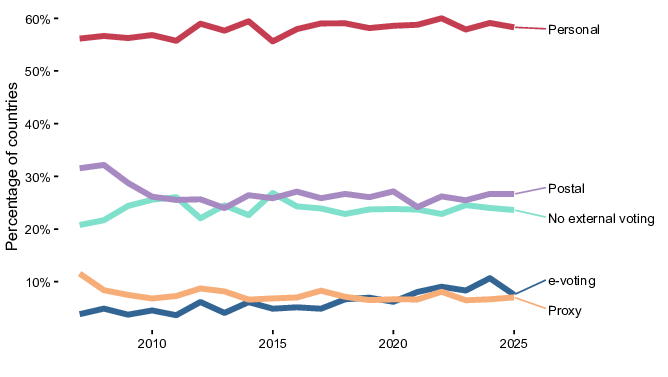
The breadth of access to out-of-country voting
The distinction between legal availability and meaningful access to OCV is important in assessing its democratic inclusiveness. For example, even if a country allows for OCV via post, it may be the case that only citizens in special circumstances (as noted above) are permitted, in practice, to vote from abroad. This approach creates unequal tiers of citizenship, where access to the franchise depends not only on where citizens live but also on their professional or legal status or their economic means. Equal attention must thus be given to the extent to which access to OCV meaningfully extends to all non-resident citizens.
Figure 5.3 illustrates the trends and status of this part of the regulation of OCV. Since 2007, there has been a slow increase in the share of countries that allow all non-resident citizens (and sometimes even those temporarily outside the country, such as tourists) to utilize OCV. This expansion corresponds to a decline in the share of countries that do not have a legal provision for OCV. Notably, however, the proportion of countries that allow only citizens in special circumstances to use OCV has remained steady.
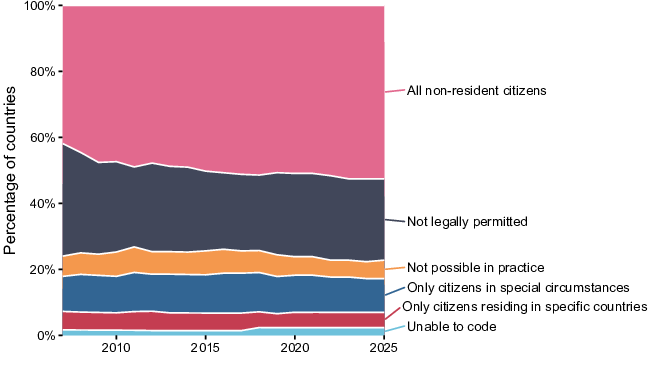
It is possible to assess how these legal regulations governing the external exercise of voting rights affect people by connecting migrant stocks with the usage of these various methods. Figure 5.4 connects methods of OCV with the extent to which access to these methods is restricted across the out-of-country population. This figure also includes UN Department of Economic and Social Affairs (UNDESA) estimates of the size of the emigrant population. It should be stressed that the emigrant population and the number of people eligible to vote are not the same. In addition to the fact that children are included in the emigrant population, some emigrants will have given up their citizenship in the years since they left their countries of origin. However, the size of the emigrant population is a cross-nationally available measure that helps to visualize and compare the number of people who are potentially affected by these laws.
When these data are compared, several insights emerge. First, there are many emigrants who come from countries that enable all citizens living abroad (sometimes even those on holiday) to access multiple methods of OCV. Second, the practical applicability of provisions for postal voting is lower than one might expect, as postal voting is restricted to a small subset of citizens abroad (often government employees, as in India and Ireland), suggesting a gap between the legal availability and functional accessibility of certain voting modalities. Third, there remain a large number of people who are affected by a situation in which an electoral law has provided for in-person OCV, but OCV is not possible in practice due to a lack of action to facilitate such voting (for example, in Bangladesh and Ghana) or due to political crises that have affected electoral processes domestically as well (for example, in Niger, Sudan, Syria and Yemen). Such cases underscore the importance of implementation capacity and political stability in realizing the promise of extraterritorial enfranchisement.
The Ukrainian case highlights the need for alternative or complementary approaches to ensure meaningful access to OCV. While Ukraine currently provides for OCV at diplomatic missions, the displacement of millions of citizens across Europe and beyond has placed new demands on the electoral system. Relying solely on embassy-based voting may no longer be sufficient to ensure inclusive participation. This situation illustrates the potential value of additional modalities, such as temporary polling stations in host countries. Implementing such options requires early planning, legal authorization, cross-border cooperation and significant logistical coordination.
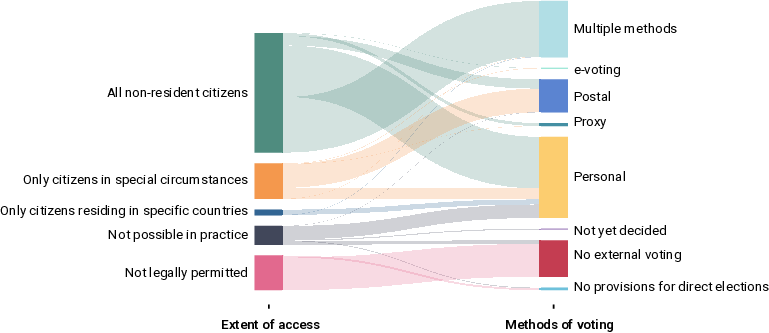
5.2. Allocation and counting of diaspora votes
Electoral districting options
Countries may also choose how to allocate or count diaspora votes, including through external electoral districts, reserved legislative seats for diaspora communities or the integration of diaspora votes into home constituencies.
When using external electoral districts, non-resident citizens vote within separate constituencies, and winning representatives advocate for this community in the national legislature. Countries such as Colombia, France and Italy use this model.
In a reserved-seats system, a fixed number of parliamentary seats are reserved for diaspora representatives. These representatives may be elected by non-resident citizens or appointed through alternative mechanisms. Countries such as Cabo Verde, Portugal and Tunisia use this system.
When diaspora votes are integrated into home constituencies, non-resident citizens do not have separate representation. Instead, they are included as voters within their last place of residence in their home country, and their votes are counted within those home constituencies. Countries such as India, the UK and the USA use this approach (Spinelli forthcoming). In some cases, the votes of non-resident citizens are counted as part of specific constituencies, regardless of the voter’s last place of residence. In Poland, for example, diaspora votes are added to the electoral district of Central Warsaw. Dutch citizens residing abroad may vote for representatives to the non-residents’ electoral college for the upper house of parliament. Their votes count in the Municipality of The Hague (Umpierrez de Reguero, Baubӧck and Wegschaider 2025).
5.3. Gaps between law and access
The legal provision of OCV has little meaning if practical access to the ballot is limited. Figure 5.5 maps GSoD Indices data on performance levels in the Representation category for the origin countries of emigrants against the number of people with access to the various methods of OCV. For example, we can see that, while seven countries allow only proxy voting, the number of people affected by this type of provision is very small. High-performing countries account for the smallest share of emigrants (as also shown in Figure 4.4), and these countries often offer multiple methods for OCV. Only five high-performing countries offer no means for OCV (Jamaica, Malta, Taiwan, Trinidad and Tobago, and Uruguay).
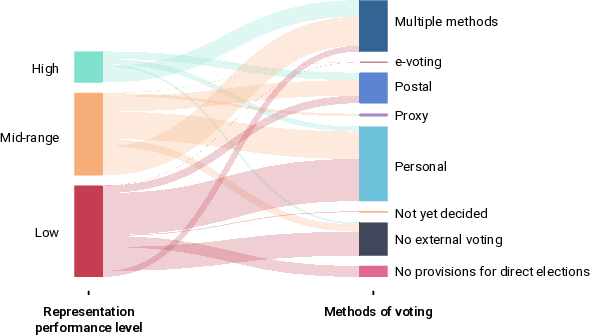
In countries with a mid-range level of performance in Representation, large numbers of people either have access to multiple methods or are confined to only personal voting (meaning voting in person abroad, most often at a diplomatic mission) (Ellis et al. 2007). Twenty-nine mid-range-performing countries provide only personal voting options for emigrants. While some scholars have excluded countries that limit opportunities for OCV to government employees (such as diplomats and military service members) from their data sets (Umpierrez de Reguero, Yener-Roderburg and Cartagena 2021), the International IDEA data set used here does not take this approach.
For countries with low levels of Representation, the most common approach is to offer only personal voting. The combination of this method and the larger political context of some of these countries suggests that this option is of little practical value—for example, for emigrants who may not be willing to vote at a diplomatic mission of a country that may have engaged in repression. Further research could assess the perceived credibility and safety of such voting options among diaspora communities from authoritarian or conflict-affected contexts.
A good example of the challenge inherent in the exercise of the franchise in these contexts is the situation of migrant workers in the countries of the Gulf Cooperation Council. For example, the only chance for the 3.4 million Indian citizens who live and work in Saudi Arabia to vote in 2024 was to travel back to their home constituency in India in time to vote in person (Yeung, Gupta and Tikekar 2024). These migrant workers constituted the largest group of potential voters in Saudi Arabia last year, but their access to the means of voting was difficult and expensive (for most, prohibitively so). In this way, the decision to emigrate negatively impacted their ability to participate in democracy. Worldwide, only 2,958 non-resident Indian citizens travelled back to India to vote in the 2024 Lok Sabha election (Press Trust of India 2024). Bangladeshi emigrants also face limited options; while there is legislation for OCV in place, it has never been implemented. This situation also has implications for democratic representation, as limited participation by diaspora communities makes electoral outcomes less representative.
The complex interactions between migration and democracy demand closer scrutiny. The possibility that the liminal status of migrants might leave them in a position where they are unable to fully participate in democratic practices in either their country of origin or their country of destination presents a transnational challenge for democracy. While it is outside the scope of this report, a related challenge is intranational. In many countries, voters who are outside of their home constituencies also cannot vote (Spinelli forthcoming).
6.1. Levels of participation in practice
Once legislation has been passed that provides for mechanisms through which citizens living abroad (or temporarily out of the country for other reasons) can vote, the question of how many of those eligible will actually participate in an election takes on both practical and political importance. Data on turnout from abroad is difficult to collect systematically. In both its 2022 data project (International IDEA 2022b) and in this updated effort, International IDEA has sought to collect as much data as possible on the number of votes cast from abroad in national elections. The Institute’s data presently cover 210 elections that took place between January 2002 and June 2025. Data coverage appears to have improved over time (possibly due to improved EMB publications) and includes 12 elections from the first six months of 2025 and 38 (out of 74 total) from 2024. These data complement the coverage of enfranchisement and legal barriers to participation that are included in International IDEA’s Voting from Abroad Database (International IDEA n.d.d).
The analysis of participation rates among non-resident citizens faces significant data limitations. Most notably, turnout and registration data from abroad are incomplete, and the potential bias introduced by this missing information remains unclear. In many cases, the availability of data depends on the capacity of EMBs and whether they systematically publish disaggregated figures. Moreover, differences in how EMBs categorize and handle out-of-country voting (OCV)—often grouped with other special voting arrangements like domestic absentee voting—can hinder cross-national comparability and obscure structural inequalities in access.
Despite these limitations, the data collected provide valuable insights into the contemporary experience of OCV. To better understand participation levels, this report compares the number of votes cast from abroad with three reference points:
- Votes from abroad as a share of the total emigrant population, compared with domestic turnout as a share of the voting-age population. This comparison illustrates the broader relationship between emigration and electoral participation. While not all emigrants are eligible to vote (due to age or legal exclusions), this method helps reveal the extent to which national laws and procedures limit OCV access to certain types of non-resident citizens.
- Votes from abroad as a share of registered OCV voters, compared with domestic turnout as a share of registered voters. Because registration for OCV typically requires active steps by the voter—unlike domestic registration, which is automatic in roughly half of countries (James and Garnett 2024)—this comparison highlights participation among those already enfranchised but may overstate engagement among diaspora voters due to self-selection effects in the registration process.
- Votes from abroad as a share of the total national vote. This measure indicates the overall electoral weight of OCV participation and helps assess its potential impact on election outcomes, particularly in contexts where non-resident citizens may influence results in close contests.
The first point of reference is presented in Figure 6.1 for each of the 38 elections for which 2024 data are available. The average level of participation from abroad was only 13.2 per cent of the emigrant population. By contrast, the average level of turnout as a share of the voting-age population was 61.5 per cent. The two measures are not directly comparable, but the difference still helps us to contextualize the extent to which those who have left their country of birth continue to participate in politics in that country.
For many countries, the diaspora represents a significant economic and social asset, evidenced in the flow of remittances and the upskilling that can take place when citizens work or study abroad. The diaspora could contribute to democratic resilience, provided they remain connected to democratic practices in their country of origin. Yet persistently low rates of participation through OCV suggest that this potential remains underutilized. These low rates may stem from contextually diverse factors such as the accessibility of OCV, diaspora political engagement strategies, the salience of elections or trust in electoral institutions—factors that vary considerably across contexts. Understanding and addressing these challenges would not just ensure more inclusive representation but would also make it possible to harness diaspora communities as a meaningful force for democratic resilience.
As Figure 6.1 shows, these measures reveal no correlation between domestic and overseas participation rates. This finding invites further inquiry into whether low diaspora turnout reflects systemic barriers to participation, a weaker sense of political connection or simply differing priorities among emigrant populations.
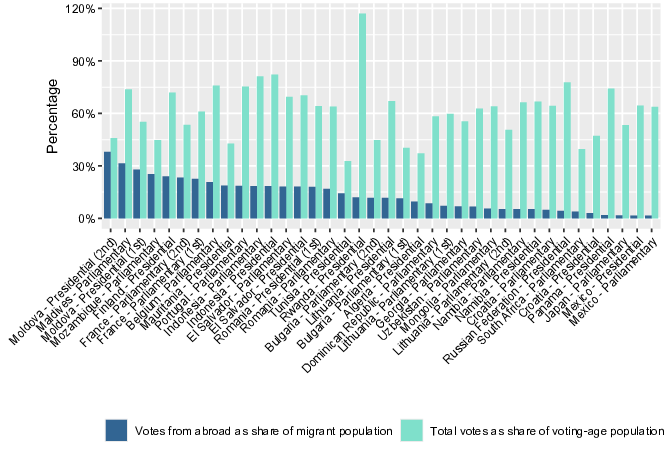
Data on the number of voters registered to vote from abroad, the second measure, are somewhat less readily available than data on turnout, due to a range of reporting and classification challenges. In some instances, published registration data are not disaggregated by voting method; in others, out-of-country registration is not published at all. However, both registration and turnout data were compiled for 29 out of 74 elections held in 2024. As shown in International IDEA’s earlier research on OCV, most countries require emigrants to complete an administrative step to register to vote from abroad (International IDEA 2022b). This registration must often be completed well in advance of election day, suggesting a relatively high level of intentionality among out-of-country voters who do participate. In some cases, registration is not necessary to vote in person at a polling station set up abroad but only to receive a postal ballot. However, any of these requirements can also impose additional procedural burdens that unintentionally limit participation.
The data that are available provide a useful basis for comparison with domestic voter registration and turnout.
Figure 6.2 compares total voter turnout (including domestic and overseas votes) as a percentage of all registered voters with overseas turnout as a percentage of those registered to vote from abroad. While the latter does not account for eligible voters who have not registered—including those who might be able to vote without formal registration—it remains an important measure of the extent to which registration requirements influence effective participation by non-resident citizens.
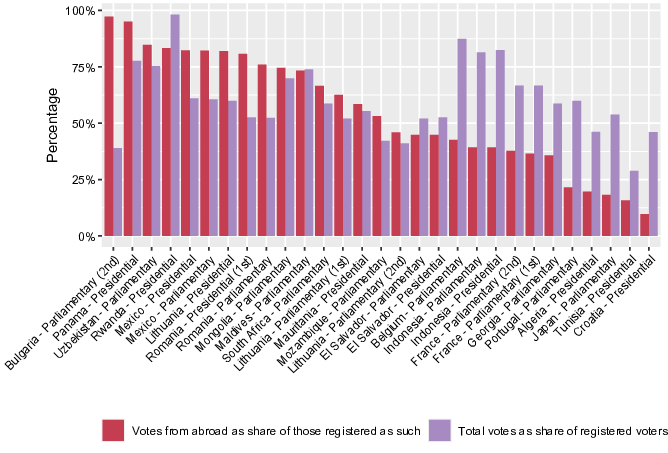
Although notable outliers exist—such as Belgium and Indonesia, where domestic and overseas participation rates differ significantly—there is a weak but positive correlation between the two measures of participation. The average domestic turnout for these 29 elections was 60.4 per cent, while the average turnout for registered voters abroad was 55.3 per cent. In contrast with the low rate of voting as a share of the total emigrant population, most people who register to vote from abroad do follow through and cast a ballot. This suggests that where registration hurdles have already been cleared, emigrant voters are relatively likely to follow through and vote. Turnout was higher abroad than at home in almost half of the countries (14 of 29), with significantly higher out-of-country turnout in Bulgaria (Republic of Bulgaria 2024) and Romania (Republic of Romania 2024).
However, these findings also raise important questions. High turnout among registered overseas voters contrasts with the generally low overall participation rate when viewed against the full emigrant population. This discrepancy suggests that a large number of potential voters are either legally excluded or administratively deterred from registering. Where registration is a necessary precondition for voting, especially when required well in advance of an election, it may disproportionately restrict access to emigrants with sufficient time, information or connection to the electoral process. Interestingly, low turnout among registered voters does not always correspond to the type of voting method offered. Of the five countries with the lowest level of OCV turnout, two provide for in-person voting only (Croatia and Tunisia), while three provide for multiple methods (Algeria: in-person and proxy; Japan: in-person and postal; and Portugal: in-person and postal). There is also a connection with the mechanism for representation for the lowest-turnout (as a share of those registered to vote from abroad) countries. Of the bottom 10 countries, 5 have special representation (designated constituencies) for non-resident citizens—Algeria, Croatia, France, Portugal and Tunisia (Umpierrez de Reguero, Bauböck and Wegschaider 2025). The low level of participation in these diaspora constituencies could raise a question about democratic legitimacy: when systems provide representation for diaspora populations, but few actually vote, does such limited engagement risk distorting democratic accountability or undermining the intent behind these mechanisms?
Assessing the relationship between available voting methods and turnout rates among non-resident citizens is complex, as outcomes may also be shaped by other factors such as registration requirements and the presence of the special representation mechanisms noted above. Figure 6.3 presents three different ways of contextualizing the level of out-of-country electoral participation discussed above, with data for the three most common legal regimes—only postal voting, only in-person voting and a mix of methods (usually both of the first two) across all the elections for which data are available. When the OCV turnout is measured as a share of the estimated emigrant population, countries providing multiple voting methods tend to show higher participation, with an average turnout rate of 15.0 per cent. In contrast, when OCV turnout is assessed as the share of those registered to vote from abroad, postal voting far outperforms the other methods, with an average participation rate of 81.2 per cent. This high figure can be largely attributed to the fact that, while in some countries one can vote in person without prior registration, receiving a postal ballot will almost always require advance registration.

While data on OCV turnout over time remain limited, longitudinal information is available for at least 6 elections in 10 countries (see Figure 6.4). Although this sample is relatively small and covers diverse political and administrative contexts—with time spans ranging from two years in Ecuador to over two decades in France—it still offers valuable insight into participation trends. Notable increases in OCV participation, measured as a share of the emigrant population, are observed in countries such as Ecuador, France, Moldova and Portugal. This measure enables broad comparison across cases but should be interpreted in light of methodological differences in data collection, definitions of emigrant populations and registration procedures. Despite these variations, the patterns suggest that sustained efforts to expand access, improve administrative procedures and strengthen diaspora engagement may contribute to gradual improvements in participation from abroad.
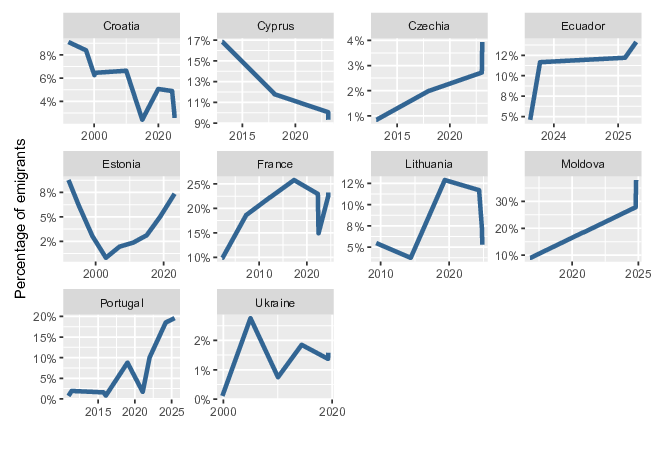
Just as with domestic turnout, OCV turnout rates can be influenced by both practical and political matters. For example, turnout may be higher when an election is understood to present an opportunity for an important turning point, or when new voting procedures make it easier for people to vote (for example, through expanded early voting or postal voting). Just as the actions of political parties can influence turnout rates domestically, political party engagement with emigrants has also been shown to increase turnout abroad (Burgess and Tyburski 2020). There is currently limited evidence regarding the effects of the introduction of Internet-based voting. However, trials of this method of voting in eight Swiss cantons have demonstrated that, at least in some circumstances, it can increase turnout among those living abroad (Germann 2021).
6.2. Political implications of diaspora votes
There is variation in how the votes of emigrant citizens are counted, as discussed above. In most countries, votes from abroad in legislative elections are counted as if they were cast by resident citizens—for example, in contributing to the vote totals of a large district in proportional representation systems or to the votes for individual candidates in single-member district plurality systems. This approach reflects an assumption of parity between resident and non-resident citizens in their representational role, but it may obscure distinct diaspora interests or geographic dispersion. Also, this method of facilitating OCV can have political implications that have been exploited by governing parties to extend their electoral advantages, as has been the case, for example, in Hungary and Turkey (Pogonyi 2014). The decision to expand access to OCV has at times appeared motivated by political self-interest and has generally benefited governing parties—though, in some cases, diaspora voters have shown stronger support for opposition parties (Turcu and Urbatsch 2020).
Hungary presents a notable example of how OCV arrangements can serve partisan interests. In 2010, legislation sponsored by the ruling Fidesz party granted citizenship to ethnic Hungarians living in neighbouring countries, followed by the extension of voting rights in 2011. These new non-resident citizens—most of whom had no prior residence in Hungary—are allowed to vote by mail and overwhelmingly support Fidesz (Bodnár 2015; Molnar 2024). In contrast, Hungarian citizens living abroad who were born in Hungary must vote in person, either at designated polling stations abroad or in Hungary itself (Waterbury 2025). This distinction in voting modalities effectively makes participation easier for a group that favours the ruling party, raising concerns about the use of OCV design for political advantage.
However, the extent to which the enfranchisement of diasporas has an influence on electoral outcomes is dictated to some extent by the share of the total votes that are cast from abroad. Across the 210 elections for which OCV turnout data are available, the highest share of the total votes cast by out-of-country voters was 19.5 per cent, in Moldova’s second round of the presidential election in 2024. Only six countries (Bulgaria, El Salvador, Hungary, Moldova, Portugal and Romania) have had elections in which the vote from abroad accounted for at least 5 per cent of the total vote. As shown in Figure 6.3, the average percentage of votes from abroad remains very low.
6.3. Representation and legitimacy
While the average percentage of votes from abroad remains low, OCV can, in a few countries, have a significant influence on electoral outcomes. This influence—particularly when the diaspora vote sways results in tightly contested elections—raises questions about how best to integrate or manage non-resident representation in democratic systems. One institutional response to this potential impact is to establish special constituencies for overseas voters, thereby channelling diaspora participation into designated forms of representation.
At least 21 countries have created special constituencies to represent overseas voters (Umpierrez de Reguero, Bauböck and Wegschaider 2025). In these cases, there are seats in the legislature that are assigned to represent emigrants either as a global class or differentiated by region of residence (such as in Cabo Verde and Italy). Such special representation may allow for the different interests of non-resident citizens to be effectively represented in the legislature, sometimes in a highly differentiated way. It may also be preferable in cases in which the share of the total votes from abroad is significant enough to have an outsize influence if not channelled in this way (Umpierrez de Reguero, Bauböck and Wegschaider 2025).
In addition to the issues of belonging and citizenship that arise regarding OCV in general, the existence of such overseas constituencies raises more fundamental questions about the connection between national territory and the definition of the polity (Collyer 2014). The countries in which such voters live may also object to having people living in their territory explicitly represented in foreign political institutions (as, for example, Canada objected to Canadian citizens with dual citizenship having special representation in the legislatures of France and Tunisia) (Umpierrez de Reguero, Bauböck and Wegschaider 2025). These concerns speak to broader normative debates about democratic legitimacy, consent and jurisdiction. At the same time, such mechanisms illustrate evolving conceptions of political community in an era of transnational mobility. Rather than converging towards a single model, countries continue to develop varied legal and institutional responses to OCV that reflect distinct histories, migration trajectories and political priorities.
7.1. Key takeaways for policymakers
7.2. Responding to these trends
How can policymakers—especially legislators, EMBs and civil society—respond? While there is no one set of ready-made policy choices, it is critical to approach both the opportunities and challenges posed by migration through a democratic lens. The following recommendations provide actionable steps for policymakers, EMBs and civil society groups considering, implementing or advocating for OCV options.
Recommendations for policymakers
- View OCV as a tool for democratic resilience. OCV can strengthen democratic legitimacy by reinforcing migrants’ sense of civic belonging and sustaining their political engagement with their country of origin. Policymakers should recognize OCV not as a peripheral policy but as an investment in long-term democratic resilience—especially in contexts of displacement, conflict and structural emigration.
- Consider the broader integration benefits of diaspora engagement. Facilitating diaspora participation in elections may also generate benefits for host societies by promoting transnational democratic norms and reducing barriers to reintegration upon return. These dynamics contribute to social cohesion and democratic development across borders.
- Ensure diaspora inclusion in the national political community. Legal frameworks should be guided by inclusive understandings of citizenship that recognize the legitimate stake non-resident citizens have in the political future of their countries of origin (Bauböck 2007). Policymakers should anticipate the growing importance of transnational political membership in the context of global migration, climate change and digital connectivity.
- Balance political representation with electoral equity. Where diaspora populations are large, special mechanisms such as reserved parliamentary seats may help channel their votes without distorting domestic electoral outcomes. Weighting mechanisms or capped seat allocations—as used in countries like Cabo Verde (see Box 7.1)—may provide models for balancing diaspora representation and legitimacy.
Box 7.1. Diaspora voting in Cabo Verde
Cabo Verde has been profoundly shaped by emigration. The West African island nation has experienced over two centuries of mass outward migration—driven by famine, poverty, colonial repression and a lack of economic opportunity—that has produced a diaspora estimated to be twice the size of its resident population (IOM n.d.a; Carling and Åkesson 2009). Members of the diaspora have maintained strong ties with their homeland, contributing to its socio-economic development through money, goods, knowledge and ideas (Resende-Santos 2015). Migration and transnationalism feature prominently in Cabo Verde’s national culture and identity; mobility is viewed as natural and necessary, and emigrants have long held the right to vote in presidential and legislative elections (Carling and Åkesson 2009).
Diaspora voting was introduced in Cabo Verde’s first multiparty elections in 1991, when overseas citizens cast ballots as part of the country’s transition to democracy (Ellis et al. 2007; Hudson 2023). Then, as now, these voters were divided into three electoral districts for the legislative elections: (a) Africa; (b) the Americas and Europe; and (c) the rest of the world. Initially, each district elected one representative to the National Assembly but, later, this was increased to two, making the ratio of overseas to domestic representatives (6:72) the highest in the world, along with Tunisia (Ellis et al. 2007; Mendes Borges 2022). To prevent the diaspora from dominating elections, the electoral system includes a weighting mechanism that caps overseas votes at no more than one fifth of those cast in-country (Ellis et al. 2007). This institutional design reflects an attempt to balance recognition of emigrants as full political members with concerns about electoral equity and domestic legitimacy.
Yet persistently low turnout among diaspora voters has so far obviated the need for the weighting mechanism. Low participation is likely due to socio-economic constraints, geographic dispersal and declining engagement in Cabo Verdean politics from second and subsequent generations of overseas citizens (Mendes Borges 2022). Turnout notwithstanding, however, the diaspora vote played a decisive role in the 2001 and 2006 presidential elections. These cases suggest that diaspora participation, even when numerically limited, can shape electoral outcomes in tightly contested races. For the scholar Aleida Mendes Borges (2022), the presidential candidates’ and domestic voters’ acceptance of the ‘emigrant advantage’ in these elections reflects the broad social consensus that overseas voters are legitimate members of Cabo Verde’s political community.
- Prioritize legal clarity, cross-border coordination and long-term planning. Effective OCV systems require early legislative action, legal clarity on eligibility and procedures, and coordination with host countries. Policymakers should explore mechanisms such as bilateral agreements and regional frameworks to support operational delivery of OCV.
- Adopt a cost-effective and inclusive approach to OCV modalities. Postal voting and multiple voting methods (e.g. postal and in-person) are both effective and relatively affordable, especially when supported by sustained investment in electoral infrastructure and diaspora outreach. New approaches—such as online voting—should be explored with attention to integrity, accessibility, digital literacy, security and reliability.
- Invest in better data for better decisions. Sound policymaking requires more systematic and disaggregated data on eligible voters, registration and participation abroad. Standardized reporting obligations for EMBs should be considered to improve cross-country comparability and evidence-based electoral reform.
Recommendations for electoral management bodies
- Recognize OCV as a core electoral function, not a technical add-on. Designing and delivering OCV is not merely a logistical task; it is central to ensuring that democratic processes remain inclusive in an era of transnational mobility. EMBs should integrate OCV into standard electoral planning cycles, with dedicated budget lines, personnel and long-term capacity development.
- Simplify registration procedures to lower participation barriers. Evidence shows that requiring in-person or overly burdensome registration procedures significantly reduces participation. EMBs should streamline diaspora voter registration—for example, via online platforms, embassies and consulates, or automatic enrolment where feasible—while ensuring security and accessibility.
- Diversify voting methods to improve access. Offering multiple voting options (postal, in-person and, where appropriate, electronic) has been associated with higher participation. EMBs should assess which combinations are most suitable based on diaspora size, geographic dispersion, administrative capacity and the integrity risks of each method. Kosovo’s recent reforms provide an example of how more and simpler options can motivate turnout (see Box 7.2).
Box 7.2. Ballots beyond borders: Kosovo’s diaspora enjoys expanded voting rights for the first time
Kosovo has one of the world’s largest diasporas relative to its population, a powerhouse in political influence and economic support, with remittances fuelling around 15 per cent of its gross domestic product and growth in foreign direct investment (Republic of Kosovo 2023; GERMIN 2024; The World Bank 2024; Gap Institute 2025). In Kosovo’s 2025 parliamentary election, the diaspora exercised, for the first time, expanded voting rights granted under the 2023 Law on General Elections (Republic of Kosovo 2023). While some observers have described the reform as a self-interested strategic move by the ruling party, which enjoys significant diaspora support, many see it not only as a moral imperative to recognize the diaspora’s contributions but also as a broader goal of promoting democratic inclusion, ensuring political equality and enhancing the legitimacy of the electoral process (A2 CNN 2025; Koha 2025; Radio Evropa e Lire 2025). The reform simplified registration by easing documentation requirements and establishing a quick online process (Telegrafi 2024). Voting options received a major upgrade: beyond postal voting in Kosovo, diaspora voters could send ballots to post office boxes set up in 22 countries or vote in person at Kosovo’s diplomatic missions. The new system is far more accessible and efficient than the old one, which was often unreliable and costly for voters (Telegrafi 2019; Kallxo 2021). The measures put in place were widely hailed as a milestone, with diaspora voter turnout reaching over 75 per cent, according to Kosovo’s Central Electoral Commission (CEC)11—a new record and a 20 per cent increase compared with the previous high set in the 2021 elections.
The CEC noted vague legal language—in this case on eligible voting locations abroad—as a major cause of politicization (Koha 2024). It stressed that logistics and procurement issues must not be underestimated, as setbacks can derail planning and force ad hoc fixes. When postal contracts for ballot transport collapsed due to tender complaints, the CEC and the Ministry of Foreign Affairs transported ballots in institutional vehicles, often escorted by police or diplomats (Telegrafi 2025). The CEC viewed these as first-time implementation obstacles, not structural failures, and stressed that improved access and turnout by far outweighed the costs. An important lesson learned was that, while in-person diaspora voting proved more demanding to organize, it offered stronger electoral integrity safeguards compared with postal voting, which continues to face concerns (Aliu 2025).
Critics12 argue the reforms are premature because inadequate infrastructure could lead to manipulation. They point to bloated voter rolls due to flawed civil records and to the limited impact on turnout, raising cost–benefit questions (European Union Election Observation Mission 2025). Another cited risk was tipping the scales towards the ruling party, which enjoys strong diaspora backing (Ahmeti 2025). Some argue that the diaspora should not vote at all, highlighting the unfairness of allowing those who do not face the day-to-day consequences of government decisions to exert potentially decisive influence over its political direction (Djordjevic 2024).
Yet many of these risks exist in domestic voting too. If voters at home are not excluded, why draw the line at the diaspora? As younger generations expect simplicity, easier access is key to lasting engagement. Kosovo’s reform sends a clear message: the diaspora matters, and their voice strengthens inclusion and unity.
- Strengthen integrity through transparency and communication. Clear information on registration, deadlines, voting options and eligibility is essential for building trust in OCV. EMBs should develop targeted communication strategies—using diaspora media, civil society partnerships and multilingual materials—to ensure that voters abroad are informed about and confident in the process.
- Institutionalize cooperation with consular services and other agencies. Effective OCV delivery depends on interagency collaboration. EMBs should establish formal agreements with foreign ministries, postal services and diaspora affairs agencies to define roles, share resources and avoid duplication. Examples from countries like the Philippines illustrate how multi-institutional coordination supports implementation (see Box 7.3).
Box 7.3. Online voting introduced for Filipino diaspora for the first time
The Philippines took a significant step towards enhancing democratic participation by implementing an online voting system ahead of the 12 May 2025 midterm elections. As of 14 April 2025, over 77 Online Voting and Counting System hubs had been activated, which remained open until election day (International IDEA 2025v; Mendoza and Spinelli, forthcoming).
Previously, overseas Filipinos had to cast their ballots in person at designated embassies or consulates, or rely on mailed ballots. The Commission on Elections indicated that this new initiative was designed to make overseas voting more accessible and inclusive, potentially impacting 1.2 million Filipinos living overseas and improving historically low turnout rates among this group.
Despite these efforts, preliminary data indicate that only 221,284 (18.1 per cent) of the anticipated voters chose to cast their ballots online, a slight decrease from the previous midterm elections’ turnout of 18.5 per cent (Abad 2025). While election observers noted that the online voting process ran smoothly, challenges remain in increasing voter engagement and effectively communicating the new voting options available (ANFREL 2025).
Dr Imelda Deinla, a Senior Lecturer of law at the University of New England, underscores that the initial implementation of electoral reforms and mechanisms often falls short of producing desired outcomes:
‘For Filipino migrants, electoral participation frequently competes with more immediate priorities—securing employment, adapting to unfamiliar socio-cultural environments, and establishing new lives abroad. Without compulsory voting requirements or deeply ingrained civic consciousness among diaspora communities, low electoral participation will likely persist as the default pattern. Strategic community engagement initiatives that connect democratic participation with migrants’ values and aspirations will be essential to elevate the perceived importance of electoral rights within Filipino transnational communities.’13
Dr Deinla’s analysis highlights the importance of coupling technical reforms with broader efforts to build electoral habits and trust among emigrant voters—especially when civic ties to the country of origin may be attenuated.
- Anticipate and mitigate political and logistical risks. Diaspora voting can become politicized, especially where it is seen to benefit one party. EMBs should ensure that procedural rules are applied impartially and that logistical risks—such as ballot delivery failures or ambiguous eligibility rules—are proactively addressed, with contingency plans in place.
- Improve data quality and reporting standards. Currently, data on OCV registration and turnout are often incomplete, inconsistently categorized or not disaggregated. EMBs should publish standardized data on registration, ballot distribution, turnout and invalid ballots to support transparency, policy learning and international comparability.
Recommendations for civil society actors
- Advocate for equitable access to OCV. Civil society organizations (CSOs) can play a key role in ensuring that the expansion of OCV is inclusive—not limited to certain groups or geographies. Advocacy efforts should focus on removing discriminatory barriers in laws or procedures and promoting enfranchisement for all eligible non-resident citizens.
- Monitor OCV implementation and support electoral integrity. Diaspora-focused CSOs and independent observers should be engaged in monitoring the implementation of OCV, from registration to vote counting. Their oversight helps enhance trust and transparency, especially where governments or EMBs lack credibility or where diaspora votes may significantly affect outcomes.
- Build awareness and civic education among diaspora communities. Low turnout among registered diaspora voters points to a need for more active engagement. CSOs should develop non-partisan voter education initiatives—using diaspora media, digital outreach and community events—to raise awareness of registration processes, voting options and election timelines.
- Facilitate inclusive participation by addressing practical barriers. Partnering with diaspora networks, CSOs can identify and mitigate logistical and informational barriers to participation, especially for migrants with limited digital access, insecure legal status or lower literacy. Tailored outreach can help ensure that OCV is not only available but meaningfully accessible.
- Encourage inclusive policy debate on diaspora enfranchisement. OCV raises important questions about belonging, accountability and representation. Civil society can create space for inclusive public debate—within both origin and host countries—on the role of diaspora voters, their rights and responsibilities, and how democratic systems can evolve in response to transnational citizenship.
- Forge alliances across borders. Many challenges related to OCV—such as legal harmonization, voter education or postal logistics—span multiple jurisdictions. Civil society actors should connect across borders to share lessons learned, coordinate advocacy and build regional or global coalitions to support diaspora political rights.
Areas for continued and further research
There are several pending normative and practical questions related to OCV.
- Further research is needed to understand what drives participation or abstention among different diaspora groups. Research should include an examination of how factors such as time since emigration, generation, legal status, security concerns, access to information, prior experience with voting or the perceived relevance of home-country elections influence voter behaviour.
- More comparative research and more data could clarify how voting method design affects both participation rates and electoral integrity. While some evidence suggests that postal voting often shows higher turnout among registered voters, cross-country comparisons are limited by variations in registration requirements and implementation.
- There is a need to assess how diaspora participation influences close races, party platforms or governance outcomes—particularly in countries where OCV turnout constitutes a meaningful share of the electorate or where diaspora preferences diverge from domestic voters. These issues may take on more salience as candidates and parties increasingly utilize digital modes of outreach and campaigning, including to diaspora communities.
- Host-country cooperation in the implementation of OCV is crucial but understudied. Further research could examine how legal frameworks, diplomatic relations and administrative arrangements shape host-state roles in supporting or obstructing OCV, including through bilateral agreements or regional coordination mechanisms.
- There are pending questions on the role of online OCV systems. With some countries experimenting with online and hybrid systems, more comparative studies are needed that illustrate what similarities and differences exist between OCV and domestic online voting security, accessibility and trustworthiness. This angle could add important new data to the already rich literature on online participation mechanisms.
- More time-series data on diaspora turnout, registration and political attitudes may help clarify whether OCV fosters sustained political engagement across migration waves or whether participation declines over time or across generations. It will also be important to conduct long-term studies on the turnout and political attitudes of circular migrants and other individuals who choose to spend regular periods of time outside of their countries of origin.
- Despite the fundamental importance of the costs of implementing different types of OCV systems—postal, in-person, online or hybrid—comprehensive, updated and accessible data are unavailable. The absence of data is especially important in light of the relatively low rates of participation among non-resident citizens in many countries. Future studies could benefit from in-depth case comparisons or cost assessments drawn from EMBs, which were beyond the scope and timeframe of this report.
The question of migration is ultimately a question of the meaning of belonging in a democratic society. It challenges democracies not because human migration itself is inherently destabilizing but because it compels challenging questions about if and how to reconsider the boundaries of the polity. As migration rates continue to increase, democracies are increasingly confronted with questions of whether and how to include their non-resident citizens in political processes. Resilient democracies are inclusive, but what considerations should be made to determine whether or not non-resident citizens may continue to influence political decisions in their countries of origin? If out-of-country voting (OCV) systems are implemented, which mechanisms are best suited to particular contexts?
Key questions arise—how to quickly and effectively adapt to an environment that is increasingly marked by immigration and emigration, even as amending legal frameworks and equipping agencies and voters with the information and resources they may need takes time and negotiation; whether and how to use new voting modalities to facilitate turnout, which is persistently low; how to balance the availability of new technology with old infrastructure; and how to include diaspora communities while protecting domestic democratic legitimacy.
Some of the considerations are technical. OCV requires significant planning and administration, and can be resource-intensive. Other considerations are political, especially when diaspora communities are large or when one political party stands to disproportionately benefit from the use of OCV. Countries must also consider the ways in which OCV can contribute to democratic resilience. Embracing a transnational conception of belonging may help people feel like they have a stake in the future of their countries of origin, thus incentivizing them to stay connected and committed. At the same time, however, it is important not to lose sight of the views and priorities of resident citizens.
Democracy requires patience, maintenance and, at times, reinvention in order to persevere. The work of democracy is also never finished: as the scale and shape of migration evolve, democracies will have to maintain and regularly re-evaluate institutional frameworks—including, as discussed in this report, the meaning, boundaries and mechanisms of involving non-resident citizens in political decision making. There is no single right answer; the best approaches will reflect local histories and contexts. What remains universally true is that the long-term resilience of democratic institutions will depend on deliberate, inclusive and regular reflection and solutions that are tailored to context-specific problems and priorities.
A2 CNN, ‘Analysis: Kosovo’s diaspora, the untapped potential for diplomacy’, 12 April 2025, <https://a2news.com/english/rajoni-bota/kosova/analiza-diaspora-e-kosoves-potenciali-i-pashfrytezuar-per-dip-i1145247>, accessed 11 June 2025
Abad, M., ‘Comelec records dismal Internet voting turnout at 18.12%’, Rappler, 16 May 2025, <https://www.rappler.com/philippines/elections/overseas-voter-turnout-comelec-report-may-2025>, accessed 28 May 2025
Abizadeh, A., ’Democratic legitimacy and state coercion: A reply to David Miller’, Political Theory, 38/1 (2010), pp. 121–30, <https://doi.org/10.1177/0090591709348192>
ACE Electoral Knowledge Network, Out of Country Voting, The Cost of External Voting: Some Examples, Case Study: Senegal, [n.d.a], <https://aceproject.org/ace-en/topics/va/annex/country-case-studies/senegal-a-significant-external-electorate>, accessed 20 July 2025
—, Kuwait: Boundary delimitation, [n.d.b], <https://perma.cc/2X49-MUKC>, accessed 30 July 2025
Africa Center for Strategic Studies, ‘Conflicts causing record level of forced displacement in Africa’, 4 September 2024, <https://africacenter.org/spotlight/conflicts-causing-record-level-of-forced-displacement-in-africa>, accessed 19 July 2025
Ahmeti, N., ‘Besnikëria e diasporës ndaj Kurtit’ [The loyalty of the diaspora towards Kurti], Radio Evropa e Lire, 3 March 2025, <https://www.evropaelire.org/a/besnikeria-e-diaspores-ndaj-kurtit/33334843.html>, accessed 11 June 2025
Al-Bilad, ‘أمير الكويت: لا وحدة وطنية بلا ترسيخ للهوية... وسنعيد البلاد لأهلها الأصليين’ [The Prince of Kuwait: No national unity without identity solidification ... and will return the country to its original people], 24 March 2025, <https://perma.cc/V7F9-PTP9>, accessed 6 August 2025
Alemán, M., ‘El Salvador approves indefinite presidential reelection and extends terms to 6 years’, The Associated Press, 1 August 2025, <https://apnews.com/article/el-salvador-nayib-bukele-reelection-f9efd1a08d3c9de2f886f7b911b9417d>, accessed 1 August 2025
Al-Hajri, ‘المواطنة والمشاركة الشعبية: الجدل حول انتخابات مجلس الشورى القطري’ [Citizenship and popular participation: The controversy over Qatar’s Shura Council elections], 17 August 2021, <https://perma.cc/V4PB-DFQ9>, accessed on 6 August 2025
Aliu, E., ‘Vetëvendosje i drejtohet Gjykatës Supreme për votat me postë të LDK-së’ [Vetëvendosje appeals to the Supreme Court regarding the postal votes of the LDK], Kallxo, 21 March 2025, <https://kallxo.com/lajm/vetevendosje-i-drejtohet-gjykates-supreme-per-votat-me-poste-te-ldk-se>, accessed 11 June 2025
Al Jasser, O. and Brown, N. J., ‘Will Kuwait’s parliamentary democracy be restored, reformed, or repudiated’, Carnegie Endowment for International Peace, 13 March 2025, <https://carnegieendowment.org/research/2025/03/kuwaits-parliament-suspension-emir-democracy?lang=en>, accessed 19 July 2025
Ali, A. and Cochrane, L., ‘Residency and citizenship in the Gulf: Recent policy changes and future implications for the region’, Comparative Migration Studies, 12 (2024), <https://doi.org/10.1186/s40878-024-00376-1>
Aman, A. and Bakken, M., Out-of-Country Voting: Learning from Practice (Stockholm: International IDEA, 2021), <https://doi.org/10.31752/idea.2021.1>
Anderson, S., ‘100 days of the Trump administration onslaught against workers’, Inequality.org, 29 April 2025, <https://inequality.org/article/100-days-of-the-trump-administration-onslaught-against-workers>, accessed 19 August 2025
Arab Times Kuwait, ‘56,689 women acquired Kuwaiti citizenship via marriage by 2020’, 5 December 2024, <https://www.arabtimesonline.com/news/56689-women-acquired-kuwaiti-citizenship-via-marriage-by-2020>, accessed 19 August 2025
—, ‘Kuwait Cabinet approves grievance committee for citizenship revocation cases’, 11 March 2025, <https://perma.cc/NN6U-T9DS>, accessed 19 July 2025
Asian Network for Free Elections (ANFREL), ‘International Election Observation Mission: 2025 Philippines National and Local Midterm Elections, Interim Report’, 2025, <https://anfrel.org/wp-content/uploads/2025/05/ANFREL-Interim-Report_PH-IEOM_May-16.pdf>, accessed 20 July 2025
Asmann, P. and Shuldiner, H., ‘GameChangers 2024: Crime cashes in on migration boom’, InSight Crime, 26 December 2024, <https://insightcrime.org/news/gamechangers-2024-organized-crime-cashes-latam-migration>, accessed 19 July 2025
ATV Kuwait (@atvkw), ‘... صاحب السمو أمير البلاد’ [His Highness the Prince ...], X, 23 March 2025, <https://perma.cc/UW9M-9ZMN>, accessed 6 August 2025
Avelar, B., ‘Bukele maintains his enormous popularity despite his image as a “dictator”’, El País, 3 June 2025a, <https://english.elpais.com/international/2025-06-03/bukele-maintains-his-enormous-popularity-despite-his-image-as-a-dictator.html>, accessed 1 August 2025
—, ‘La mayoría de los salvadoreños teme criticar a Bukele’ [Most Salvadorans are afraid to criticize Bukele], El País, 21 June 2025b, <https://elpais.com/america/2025-06-21/la-mayoria-de-los-salvadorenos-teme-criticar-a-bukele.html>, accessed 1 August 2025
Azose, J. J. and Raftery, A. E., ‘Bayesian probabilistic projection of international migration’, Demography, 52/5 (2015), pp. 1627–50, <https://doi.org/10.1007/s13524-015-0415-0>
Bauböck, R., ‘Expansive citizenship—voting beyond territory and membership’, PS: Political Science & Politics, 38/4 (2005), pp. 683–87, <https://doi.org/10.1017/S1049096505050341>
—, ‘Stakeholder citizenship and transnational political participation: A normative evaluation of external voting’, Fordham Law Review, 75/5 (2007), <https://ir.lawnet.fordham.edu/flr/vol75/iss5/4>, accessed 12 July 2025
Bekaj, A., Antara, L., Adan, T., Arrighi de Casanova, J.-T., El-Helou, Z., Mannix, E., Mpeiwa, M., Otieno Opon, C., Ragab, N. J., Sharifi, S. and Zakaryan, T., Political Participation of Refugees: Bridging the Gaps (Stockholm: International IDEA, 2018), <https://doi.org/10.31752/idea.2018.19>
Benswait, A., ‘A crisis of statelessness: Inside Kuwait’s mass revocation of citizenship’, DAWN, 9 May 2025, <https://dawnmena.org/a-crisis-of-statelessness-inside-kuwaits-mass-revocation-of-citizenship>, accessed 19 July 2025
Bergengruen, V., ‘How Nayib Bukele’s “iron fist” has transformed El Salvador’, Time, 29 August 2024, <https://time.com/7015598/nayib-bukeles-iron-fist-el-salvador>, accessed 1 August 2025
Bjorklund, A., ‘The Bidoon in Kuwait, History at a Glance’, SALAM for Democracy and Human Rights, October 2020, <https://perma.cc/CF35-K5S6>, accessed 30 July 2025
Bodnár, E., ‘The right to vote of Hungarian citizens living abroad’, I·CONnect (blog of the International Journal of Constitutional Law), 14 July 2015, <https://www.iconnectblog.com/the-right-to-vote-of-hungarian-citizens-living-abroad>, accessed 12 July 2025
Borges, A. M., ‘Emigration and citizenship: Diaspora political engagement in Cabo Verde’, E-Journal of Portuguese History, 20/2 (2022), pp. 86–112, <https://doi.org/10.26300/dt4f-nb04>
Breunig, C., Cao, X. and Luedtke, A., ‘Global migration and political regime type: A democratic disadvantage’, British Journal of Political Science, 42/4 (2012), pp. 825–54, <https://doi.org/10.1017/S0007123412000051>
Budoo-Scholtz, A., ‘Mozambique’s parliament approves inclusive dialogue law’, Human Rights Watch, 7 April 2025, <https://www.hrw.org/news/2025/04/07/mozambiques-parliament-approves-inclusive-dialogue-law>, accessed 1 August 2025
Bulgaria, Republic of, Central Electoral Commission, ‘Glasuvane Izvŭn stranata Chesto Zadavani Vŭprosi’ [Voting abroad: Frequently asked questions], 2024, <https://www.cik.bg/bg/ep2024/abroad/faq/q7>, accessed 13 July 2025
Burgess, K. and Tyburski, M. D., ‘When parties go abroad: Explaining patterns of extraterritorial voting’, Electoral Studies, 66 (2020), <https://doi.org/10.1016/j.electstud.2020.102169>
Cabannes, Y., ‘Participatory budgeting: A significant contribution to participatory democracy’, Environment & Urbanization, 16/1 (2004), pp. 27–46, <https://doi.org/10.1177/095624780401600104>
Carling, J. and Åkesson, L., ‘Mobility at the heart of a nation: Patterns and meanings of Cape Verdean migration’, International Migration, 47/3 (2009), pp. 123–55, <https://doi.org/10.1111/j.1468-2435.2009.00526.x>
Carothers, T. and Carrier, M., ‘Democratic Recovery after Significant Backsliding: Emergent Lessons’, Carnegie Endowment for International Peace, April 2025, <https://carnegie-production-assets.s3.amazonaws.com/static/files/Carothers%20Carrier_Democratic%20Recovery-1.pdf>, accessed 12 July 2025
Carothers, T. and Stuenkel, O., ‘How will the second Trump administration affect global democracy?’, Carnegie Endowment for International Peace, 28 April 2025, <https://carnegieendowment.org/research/2025/04/united-states-trump-democracy-aid-cuts?lang=en>, accessed 13 July 2025
Casas Zamora, K., ‘Kevin Casas-Zamora on democracy in an age of radical uncertainty’, The Economist, 23 February 2024, <https://www.economist.com/by-invitation/2024/02/23/kevin-casas-zamora-on-democracy-in-an-age-of-radical-uncertainty>, accessed 12 July 2025
Cavalari, M., Manjarrés, J. and Newton, C., ‘El Salvador’, InSight Crime’s 2024 Homicide Round-up, 26 February 2025, <https://insightcrime.org/news/insight-crime-2024-homicide-round-up/#h-el-salvador-20-8>, accessed 1 August 2025
Center for Systemic Peace, ‘Controlled “facts” and misinformation are the principal tools of autocratic authority’, [n.d.], <https://www.systemicpeace.org>, accessed 13 July 2025
Cheesman, N., Desrosiers, M.-E., Cianetti, L. and Gehrke, M., ‘How to Strengthen Democratic Resilience: Five Lessons for Democratic Renewal’, European Democracy Hub, 10 December 2024, <https://europeandemocracyhub.epd.eu/how-to-strengthen-democratic-resilience>, accessed 20 July 2025
Cisterino, J., ‘Engaging the diaspora: Prospects and pitfalls’, The Proceedings of GREAT Day, 2011/Article 21 (2012), <https://knightscholar.geneseo.edu/proceedings-of-great-day/vol2011/iss1/21>, accessed 30 July 2025
Civicus, ‘South Korea: Press freedom under attack, doctors strike targeted as UN Committee calls for reforms’, 28 March 2024, <https://monitor.civicus.org/explore/south-korea-press-freedom-under-attack-doctors-strike-targeted-as-un-committee-calls-for-reforms>, accessed 12 July 2025
Collyer, M., ‘Inside out? Directly elected “special representation” of emigrants in national legislatures and the role of popular sovereignty’, Political Geography, 41 (2014), pp. 64–73, <https://doi.org/10.1016/j.polgeo.2014.01.002>
Congressional Budget Office, ‘Trends in the Distribution of Family Wealth, 1989 to 2022’, October 2024, <https://www.cbo.gov/publication/60343>, accessed 12 July 2025
Council of the European Union, ‘Conclusions on strengthening EU democratic resilience’, 9463/25, 27 May 2025, <https://data.consilium.europa.eu/doc/document/ST-9463-2025-INIT/en/pdf>, accessed 12 July 2025
Court of Justice of the European Union, ‘AG Ćapeta: The Danish legislation on public housing in transformation areas constitutes direct discrimination based on an ethnic criterion’, Press release No. 18/25, 13 February 2025, <https://curia.europa.eu/jcms/upload/docs/application/pdf/2025-02/cp250018en.pdf>, accessed 20 July 2025
Cristosal, ‘Un año bajo el regimen de excepción: una medida permanente de represión y de violaciones a los derechos humanos’ [A year under the state of emergency: A permanent measure of repression and human rights violations], 12 May 2023, <https://perma.cc/2MFM-XXLH>, accessed 1 August 2025
Cultural & Indigenous Research Centre Australia, ‘The Australian Electoral Commission: CALD Consumer Research Results, Final Report’, July 2006, <https://www.aph.gov.au/~/media/Estimates/Live/fapa_ctte/estimates/sup_0607/finance/f8_attach1.ashx>, accessed 30 July 2025
Dahl, R. A., After the Revolution? Authority in a Good Society (New Haven, CT: Yale University Press, 1970)
—, On Democracy (Yale University Press, 1998)
Dao, T. H., Docquier, F., Maurel, M. and Schaus, P., ‘Global migration in the twentieth and twenty-first centuries: The unstoppable force of demography’, Review of World Economics, 157/2 (2021), pp. 417–49, <https://doi.org/10.1007/s10290-020-00402-1>
Darmawan, I., ‘E-voting adoption in many countries: A literature review’, Asian Journal of Comparative Politics, 6/4 (2021), pp. 482–504, <https://doi.org/10.1177/20578911211040584>
Delgado, V., ‘Cristosal se exilia de El Salvador’ [Cristosal goes into exile from El Salvador], Elfaro, 18 July 2025, <https://beta.elfaro.net/elfaro-tv/cristosal-se-exilia-de-el-salvador>, accessed 1 August 2025
DeVotta, N., ‘Sri Lanka’s peaceful revolution’, Journal of Democracy, 36/1 (2025), pp. 79–92, <https://doi.org/10.1353/jod.2025.a947885>
Djordjevic, D. R., ‘Diaspora as the “golden vote” in the elections’, Kosovo Online, 10 November 2024, <https://www.kosovo-online.com/en/news/analysis/diaspora-golden-vote-elections-10-11-2024>, accessed 20 July 2025
Docquier, F., Lodigiani, E., Rapoport, H. and Schiff, M., ‘Emigration and democracy’, Journal of Development Economics, 120 (2016), pp. 209–23, <https://doi.org/10.1016/j.jdeveco.2015.12.001>
Docquier, F., Lohest, O. and Marfouk, A., ‘Brain drain in developing countries’, The World Bank Economic Review, 21/2 (2007), pp. 193–218, <https://doi.org/10.1093/wber/lhm008>
Duchiade, A., ‘Peru tightens grip on foreign-funded NGOs and media under new law’, LatAm Journalism Review, 30 April 2025, <https://latamjournalismreview.org/articles/peruvian-law-demands-official-clearance-for-foreign-funded-ngos-and-news-outlets>, accessed 19 July 2025
Easton, A., ‘Conservative historian wins Polish presidential vote’, BBC News, 2 June 2025, <https://www.bbc.com/news/articles/cx27897vedno>, accessed 20 July 2025
Economist, The, ‘Most Latin American migrants no longer go to the United States’, 13 February 2025, <https://www.economist.com/the-americas/2025/02/13/most-latin-american-migrants-no-longer-go-to-the-united-states>, accessed 19 July 2025
EFE, ‘Más de la mitad de los salvadoreños aprueba régimen de excepción de Bukele pese a críticas’ [More than half of Salvadorans approve of Bukele’s state of emergency despite criticism], swissinfo.ch, 19 June 2025, <https://www.swissinfo.ch/spa/m%C3%A1s-de-la-mitad-de-los-salvadore%C3%B1os-aprueba-r%C3%A9gimen-de-excepci%C3%B3n-de-bukele-pese-a-cr%C3%ADticas/89548533>, accessed 1 August 2025
Ehin, P., Solvak, M., Willemson, J. and Vinkel, P., ‘Internet voting in Estonia 2005–2019: Evidence from eleven elections’, Government Information Quarterly, 39/4 (2022), <https://doi.org/10.1016/j.giq.2022.101718>
Eisen, L.-B., ‘El Salvador’s offer to house U.S. prisoners is illegal’, Brennan Center for Justice, 12 March 2025, <https://www.brennancenter.org/our-work/analysis-opinion/el-salvadors-offer-house-us-prisoners-illegal>, accessed 1 August 2025
Electoral Commissions Forum of SADC Countries (ECF–SADC), ‘Preliminary Statement of the Electoral Commissions Forum of SADC Countries (ECF – SADC) Election Observation Mission to the General Elections of the Republic of Botswana held on 30th October 2024’, 1 November 2024a, <https://perma.cc/3PNP-YCY8>, accessed 12 July 2025
—, ‘Preliminary Statement of the Electoral Commissions Forum of SADC Countries (ECF – SADC) on the National Assembly Elections of the Republic of Mauritius held on 10 November 2024’, 12 November 2024b, <https://www.ecfsadc.org/wp-content/uploads/2024/11/preliminary-statement-mauritius-2024-en.pdf>, accessed 23 August 2025
Ellis, A., Navarro, C., Morales, I., Gratschew, M. and Braun, N., Voting from Abroad: The International IDEA Handbook (Stockholm: International IDEA, 2007), <https://www.idea.int/publications/catalogue/voting-abroad-international-idea-handbook>, accessed 12 July 2025
European Union Election Observation Mission, ‘Honduras: General Elections, 28 November 2021, Final Report’, January 2022, <eu_eom_honduras_2021_final_report_english.pdf>, accessed 12 July 2025
—, ‘Kosovo 2025 Parliamentary Elections, Final Report’, 2025, <https://www.eeas.europa.eu/sites/default/files/documents/2025/Final%20report%20Kosovo%202025%20EN.pdf>, accessed 11 June 2025
Farinha, R., ‘The EU Common Security and Defense Policy: Moving away from democracy support’, Carnegie Endowment for International Peace, 4 March 2025, <https://carnegieendowment.org/research/2025/03/the-eu-common-security-and-defense-policy-moving-away-from-democracy-support?lang=en>, accessed 12 July 2025
Fatton Jr, R., ‘Crisis and institutional collapse in Haiti’, Current History, 124/859 (2025), pp. 48–53, <https://doi.org/10.1525/curh.2025.124.859.48>
Federal Reserve Bank of St. Louis, ‘Remittance inflows to GDP for Samoa’, last updated 7 May 2024, <https://fred.stlouisfed.org/series/DDOI11WSA156NWDB>, accessed 20 July 2025
Fitzgerald, J., Schauer, K., O’Neal, R. J. and Bačovský, P., ‘To belong: Feeling “at home” and support for democracy’, Kölner Zeitschrift für Soziologie und Sozialpsychologie/Cologne Journal of Sociology and Social Psychology, Supplement 1/75 (2023), pp. 235–58, <https://doi.org/10.1007/s11577-023-00908-0>
Fonua, F., ‘“Don’t think it’s fair”: Samoa opposition unhappy about voting law changes’, RNZ, 18 March 2024, <https://www.rnz.co.nz/international/pacific-news/512041/don-t-think-it-s-fair-samoa-opposition-unhappy-about-voting-law-changes>, accessed 20 July 2025
Freeman, W., ‘Nayib Bukele’s growing list of Latin American admirers’, Americas Quarterly, 16 February 2023, <https://www.americasquarterly.org/article/nayib-bukeles-growing-list-of-latin-american-admirers>, accessed 1 August 2025
Gamlen, A., ’Diaspora Engagement Policies: What Are They, and What Kinds of States Use Them?’, Working Paper No. 32, Centre on Migration, Policy and Society, University of Oxford, 2006, <https://www.compas.ox.ac.uk/wp-content/uploads/WP-2006-032-Gamlen_Diaspora_Engagement_Policies.pdf>, accessed 25 July 2025
Ganty, S. and de Vries, K., ‘Manufacturing integration: Ethnic engineering in the Danish “ghetto case”’, Verfassungsblog, 25 March 2025, <https://doi.org/10.59704/c420c491981b071b>
Gap Institute, ‘Remittances in Kosovo (2015 - 2024)’, 19 February 2025, <https://www.institutigap.org/news/3394>, accessed 20 July 2025
García, J., ‘How hard is it to root out corruption? Ask Guatemala’s new president’, Christian Science Monitor, 12 June 2024, <https://www.csmonitor.com/World/Americas/2024/0612/corruption-in-guatemala-hard-to-curb>, accessed 12 July 2025
Germann, M., ‘Internet voting increases expatriate voter turnout’, Government Information Quarterly, 38/2 (2021), <https://doi.org/10.1016/j.giq.2020.101560>
GERMIN, ‘Harnessing the Potential of the Kosovar Diaspora’s Economic Contributions’, 2024, <https://germin.org/wp-content/uploads/2024/01/Harnessing-the-Potential-of-the-Kosovar-Diasporas-Economic-Contributions-Research.pdf>, accessed 20 July 2025
Gibson, J. P., Krimmer, R., Teague, V. and Pomares, J., ‘A review of e-voting: The past, present and future’, Annals of Telecommunications, 71/7 (2016), pp. 279–86, <https://doi.org/10.1007/s12243-016-0525-8>
Gobierno de Chile, Ministerio Secretaría General de Gobierno, ‘Congreso: Cámara aprueba en general el proyecto de ley que protege a las y los trabajadores de las comunicaciones y pasa al Senado’ [Congress: Chamber approves in general the bill protecting communications workers and sends it to the Senate], 18 March 2024, <https://msgg.gob.cl/wp/2024/03/18/congreso-camara-aprueba-en-general-el-proyecto-de-ley-que-protege-a-las-y-los-trabajadores-de-las-comunicaciones-y-pasa-al-senado>, accessed 13 July 2025
Godfrey, D., ‘Samoan diaspora seeks more political say’, RNZ, 7 April 2021, <https://www.rnz.co.nz/international/pacific-news/439974/samoan-diaspora-seeks-more-political-say>, accessed 20 July 2025
Graham, T., ‘Thousands of children swept up in El Salvador mass arrests, rights body says’, The Guardian, 16 July 2024, <https://www.theguardian.com/global-development/article/2024/jul/16/el-salvador-children-detentions-human-rights-watch>, accessed 1 August 2025
Gulf Research Center, Gulf Labour Markets, Migration, and Population (GLMM) Programme, ‘GCC: Total population and percentage of nationals and non-nationals in GCC countries (national statistics, mid-2022)’, [n.d.], <https://gulfmigration.grc.net/gcc-total-population-and-percentage-of-nationals-and-non-nationals-in-gcc-countries-national-statistics-mid-2022>, accessed 19 July 2025
Hudson, A., ‘Case Study: Cabo Verde’, in Global State of Democracy 2023 Report (Stockholm: International IDEA, 2023), <https://doi.org/10.31752/idea.2023.62>
Human Rights Watch, ‘“Your child does not exist here”: Human rights abuses against children under El Salvador's “state of emergency”’, 16 July 2024, <https://www.hrw.org/report/2024/07/16/your-child-does-not-exist-here/human-rights-abuses-against-children-under-el>, accessed 1 August 2025
—, ‘From bad to worse: The deterioration of media freedom in Greece’, 8 May 2025, <https://www.hrw.org/report/2025/05/08/bad-worse/deterioration-media-freedom-greece>, accessed 12 July 2025
Inequality.org, ‘Income inequality in the United States’, 2025, <https://inequality.org/facts/income-inequality>, accessed 12 July 2025
Inter-American Development Bank (IDB), ‘The Complexities of Inequality in Latin America and the Caribbean’, 6 March 2024, <https://www.iadb.org/en/news/complexities-inequality-latin-america-and-caribbean>, accessed 30 July 2025
International Crisis Group, ‘A New Era in Bangladesh? The First Hundred Days of Reform’, Report No. 344/Asia, 14 November 2024, <https://www.crisisgroup.org/asia/south-asia/bangladesh/344-new-era-bangladesh-first-hundred-days-reform>, accessed 20 July 2025
International IDEA, Enfranchising South Asia’s Absent Voters: Challenges and Prospects, [n.d.a], <https://www.idea.int/absent-voters-of-south-asia-series-case-studies>, accessed 12 July 2025
—, ‘The Gambia’, Democracy Tracker, [n.d.b], <https://www.idea.int/democracytracker/country/gambia>, accessed 12 July 2025
—, Searchable Archive, Democracy Tracker, [n.d.c], <https://www.idea.int/democracytracker/searchable-archive>, accessed 12 July 2025
—, Voting from Abroad Database, [n.d.d], <https://www.idea.int/data-tools/data/voting-abroad-database>, accessed 1 April 2025
—, The Global State of Democracy Indices, 1975–2024, version 9, [n.d.e], <https://www.idea.int/democracytracker/about-the-gsod-indices>, accessed 30 July 2025
—, The Global State of Democracy: Exploring Democracy’s Resilience (Stockholm: International IDEA, 2017), <https://www.idea.int/publications/catalogue/global-state-democracy-exploring-democracys-resilience>, accessed 20 July 2025
—, ‘Concerns over restrictions on press freedom’, Democracy Tracker, Republic of Korea, November 2022a, <https://www.idea.int/democracytracker/report/republic-korea/november-2022?pid=3247>, accessed 20 July 2025
—, ‘Unravelling out-of-country voting: A deeper look into OCV practices, the use of technology and turnout’, 2022b, <https://www.idea.int/data-tools/data/ocv-technology-turnout>, accessed 12 July 2025
—, The Global State of Democracy 2023: The New Checks and Balances (Stockholm: International IDEA, 2023a), <https://doi.org/10.31752/idea.2023.78>
—, ‘European court finds elections discriminatory against ethnic minorities’, Democracy Tracker, Bosnia and Herzegovina, August 2023b, <https://www.idea.int/democracytracker/report/bosnia-and-herzegovina/august-2023?pid=4534>, accessed 20 July 2025
—, ‘Law protecting whistleblowers enters into force’, Democracy Tracker, Czechia, August 2023c, <https://www.idea.int/democracytracker/report/czechia/august-2023?pid=4517>, accessed 20 July 2025
—, ‘Illegally purchased spyware used to discredit opponents, Senate investigation finds’, Democracy Tracker, Poland, September 2023d, <https://www.idea.int/democracytracker/report/poland/september-2023?pid=6772>, accessed 20 July 2025
—, ‘Congressional inquiry recommends that Bolsonaro face criminal charges’, Democracy Tracker, Brazil, October 2023e, <https://www.idea.int/democracytracker/report/brazil/october-2023?pid=6867>, accessed 12 July 2025
—, The Global State of Democracy 2024: Strengthening the Legitimacy of Elections in a Time of Radical Uncertainty (Stockholm: International IDEA, 2024a), <https://www.idea.int/gsod/2024>, accessed 12 July 2025
—, ‘Nayib Bukele is reelected as El Salvador’s president’, Democracy Tracker, El Salvador, February 2024b, <https://www.idea.int/democracytracker/report/el-salvador/february-2024?pid=7005>, accessed 1 August 2025
—, ‘Senate approves controversial detention deal with Albania’, Democracy Tracker, Italy, February 2024c, <https://www.idea.int/democracytracker/report/italy/february-2024?pid=7114>, accessed 20 July 2025
—, ‘Concerns mount around opposition crackdown’, Democracy Tracker, India, March 2024d, <https://www.idea.int/democracytracker/report/india/march-2024?pid=7160>, accessed 1 August 2025
—, ‘Selection of new Election Commissioners scrutinized’, Democracy Tracker, India, March 2024e, <https://www.idea.int/democracytracker/report/india/march-2024?pid=7221>, accessed 1 August 2025
—, ‘Thousands of striking doctors face license suspensions’, Democracy Tracker, Republic of Korea, March 2024f, <https://www.idea.int/democracytracker/report/republic-korea/march-2024?pid=7155>, accessed 20 July 2025
—, ‘Congress approves change to procedure for constitutional amendments’, Democracy Tracker, El Salvador, April 2024g, <https://www.idea.int/democracytracker/report/el-salvador/april-2024?pid=7237>, accessed 1 August 2025
—, ‘Mali indefinitely suspends political parties and associations’, Democracy Tracker, Mali, April 2024h, <https://www.idea.int/democracytracker/report/mali/april-2024?pid=7227>, accessed 19 July 2025
—, ‘Return of “foreign agents” bill sparks massive protests’, Democracy Tracker, Georgia, April 2024i, <https://www.idea.int/democracytracker/report/georgia/april-2024?pid=7244>, accessed 20 July 2025
—, ‘Court approves access to legal aid for undocumented immigrants’, Democracy Tracker, France, May 2024j, <https://www.idea.int/democracytracker/report/france/may-2024?pid=7317>, accessed 20 July 2025
—, ‘Former President Bainimarama sentenced to one year in prison’, Democracy Tracker, Fiji, May 2024k, <https://www.idea.int/democracytracker/report/fiji/may-2024?pid=7262>, accessed 20 July 2025
—, ‘Incumbent ANC loses national parliamentary majority in general elections’, Democracy Tracker, South Africa, May 2024l, <https://www.idea.int/democracytracker/report/south-africa/may-2024>, accessed 19 July 2025
—, ‘Kuwait’s Emir dissolves parliament and suspends part of the Constitution’, Democracy Tracker, Kuwait, May 2024m, <https://www.idea.int/democracytracker/report/kuwait/may-2024>, accessed 19 July 2025
—, ‘Newly amended charter extends junta rule’, Democracy Tracker, Burkina Faso, May 2024n, <https://www.idea.int/democracytracker/report/burkina-faso/may-2024?pid=7511>, accessed 19 July 2025
—, ‘Parliament approves law to abolish current public broadcaster’, Democracy Tracker, Slovakia, June 2024o, <https://www.idea.int/democracytracker/report/slovakia/june-2024?pid=7328>, accessed 20 July 2025
—, ‘Ruling party claims victory in general election’, Democracy Tracker, India, June 2024p, <https://www.idea.int/democracytracker/report/india/june-2024?pid=7357>, accessed 1 August 2025
—, ‘Sudanese refugees face mass arrests and deportations’, Democracy Tracker, Egypt, June 2024q, <https://www.idea.int/democracytracker/report/egypt/june-2024>, accessed 19 July 2025
—, ‘Government ramps up measures to address security situation’, Democracy Tracker, Chile, July 2024r, <https://www.idea.int/democracytracker/report/chile/july-2024?pid=7451>, accessed 30 July 2024
—, ‘Lula restores Commission that investigates political disappearances under the dictatorship’, Democracy Tracker, Brazil, July 2024s, <https://www.idea.int/democracytracker/report/brazil/july-2024?pid=7450>, accessed 12 July 2025
—, ‘Parliament approves emergency measures to restrict reception of asylum seekers’, Democracy Tracker, Finland, July 2024t, <https://www.idea.int/democracytracker/report/finland/july-2024>, accessed 20 July 2025
—, ‘A year after Yasuní referendum, oil drilling continues’, Democracy Tracker, Ecuador, August 2024u, <https://www.idea.int/democracytracker/report/ecuador/august-2024?pid=7515>, accessed 12 July 2025
—. ‘Sheikh Hasina ends 15-year rule amid mass protests’, Democracy Tracker, Bangladesh, August 2024v, <https://www.idea.int/democracytracker/report/bangladesh/august-2024>, accessed 30 July 224
—, ‘Guatemala’, Democracy Tracker, August 2024w, <https://www.idea.int/democracytracker/country/guatemala>, accessed 12 July 2025
—, ‘Cabinet approves amendments to citizenship law’, Democracy Tracker, Kuwait, September 2024x, <https://www.idea.int/democracytracker/report/kuwait/september-2024>, accessed 19 July 2025
—, ‘Government launches democracy action plan’, Democracy Tracker, Spain, September 2024y, <https://www.idea.int/democracytracker/report/spain/september-2024?pid=7549>, accessed 12 July 2025
—, ‘Israeli military shuts down Al Jazeera’s offices in Ramallah’, Democracy Tracker, Palestine, September 2024z, <https://www.idea.int/democracytracker/report/palestine/september-2024?pid=7551>, accessed 12 July 2025
—, ‘Judicial reform ushers in new era of popularly elected judges’, Democracy Tracker, Mexico, September 2024aa, <https://www.idea.int/democracytracker/report/mexico/september-2024?pid=7568>, accessed 12 July 2025
—, ‘Political parties increase their share of seats in parliament following election’, Democracy Tracker, Jordan, September 2024ab, <https://www.idea.int/democracytracker/report/jordan/september-2024>, accessed 19 July 2025
—, ‘Fighting and atrocities escalate in Sudan’s civil war’, Democracy Tracker, Sudan, October 2024ac, <https://www.idea.int/democracytracker/report/sudan/october-2024?pid=7659>, accessed 19 July 2025
—, ‘Jammu and Kashmir hold first local election in ten years’, Democracy Tracker, India, October 2024ad, <https://www.idea.int/democracytracker/report/india/october-2024?pid=7601>, accessed 1 August 2025
—, ‘Police shooting sparks riots’, Democracy Tracker, Portugal, October 2024ae, <https://www.idea.int/democracytracker/report/portugal/october-2024>, accessed 12 July 2025
—, ‘Ruling party defeated in general election, after 58 years in power’, Democracy Tracker, Botswana, October 2024af, <https://www.idea.int/democracytracker/report/botswana/october-2024>, accessed 12 July 2025
—, ‘Former President Bolsonaro and allies formally accused of plotting a coup’, Democracy Tracker, Brazil, November 2024ag, <https://www.idea.int/democracytracker/report/brazil/november-2024>, accessed 12 July 2025
—, ‘Interim government scraps Cyber Security Act’, Democracy Tracker, Bangladesh, November 2024ah, <https://www.idea.int/democracytracker/report/bangladesh/november-2024?pid=7676>, accessed 12 July 2025
—, ‘Constitutional referendum ends Shura Council elections’, Democracy Tracker, Qatar, November 2024ai, <https://www.idea.int/democracytracker/report/qatar/november-2024>, accessed 19 July 2025
—, ‘Council of Ministers approves new immigration regulations’, Democracy Tracker, Spain, November 2024aj, <https://www.idea.int/democracytracker/report/spain/november-2024>, accessed 20 July 2025
—, ‘Supreme Court declares arbitrary demolitions unconstitutional’, Democracy Tracker, India, November 2024ak, <https://www.idea.int/democracytracker/report/india/november-2024?pid=7674>, accessed 1 August 2025
—, ‘Amnesty law approved for 2015 coup participants’, Democracy Tracker, Burkina Faso, December 2024al, <https://www.idea.int/democracytracker/report/burkina-faso/december-2024?pid=7824>, accessed 12 July 2025
—, ‘Military junta extends transitional rule’, Democracy Tracker, Guinea, December 2024am, <https://www.idea.int/democracytracker/report/guinea/december-2024>, accessed 19 July 2025
—, ‘New president sworn in amid protests and controversy’, Democracy Tracker, Georgia, December 2024an, <https://www.idea.int/democracytracker/report/georgia/december-2024>, accessed 20 July 2025
—, ‘Parliament passes decree changing responsible courts for migrant detention’, Democracy Tracker, Italy, December 2024ao, <https://www.idea.int/democracytracker/report/italy/december-2024?pid=7788>, accessed 20 July 2025
—, ‘ECHR rules against Greece’s “systematic pushbacks” of third-country nationals’, Democracy Tracker, Greece, January 2025a, <https://www.idea.int/democracytracker/report/greece/january-2025?pid=7949>, accessed 20 July 2025
—, ‘Protests, road blockades and strikes against corruption; PM resigns’, Democracy Tracker, Serbia, January 2025b, <https://www.idea.int/democracytracker/report/serbia/january-2025>, accessed 12 July 2025
—, ‘Regulación Internacional del Voto de Personas Extranjeras: Evidencia Comparada’ [International Regulation of Voting Rights for Foreigners: Comparative Evidence], January 2025c, <https://www.idea.int/sites/default/files/2024-09/202501-modalidades-voto-extranjero.pdf>, accessed 12 July 2025
—, ‘Riots lead to casualties, curfew, and social media suspension’, Democracy Tracker, South Sudan, January 2025d, <https://www.idea.int/democracytracker/report/south-sudan/january-2025>, accessed 20 July 2025
—, ‘Watchdogs say media executive's arrest was unwarranted’, Democracy Tracker, Georgia, January 2025e, <https://www.idea.int/democracytracker/report/georgia/january-2025>, accessed 20 July 2025
—, ‘Children and adolescents accused or convicted of gang-related crimes to be detained in adult penitentiaries’, Democracy Tracker, El Salvador, February 2025f, <https://www.idea.int/democracytracker/report/el-salvador/february-2025?pid=7902>, accessed 1 August 2025
—, ‘Concerns raised over the military’s return to politics’, Democracy Tracker, Indonesia, February 2025g, <https://www.idea.int/democracytracker/report/indonesia/february-2025>, accessed 20 July 2025
—, Democracy Tracker Methodology and User Guide, Version 2, February 2025 (Stockholm: International IDEA, 2025h), <https://doi.org/10.31752/idea.2025.3>
—, ‘Fines introduced for insults and defamation in online speech’, Democracy Tracker, Kyrgyzstan, February 2025i, <https://www.idea.int/democracytracker/report/kyrgyzstan/february-2025?pid=7871>, accessed 20 July 2025
—, ‘Former Prime Minister faces criminal charges over abandoned 2020 election’, Democracy Tracker, Poland, February 2025j, <https://www.idea.int/democracytracker/report/poland/february-2025-0?pid=7915>, accessed 12 July 2025
—, ‘RSF and allies sign charter to establish parallel government’, Democracy Tracker, Sudan, February 2025k, <https://www.idea.int/democracytracker/report/sudan/february-2025>, accessed 12 July 2025
—, ‘Thailand forcibly deports forty Uyghurs to China’, Democracy Tracker, Thailand, February 2025l, <https://www.idea.int/democracytracker/report/thailand/february-2025>, accessed 12 July 2025
—, ‘Detention of opposition leaders destabilises peace deal’, Democracy Tracker, South Sudan, March 2025m, <https://www.idea.int/democracytracker/report/south-sudan/march-2025>, accessed 19 July 2025
—, ‘Former President Duterte charged with crimes against humanity’, Democracy Tracker, Philippines, March 2025n, <https://www.idea.int/democracytracker/report/philippines/march-2025?pid=7929>, accessed 20 July 2025
—, ‘Mondlane and President Chapo commit to ending post-election violence’, Democracy Tracker, Mozambique, March 2025o, <https://www.idea.int/democracytracker/report/mozambique/march-2025>, accessed 12 July 2025
—, ‘New law limits public consultations on legislation’, Democracy Tracker, Kyrgyzstan, March 2025p, <https://www.idea.int/democracytracker/report/kyrgyzstan/march-2025?pid=7930>, accessed 20 July 2025
—, ‘Parliament passes law allowing temporary suspension of asylum rights’, Democracy Tracker, Poland, March 2025q, <https://www.idea.int/democracytracker/report/poland/march-2025>, accessed 20 July 2025
—, ‘Parliamentary committee investigates spyware use targeting journalists and activists’, Democracy Tracker, Italy, March 2025r, <https://www.idea.int/democracytracker/report/italy/march-2025?pid=7948>, accessed 20 July 2025
—, ‘Trump administration’s expedited deportations undermine due process’, Democracy Tracker, United States of America, March 2025s, <https://www.idea.int/democracytracker/report/united-states-america/march-2025>, accessed 12 July 2025
—, ‘Constitutional Court upholds President Yoon’s impeachment’, Democracy Tracker, Republic of Korea, April 2025t, <https://www.idea.int/democracytracker/report/republic-korea/april-2025?pid=7926>, accessed 20 July 2025
—, ‘Junta releases detainees, but Bazoum and others remain jailed’, Democracy Tracker, Niger, April 2025u, <https://www.idea.int/democracytracker/report/niger/april-2025?pid=8021>, accessed 19 July 2025
—, ‘Online voting for overseas Filipinos initiated for the first time’, Democracy Tracker, Philippines, April 2025v, <https://www.idea.int/democracytracker/report/philippines/april-2025>, accessed 20 July 2025
—, ‘Report documents increase in punitive psychiatric confinement’, Democracy Tracker, Belarus, April 2025w, <https://www.idea.int/democracytracker/report/belarus/april-2025?pid=8035>, accessed 12 July 2025
—, ‘Series of laws close civic and media space’, Democracy Tracker, Georgia, April 2025x, <https://www.idea.int/democracytracker/report/georgia/april-2025>, accessed 12 July 2025
—, ‘Foreign Agents Law restricts civic space’, Democracy Tracker, El Salvador, May 2025y, <https://www.idea.int/democracytracker/report/el-salvador/may-2025?pid=8067>, accessed 1 August 2025
International Organization for Migration (IOM), Cabo Verde, [n.d.a], <www.iom.int/countries/cabo-verde>, accessed 9 July 2025
—, ‘EMM2.0 Handbook’, [n.d.b], <https://emm.iom.int/handbooks>, accessed 26 March 2025
—, Key Migration Terms, [n.d.c], <https://www.iom.int/key-migration-terms>, accessed 31 July 2025
—, ‘Temporary Protection Holders in Sweden: Intentions, Needs and Challenges (April–May 2024)’, 2nd edn, 25 July 2024, <https://dtm.iom.int/reports/sweden-temporary-protection-holders-sweden-intentions-needs-and-challenges-april-may-2024>, accessed 20 July 2025
—, ‘New report: Record 83 million people living in internal displacement’, 13 May 2025, <https://mena.iom.int/news/new-report-record-83-million-people-living-internal-displacement>, accessed 19 July 2025
James, T. S. and Garnett, H. A., ‘The determinants of electoral registration quality: A cross-national analysis’, Representation, 60/2 (2024), pp. 279–302, <https://doi.org/10.1080/00344893.2023.2207194>
Jang, H., ‘South Korea’s press freedom under fire’, The Diplomat, 14 March 2024, <https://thediplomat.com/2024/03/south-koreas-press-freedom-under-fire>, accessed 12 July 2025
Kallxo, ‘Diaspora e Kosovës e pakënaqur me votimin përmes postës’ [The Kosovo diaspora dissatisfied with voting by mail], 5 February 2021, <https://kallxo.com/lajm/diaspora-e-kosoves-e-pakenaqur-me-votimin-permes-postes>, accessed 11 June 2025
Khan, I., ‘Freedom of Expression and Elections in the Digital Age’, Report of the Special Rapporteur on the Promotion and Protection of the Right to Freedom of Opinion and Expression, United Nations Human Rights Council, A/HRC/59/50, 11 June 2025, <https://www.ohchr.org/en/documents/thematic-reports/ahrc5950-freedom-expression-and-elections-digital-age-report-special>, accessed 19 July 2025
Kitroeff, N., ‘He cracked down on gangs and rights. Now he’s set to win a landslide’, The New York Times, 2 February 2024, <https://www.nytimes.com/2024/02/02/world/americas/el-salvador-bukele-election.html>, accessed 1 August 2025
Koelble, T. A. and Lipuma, E., ‘Democratizing democracy: A postcolonial critique of conventional approaches to the “measurement of democracy”’, Democratization, 15/1 (2008), pp. 1–28, <https://doi.org/10.1080/13510340701768075>
Koha, ‘The CEC approves the list of voting centres outside Kosovo’, 29 August 2024, <https://www.koha.net/en/arberi/kqz-miraton-listen-e-qendrave-te-votimit-jashte-kosoves>, accessed 20 July 2025
—, ‘Dakaj: Kurti sees the diaspora only as a vote’, 5 February 2025, <https://www.koha.net/en/index.php/arberi/sopi-diaspora-e-meriton-te-kete-ulese-ne-kuvend>, accessed 20 July 2025
Kosovo, Republic of, Law No. 08/L-288 on General Elections in the Republic of Kosovo, 3 July 2023, <https://gzk.rks-gov.net/ActDetail.aspx?ActID=77074>, accessed 11 June 2025
Lebow, J., Moreno-Medina, J., Coral, H. and Mousa, S., ‘Do local experiences or national narratives drive anti-migrant sentiment’, VoxDev, 4 December 2024, <https://voxdev.org/topic/migration-urbanisation/do-local-experiences-or-national-narratives-drive-anti-migrant>, accessed 19 July 2025
Lee, B., Cho, M. and Jo, M., ‘From formal charges against journalists to a special investigation team, government and PPP exert pressure on the press from all directions’, Khyunghyang Newspaper, 9 August 2023, <https://www.khan.co.kr/article/202309081528187/?eng>, accessed 12 July 2025
Levy, J. T. (@jacobtlevy.bsky.social), ‘I had been doubtful …’, Bluesky, 14 April 2025, <https://bsky.app/profile/jacobtlevy.bsky.social/post/3lmryxfd2dk2t>, accessed 30 July 2025
Li, D., ‘Peru urged to protect journalists amid “major offensive” against press freedom’, JURISTnews, 17 May 2025, <https://www.jurist.org/news/2025/05/peru-urged-to-protect-journalists-amid-major-offensive-against-press-freedom/#>, accessed 19 July 2025
Lipset, S. M., ‘Some social requisites of democracy: Economic development and political legitimacy’, American Political Science Review, 53/1 (1959), pp. 69–105, <https://doi.org/10.2307/1951731>
Luhby, T., ‘House GOP lawmakers are proposing nearly $1 trillion in cuts to Medicaid and food stamps. Here’s who could be impacted’, CNN, 21 May 2025, <https://edition.cnn.com/2025/05/21/politics/medicaid-food-stamps-gop-proposed-cuts>, accessed 12 July 2025
Maldonado, C. S., ‘Bernardo Arévalo: “We have reaffirmed that Guatemala can have a government that doesn’t bend the knee to corruption”’, El Pais, 10 September 2024, <https://english.elpais.com/international/2024-09-10/bernardo-arevalo-we-have-reaffirmed-that-guatemala-can-have-a-government-that-doesnt-bend-the-knee-to-corruption.html>, accessed 12 July 2025
Manning, P. and Trimmer, T., Migration in World History, 3rd edn (London: Routledge, 2020), <https://doi.org/10.4324/9781351256681>
Martinez, M., ‘Democratic backsliding: El Salvador’s state of emergency and use of violence’, Georgetown Journal of International Affairs, 25/1 (2024), pp. 168–74, <https://doi.org/10.1353/gia.2024.a934900>
M. McAuliffe and L. A. Oucho (eds), World Migration Report 2024 (Geneva: International Organization for Migration, 2024), <https://publications.iom.int/books/world-migration-report-2024>, accessed 12 July 2025
McConnell, S. A., ‘Elite collusion and creeping authoritarianism in Nicaragua: Lessons on democratic backsliding from an outlier case’, The Annals of the American Academy of Political and Social Science, 712/1 (2025), <https://doi.org/10.1177/00027162251320222>
Media Foundation for West Africa, ‘Senegal: 381 Media outlets to be suspended’, IFEX, 6 May 2025, <https://ifex.org/senegal-381-media-outlets-to-be-suspended>, accessed 19 July 2025
Megrelidze, S., ‘Georgia’s newly elected parliament opens its first session with opposition boycotting’, The Associated Press, 26 November 2024, <https://apnews.com/article/georgia-parliament-protest-european-union-russia-1cf767b6fb6ca0fc1584191df6b66b8c>, accessed 12 July 2025
Mendes Borges, A., ‘Emigration and citizenship: Diaspora political engagement in Cabo Verde’, e-Journal of Portuguese History, 20/2 (2022), pp. 86–112, <https://doi.org/10.26300/dt4f-nb04>
Méndez Dardón, A. M. and Welch, C., ‘Cuatro razones por las que EE. UU. debería estar preocupado por lo que está ocurriendo en El Salvador’ [Four reasons why the USA should be concerned about what’s happening in El Salvador], WOLA, 14 April 2025, <https://www.wola.org/es/analysis/cuatro-razones-por-las-que-ee-uu-deberia-estar-preocupado-por-lo-que-esta-ocurriendo-en-el-salvador>, accessed 1 August 2025
Mendoza, G. A. S. and Spinelli, A., Online overseas voting: Key insights from the 2025 Philippines Midterm Elections (Stockholm: International IDEA, forthcoming)
Mijić, A., ‘(Re-)Construction of identity and belonging after forced migration: A sociology of knowledge approach’, Journal of Refugee Studies, 35/3 (2022), pp. 1107–25, <https://doi.org/10.1093/jrs/feac020>
Molnar, J., ‘Diasporas intertwined: The role of transborder Hungarians in Hungary’s diaspora engagement’, Populism & Politics, European Center for Populism Studies, 20 December 2024, <https://doi.org/10.55271/pp0045>
Mykhailyshyna, D., Samoiliuk, M., Tomilina, M., Myronenko, O., Levchenko, Y. and Vyshlinsky, H., ‘Ukrainian Refugees after Three Years Abroad: How Many and Who Will Return? The Fourth Wave of the Research’, Policy Paper, Centre for Economic Strategy, 20 February 2025, <https://ces.org.ua/en/refugees-fourth-wave>, accessed 20 July 2025
New Arab, The, ‘From citizens to stateless: Kuwait’s mass revocation campaign grows’, 15 April 2025, <https://perma.cc/8X6M-8ZXJ>, accessed 19 July 2025
Open Government Partnership, ‘How Brazil is widening public participation’, [n.d.], <https://www.opengovpartnership.org/brazil-digital-governance-story>, accessed 12 July 2025
Organization for Security and Co-operation in Europe, Office for Democratic Institutions and Human Rights (OSCE/ODIHR), ‘Republic of Tajikistan: Presidential Election 11 October 2020, ODIHR Election Assessment Mission, Final Report’, 29 January 2021, <https://www.osce.org/files/f/documents/c/6/477019.pdf>, accessed 20 July 2025
Organization of American States, ‘IACHR expresses concerns over judiciary reform in Mexico and warns of threats to judicial independence, access to justice, and rule of law’, Press release, 12 September 2024, <https://www.oas.org/en/iachr/jsForm/?File=/en/iachr/media_center/preleases/2024/213.asp>, accessed 20 July 2025
—, ‘Informe preliminar: Elección del Poder Judicial en México 2025’ [Preliminary Report: Election of the Judiciary in Mexico 2025], Misión de Observación Electoral de la OEA, 6 June 2025, <https://perma.cc/46AU-RR8Y>, accessed 20 July 2025
Otiashvili, T., Shypilova, Y., Skulova, G., Castellani, D. and Vashchanka, V., Out-of-Country Campaigning: Legal Regulations and Practices across 27 European Union Member States (Stockholm: International IDEA, 2025), <https://doi.org/10.31752/idea.2025.18>
Pagola, F., ‘Chilean Chamber of Deputies approves bill regulating safety of journalists, communications workers’, LatAm Journalism Review, 12 October 2023, <https://latamjournalismreview.org/articles/chilean-chamber-of-deputies-approves-bill-regulating-safety-of-journalists-communications-workers>, accessed 12 July 2025
Pan American Health Organization, ‘New report reveals urgent need for targeted programs that address violence against Indigenous and Afro descendent women and girls in the Americas’, 4 December 2024, <https://www.paho.org/en/news/4-12-2024-new-report-reveals-urgent-need-targeted-programs-address-violence-against-indigenous>, accessed 19 July 2025
Peace Research Institute Oslo, ‘New data shows record number of armed conflicts’, 10 June 2024, <https://www.prio.org/news/3532>, accessed 19 July 2025
Pearce Laanela, T., ‘Special Voting Arrangements: Between the Convenience of Voting and the Integrity of Elections’, International IDEA and Friends’ Asia and the Pacific Online Lecture No. 3, International IDEA, 2 June 2021, <https://doi.org/10.31752/idea.2021.56>
Peters, M. E. and Shin, A. J., ‘Inequality and immigration policy’, Studies in Comparative International Development, 58/2 (2023), pp. 224–51, <https://doi.org/10.1007/s12116-022-09372-x>
Phillips, T., Duncan, N., Rogero, T., Barber, H. and Novelo, H., ‘Bukele-mania: El Salvador strongman’s crime clampdown excites regional right’, The Guardian, 7 February 2025, <https://www.theguardian.com/world/2025/feb/07/nayib-bukele-crime-far-right>, accessed 1 August 2025
Pogonyi, S., ‘Four patterns of non-resident voting rights’, Ethnopolitics, 13/2 (2014), pp. 122–40, <https://doi.org/10.1080/17449057.2013.846041>
Postigo Sánchez, I., ‘Stability or elections: A look into Qatar’s 2024 constitutional referendum’, International IDEA, 7 November 2024, <https://www.idea.int/blog/stability-or-elections-look-qatars-2024-constitutional-referendum>, accessed 19 July 2025
Press Trust of India, ‘Poor electoral participation of overseas Indian voters in Lok Sabha polls, 2024: EC data’, The Hindu, 29 December 2024, <https://www.thehindu.com/news/national/poor-electoral-participation-of-overseas-indian-voters-in-lok-sabha-polls-2024-ec-data/article69039371.ece>, accessed 12 July 2025
Przeworski, A., ‘Week 13’, Adam’s Substack, 14 May 2025, <https://adamprzeworski.substack.com/p/week-13>, accessed 13 July 2025
Przeworski, A., Alvarez, M. E., Cheibub, J. A. and Limongi, F., Democracy and Development: Political Institutions and Well-Being in the World, 1950–1990 (New York: Cambridge University Press, 2000), <https://doi.org/10.1017/CBO9780511804946>
Qatar News Agency, ‘Minister of interior and chairman of General Referendum Committee: Constitutional amendment approval was 90.6%’, 6 November 2024, <https://perma.cc/32Z8-8P3U>, accessed 19 July 2025
Raad van State, ‘Inleiding: Krachtig en kwetsbaar. De waarde van democratie’ [Introduction: Powerful and vulnerable. The value of democracy], 2024, <https://www.raadvanstate.nl/jaarverslag2024/beschouwing/inleiding-de-waarde-van-democratie>, accessed 12 July 2025
Radio Evropa e Lire, ‘Si ka votuar diaspora në të kaluarën?’ [How has the diaspora voted in the past?], 2025, <https://www.evropaelire.org/a/si-ka-votuar-diaspora-ne-te-kaluaren/33311044.html>, accessed 11 June 2025
Radio Free Europe/Radio Liberty, ‘Turkmen cast votes for president, but outcome largely a foregone conclusion’, 12 February 2012, <https://www.rferl.org/a/turkmenistan_elections_berdymukhammedov/24481131.html>, accessed 20 June 2025
Ravenstein, E. G., ‘The laws of migration’, Journal of the Royal Statistical Society, 52/2 (1889), pp. 241–305, <https://doi.org/10.2307/2979333>
Reporters without Borders, New Zealand, [n.d.], <https://rsf.org/en/country/new-zealand>, accessed 15 July 2025
—, ‘Predatorgate scandal in Greece: RSF denounces the political sabotage of the investigation’, 2 November 2023, <https://rsf.org/en/predatorgate-scandal-greece-rsf-denounces-political-sabotage-investigation>, accessed 13 July 2025
—, ‘RSF World Press Freedom Index 2025: Economic fragility a leading threat to press freedom’, 2025, <https://rsf.org/en/rsf-world-press-freedom-index-2025-economic-fragility-leading-threat-press-freedom?year=2025&data_type=general>, accessed 13 July 2025
Resende-Santos, J., ‘Cape Verde and its diaspora: Economic transnationalism and homeland development’, Journal of Cape Verdean Studies, 2/1 (2015), pp. 69–107, <https://vc.bridgew.edu/jcvs/vol2/iss1/6>, accessed 20 July 2025
Romania, Republic of, Permanent Electoral Authority, ‘Alegerile Pentru Președintele României Din Anul 2024 Îndrumarul Alegătorului Din Străinătate’ [2024 Romanian Presidential Election: Guide for Voters Abroad], 2024, <https://www.roaep.ro/prezentare/wp-content/uploads/2024/07/%C3%8Endrumarul-aleg%C4%83torului-din-str%C4%83in%C4%83tate-la-alegerile-preziden%C8%9Biale-din-anul-2024.pdf>, accessed 10 June 2025
Schewel, K. and Debray, A., ‘Global trends in South–South migration’, in H. Crawley and J. K. Teye (eds), The Palgrave Handbook of South–South Migration and Inequality (Cham, Switzerland: Springer International Publishing, 2024), pp. 153–81, <https://doi.org/10.1007/978-3-031-39814-8_8>
Schlenker, A. and Blatter, J., ‘Conceptualizing and evaluating (new) forms of citizenship between nationalism and cosmopolitanism’, Democratization, 21/6 (2014), pp. 1091–116, <https://doi.org/10.1080/13510347.2013.783820>
Schmitter, P. C., ‘“Post-liberal” democracy: A sketch of the possible future?’, European University Institute, February 2018, <https://www.eui.eu/Documents/DepartmentsCentres/SPS/Profiles/Schmitter/2018/Post-liberal-Democracy.draft.pdf>, accessed 13 July 2025
Selee, A., Lacarte, V., Ruiz Soto, A. G., Chaves-González, D., Jesús Mora, M. and Tanco, A., ‘In a dramatic shift, the Americas have become a leading migration destination’, Migration Policy Institute, 11 April 2023, <https://www.migrationpolicy.org/article/latin-america-caribbean-immigration-shift>, accessed 19 July 2025
Shklar, J. N., American Citizenship: The Quest for Inclusion (Harvard University Press, 1991)
Shura Council, The, ‘Speech of HH The Amir at the 53rd ordinary session of the Shura Council’, 15 October 2024, <https://perma.cc/T2KX-K33D>, accessed 19 July 2025
Simpson, A., ‘Thailand’s democracy has taken another hit, but the country’s progressive forces won’t be stopped’, The Conversation, 19 August 2024, <https://theconversation.com/thailands-democracy-has-taken-another-hit-but-the-countrys-progressive-forces-wont-be-stopped-236949>, accessed 12 July 2025
Sisk, T. D., Democracy and Resilience: Conceptual Approaches and Considerations, Background Paper (Stockholm: International IDEA, 2017), <https://www.idea.int/gsod-2017/files/idea-gsod-2017-background-paper-resilience.pdf>, accessed 20 July 2025
Sochua, M., ‘Vietnam’s National Assembly vote: A futile gesture’, The Diplomat, 19 May 2021, <https://thediplomat.com/2021/05/vietnams-national-assembly-vote-a-futile-gesture>, accessed 20 July 2025
Song, S., ‘Democracy and noncitizen voting rights’, Citizenship Studies, 13/6 (2009), pp. 607–20, <https://doi.org/10.1080/13621020903309607>
—, ‘The boundary problem in democratic theory: Why the demos should be bounded by the state’, International Theory, 4/1 (2012), pp. 39–68, <https://doi.org/10.1017/S1752971911000248>
Spinelli, A., The Voters Left Behind: Challenges and Prospects for the Enfranchisement of South Asia’s Migrants (Stockholm: International IDEA, forthcoming)
Stack, M. K., ‘The high price of safety in El Salvador’, The New York Times, 29 August 2024, <https://www.nytimes.com/2024/08/29/opinion/el-salvador-safety-bukele.html>, accessed 1 August 2025
Stojanovic, D., ‘Why people are protesting over a deadly roof collapse in Serbia’, The Associated Press, 21 November 2024, <https://apnews.com/article/serbia-roof-collapse-china-protests-3cfa282938b1ddec12c4795b9ecb3e95>, accessed 12 July 2025
Süddeutsche Zeitung, ‘Behördenchef: Mehr Ukraine-Flüchtlinge wollen bleiben’ [Agency head: More Ukrainian refugees want to stay], 27 November 2024, <https://www.sueddeutsche.de/politik/flucht-vor-dem-krieg-behoerdenchef-mehr-ukraine-fluechtlinge-wollen-bleiben-dpa.urn-newsml-dpa-com-20090101-241127-930-300519>, accessed 20 July 2025
Telegrafi, ‘Nesër vendoset nëse do të numërohen votat e diasporës, të ardhura me vonesë’ [Tomorrow it will be decided whether the votes of the diaspora, which arrived late, will be counted], 2019, <https://telegrafi.com/neser-vendoset-nese-te-numerohen-votat-e-diaspores-te-ardhura-vonese>, accessed 11 June 2025
—, ‘Registration of voters outside of Kosovo begins’, 2024, <https://telegrafi.com/en/nis-regjistrimi-votuesve-jashte-kosoves>, accessed 11 June 2025
—, ‘Diaspora votes, CEC says ballot transfer will be done with the assistance of the MFA’, 2025, <https://telegrafi.com/en/votat-e-diaspores-kqz-thote-se-bartja-e-fletevotimeve-te-behet-ndihmen-e-mpjd-se>, accessed 11 June 2025
Telles, E. E., Bailey, S. R., Davoudpour, S. and Freeman, N. C., ‘Racial and Ethnic Inequality in Latin America’, Inter-American Development Bank, October 2023, <http://dx.doi.org/10.18235/0005238>
Tuoi Tre News, ‘Election turnout rate exceeds 99.9% in many Vietnamese provinces’, 24 May 2021, <https://news.tuoitre.vn/election-turnout-rate-exceeds-999-in-many-vietnamese-provinces-10361107.htm>, accessed 20 July 2025
Turcu, A. and Urbatsch, R., ‘European ruling parties’ electoral strategies and overseas enfranchisement policies’, European Journal of Political Research, 59/2 (2020), pp. 269–89, <https://doi.org/10.1111/1475-6765.12357>
Umpierrez de Reguero, S. A., Yener-Roderburg, I. Ö. and Cartagena, V., ‘Political regimes and external voting rights: A cross-national comparison’, Frontiers in Political Science, 3 (2021), <https://doi.org/10.3389/fpos.2021.636734>
Umpierrez de Reguero, S., Bauböck, R. and Wegschaider, K., ‘Evaluating special representation of non‐resident citizens: Eligibility, constituency and proportionality’, International Migration, 63/2 (2025), <https://doi.org/10.1111/imig.13263>
United Nations Department of Economic and Social Affairs (UNDESA), International Migrant Stock 2024, [n.d.], <https://www.un.org/development/desa/pd/content/international-migrant-stock>, accessed 13 July 2025
—, World Urbanization Prospects: The 2018 Revision (New York, NY: United Nations, 2018), <https://population.un.org/wup/assets/WUP2018-Report.pdf>, accessed 13 July 2025
—, ‘International Migrant Stock 2024: Key Facts and Figures’, UN DESA/POP/2024/DC/NO. 13, January 2025, <https://www.un.org/development/desa/pd/sites/www.un.org.development.desa.pd/files/undesa_pd_2025_intlmigstock_2024_key_facts_and_figures_advance-unedited.pdf>, accessed 13 July 2025
United Nations Human Rights, Office of the High Commissioner (OHCHR), ‘El Salvador: UN experts demand protection for Ruth López after enforced disappearance’, Press release, 30 May 2025, <https://www.ohchr.org/en/press-releases/2025/05/el-salvador-un-experts-demand-protection-ruth-lopez-after-enforced>, accessed 1 August 2025
United Nations Office on Drugs and Crime (UNODC), Intentional homicide, [n.d.], <https://dataunodc.un.org/dp-intentional-homicide-victims>, accessed 1 August 2025
Valencia, R., ‘“A mi hijo me lo han detenido injustamente, pero toda mi familia va a votar por Bukele”’ [‘My son has been unjustly detained, but my whole family is going to vote for Bukele’], BBC News Mundo, 2 February 2024, <https://www.bbc.com/mundo/articles/c3g0d13w3wzo#:~:text=%E2%80%9CMi%20hijo%20no%20es%20pandillero,hombre%20fornido%20de%2061%20a%C3%B1os.>, accessed 1 August 2025
Ventas, L., ‘Coming face to face with inmates in El Salvador’s mega-jail’, BBC News, 15 February 2024, <https://www.bbc.com/news/world-latin-america-68244963>, accessed 1 August 2025
Vyas, K. and Pérez, S., ‘The country with the highest murder rate now has the highest incarceration rate’, The Wall Street Journal, 10 July 2023, <https://www.wsj.com/world/the-country-with-the-highest-murder-rate-now-has-the-highest-incarceration-rate-b5401da7>, accessed 1 August 2025
Washington Office on Latin America, ‘Racial and Ethnic Justice: Essential to Upholding Human Rights in the Americas’, 1 November 2024, <https://www.wola.org/analysis/racial-ethnic-justice-essential-upholding-human-rights-americas>, accessed 19 July 2025
Waterbury, M. A., ‘Competing external demoi and differential enfranchisement: The case of the 2022 Hungarian election’, Ethnicities, 25/3 (2025), pp. 427–48, <https://doi.org/10.1177/14687968231213080>
Watts, J., ‘One murder every hour: El Salvador became the homicide capital of the world’, The Guardian, 22 August 2015, <https://www.theguardian.com/world/2015/aug/22/el-salvador-worlds-most-homicidal-place>, accessed 1 August 2025
Williams, W., ‘African migration trends to watch in 2025’, Africa Center for Strategic Studies, 3 February 2025, <https://africacenter.org/spotlight/migration-trends-2025>, accessed 19 July 2025
World Bank, The, ‘International Mobility as a Development Strategy: Kosovo Country Report’, June 2024, <https://documents1.worldbank.org/curated/en/099062524135521211/pdf/P1813201033cf70518d3b117cd10a7f41d.pdf>, accessed 11 June 2025
Wucker, M., ‘Remittances: The perpetual migration machine’, World Policy Journal, 21/3 (2004), pp. 37–46, <https://doi.org/10.1215/07402775-2004-3008>
Yeung, J., Gupta, P. and Tikekar, D., ‘In the world’s biggest election, millions of migrants are unable to vote’, CNN, 14 May 2024, <https://www.cnn.com/2024/05/13/india/india-elections-migrant-workers-voting-intl-hnk-dst/index.html>, accessed 13 July 2025
Yim, N., ‘Almost half of young Australians vote because they’re scared of a fine’, The Australian, 2 February 2025, <https://www.theaustralian.com.au/nation/almost-half-of-young-australians-vote-because-theyre-scared-of-a-fine/news-story/0a95476d0bf16180f69c6ca7521a9a18>, accessed 4 August 2025
Youngs, R., ‘European reactions to the U.S. retreat from democracy’, 26 February 2025, <https://carnegieendowment.org/posts/2025/02/european-reactions-to-the-us-retreat-from-democracy?lang=en>, accessed 13 July 2025
Zelinsky, W., ‘The hypothesis of the mobility transition’, Geographical Review, 61/2 (1971), pp. 219–41, <https://doi.org/10.2307/213996>
Zilla, C., ‘Defining democratic inclusion from the perspective of democracy and citizenship theory’, Democratization, 29/8 (2022), pp. 1518–38, <https://doi.org/10.1080/13510347.2022.2090929>
The GSoD Indices provide annual global rankings of country performance for each of the categories of democratic performance—Representation, Rights, Rule of Law and Participation—rather than classifying regimes on an overall basis.
The focus on category-level performance (rather than on something like regime types) allows for a more nuanced understanding of where democracy is thriving and where it is suffering. It also shifts the focus from the broad idea of democracy generally to specific and narrower aspects of democracy, which are more appropriate to target for reform and intervention.
The tables on the following pages provide each country’s score in each category, accompanied by the level of uncertainty around that score. The rankings are based on the score itself, but we have also provided a range of possible rankings that take the uncertainty into account. Each country’s real ranking could fall within the given range. Year-on-year changes in the rankings should be interpreted with this uncertainty in mind. Many changes in the rankings are not due to statistically significant changes.
| Country | Score (uncertainty) | Ranking | Range of possible rankings | Year-on-year ranking change |
|---|---|---|---|---|
| Germany | 0.892 (0.039) | 1 | 1–10 | 0 |
| Denmark | 0.880 (0.038) | 2 | 1–11 | 1 |
| Norway | 0.878 (0.038) | 3 | 1–11 | -1 |
| Costa Rica | 0.876 (0.037) | 4 | 1–11 | 0 |
| Chile | 0.875 (0.041) | 5 | 1–14 | 0 |
| Sweden | 0.867 (0.038) | 6 | 1–16 | 0 |
| Finland | 0.860 (0.039) | 7 | 1–18 | 3 |
| Italy | 0.855 (0.040) | 8 | 1–19 | 5 |
| Netherlands | 0.855 (0.039) | 8 | 1–18 | 1 |
| Estonia | 0.854 (0.039) | 10 | 1–19 | 2 |
| Australia | 0.847 (0.038) | 11 | 2–23 | 3 |
| France | 0.838 (0.039) | 12 | 4–24 | -1 |
| Portugal | 0.837 (0.039) | 13 | 4–24 | 7 |
| New Zealand | 0.835 (0.040) | 14 | 5–24 | 1 |
| Belgium | 0.831 (0.039) | 15 | 6–26 | -7 |
| United Kingdom | 0.831 (0.039) | 15 | 6–26 | 10 |
| Czechia | 0.828 (0.039) | 17 | 6–26 | -1 |
| Taiwan | 0.825 (0.038) | 18 | 7–27 | 0 |
| Slovenia | 0.816 (0.039) | 19 | 8–29 | 0 |
| Canada | 0.814 (0.039) | 20 | 10–29 | 1 |
| Uruguay | 0.814 (0.040) | 20 | 10–29 | -13 |
| Spain | 0.813 (0.040) | 22 | 11–29 | 5 |
| Switzerland | 0.809 (0.038) | 23 | 12–29 | 1 |
| Lithuania | 0.803 (0.038) | 24 | 12–31 | -3 |
| Japan | 0.795 (0.039) | 25 | 15–36 | 0 |
| Austria | 0.794 (0.040) | 26 | 15–36 | -3 |
| Ireland | 0.789 (0.040) | 27 | 17–37 | -10 |
| Greece | 0.783 (0.039) | 28 | 19–41 | 2 |
| Slovakia | 0.778 (0.039) | 29 | 19–41 | -1 |
| Luxembourg | 0.771 (0.038) | 30 | 23–44 | 1 |
| Cyprus | 0.769 (0.037) | 31 | 24–44 | 1 |
| Croatia | 0.763 (0.039) | 32 | 25–45 | -3 |
| Iceland | 0.762 (0.038) | 33 | 25–45 | 1 |
| Cabo Verde | 0.759 (0.039) | 34 | 25–45 | 1 |
| United States | 0.758 (0.038) | 35 | 25–45 | 8 |
| Panama | 0.757 (0.039) | 36 | 25–46 | 4 |
| Israel | 0.753 (0.039) | 37 | 27–46 | 0 |
| Argentina | 0.748 (0.039) | 38 | 28–46 | 1 |
| Jamaica | 0.748 (0.040) | 38 | 28–46 | -1 |
| South Korea | 0.748 (0.038) | 38 | 28–46 | -5 |
| Latvia | 0.747 (0.038) | 41 | 28–46 | -5 |
| Trinidad and Tobago | 0.737 (0.039) | 42 | 30–47 | -1 |
| Brazil | 0.733 (0.038) | 43 | 30–48 | -1 |
| South Africa | 0.733 (0.039) | 43 | 30–48 | 10 |
| Malta | 0.726 (0.039) | 45 | 32–48 | -2 |
| Vanuatu | 0.718 (0.039) | 46 | 35–48 | 0 |
| Barbados | 0.701 (0.038) | 47 | 42–55 | 0 |
| Ghana | 0.696 (0.039) | 48 | 43–56 | 2 |
| Colombia | 0.678 (0.038) | 49 | 47–62 | 3 |
| Poland | 0.678 (0.039) | 49 | 47–62 | 8 |
| Suriname | 0.674 (0.038) | 51 | 47–63 | 4 |
| Mauritius | 0.671 (0.039) | 52 | 47–65 | 23 |
| Timor-Leste | 0.671 (0.040) | 52 | 47–65 | 1 |
| Bhutan | 0.668 (0.039) | 54 | 47–66 | 4 |
| Peru | 0.665 (0.038) | 55 | 47–67 | -7 |
| Mongolia | 0.662 (0.040) | 56 | 47–67 | 6 |
| Ecuador | 0.656 (0.039) | 57 | 49–68 | -1 |
| Sri Lanka | 0.655 (0.039) | 58 | 49–68 | 15 |
| Bulgaria | 0.652 (0.039) | 59 | 49–68 | -10 |
| Lesotho | 0.648 (0.037) | 60 | 49–68 | -2 |
| Romania | 0.647 (0.039) | 61 | 49–69 | -16 |
| Nepal | 0.644 (0.039) | 62 | 49–70 | -2 |
| Botswana | 0.639 (0.039) | 63 | 49–71 | 20 |
| Namibia | 0.635 (0.039) | 64 | 52–73 | 1 |
| Malawi | 0.633 (0.037) | 65 | 54–73 | -4 |
| Senegal | 0.631 (0.038) | 66 | 54–75 | 1 |
| Dominican Republic | 0.627 (0.038) | 67 | 56–75 | -2 |
| Kosovo | 0.619 (0.039) | 68 | 57–76 | -6 |
| Moldova | 0.609 (0.039) | 69 | 60–79 | -18 |
| North Macedonia | 0.607 (0.038) | 70 | 62–79 | 2 |
| Albania | 0.601 (0.038) | 71 | 63–80 | -2 |
| Indonesia | 0.600 (0.039) | 72 | 63–80 | -8 |
| India | 0.597 (0.036) | 73 | 65–80 | -3 |
| Liberia | 0.596 (0.041) | 74 | 64–80 | -6 |
| Guatemala | 0.594 (0.038) | 75 | 66–80 | 8 |
| Montenegro | 0.586 (0.039) | 76 | 68–84 | -2 |
| Armenia | 0.578 (0.039) | 77 | 69–86 | 1 |
| Solomon Islands | 0.575 (0.041) | 78 | 69–88 | 2 |
| The Gambia | 0.573 (0.039) | 79 | 69–88 | -2 |
| Bolivia | 0.566 (0.040) | 80 | 71–89 | -4 |
| Zambia | 0.555 (0.037) | 81 | 76–91 | -1 |
| Hungary | 0.553 (0.039) | 82 | 76–92 | 3 |
| Mexico | 0.553 (0.039) | 82 | 76–92 | -12 |
| Paraguay | 0.552 (0.040) | 84 | 76–92 | -2 |
| Fiji | 0.544 (0.039) | 85 | 77–92 | 2 |
| Philippines | 0.541 (0.038) | 86 | 77–92 | 2 |
| Guyana | 0.536 (0.038) | 87 | 79–93 | 3 |
| Kenya | 0.536 (0.039) | 87 | 79–93 | -1 |
| Maldives | 0.532 (0.038) | 89 | 80–93 | -10 |
| Malaysia | 0.526 (0.038) | 90 | 81–94 | 3 |
| Honduras | 0.525 (0.039) | 91 | 81–95 | 0 |
| Ukraine | 0.517 (0.037) | 92 | 82–96 | 0 |
| Bosnia and Herzegovina | 0.500 (0.039) | 93 | 87–101 | 2 |
| Papua New Guinea | 0.493 (0.040) | 94 | 89–102 | 3 |
| Nigeria | 0.487 (0.038) | 95 | 91–102 | 1 |
| Singapore | 0.480 (0.040) | 96 | 92–105 | 3 |
| Benin | 0.472 (0.039) | 97 | 93–106 | 3 |
| Iraq | 0.472 (0.040) | 97 | 93–106 | 4 |
| Georgia | 0.471 (0.038) | 99 | 93–106 | -10 |
| Côte d’Ivoire | 0.470 (0.039) | 100 | 93–107 | 2 |
| Sierra Leone | 0.465 (0.038) | 101 | 93–108 | 3 |
| Jordan | 0.456 (0.039) | 102 | 94–109 | 10 |
| Tanzania | 0.446 (0.039) | 103 | 96–111 | 5 |
| Türkiye | 0.444 (0.037) | 104 | 96–111 | 3 |
| Lebanon | 0.441 (0.038) | 105 | 96–112 | 0 |
| El Salvador | 0.438 (0.040) | 106 | 97–113 | -12 |
| Morocco | 0.432 (0.038) | 107 | 100–113 | 4 |
| Madagascar | 0.428 (0.039) | 108 | 101–114 | -2 |
| Serbia | 0.424 (0.039) | 109 | 102–115 | 4 |
| Thailand | 0.415 (0.039) | 110 | 103–116 | 4 |
| Togo | 0.408 (0.037) | 111 | 104–118 | -2 |
| Tunisia | 0.405 (0.038) | 112 | 105–119 | -9 |
| Pakistan | 0.400 (0.038) | 113 | 107–121 | -3 |
| Mauritania | 0.391 (0.039) | 114 | 108–123 | 4 |
| Kyrgyzstan | 0.389 (0.039) | 115 | 108–123 | 2 |
| Zimbabwe | 0.385 (0.039) | 116 | 109–124 | 0 |
| Algeria | 0.374 (0.040) | 117 | 111–125 | 5 |
| Uganda | 0.374 (0.039) | 117 | 111–125 | 3 |
| Oman | 0.370 (0.039) | 119 | 111–126 | 2 |
| Comoros | 0.365 (0.040) | 120 | 112–128 | 5 |
| Angola | 0.364 (0.040) | 121 | 113–128 | 3 |
| Mozambique | 0.361 (0.038) | 122 | 114–128 | -4 |
| Ethiopia | 0.357 (0.039) | 123 | 114–130 | 0 |
| Kazakhstan | 0.349 (0.040) | 124 | 115–132 | 4 |
| Cameroon | 0.337 (0.037) | 125 | 119–134 | 4 |
| Rwanda | 0.332 (0.038) | 126 | 119–135 | 0 |
| Democratic Republic of the Congo | 0.330 (0.037) | 127 | 120–135 | 3 |
| Egypt | 0.330 (0.039) | 127 | 119–135 | 4 |
| Central African Republic | 0.322 (0.039) | 129 | 122–136 | 4 |
| Djibouti | 0.319 (0.039) | 130 | 123–137 | 2 |
| Eswatini | 0.313 (0.039) | 131 | 124–138 | 3 |
| Burundi | 0.311 (0.038) | 132 | 124–138 | 5 |
| Vietnam | 0.308 (0.039) | 133 | 125–138 | 2 |
| Congo | 0.302 (0.038) | 134 | 125–141 | 4 |
| Iran | 0.299 (0.038) | 135 | 125–141 | 4 |
| Uzbekistan | 0.286 (0.039) | 136 | 129–146 | 4 |
| Russia | 0.283 (0.039) | 137 | 129–146 | -1 |
| Bahrain | 0.280 (0.039) | 138 | 130–146 | 3 |
| Laos | 0.268 (0.039) | 139 | 134–147 | 7 |
| Cambodia | 0.267 (0.038) | 140 | 134–147 | 2 |
| Chad | 0.266 (0.040) | 141 | 134–147 | 13 |
| Equatorial Guinea | 0.260 (0.039) | 142 | 135–148 | 1 |
| Azerbaijan | 0.257 (0.039) | 143 | 136–149 | 2 |
| Nicaragua | 0.256 (0.037) | 144 | 136–148 | 0 |
| Tajikistan | 0.252 (0.040) | 145 | 136–149 | 2 |
| Cuba | 0.250 (0.038) | 146 | 136–149 | 3 |
| Belarus | 0.236 (0.040) | 147 | 139–149 | 3 |
| Venezuela | 0.226 (0.040) | 148 | 141–150 | 0 |
| Turkmenistan | 0.219 (0.039) | 149 | 143–150 | 2 |
| North Korea | 0.187 (0.038) | 150 | 149–150 | 2 |
| Afghanistan | 0.000 (0.037) | 151 | 151–173 | 3 |
| Bangladesh | 0.000 (0.038) | 151 | 151–173 | -24 |
| Burkina Faso | 0.000 (0.038) | 151 | 151–173 | 3 |
| China | 0.000 (0.039) | 151 | 151–173 | 3 |
| Eritrea | 0.000 (0.040) | 151 | 151–173 | 3 |
| Gabon | 0.000 (0.039) | 151 | 151–173 | 3 |
| Guinea | 0.000 (0.041) | 151 | 151–173 | 3 |
| Guinea-Bissau | 0.000 (0.040) | 151 | 151–173 | -36 |
| Haiti | 0.000 (0.039) | 151 | 151–173 | 3 |
| Kuwait | 0.000 (0.039) | 151 | 151–173 | -53 |
| Libya | 0.000 (0.041) | 151 | 151–173 | 3 |
| Mali | 0.000 (0.039) | 151 | 151–173 | 3 |
| Myanmar | 0.000 (0.038) | 151 | 151–173 | 3 |
| Niger | 0.000 (0.039) | 151 | 151–173 | 3 |
| Palestine | 0.000 (0.039) | 151 | 151–173 | 3 |
| Qatar | 0.000 (0.039) | 151 | 151–173 | 2 |
| Saudi Arabia | 0.000 (0.039) | 151 | 151–173 | 3 |
| Somalia | 0.000 (0.038) | 151 | 151–173 | 3 |
| South Sudan | 0.000 (0.037) | 151 | 151–173 | 3 |
| Sudan | 0.000 (0.039) | 151 | 151–173 | 3 |
| Syria | 0.000 (0.039) | 151 | 151–173 | 3 |
| United Arab Emirates | 0.000 (0.039) | 151 | 151–173 | 3 |
| Yemen | 0.000 (0.039) | 151 | 151–173 | 3 |
| Country | Score (uncertainty) | Ranking | Range of possible rankings | Year-on-year ranking change |
|---|---|---|---|---|
| Denmark | 0.951 (0.050) | 1 | 1–6 | 0 |
| Switzerland | 0.938 (0.050) | 2 | 1–6 | 0 |
| Germany | 0.932 (0.051) | 3 | 1–6 | 0 |
| Luxembourg | 0.918 (0.050) | 4 | 1–7 | 0 |
| Belgium | 0.915 (0.050) | 5 | 1–7 | 0 |
| Norway | 0.909 (0.049) | 6 | 1–8 | 8 |
| Finland | 0.875 (0.050) | 7 | 4–13 | 1 |
| Ireland | 0.863 (0.052) | 8 | 5–15 | 1 |
| Japan | 0.853 (0.051) | 9 | 7–18 | -3 |
| Sweden | 0.849 (0.048) | 10 | 7–19 | 1 |
| Spain | 0.844 (0.050) | 11 | 7–21 | -1 |
| Latvia | 0.842 (0.051) | 12 | 7–21 | 12 |
| Czechia | 0.832 (0.051) | 13 | 7–23 | -6 |
| Australia | 0.823 (0.051) | 14 | 8–24 | -2 |
| Estonia | 0.817 (0.050) | 15 | 8–24 | -2 |
| Lithuania | 0.804 (0.052) | 16 | 9–25 | 0 |
| Austria | 0.803 (0.048) | 17 | 10–25 | 5 |
| Slovenia | 0.803 (0.050) | 17 | 9–25 | -2 |
| Netherlands | 0.801 (0.050) | 19 | 10–25 | -2 |
| Italy | 0.800 (0.049) | 20 | 11–25 | -1 |
| New Zealand | 0.799 (0.049) | 21 | 11–25 | -3 |
| Iceland | 0.791 (0.049) | 22 | 13–26 | -2 |
| Costa Rica | 0.782 (0.050) | 23 | 13–28 | -1 |
| Taiwan | 0.780 (0.051) | 24 | 14–30 | -3 |
| Cyprus | 0.763 (0.050) | 25 | 16–32 | 0 |
| Vanuatu | 0.749 (0.048) | 26 | 22–32 | 9 |
| Canada | 0.739 (0.050) | 27 | 23–35 | 0 |
| South Korea | 0.736 (0.052) | 28 | 23–35 | 0 |
| Malta | 0.732 (0.051) | 29 | 23–35 | 0 |
| Uruguay | 0.731 (0.049) | 30 | 24–35 | -4 |
| France | 0.722 (0.051) | 31 | 25–36 | -1 |
| United States | 0.715 (0.050) | 32 | 25–37 | 1 |
| Chile | 0.696 (0.051) | 33 | 27–40 | 3 |
| Barbados | 0.692 (0.051) | 34 | 27–40 | 3 |
| Greece | 0.690 (0.050) | 35 | 27–40 | -4 |
| Slovakia | 0.673 (0.046) | 36 | 32–42 | -4 |
| Portugal | 0.671 (0.050) | 37 | 32–43 | 1 |
| United Kingdom | 0.665 (0.050) | 38 | 32–46 | -4 |
| Jamaica | 0.660 (0.049) | 39 | 33–47 | 1 |
| Poland | 0.651 (0.050) | 40 | 33–51 | 5 |
| Singapore | 0.634 (0.050) | 41 | 36–54 | 0 |
| Trinidad and Tobago | 0.633 (0.052) | 42 | 36–55 | 0 |
| Croatia | 0.627 (0.050) | 43 | 36–56 | -1 |
| Montenegro | 0.617 (0.051) | 44 | 38–58 | 3 |
| Argentina | 0.616 (0.049) | 45 | 38–58 | 6 |
| Armenia | 0.616 (0.048) | 45 | 38–58 | 8 |
| Suriname | 0.612 (0.050) | 47 | 39–60 | -1 |
| Albania | 0.609 (0.052) | 48 | 39–63 | 1 |
| Israel | 0.609 (0.051) | 48 | 39–62 | -9 |
| Botswana | 0.604 (0.048) | 50 | 40–63 | 2 |
| South Africa | 0.604 (0.050) | 50 | 40–65 | 5 |
| Moldova | 0.595 (0.050) | 52 | 41–66 | 2 |
| Romania | 0.592 (0.050) | 53 | 41–67 | 2 |
| Tunisia | 0.585 (0.050) | 54 | 41–70 | -6 |
| Cabo Verde | 0.584 (0.050) | 55 | 41–72 | 3 |
| Hungary | 0.581 (0.049) | 56 | 43–72 | 3 |
| The Gambia | 0.577 (0.050) | 57 | 43–73 | 3 |
| Serbia | 0.574 (0.049) | 58 | 44–74 | 3 |
| Bhutan | 0.565 (0.051) | 59 | 45–75 | -9 |
| Solomon Islands | 0.564 (0.048) | 60 | 47–75 | 7 |
| Benin | 0.560 (0.050) | 61 | 48–76 | 1 |
| Panama | 0.559 (0.049) | 62 | 48–76 | 2 |
| Brazil | 0.557 (0.051) | 63 | 50–78 | 1 |
| Ghana | 0.556 (0.051) | 64 | 50–80 | -1 |
| Namibia | 0.556 (0.052) | 64 | 50–80 | 3 |
| Bulgaria | 0.554 (0.049) | 66 | 52–78 | -22 |
| Fiji | 0.544 (0.051) | 67 | 52–82 | 4 |
| Mongolia | 0.541 (0.049) | 68 | 54–84 | 2 |
| North Macedonia | 0.541 (0.051) | 68 | 53–84 | 5 |
| Nepal | 0.539 (0.050) | 70 | 54–84 | 6 |
| Guyana | 0.535 (0.054) | 71 | 54–85 | 0 |
| Lesotho | 0.535 (0.050) | 71 | 54–85 | 2 |
| Sierra Leone | 0.530 (0.052) | 73 | 56–86 | 0 |
| Mauritius | 0.526 (0.049) | 74 | 58–87 | -8 |
| Kosovo | 0.522 (0.048) | 75 | 59–88 | 2 |
| Niger | 0.515 (0.049) | 76 | 60–93 | -7 |
| Georgia | 0.509 (0.050) | 77 | 62–96 | -20 |
| Morocco | 0.509 (0.051) | 77 | 62–96 | 2 |
| Jordan | 0.505 (0.050) | 79 | 66–97 | 4 |
| Senegal | 0.505 (0.050) | 79 | 66–97 | 1 |
| Malaysia | 0.504 (0.051) | 81 | 64–98 | 0 |
| Gabon | 0.496 (0.050) | 82 | 67–100 | 5 |
| Bosnia and Herzegovina | 0.493 (0.049) | 83 | 68–100 | 1 |
| Tanzania | 0.493 (0.049) | 83 | 68–100 | -2 |
| Kuwait | 0.489 (0.048) | 85 | 71–102 | -7 |
| Maldives | 0.480 (0.049) | 86 | 74–105 | 3 |
| Papua New Guinea | 0.477 (0.049) | 87 | 74–105 | 3 |
| Sri Lanka | 0.476 (0.050) | 88 | 74–106 | 3 |
| Ukraine | 0.474 (0.049) | 89 | 75–106 | -3 |
| Malawi | 0.473 (0.050) | 90 | 75–106 | -6 |
| Colombia | 0.470 (0.051) | 91 | 76–108 | -4 |
| Liberia | 0.467 (0.049) | 92 | 76–108 | 1 |
| Philippines | 0.467 (0.051) | 92 | 76–108 | 5 |
| Timor-Leste | 0.465 (0.049) | 94 | 76–108 | 1 |
| Ecuador | 0.463 (0.047) | 95 | 77–108 | -1 |
| Peru | 0.462 (0.050) | 96 | 77–108 | -5 |
| Nigeria | 0.457 (0.051) | 97 | 79–110 | 1 |
| Bolivia | 0.455 (0.049) | 98 | 81–110 | 0 |
| Kenya | 0.453 (0.050) | 99 | 82–110 | 1 |
| Zambia | 0.448 (0.048) | 100 | 82–113 | 0 |
| Dominican Republic | 0.444 (0.049) | 101 | 85–113 | 1 |
| Indonesia | 0.444 (0.047) | 101 | 85–113 | 4 |
| Paraguay | 0.437 (0.050) | 103 | 86–117 | 1 |
| Algeria | 0.436 (0.049) | 104 | 86–117 | -1 |
| Palestine | 0.435 (0.049) | 105 | 86–117 | 1 |
| Oman | 0.427 (0.050) | 106 | 87–120 | 1 |
| Côte d’Ivoire | 0.422 (0.049) | 107 | 91–120 | 3 |
| Honduras | 0.420 (0.050) | 108 | 91–120 | 1 |
| Lebanon | 0.412 (0.048) | 109 | 97–123 | 2 |
| Mexico | 0.407 (0.049) | 110 | 98–124 | 3 |
| Burkina Faso | 0.403 (0.049) | 111 | 100–125 | -16 |
| India | 0.401 (0.049) | 112 | 100–127 | 2 |
| Thailand | 0.400 (0.051) | 113 | 100–127 | 2 |
| Qatar | 0.394 (0.049) | 114 | 101–129 | -2 |
| Kyrgyzstan | 0.392 (0.050) | 115 | 103–129 | 1 |
| Mali | 0.389 (0.050) | 116 | 103–132 | 2 |
| Kazakhstan | 0.388 (0.049) | 117 | 103–132 | -9 |
| Angola | 0.383 (0.049) | 118 | 106–133 | 3 |
| Zimbabwe | 0.383 (0.050) | 118 | 106–133 | -2 |
| Vietnam | 0.377 (0.051) | 120 | 106–134 | 6 |
| United Arab Emirates | 0.371 (0.050) | 121 | 108–134 | -2 |
| Egypt | 0.367 (0.051) | 122 | 109–136 | -1 |
| Djibouti | 0.366 (0.052) | 123 | 109–137 | 0 |
| Uganda | 0.359 (0.050) | 124 | 110–138 | 4 |
| Mozambique | 0.358 (0.051) | 125 | 110–138 | -6 |
| Guinea-Bissau | 0.354 (0.049) | 126 | 111–139 | 0 |
| Madagascar | 0.354 (0.052) | 126 | 111–139 | -1 |
| Pakistan | 0.348 (0.050) | 128 | 114–140 | 7 |
| Togo | 0.346 (0.051) | 129 | 114–140 | 4 |
| Eswatini | 0.342 (0.052) | 130 | 114–141 | 0 |
| Guatemala | 0.342 (0.050) | 130 | 115–141 | 1 |
| Uzbekistan | 0.341 (0.049) | 132 | 116–141 | -3 |
| Ethiopia | 0.335 (0.048) | 133 | 118–143 | -1 |
| Bangladesh | 0.328 (0.050) | 134 | 120–146 | 2 |
| Türkiye | 0.320 (0.050) | 135 | 122–150 | -1 |
| Rwanda | 0.318 (0.051) | 136 | 122–150 | 2 |
| Guinea | 0.315 (0.050) | 137 | 124–150 | 0 |
| China | 0.313 (0.049) | 138 | 124–150 | 1 |
| Iraq | 0.307 (0.052) | 139 | 124–153 | 1 |
| Saudi Arabia | 0.302 (0.053) | 140 | 126–154 | 1 |
| Cameroon | 0.295 (0.052) | 141 | 129–156 | 2 |
| Iran | 0.291 (0.050) | 142 | 132–157 | 3 |
| Russia | 0.289 (0.048) | 143 | 133–157 | -1 |
| Laos | 0.285 (0.050) | 144 | 133–157 | 9 |
| Cuba | 0.283 (0.049) | 145 | 134–157 | 0 |
| Comoros | 0.281 (0.050) | 146 | 134–157 | -2 |
| El Salvador | 0.277 (0.049) | 147 | 135–158 | 8 |
| Somalia | 0.275 (0.051) | 148 | 135–160 | 1 |
| Azerbaijan | 0.274 (0.052) | 149 | 135–160 | -1 |
| Belarus | 0.272 (0.049) | 150 | 135–160 | 0 |
| Bahrain | 0.261 (0.050) | 151 | 139–162 | 0 |
| Democratic Republic of the Congo | 0.259 (0.050) | 152 | 139–162 | 5 |
| Congo | 0.258 (0.048) | 153 | 140–162 | -1 |
| Venezuela | 0.250 (0.050) | 154 | 141–164 | -7 |
| Libya | 0.245 (0.051) | 155 | 141–165 | 5 |
| Cambodia | 0.244 (0.050) | 156 | 142–165 | -2 |
| Haiti | 0.242 (0.052) | 157 | 142–165 | -1 |
| Mauritania | 0.231 (0.051) | 158 | 146–165 | -34 |
| Chad | 0.225 (0.049) | 159 | 149–166 | 2 |
| Sudan | 0.225 (0.051) | 159 | 148–166 | 0 |
| Central African Republic | 0.217 (0.048) | 161 | 151–166 | -4 |
| Burundi | 0.215 (0.052) | 162 | 151–166 | 0 |
| Equatorial Guinea | 0.208 (0.050) | 163 | 154–166 | 0 |
| Turkmenistan | 0.203 (0.048) | 164 | 154–166 | 0 |
| South Sudan | 0.195 (0.050) | 165 | 155–168 | 0 |
| Myanmar | 0.178 (0.050) | 166 | 159–171 | 0 |
| Eritrea | 0.147 (0.050) | 167 | 165–172 | 1 |
| Yemen | 0.146 (0.050) | 168 | 165–172 | 1 |
| Nicaragua | 0.144 (0.047) | 169 | 166–172 | -2 |
| North Korea | 0.132 (0.051) | 170 | 166–173 | 0 |
| Tajikistan | 0.131 (0.050) | 171 | 166–173 | 1 |
| Syria | 0.124 (0.048) | 172 | 167–173 | -2 |
| Afghanistan | 0.095 (0.051) | 173 | 168–173 | 0 |
| Country | Score (uncertainty) | Ranking | Range of possible rankings | Year-on-year ranking change |
|---|---|---|---|---|
| Denmark | 0.993 (0.029) | 1 | 1–1 | 0 |
| Germany | 0.908 (0.029) | 2 | 2–4 | 0 |
| Switzerland | 0.893 (0.028) | 3 | 2–4 | 0 |
| Luxembourg | 0.890 (0.029) | 4 | 2–5 | 1 |
| Australia | 0.863 (0.029) | 5 | 4–11 | 6 |
| Estonia | 0.860 (0.028) | 6 | 5–12 | 3 |
| Norway | 0.858 (0.028) | 7 | 5–12 | 1 |
| Ireland | 0.854 (0.030) | 8 | 5–12 | -1 |
| New Zealand | 0.853 (0.028) | 9 | 5–12 | -3 |
| Finland | 0.849 (0.029) | 10 | 5–13 | -6 |
| Sweden | 0.845 (0.028) | 11 | 5–13 | -1 |
| Iceland | 0.834 (0.028) | 12 | 6–14 | 2 |
| Latvia | 0.823 (0.029) | 13 | 9–14 | 0 |
| Singapore | 0.817 (0.028) | 14 | 11–14 | -2 |
| Czechia | 0.787 (0.029) | 15 | 15–19 | 6 |
| Belgium | 0.774 (0.028) | 16 | 15–20 | -1 |
| Japan | 0.768 (0.029) | 17 | 15–21 | 0 |
| Taiwan | 0.762 (0.029) | 18 | 15–21 | -2 |
| France | 0.761 (0.029) | 19 | 15–21 | 0 |
| Netherlands | 0.747 (0.028) | 20 | 16–22 | -2 |
| United Kingdom | 0.743 (0.028) | 21 | 17–23 | -1 |
| Chile | 0.729 (0.029) | 22 | 20–25 | 2 |
| Costa Rica | 0.719 (0.028) | 23 | 20–25 | 2 |
| Spain | 0.713 (0.028) | 24 | 22–26 | -1 |
| Canada | 0.706 (0.029) | 25 | 22–27 | -3 |
| United States | 0.687 (0.028) | 26 | 24–32 | 0 |
| Slovenia | 0.685 (0.029) | 27 | 24–32 | 1 |
| Austria | 0.677 (0.028) | 28 | 26–32 | 1 |
| Uruguay | 0.675 (0.028) | 29 | 26–33 | -2 |
| Cyprus | 0.665 (0.029) | 30 | 26–34 | 5 |
| Israel | 0.665 (0.029) | 30 | 26–34 | 4 |
| Lithuania | 0.664 (0.030) | 32 | 26–34 | -1 |
| Portugal | 0.649 (0.029) | 33 | 28–38 | -1 |
| Barbados | 0.647 (0.029) | 34 | 28–39 | 2 |
| Greece | 0.634 (0.028) | 35 | 33–42 | 3 |
| Bhutan | 0.630 (0.029) | 36 | 33–42 | -6 |
| Italy | 0.627 (0.028) | 37 | 33–43 | 0 |
| Malta | 0.621 (0.029) | 38 | 33–43 | 2 |
| Poland | 0.619 (0.028) | 39 | 34–43 | 31 |
| Jamaica | 0.618 (0.028) | 40 | 35–43 | 1 |
| South Korea | 0.614 (0.030) | 41 | 35–43 | -8 |
| Namibia | 0.613 (0.029) | 42 | 35–43 | 0 |
| Montenegro | 0.601 (0.029) | 43 | 36–47 | 0 |
| Botswana | 0.579 (0.027) | 44 | 43–50 | 6 |
| Trinidad and Tobago | 0.579 (0.029) | 44 | 43–51 | 1 |
| United Arab Emirates | 0.579 (0.029) | 44 | 43–50 | 1 |
| Vanuatu | 0.575 (0.028) | 47 | 43–52 | -3 |
| Senegal | 0.563 (0.028) | 48 | 44–56 | 19 |
| Croatia | 0.556 (0.028) | 49 | 44–58 | -2 |
| Cabo Verde | 0.555 (0.028) | 50 | 44–59 | -1 |
| Fiji | 0.550 (0.029) | 51 | 47–61 | 0 |
| Brazil | 0.548 (0.029) | 52 | 47–61 | 1 |
| Tanzania | 0.547 (0.028) | 53 | 47–61 | -1 |
| Malawi | 0.544 (0.028) | 54 | 48–63 | 1 |
| South Africa | 0.543 (0.029) | 55 | 48–64 | 10 |
| The Gambia | 0.541 (0.029) | 56 | 48–65 | 3 |
| Slovakia | 0.532 (0.026) | 57 | 49–66 | -18 |
| Argentina | 0.529 (0.028) | 58 | 49–67 | 0 |
| Maldives | 0.528 (0.028) | 59 | 49–68 | -4 |
| Sri Lanka | 0.526 (0.028) | 60 | 51–70 | 23 |
| Kuwait | 0.522 (0.028) | 61 | 51–73 | 2 |
| Bulgaria | 0.518 (0.028) | 62 | 54–74 | -14 |
| Suriname | 0.517 (0.028) | 63 | 54–74 | 0 |
| Moldova | 0.515 (0.029) | 64 | 54–74 | -7 |
| Mauritius | 0.514 (0.028) | 65 | 56–74 | 11 |
| Timor-Leste | 0.508 (0.028) | 66 | 57–78 | -4 |
| Hungary | 0.503 (0.028) | 67 | 58–80 | 7 |
| Mongolia | 0.501 (0.028) | 68 | 58–80 | 0 |
| Benin | 0.500 (0.029) | 69 | 58–80 | 0 |
| Malaysia | 0.500 (0.029) | 69 | 58–80 | 3 |
| Panama | 0.498 (0.028) | 71 | 60–81 | 8 |
| Kosovo | 0.497 (0.027) | 72 | 61–81 | -18 |
| Serbia | 0.497 (0.028) | 72 | 61–83 | 1 |
| Albania | 0.495 (0.030) | 74 | 61–84 | 1 |
| Romania | 0.486 (0.029) | 75 | 64–88 | -14 |
| India | 0.485 (0.028) | 76 | 66–88 | 2 |
| Solomon Islands | 0.485 (0.027) | 76 | 66–88 | 5 |
| Nepal | 0.481 (0.028) | 78 | 66–89 | 1 |
| Colombia | 0.478 (0.029) | 79 | 67–89 | -8 |
| Oman | 0.477 (0.029) | 80 | 67–89 | 2 |
| Guyana | 0.471 (0.031) | 81 | 68–91 | 4 |
| Jordan | 0.470 (0.028) | 82 | 71–89 | 6 |
| Zambia | 0.470 (0.027) | 82 | 72–89 | -23 |
| Ghana | 0.467 (0.029) | 84 | 74–93 | 3 |
| Bosnia and Herzegovina | 0.465 (0.028) | 85 | 75–93 | 0 |
| Peru | 0.464 (0.028) | 86 | 75–93 | -3 |
| Kenya | 0.461 (0.029) | 87 | 75–93 | -11 |
| Lesotho | 0.460 (0.028) | 88 | 75–93 | 1 |
| Dominican Republic | 0.457 (0.028) | 89 | 76–93 | 1 |
| Armenia | 0.442 (0.028) | 90 | 82–99 | 2 |
| North Macedonia | 0.442 (0.029) | 90 | 81–100 | 5 |
| Bolivia | 0.440 (0.028) | 92 | 84–100 | 4 |
| Georgia | 0.439 (0.028) | 93 | 84–101 | -28 |
| Honduras | 0.429 (0.028) | 94 | 89–102 | 5 |
| Sierra Leone | 0.425 (0.030) | 95 | 90–102 | 2 |
| Gabon | 0.424 (0.029) | 96 | 90–104 | 4 |
| Guatemala | 0.421 (0.029) | 97 | 90–106 | 33 |
| Indonesia | 0.417 (0.027) | 98 | 90–106 | 0 |
| Tunisia | 0.417 (0.028) | 98 | 90–106 | -5 |
| Niger | 0.415 (0.028) | 100 | 90–106 | 4 |
| Papua New Guinea | 0.411 (0.028) | 101 | 94–111 | 10 |
| Ecuador | 0.404 (0.027) | 102 | 94–115 | -9 |
| Morocco | 0.396 (0.029) | 103 | 95–117 | 4 |
| Philippines | 0.396 (0.029) | 103 | 95–117 | 2 |
| Paraguay | 0.395 (0.029) | 105 | 96–117 | -4 |
| Bangladesh | 0.394 (0.029) | 106 | 97–117 | 31 |
| Uganda | 0.387 (0.028) | 107 | 100–121 | -4 |
| Côte d’Ivoire | 0.386 (0.028) | 108 | 101–121 | 4 |
| Qatar | 0.385 (0.028) | 109 | 101–121 | -7 |
| Vietnam | 0.385 (0.029) | 109 | 101–121 | 6 |
| Kazakhstan | 0.384 (0.028) | 111 | 101–121 | -2 |
| Liberia | 0.381 (0.028) | 112 | 102–121 | 0 |
| Burkina Faso | 0.379 (0.028) | 113 | 102–121 | -23 |
| Kyrgyzstan | 0.378 (0.028) | 114 | 102–122 | 0 |
| Ukraine | 0.378 (0.028) | 114 | 102–122 | -8 |
| Angola | 0.377 (0.028) | 116 | 102–122 | 0 |
| Uzbekistan | 0.372 (0.028) | 117 | 103–125 | -7 |
| Saudi Arabia | 0.364 (0.030) | 118 | 106–127 | 1 |
| Mexico | 0.361 (0.028) | 119 | 107–127 | -12 |
| Algeria | 0.360 (0.028) | 120 | 107–127 | 1 |
| Rwanda | 0.359 (0.029) | 121 | 107–128 | -1 |
| Togo | 0.351 (0.029) | 122 | 113–132 | -5 |
| Thailand | 0.348 (0.029) | 123 | 116–132 | 4 |
| Pakistan | 0.346 (0.029) | 124 | 117–132 | 8 |
| China | 0.345 (0.028) | 125 | 117–132 | 1 |
| Iran | 0.343 (0.028) | 126 | 118–132 | 8 |
| Djibouti | 0.341 (0.030) | 127 | 118–132 | 1 |
| Nigeria | 0.332 (0.029) | 128 | 119–135 | -3 |
| Madagascar | 0.330 (0.029) | 129 | 120–136 | -6 |
| Palestine | 0.329 (0.028) | 130 | 122–136 | -1 |
| Laos | 0.328 (0.029) | 131 | 122–137 | 0 |
| Mozambique | 0.328 (0.029) | 131 | 122–137 | -13 |
| Mali | 0.311 (0.029) | 133 | 128–140 | -9 |
| Mauritania | 0.308 (0.029) | 134 | 128–141 | -12 |
| Guinea-Bissau | 0.307 (0.028) | 135 | 128–141 | -2 |
| Bahrain | 0.302 (0.028) | 136 | 129–142 | -1 |
| Comoros | 0.300 (0.028) | 137 | 131–142 | -2 |
| Iraq | 0.299 (0.030) | 138 | 130–142 | 1 |
| Ethiopia | 0.291 (0.027) | 139 | 133–143 | -1 |
| Egypt | 0.288 (0.029) | 140 | 133–143 | 3 |
| Russia | 0.280 (0.027) | 141 | 134–145 | 1 |
| Congo | 0.276 (0.027) | 142 | 136–145 | -2 |
| Türkiye | 0.264 (0.029) | 143 | 139–148 | 1 |
| Azerbaijan | 0.258 (0.030) | 144 | 140–150 | 1 |
| Lebanon | 0.258 (0.027) | 144 | 141–150 | -3 |
| Burundi | 0.246 (0.030) | 146 | 143–151 | 4 |
| Zimbabwe | 0.243 (0.029) | 147 | 143–151 | 0 |
| Eswatini | 0.237 (0.030) | 148 | 143–154 | 4 |
| Cameroon | 0.236 (0.030) | 149 | 143–154 | -1 |
| El Salvador | 0.236 (0.028) | 149 | 143–154 | -3 |
| Somalia | 0.229 (0.029) | 151 | 144–154 | 0 |
| Democratic Republic of the Congo | 0.212 (0.028) | 152 | 148–157 | -3 |
| Cuba | 0.211 (0.028) | 153 | 148–157 | 0 |
| Guinea | 0.211 (0.028) | 153 | 148–157 | 1 |
| Cambodia | 0.200 (0.028) | 155 | 152–158 | 0 |
| Belarus | 0.190 (0.028) | 156 | 152–158 | 0 |
| Tajikistan | 0.188 (0.029) | 157 | 152–158 | 5 |
| Equatorial Guinea | 0.179 (0.028) | 158 | 155–160 | 0 |
| Haiti | 0.156 (0.030) | 159 | 158–167 | 6 |
| Turkmenistan | 0.153 (0.028) | 160 | 158–167 | -1 |
| Central African Republic | 0.143 (0.028) | 161 | 159–167 | 2 |
| Myanmar | 0.143 (0.029) | 161 | 159–167 | -1 |
| Sudan | 0.142 (0.029) | 163 | 159–167 | -7 |
| South Sudan | 0.136 (0.029) | 164 | 159–167 | 1 |
| Syria | 0.134 (0.028) | 165 | 159–167 | -4 |
| North Korea | 0.131 (0.029) | 166 | 159–168 | 1 |
| Chad | 0.128 (0.028) | 167 | 159–168 | -4 |
| Nicaragua | 0.107 (0.027) | 168 | 165–171 | 1 |
| Eritrea | 0.097 (0.028) | 169 | 168–172 | -1 |
| Libya | 0.092 (0.029) | 170 | 168–172 | 1 |
| Yemen | 0.088 (0.029) | 171 | 168–172 | -1 |
| Afghanistan | 0.079 (0.029) | 172 | 168–172 | 0 |
| Venezuela | 0.035 (0.028) | 173 | 173–173 | 0 |
| Country | Score (uncertainty) | Ranking | Range of possible rankings | Year-on-year ranking change |
|---|---|---|---|---|
| Denmark | 0.964 (0.090) | 1 | 1–5 | 0 |
| Finland | 0.955 (0.088) | 2 | 1–5 | 5 |
| Switzerland | 0.939 (0.087) | 3 | 1–8 | 0 |
| Norway | 0.900 (0.075) | 4 | 1–12 | 0 |
| Uruguay | 0.900 (0.078) | 4 | 1–12 | 1 |
| Brazil | 0.864 (0.069) | 6 | 4–13 | 0 |
| United States | 0.864 (0.078) | 6 | 3–14 | 2 |
| Taiwan | 0.861 (0.069) | 8 | 4–13 | -6 |
| France | 0.851 (0.070) | 9 | 4–16 | 6 |
| Sweden | 0.843 (0.065) | 10 | 4–16 | 2 |
| Germany | 0.827 (0.093) | 11 | 4–23 | -2 |
| Ireland | 0.826 (0.067) | 12 | 6–17 | -2 |
| Luxembourg | 0.802 (0.068) | 13 | 6–23 | 1 |
| Belgium | 0.789 (0.071) | 14 | 9–25 | 4 |
| Costa Rica | 0.786 (0.070) | 15 | 9–27 | 1 |
| Netherlands | 0.786 (0.071) | 15 | 9–27 | 1 |
| Slovenia | 0.771 (0.074) | 17 | 10–36 | -4 |
| Trinidad and Tobago | 0.756 (0.063) | 18 | 13–38 | 2 |
| Australia | 0.755 (0.066) | 19 | 13–39 | 2 |
| Italy | 0.747 (0.065) | 20 | 13–40 | -10 |
| Iceland | 0.740 (0.063) | 21 | 13–43 | 2 |
| Estonia | 0.737 (0.090) | 22 | 11–50 | 0 |
| Senegal | 0.737 (0.066) | 22 | 13–45 | 2 |
| Austria | 0.732 (0.063) | 24 | 14–45 | -5 |
| Mauritius | 0.720 (0.068) | 25 | 15–49 | 2 |
| Barbados | 0.717 (0.070) | 26 | 15–50 | 2 |
| Fiji | 0.717 (0.073) | 26 | 14–50 | 18 |
| United Kingdom | 0.712 (0.063) | 28 | 17–49 | 0 |
| Suriname | 0.711 (0.067) | 29 | 17–50 | 8 |
| Canada | 0.708 (0.067) | 30 | 17–52 | 1 |
| South Korea | 0.707 (0.063) | 31 | 18–50 | 10 |
| Spain | 0.707 (0.075) | 31 | 17–54 | 1 |
| Israel | 0.706 (0.077) | 33 | 17–55 | 0 |
| Latvia | 0.704 (0.075) | 34 | 17–55 | 1 |
| Sierra Leone | 0.704 (0.075) | 34 | 17–55 | 12 |
| Indonesia | 0.702 (0.063) | 36 | 18–52 | -10 |
| Chile | 0.696 (0.079) | 37 | 17–59 | -7 |
| Czechia | 0.696 (0.064) | 37 | 18–54 | 1 |
| Cyprus | 0.690 (0.065) | 39 | 19–57 | 1 |
| Greece | 0.686 (0.062) | 40 | 20–59 | 3 |
| Lithuania | 0.680 (0.068) | 41 | 20–60 | 6 |
| Ghana | 0.679 (0.069) | 42 | 20–60 | -1 |
| South Africa | 0.678 (0.072) | 43 | 20–61 | 2 |
| Argentina | 0.674 (0.078) | 44 | 20–67 | -19 |
| Zambia | 0.672 (0.062) | 45 | 24–60 | 4 |
| Botswana | 0.666 (0.066) | 46 | 24–64 | -13 |
| The Gambia | 0.662 (0.066) | 47 | 25–67 | 5 |
| Poland | 0.654 (0.080) | 48 | 24–75 | 2 |
| Bolivia | 0.653 (0.066) | 49 | 26–69 | 6 |
| Malawi | 0.649 (0.064) | 50 | 28–69 | 12 |
| Sri Lanka | 0.643 (0.064) | 51 | 33–72 | -3 |
| Vanuatu | 0.641 (0.071) | 52 | 28–76 | 14 |
| Dominican Republic | 0.635 (0.089) | 53 | 25–90 | 3 |
| Japan | 0.633 (0.064) | 54 | 37–76 | 4 |
| Portugal | 0.631 (0.062) | 55 | 39–76 | 16 |
| Ukraine | 0.628 (0.091) | 56 | 25–93 | 17 |
| Bulgaria | 0.627 (0.090) | 57 | 26–93 | 12 |
| Malta | 0.625 (0.064) | 58 | 40–81 | 3 |
| New Zealand | 0.625 (0.062) | 58 | 40–77 | -22 |
| Gabon | 0.614 (0.073) | 60 | 40–92 | 4 |
| Mali | 0.608 (0.065) | 61 | 44–90 | -22 |
| Croatia | 0.603 (0.062) | 62 | 47–92 | 12 |
| Montenegro | 0.603 (0.062) | 62 | 47–92 | 13 |
| Panama | 0.603 (0.063) | 62 | 46–92 | 6 |
| Niger | 0.599 (0.067) | 65 | 46–95 | -12 |
| Kenya | 0.598 (0.067) | 66 | 47–96 | -15 |
| Liberia | 0.597 (0.062) | 67 | 48–93 | -4 |
| Guinea-Bissau | 0.591 (0.069) | 68 | 48–99 | -3 |
| Slovakia | 0.589 (0.062) | 69 | 50–96 | -12 |
| Timor-Leste | 0.584 (0.062) | 70 | 51–99 | 9 |
| Jamaica | 0.582 (0.063) | 71 | 51–99 | -11 |
| Philippines | 0.581 (0.062) | 72 | 52–99 | 6 |
| Lebanon | 0.576 (0.065) | 73 | 52–99 | -14 |
| Nepal | 0.576 (0.065) | 73 | 52–99 | -19 |
| Nigeria | 0.576 (0.068) | 73 | 51–100 | 9 |
| Maldives | 0.573 (0.063) | 76 | 53–99 | 11 |
| Togo | 0.568 (0.069) | 77 | 53–102 | -11 |
| Armenia | 0.564 (0.068) | 78 | 55–103 | 7 |
| Honduras | 0.564 (0.062) | 78 | 58–101 | 21 |
| North Macedonia | 0.564 (0.062) | 78 | 58–101 | 1 |
| Namibia | 0.562 (0.068) | 81 | 56–104 | -5 |
| Albania | 0.561 (0.061) | 82 | 60–102 | 0 |
| Malaysia | 0.558 (0.061) | 83 | 60–102 | 5 |
| Colombia | 0.555 (0.063) | 84 | 60–106 | 2 |
| Moldova | 0.554 (0.063) | 85 | 60–106 | -1 |
| Peru | 0.553 (0.074) | 86 | 57–110 | -9 |
| Ecuador | 0.550 (0.064) | 87 | 60–106 | -15 |
| Guinea | 0.550 (0.063) | 87 | 61–106 | 1 |
| Benin | 0.548 (0.062) | 89 | 61–106 | -10 |
| Lesotho | 0.547 (0.067) | 90 | 60–107 | 1 |
| Mongolia | 0.543 (0.067) | 91 | 61–112 | 4 |
| Côte d’Ivoire | 0.542 (0.065) | 92 | 62–112 | 5 |
| Serbia | 0.540 (0.062) | 93 | 62–110 | 8 |
| Pakistan | 0.536 (0.063) | 94 | 65–114 | -4 |
| Guyana | 0.534 (0.062) | 95 | 68–114 | 2 |
| Morocco | 0.531 (0.062) | 96 | 68–115 | 13 |
| Solomon Islands | 0.527 (0.061) | 97 | 69–116 | 5 |
| Burkina Faso | 0.525 (0.073) | 98 | 66–121 | -29 |
| India | 0.523 (0.061) | 99 | 70–117 | 1 |
| Tanzania | 0.509 (0.080) | 100 | 69–132 | -8 |
| Bosnia and Herzegovina | 0.503 (0.062) | 101 | 78–124 | 4 |
| Kosovo | 0.502 (0.061) | 102 | 78–124 | -8 |
| Tunisia | 0.497 (0.062) | 103 | 83–130 | -8 |
| Comoros | 0.495 (0.069) | 104 | 78–132 | 4 |
| Georgia | 0.494 (0.063) | 105 | 84–131 | -12 |
| Thailand | 0.493 (0.064) | 106 | 84–132 | 7 |
| Cameroon | 0.481 (0.065) | 107 | 91–133 | 3 |
| El Salvador | 0.480 (0.069) | 108 | 89–133 | 4 |
| Jordan | 0.480 (0.061) | 108 | 93–133 | 8 |
| Democratic Republic of the Congo | 0.479 (0.076) | 110 | 84–133 | -7 |
| Romania | 0.478 (0.062) | 111 | 93–133 | 8 |
| Zimbabwe | 0.478 (0.061) | 111 | 94–133 | -7 |
| Bhutan | 0.476 (0.067) | 113 | 91–133 | -8 |
| Uganda | 0.476 (0.067) | 113 | 91–133 | 14 |
| Iraq | 0.471 (0.062) | 115 | 96–133 | 0 |
| Singapore | 0.468 (0.067) | 116 | 95–134 | 6 |
| Ethiopia | 0.463 (0.078) | 117 | 93–136 | -10 |
| Guatemala | 0.457 (0.064) | 118 | 100–136 | 11 |
| Madagascar | 0.457 (0.064) | 118 | 100–136 | 3 |
| Cabo Verde | 0.453 (0.065) | 120 | 100–136 | 3 |
| Paraguay | 0.453 (0.061) | 120 | 100–136 | -6 |
| Vietnam | 0.452 (0.074) | 122 | 98–139 | 10 |
| Mauritania | 0.451 (0.066) | 123 | 100–137 | 11 |
| Mexico | 0.449 (0.062) | 124 | 100–136 | -13 |
| Papua New Guinea | 0.441 (0.066) | 125 | 101–139 | 0 |
| Eswatini | 0.439 (0.069) | 126 | 100–140 | -7 |
| Hungary | 0.439 (0.062) | 126 | 103–139 | 3 |
| Mozambique | 0.439 (0.062) | 126 | 103–139 | -1 |
| Algeria | 0.437 (0.069) | 129 | 101–140 | -11 |
| Palestine | 0.437 (0.071) | 129 | 101–140 | 7 |
| Libya | 0.432 (0.063) | 131 | 104–140 | -3 |
| Bangladesh | 0.430 (0.064) | 132 | 106–140 | -8 |
| Congo | 0.426 (0.061) | 133 | 107–140 | -2 |
| Angola | 0.404 (0.061) | 134 | 117–144 | 1 |
| Kuwait | 0.400 (0.062) | 135 | 118–145 | -19 |
| Sudan | 0.395 (0.070) | 136 | 117–145 | -3 |
| Kyrgyzstan | 0.386 (0.067) | 137 | 120–147 | 0 |
| Chad | 0.384 (0.095) | 138 | 110–154 | 7 |
| Somalia | 0.380 (0.069) | 139 | 124–147 | 0 |
| Türkiye | 0.375 (0.069) | 140 | 125–150 | -2 |
| Kazakhstan | 0.364 (0.061) | 141 | 133–150 | 0 |
| Djibouti | 0.360 (0.066) | 142 | 134–153 | -2 |
| Bahrain | 0.350 (0.083) | 143 | 131–155 | -1 |
| Egypt | 0.348 (0.063) | 144 | 134–154 | 2 |
| Burundi | 0.341 (0.096) | 145 | 129–156 | -1 |
| Haiti | 0.324 (0.062) | 146 | 137–155 | 1 |
| Uzbekistan | 0.322 (0.063) | 147 | 138–155 | 3 |
| Central African Republic | 0.312 (0.066) | 148 | 140–156 | -5 |
| Venezuela | 0.311 (0.090) | 149 | 135–164 | 4 |
| Cambodia | 0.309 (0.065) | 150 | 141–156 | 1 |
| Rwanda | 0.299 (0.071) | 151 | 141–162 | 1 |
| Iran | 0.296 (0.078) | 152 | 141–164 | -3 |
| United Arab Emirates | 0.296 (0.064) | 152 | 142–160 | 3 |
| Oman | 0.291 (0.062) | 154 | 143–162 | 2 |
| Yemen | 0.283 (0.078) | 155 | 142–165 | -7 |
| Laos | 0.259 (0.071) | 156 | 146–167 | 1 |
| Saudi Arabia | 0.245 (0.067) | 157 | 149–167 | 2 |
| China | 0.241 (0.067) | 158 | 151–167 | -5 |
| Qatar | 0.239 (0.072) | 159 | 148–169 | 1 |
| Russia | 0.238 (0.076) | 160 | 148–169 | -2 |
| Myanmar | 0.232 (0.087) | 161 | 148–169 | 1 |
| South Sudan | 0.232 (0.063) | 161 | 152–169 | 1 |
| Tajikistan | 0.228 (0.066) | 163 | 154–169 | 1 |
| Belarus | 0.225 (0.066) | 164 | 154–169 | 0 |
| Equatorial Guinea | 0.215 (0.065) | 165 | 156–169 | -4 |
| Cuba | 0.199 (0.068) | 166 | 156–169 | 1 |
| Nicaragua | 0.197 (0.068) | 167 | 156–169 | -1 |
| Azerbaijan | 0.174 (0.067) | 168 | 158–169 | 1 |
| Syria | 0.174 (0.066) | 168 | 159–169 | 0 |
| Afghanistan | 0.099 (0.078) | 170 | 168–172 | 0 |
| Turkmenistan | 0.061 (0.087) | 171 | 170–173 | 0 |
| North Korea | 0.030 (0.094) | 172 | 170–173 | 0 |
| Eritrea | 0.016 (0.095) | 173 | 170–173 | 0 |
Throughout this report, the GSoD Indices category, factor and subfactor scores have been used to describe global and regional trends in democratic performance. The tables and figures on the following pages provide consolidated data on each of the 173 countries for which we have data covering 2024.
The table consolidates the category-level rankings and scores (also presented in rank-ordered lists in Annex A).
The bar graph illustrates each country’s performance in the second-level factors in 2024, organized according to the top-level categories of democratic performance. Each bar also has a point that marks the average score for that factor for the region in which the country is found. Where the factor score has been aggregated with a measure of uncertainty, there is also an error bar that illustrates the range of possible values (one standard deviation above and below the score).
The lines in the second figure illustrate trends in the country’s performance in the four top-level categories during the entire period for which we have data.
Afghanistan (2024)
| Representation | Rights | Rule of Law | Participation | |
|---|---|---|---|---|
| Ranking | 151 | 173 | 172 | 170 |
| GSoD Indices score | 0 | 0.095 | 0.079 | 0.099 |
Factor scores in 2024
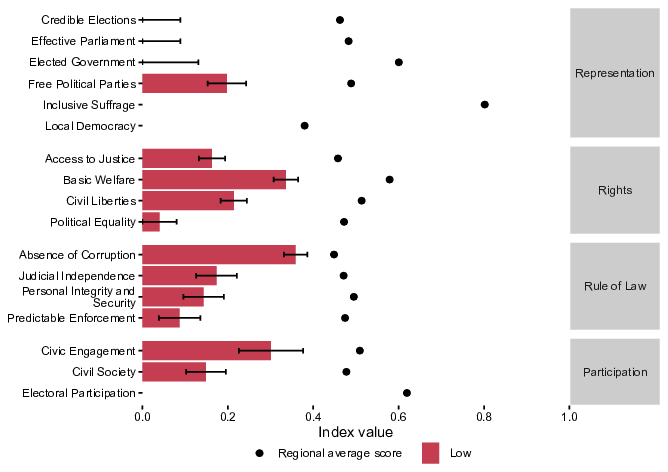
Category trends
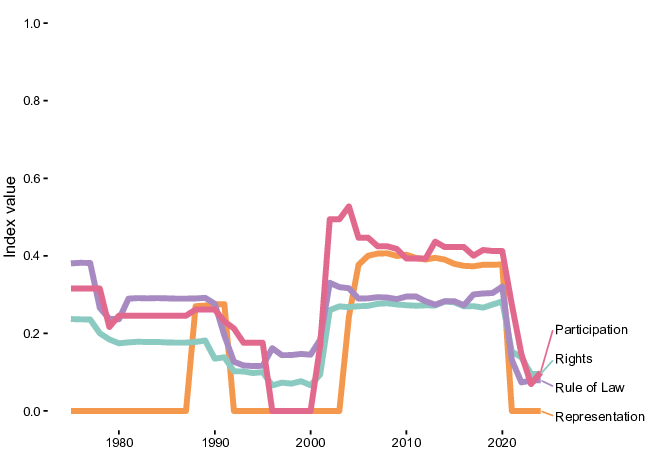
Albania (2024)
| Representation | Rights | Rule of Law | Participation | |
|---|---|---|---|---|
| Ranking | 71 | 48 | 74 | 82 |
| GSoD Indices score | 0.601 | 0.609 | 0.495 | 0.561 |
Factor scores in 2024
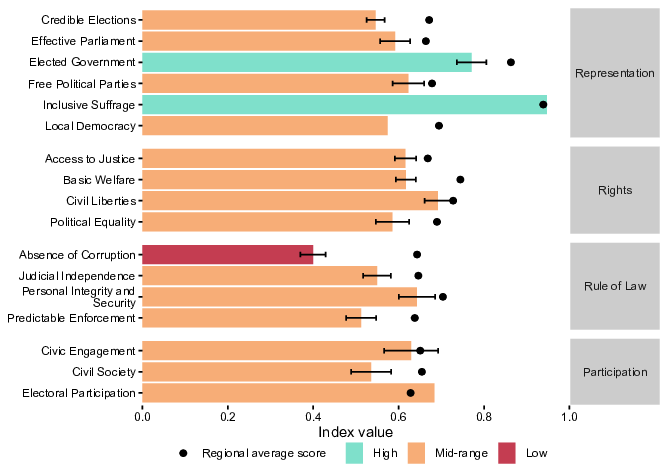
Category trends
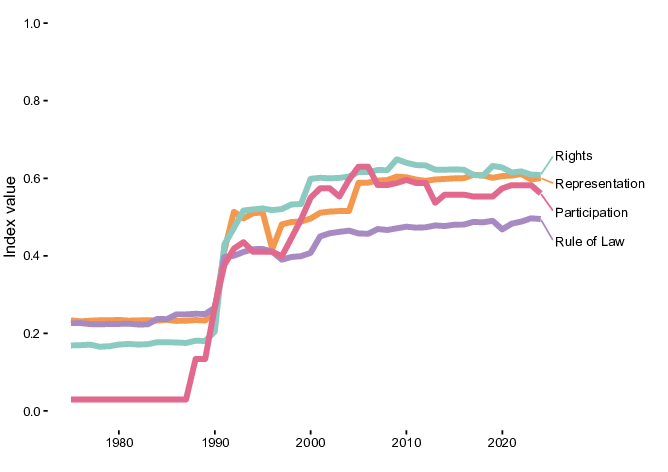
Algeria (2024)
| Representation | Rights | Rule of Law | Participation | |
|---|---|---|---|---|
| Ranking | 117 | 104 | 120 | 129 |
| GSoD Indices score | 0.374 | 0.436 | 0.36 | 0.437 |
Factor scores in 2024
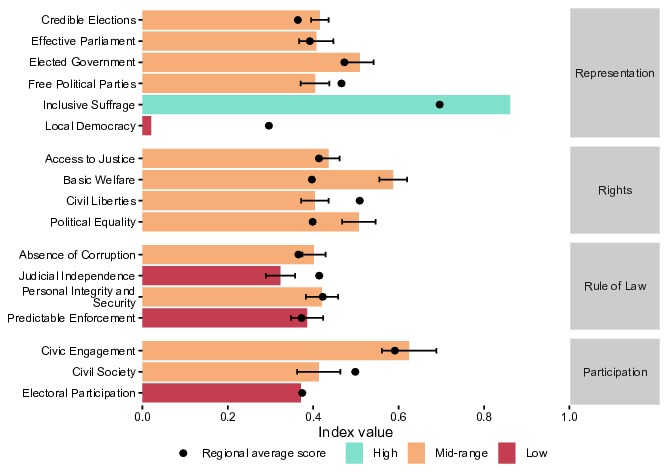
Category trends
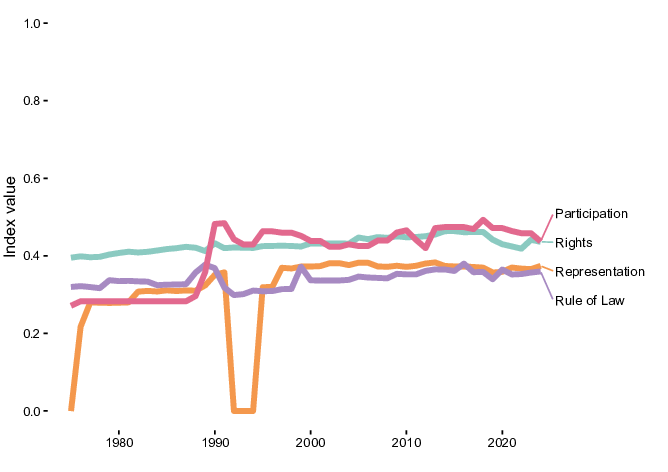
Angola (2024)
| Representation | Rights | Rule of Law | Participation | |
|---|---|---|---|---|
| Ranking | 121 | 118 | 116 | 134 |
| GSoD Indices score | 0.364 | 0.383 | 0.377 | 0.404 |
Factor scores in 2024
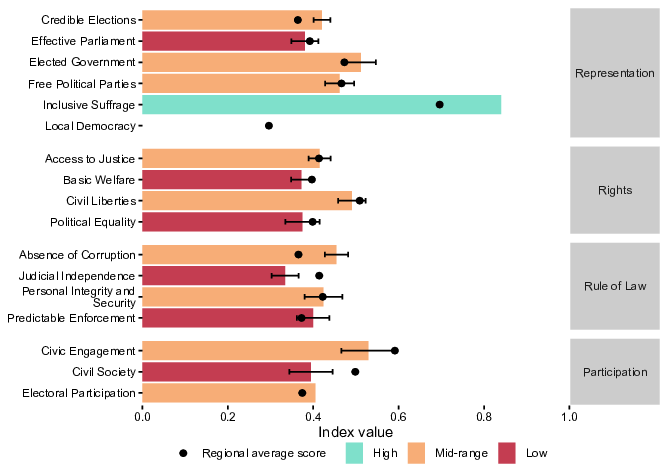
Category trends
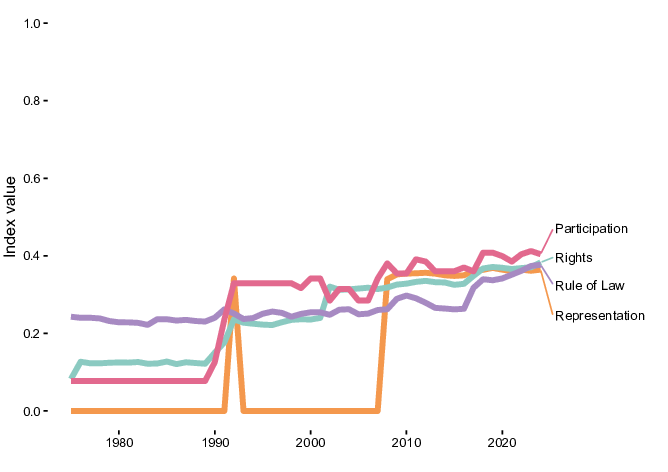
Argentina (2024)
| Representation | Rights | Rule of Law | Participation | |
|---|---|---|---|---|
| Ranking | 38 | 45 | 58 | 44 |
| GSoD Indices score | 0.748 | 0.616 | 0.529 | 0.674 |
Factor scores in 2024
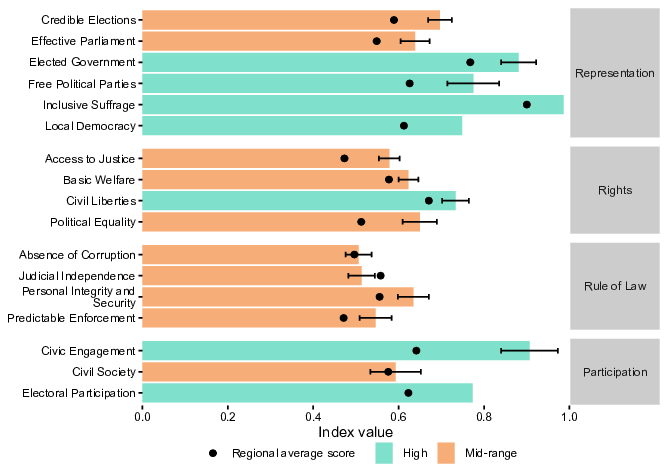
Category trends
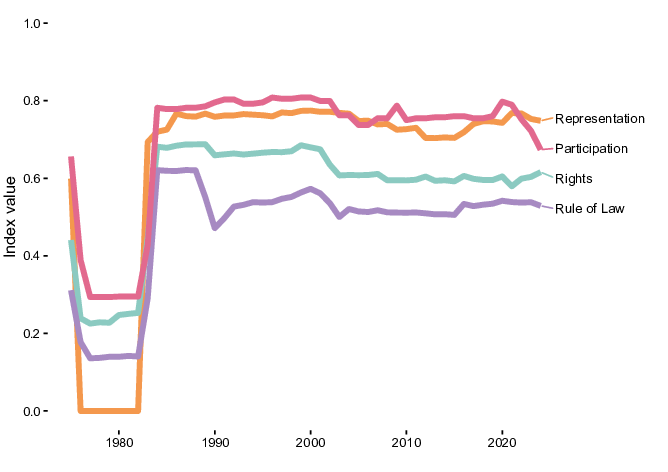
Armenia (2024)
| Representation | Rights | Rule of Law | Participation | |
|---|---|---|---|---|
| Ranking | 77 | 45 | 90 | 78 |
| GSoD Indices score | 0.578 | 0.616 | 0.442 | 0.564 |
Factor scores in 2024
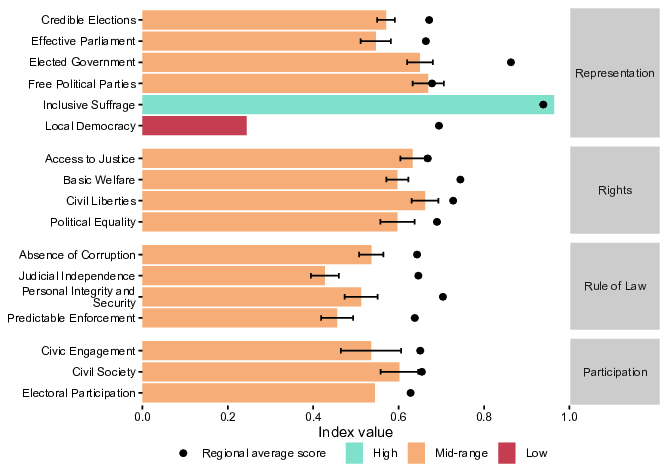
Category trends
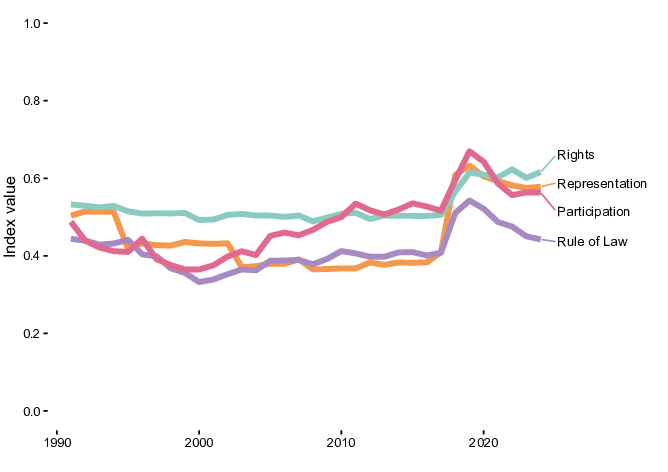
Australia (2024)
| Representation | Rights | Rule of Law | Participation | |
|---|---|---|---|---|
| Ranking | 11 | 14 | 5 | 19 |
| GSoD Indices score | 0.847 | 0.823 | 0.863 | 0.755 |
Factor scores in 2024
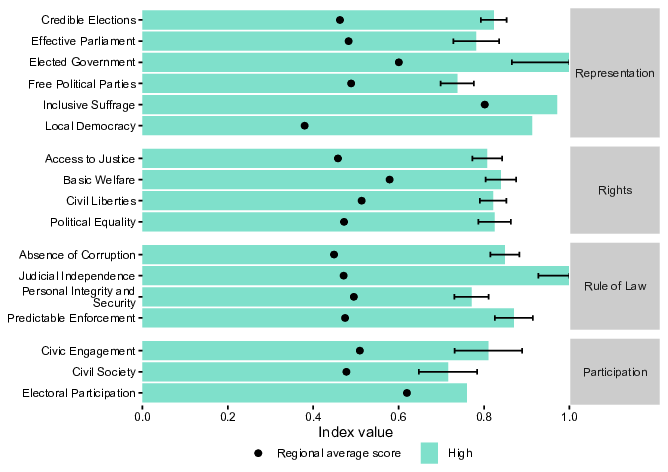
Category trends
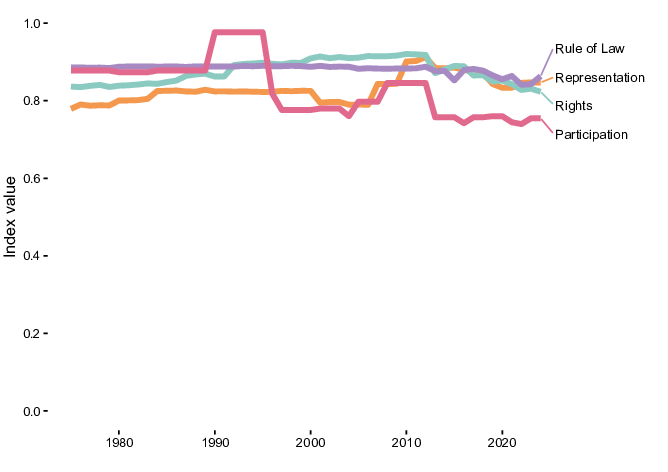
Austria (2024)
| Representation | Rights | Rule of Law | Participation | |
|---|---|---|---|---|
| Ranking | 26 | 17 | 28 | 24 |
| GSoD Indices score | 0.794 | 0.803 | 0.677 | 0.732 |
Factor scores in 2024
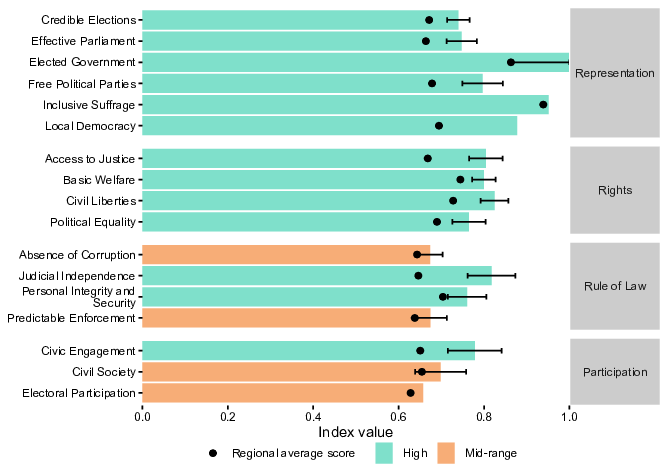
Category trends
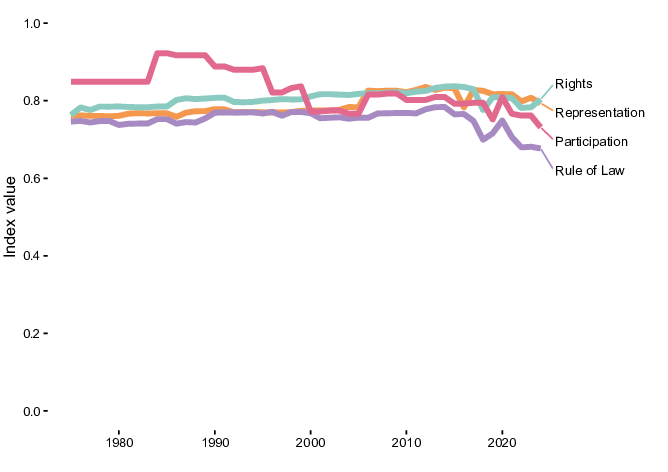
Azerbaijan (2024)
| Representation | Rights | Rule of Law | Participation | |
|---|---|---|---|---|
| Ranking | 143 | 149 | 144 | 168 |
| GSoD Indices score | 0.257 | 0.274 | 0.258 | 0.174 |
Factor scores in 2024
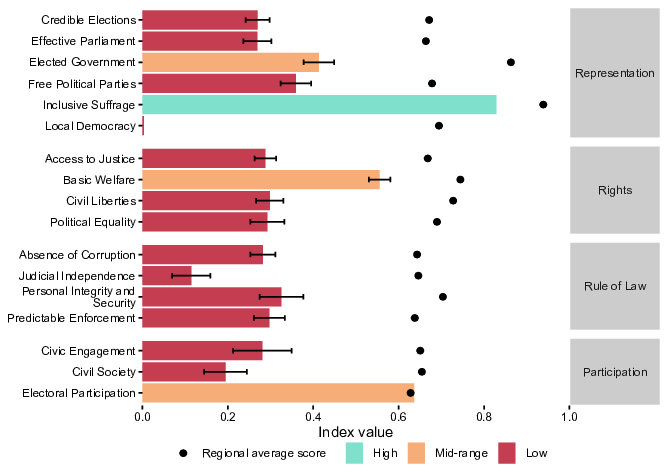
Category trends
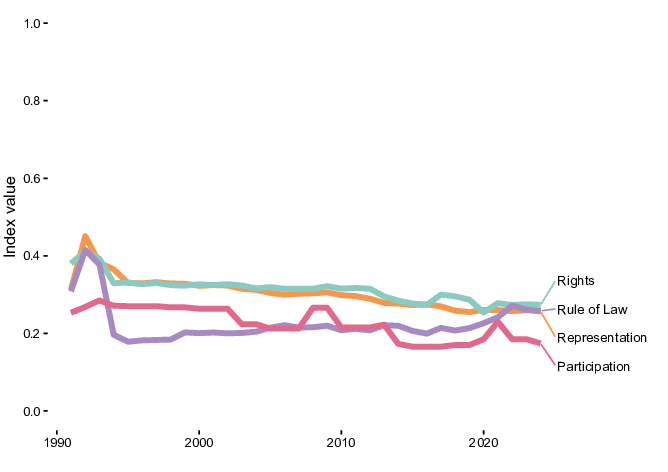
Bahrain (2024)
| Representation | Rights | Rule of Law | Participation | |
|---|---|---|---|---|
| Ranking | 138 | 151 | 136 | 143 |
| GSoD Indices score | 0.28 | 0.261 | 0.302 | 0.35 |
Factor scores in 2024
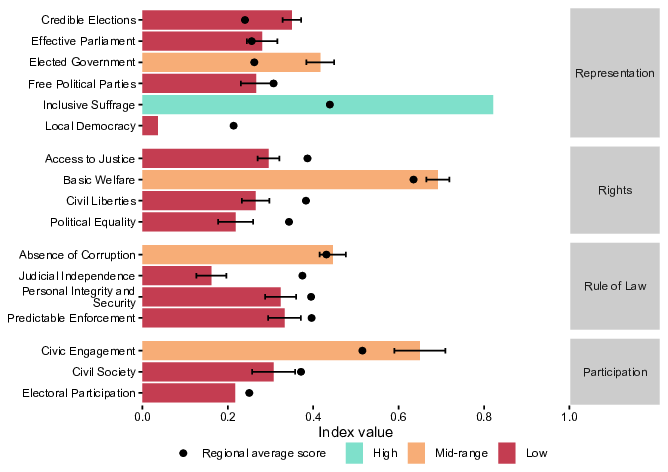
Category trends
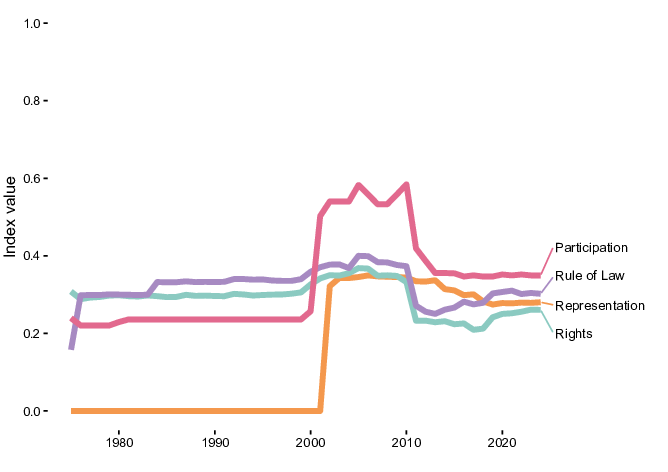
Bangladesh (2024)
| Representation | Rights | Rule of Law | Participation | |
|---|---|---|---|---|
| Ranking | 151 | 134 | 106 | 132 |
| GSoD Indices score | 0 | 0.328 | 0.394 | 0.43 |
Factor scores in 2024
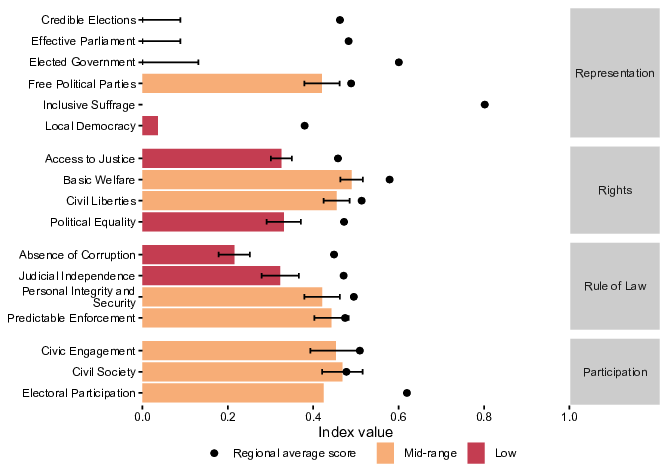
Category trends
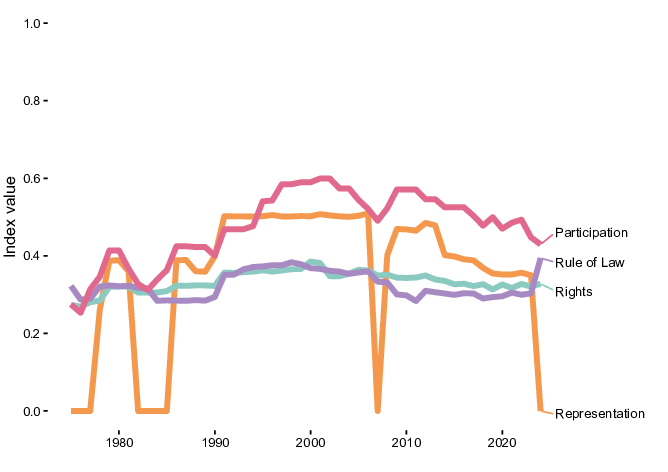
Barbados (2024)
| Representation | Rights | Rule of Law | Participation | |
|---|---|---|---|---|
| Ranking | 47 | 34 | 34 | 26 |
| GSoD Indices score | 0.701 | 0.692 | 0.647 | 0.717 |
Factor scores in 2024
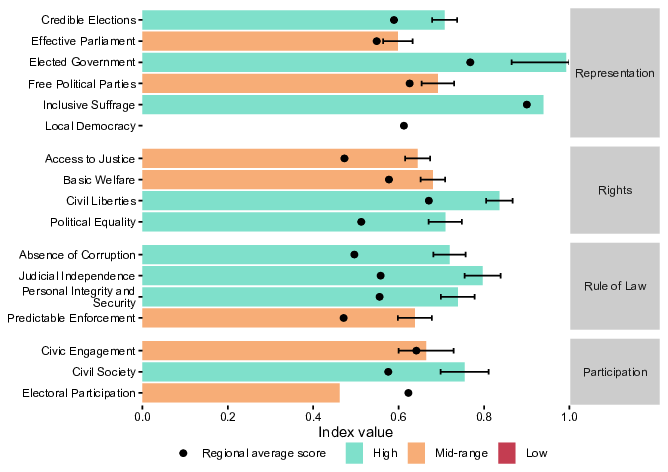
Category trends
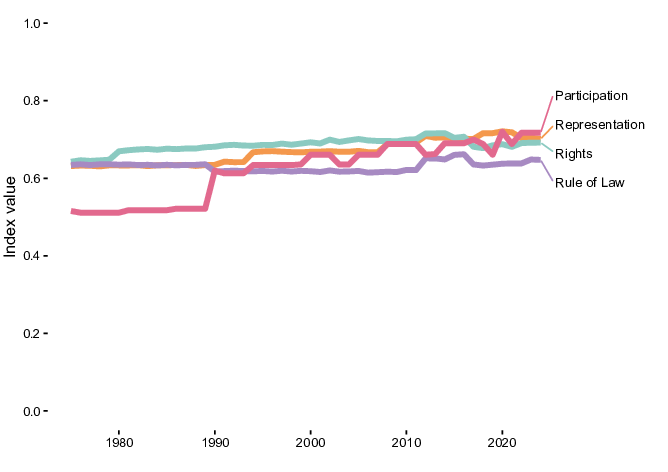
Belarus (2024)
| Representation | Rights | Rule of Law | Participation | |
|---|---|---|---|---|
| Ranking | 147 | 150 | 156 | 164 |
| GSoD Indices score | 0.236 | 0.272 | 0.19 | 0.225 |
Factor scores in 2024
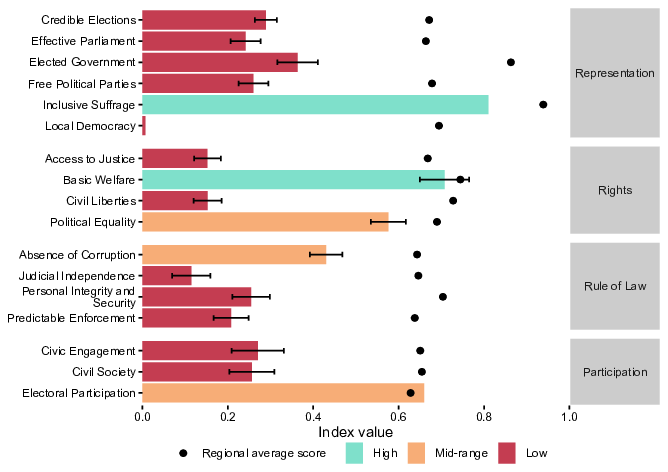
Category trends
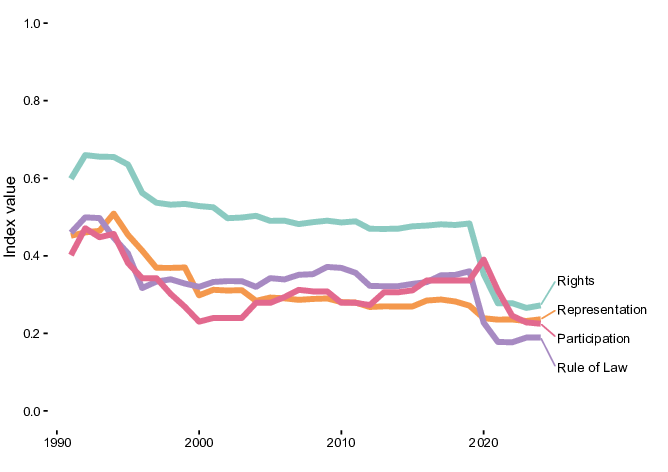
Belgium (2024)
| Representation | Rights | Rule of Law | Participation | |
|---|---|---|---|---|
| Ranking | 15 | 5 | 16 | 14 |
| GSoD Indices score | 0.831 | 0.915 | 0.774 | 0.789 |
Factor scores in 2024
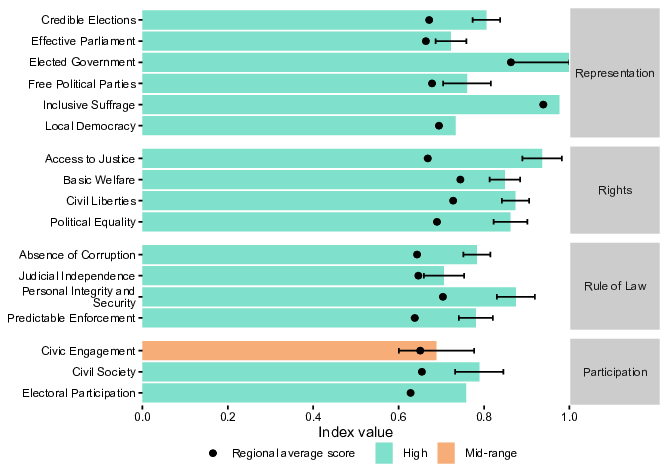
Category trends
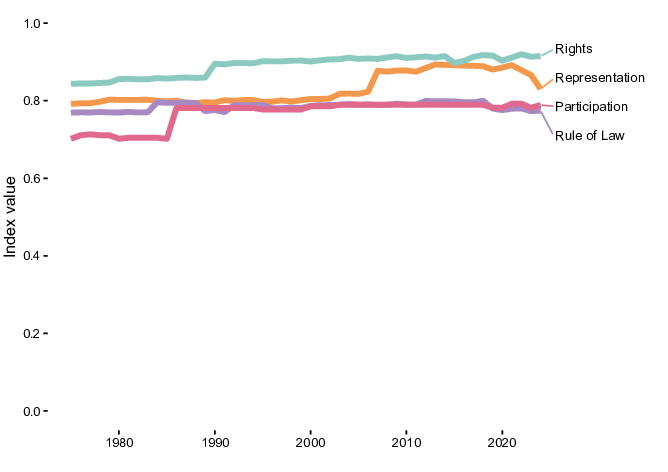
Benin (2024)
| Representation | Rights | Rule of Law | Participation | |
|---|---|---|---|---|
| Ranking | 97 | 61 | 69 | 89 |
| GSoD Indices score | 0.472 | 0.56 | 0.5 | 0.548 |
Factor scores in 2024
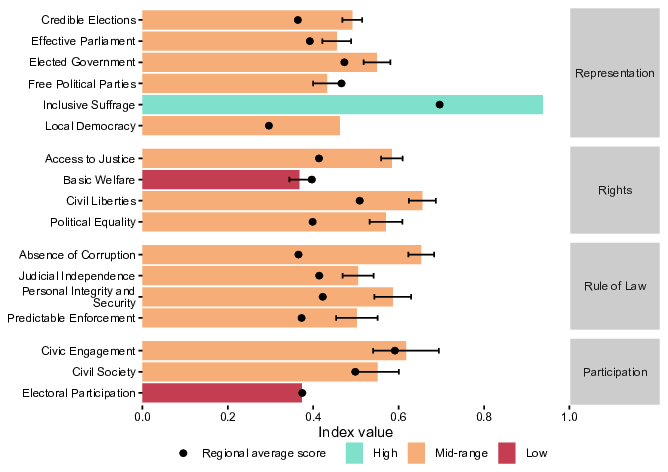
Category trends
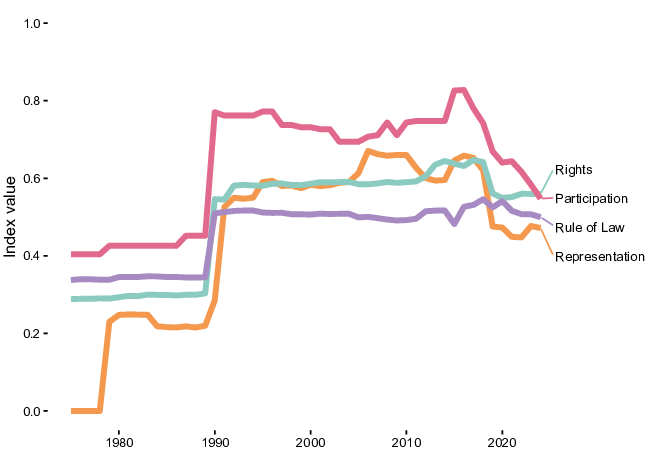
Bhutan (2024)
| Representation | Rights | Rule of Law | Participation | |
|---|---|---|---|---|
| Ranking | 54 | 59 | 36 | 113 |
| GSoD Indices score | 0.668 | 0.565 | 0.63 | 0.476 |
Factor scores in 2024
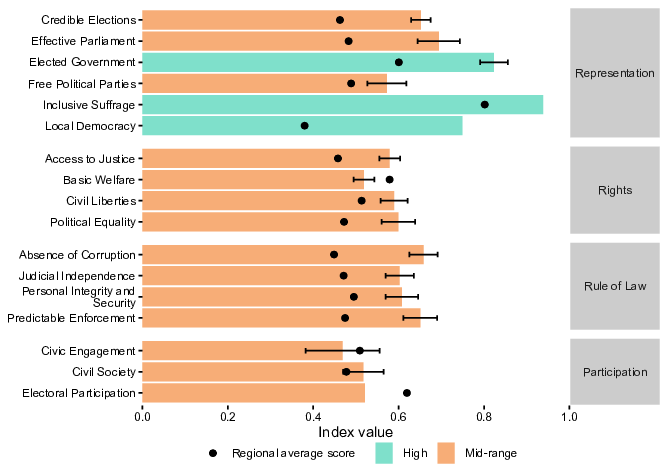
Category trends
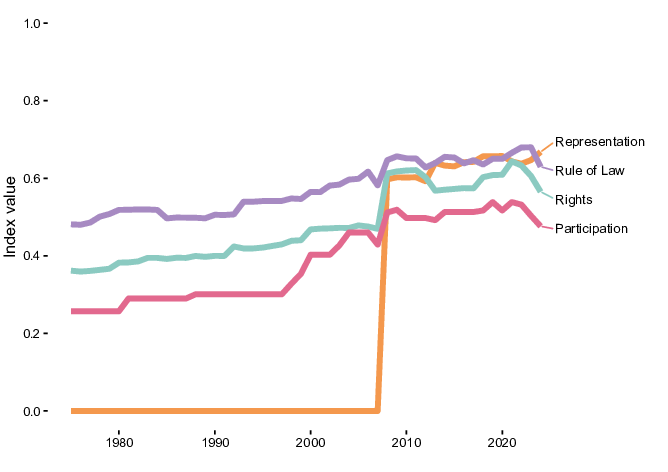
Bolivia (2024)
| Representation | Rights | Rule of Law | Participation | |
|---|---|---|---|---|
| Ranking | 80 | 98 | 92 | 49 |
| GSoD Indices score | 0.566 | 0.455 | 0.44 | 0.653 |
Factor scores in 2024
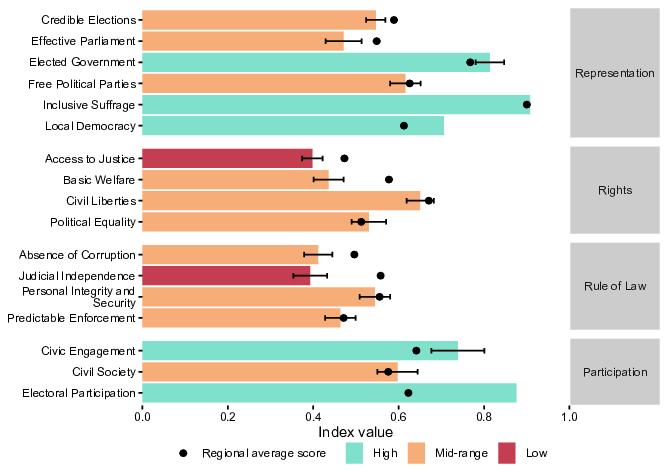
Category trends
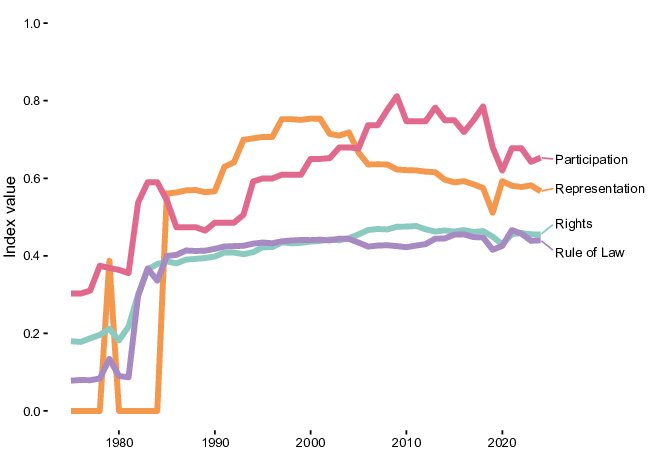
Bosnia and Herzegovina (2024)
| Representation | Rights | Rule of Law | Participation | |
|---|---|---|---|---|
| Ranking | 93 | 83 | 85 | 101 |
| GSoD Indices score | 0.5 | 0.493 | 0.465 | 0.503 |
Factor scores in 2024
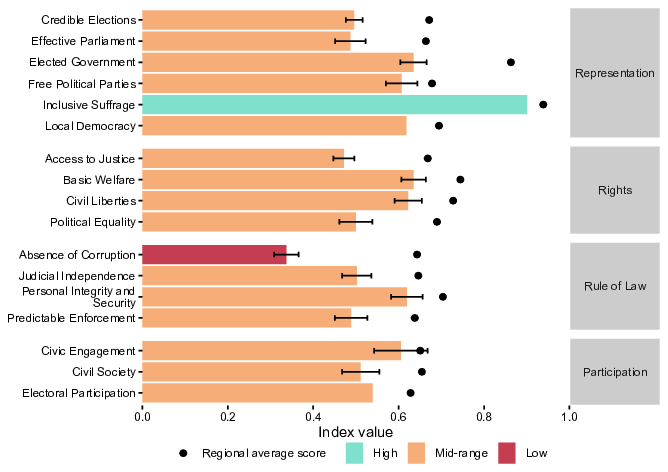
Category trends
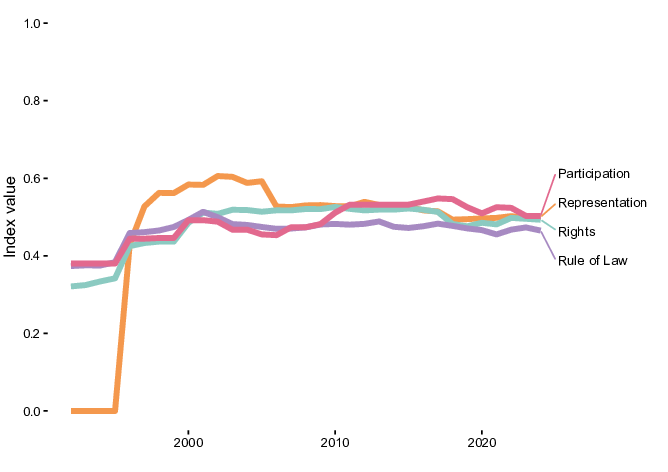
Botswana (2024)
| Representation | Rights | Rule of Law | Participation | |
|---|---|---|---|---|
| Ranking | 63 | 50 | 44 | 46 |
| GSoD Indices score | 0.639 | 0.604 | 0.579 | 0.666 |
Factor scores in 2024
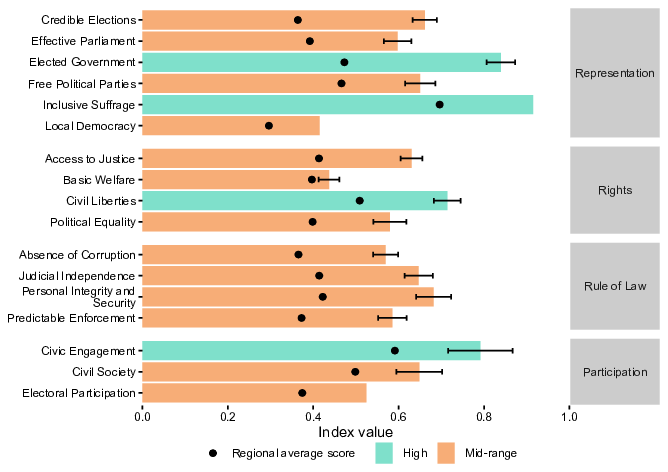
Category trends
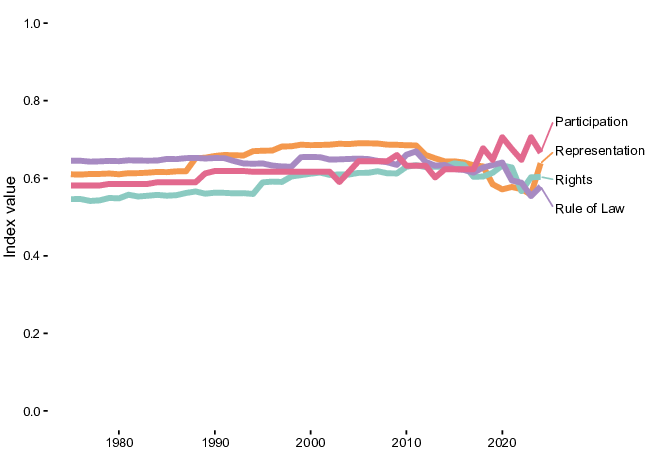
Brazil (2024)
| Representation | Rights | Rule of Law | Participation | |
|---|---|---|---|---|
| Ranking | 43 | 63 | 52 | 6 |
| GSoD Indices score | 0.733 | 0.557 | 0.548 | 0.864 |
Factor scores in 2024
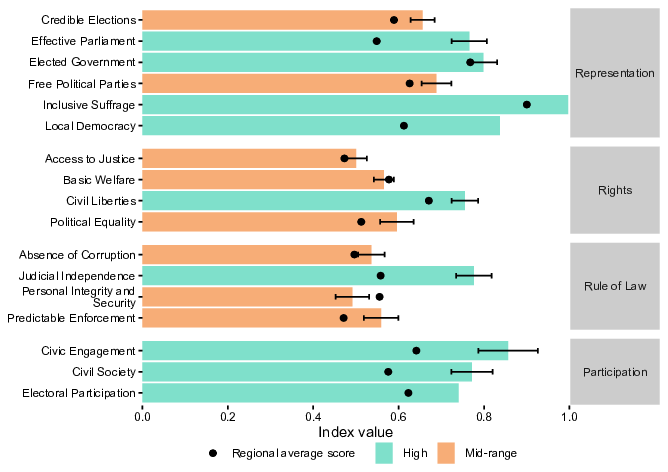
Category trends
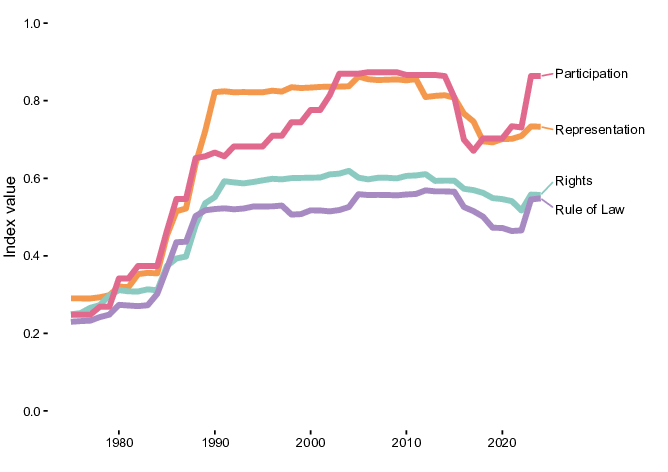
Bulgaria (2024)
| Representation | Rights | Rule of Law | Participation | |
|---|---|---|---|---|
| Ranking | 59 | 66 | 62 | 57 |
| GSoD Indices score | 0.652 | 0.554 | 0.518 | 0.627 |
Factor scores in 2024
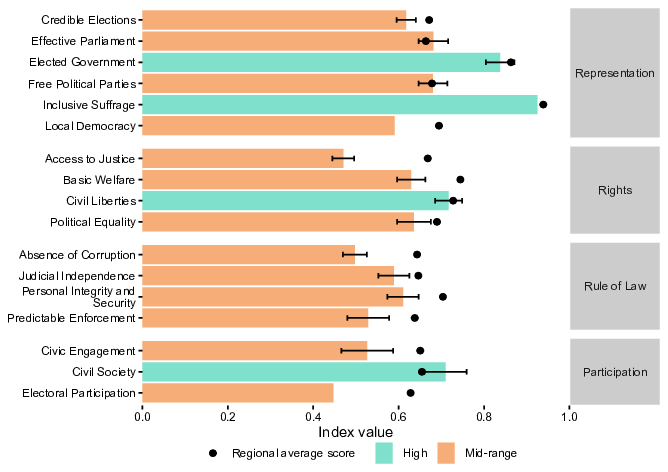
Category trends
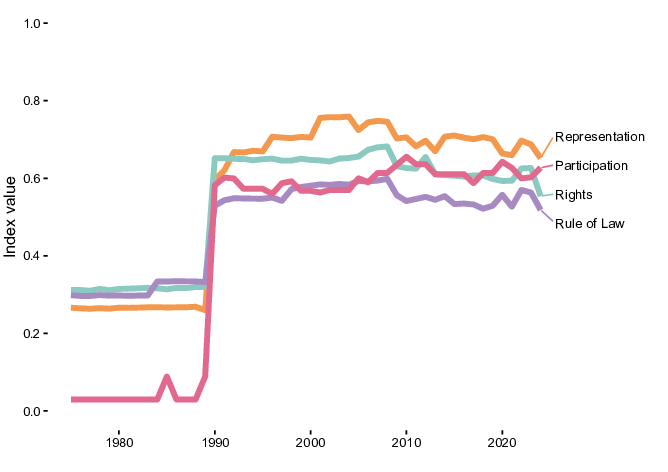
Burkina Faso (2024)
| Representation | Rights | Rule of Law | Participation | |
|---|---|---|---|---|
| Ranking | 151 | 111 | 113 | 98 |
| GSoD Indices score | 0 | 0.403 | 0.379 | 0.525 |
Factor scores in 2024
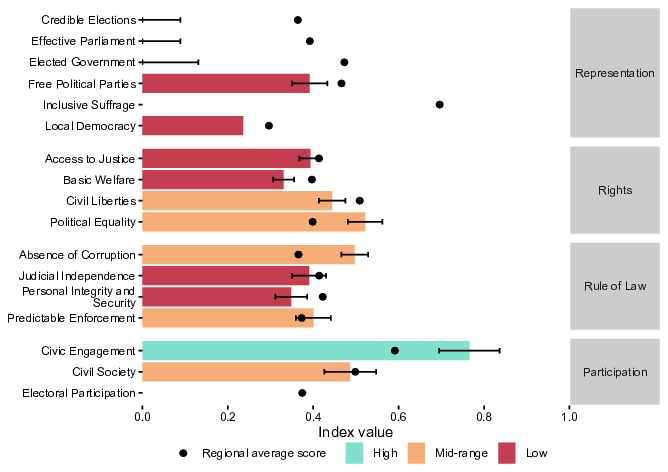
Category trends
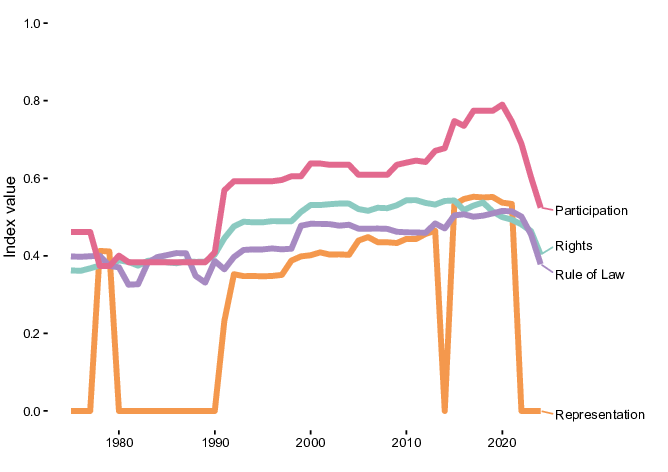
Burundi (2024)
| Representation | Rights | Rule of Law | Participation | |
|---|---|---|---|---|
| Ranking | 132 | 162 | 146 | 145 |
| GSoD Indices score | 0.311 | 0.215 | 0.246 | 0.341 |
Factor scores in 2024
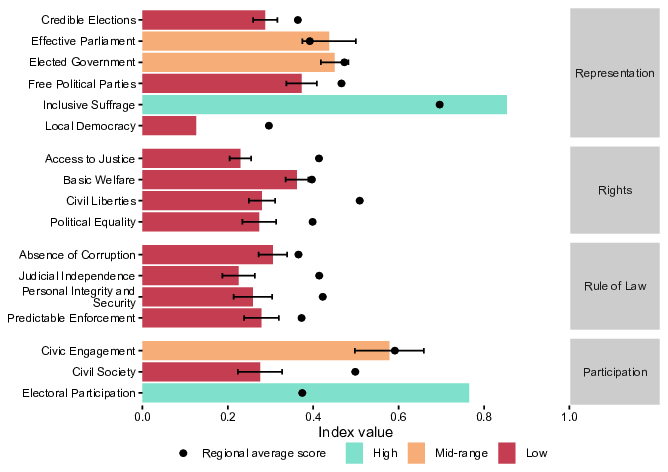
Category trends
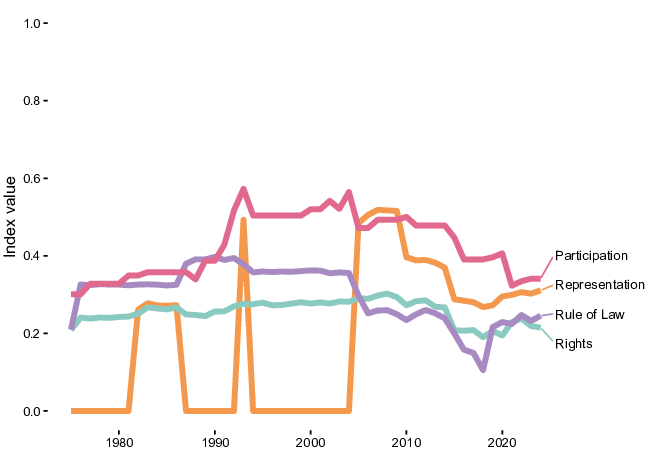
Cabo Verde (2024)
| Representation | Rights | Rule of Law | Participation | |
|---|---|---|---|---|
| Ranking | 34 | 55 | 50 | 120 |
| GSoD Indices score | 0.759 | 0.584 | 0.555 | 0.453 |
Factor scores in 2024
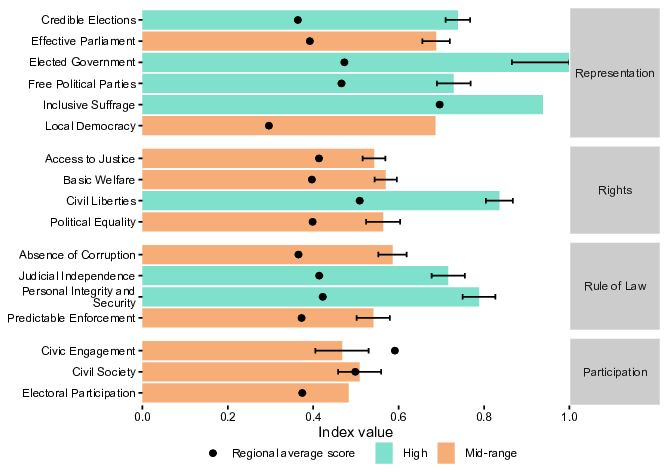
Category trends
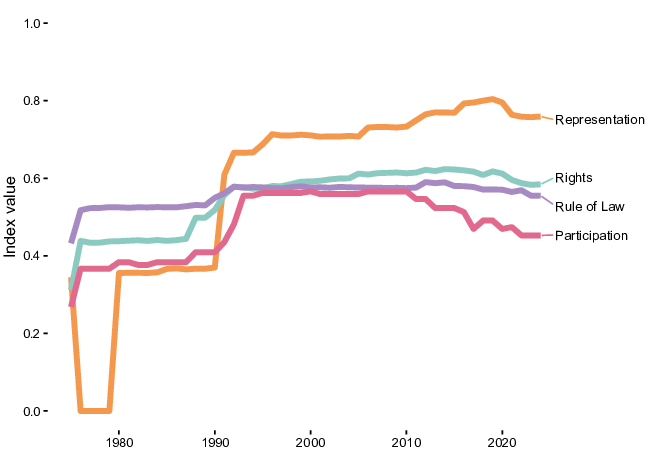
Cambodia (2024)
| Representation | Rights | Rule of Law | Participation | |
|---|---|---|---|---|
| Ranking | 140 | 156 | 155 | 150 |
| GSoD Indices score | 0.267 | 0.244 | 0.2 | 0.309 |
Factor scores in 2024
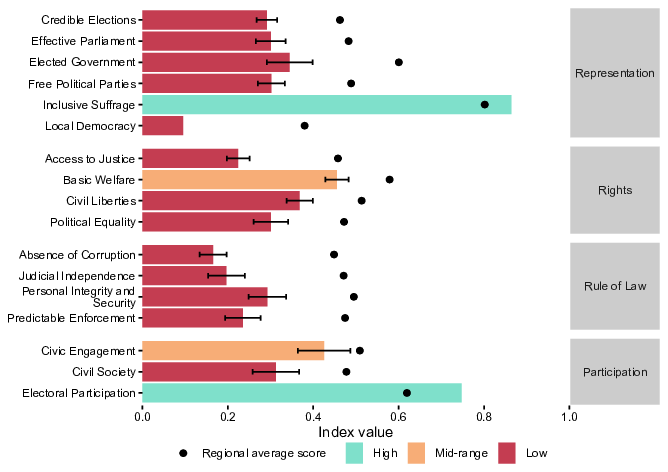
Category trends
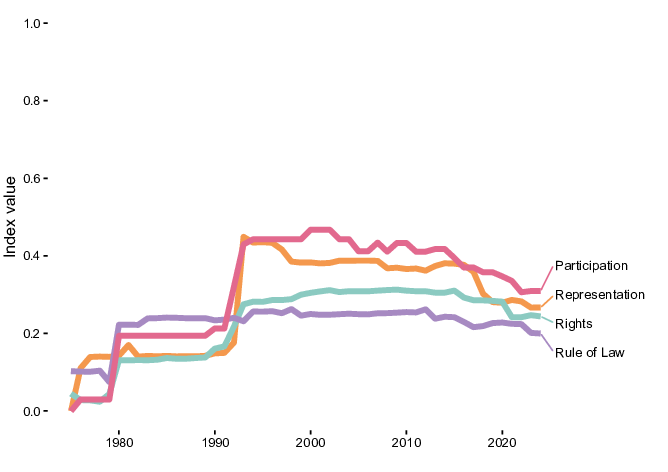
Cameroon (2024)
| Representation | Rights | Rule of Law | Participation | |
|---|---|---|---|---|
| Ranking | 125 | 141 | 149 | 107 |
| GSoD Indices score | 0.337 | 0.295 | 0.236 | 0.481 |
Factor scores in 2024
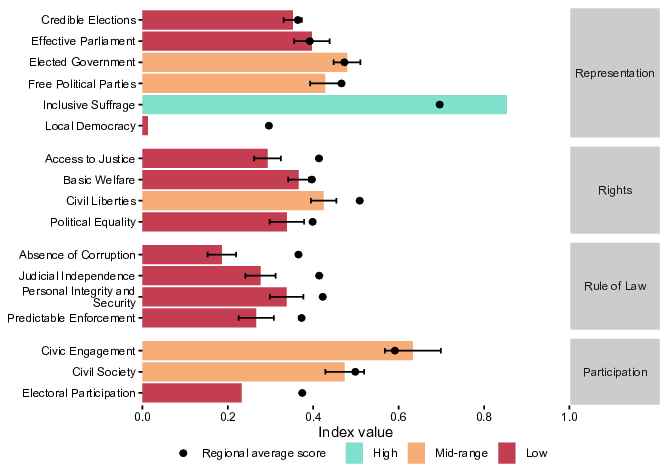
Category trends
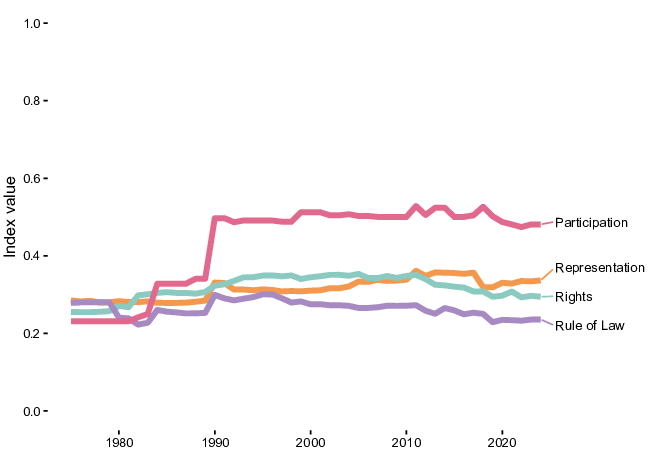
Canada (2024)
| Representation | Rights | Rule of Law | Participation | |
|---|---|---|---|---|
| Ranking | 20 | 27 | 25 | 30 |
| GSoD Indices score | 0.814 | 0.739 | 0.706 | 0.708 |
Factor scores in 2024
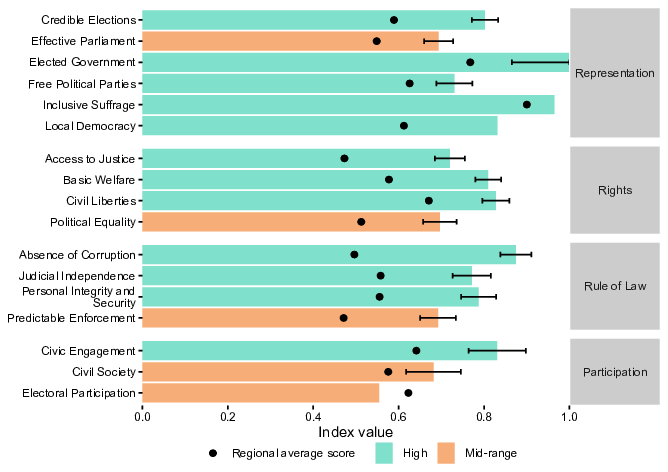
Category trends
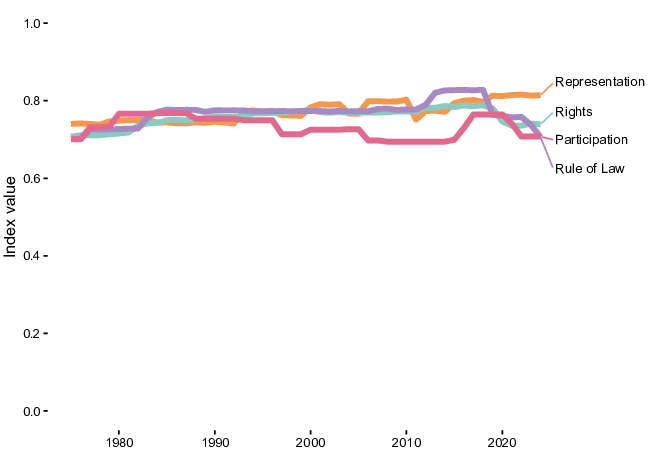
Central African Republic (2024)
| Representation | Rights | Rule of Law | Participation | |
|---|---|---|---|---|
| Ranking | 129 | 161 | 161 | 148 |
| GSoD Indices score | 0.322 | 0.217 | 0.143 | 0.312 |
Factor scores in 2024
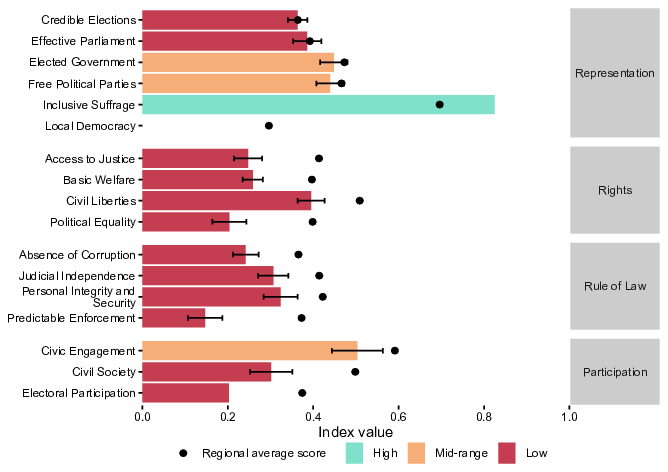
Category trends
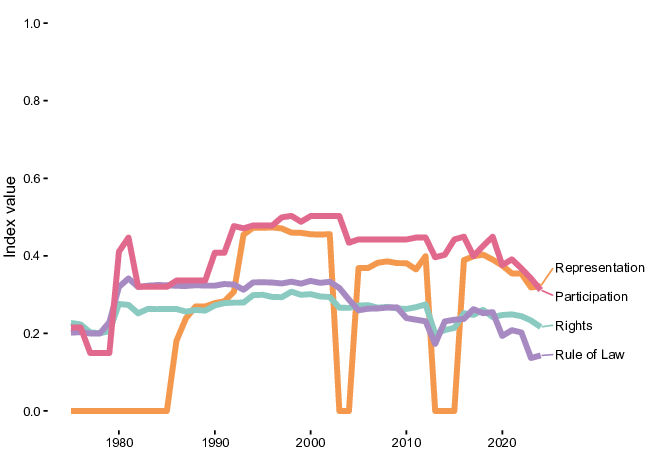
Chad (2024)
| Representation | Rights | Rule of Law | Participation | |
|---|---|---|---|---|
| Ranking | 141 | 159 | 167 | 138 |
| GSoD Indices score | 0.266 | 0.225 | 0.128 | 0.384 |
Factor scores in 2024
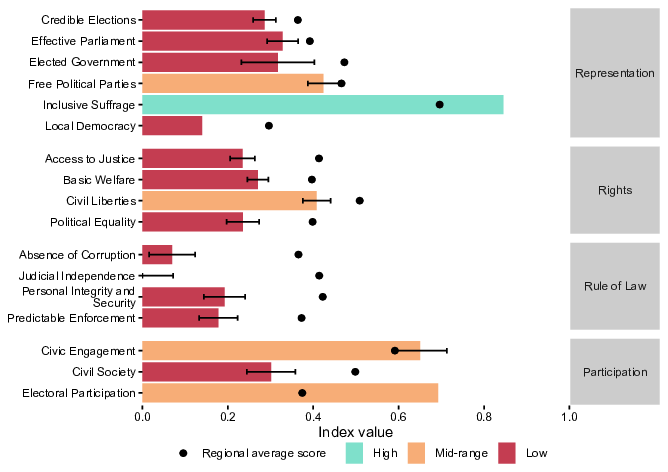
Category trends
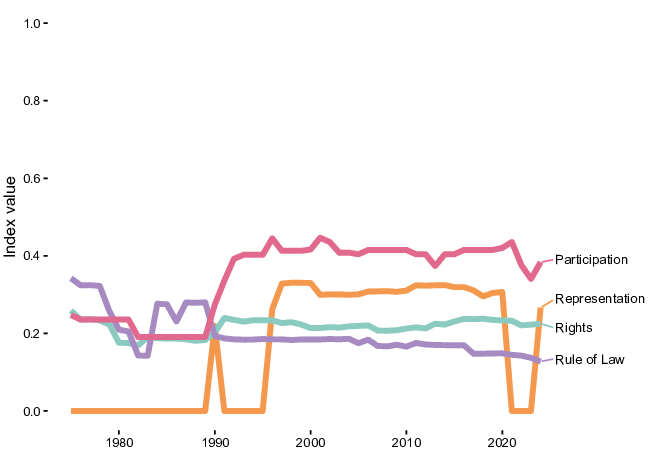
Chile (2024)
| Representation | Rights | Rule of Law | Participation | |
|---|---|---|---|---|
| Ranking | 5 | 33 | 22 | 37 |
| GSoD Indices score | 0.875 | 0.696 | 0.729 | 0.696 |
Factor scores in 2024
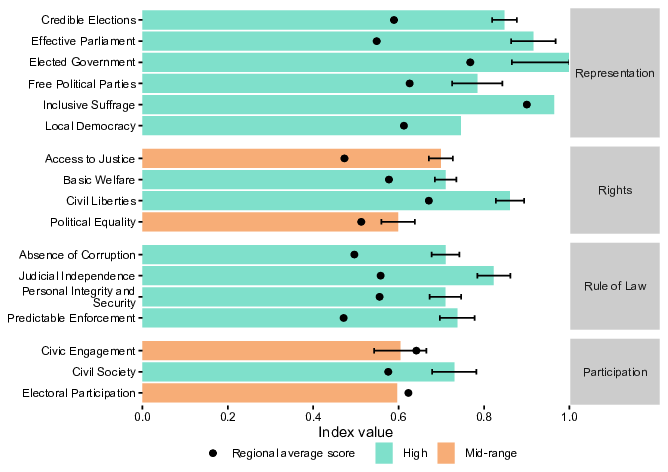
Category trends
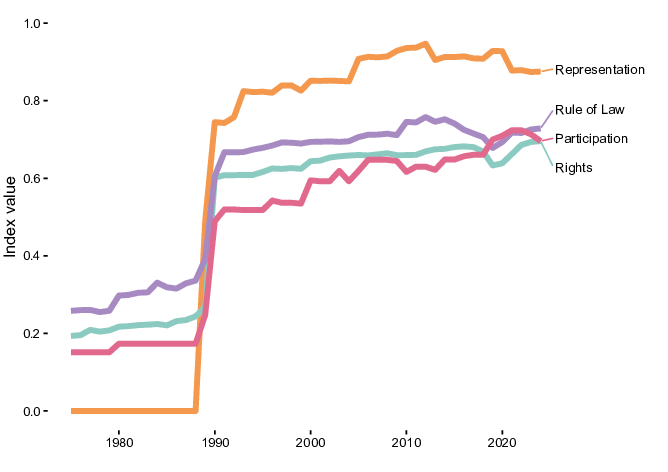
China (2024)
| Representation | Rights | Rule of Law | Participation | |
|---|---|---|---|---|
| Ranking | 151 | 138 | 125 | 158 |
| GSoD Indices score | 0 | 0.313 | 0.345 | 0.241 |
Factor scores in 2024
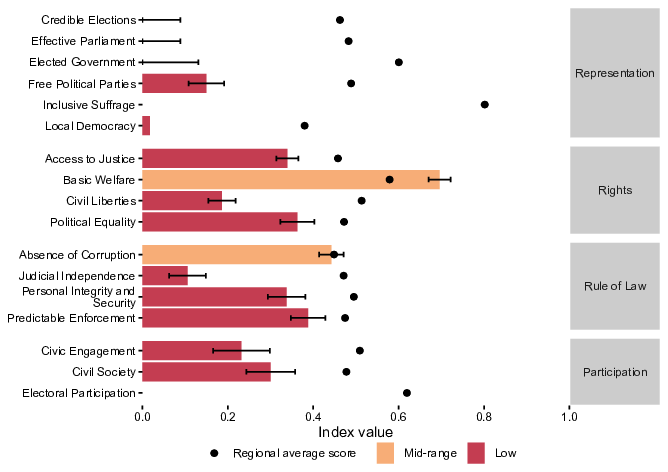
Category trends
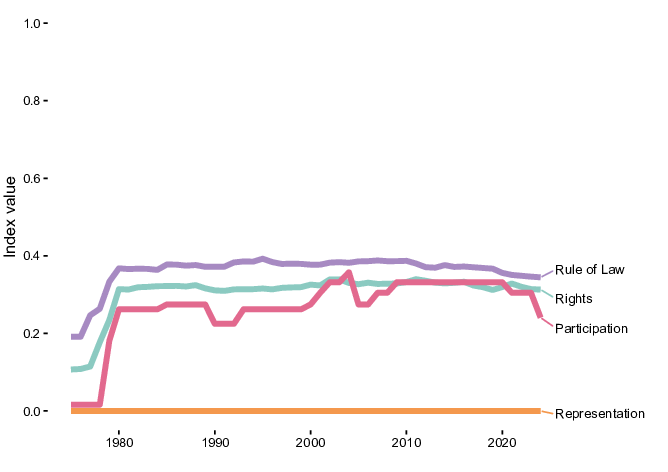
Colombia (2024)
| Representation | Rights | Rule of Law | Participation | |
|---|---|---|---|---|
| Ranking | 49 | 91 | 79 | 84 |
| GSoD Indices score | 0.678 | 0.47 | 0.478 | 0.555 |
Factor scores in 2024
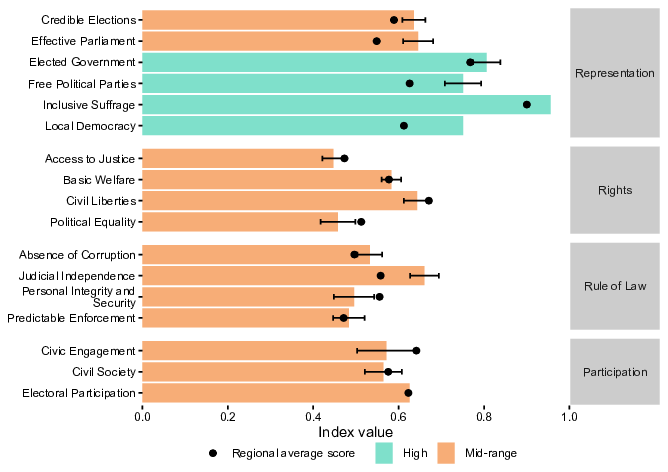
Category trends
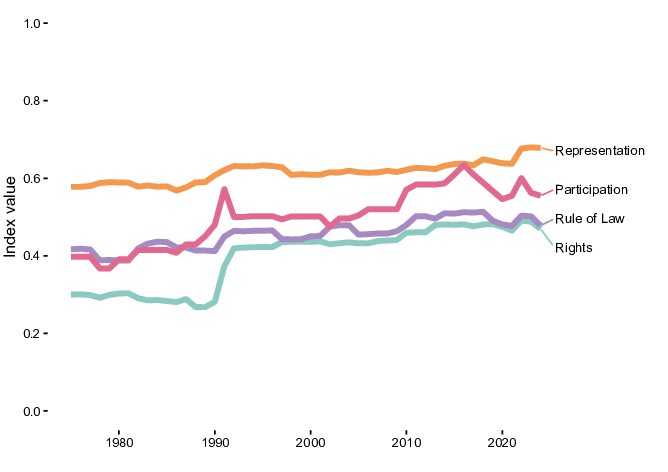
Comoros (2024)
| Representation | Rights | Rule of Law | Participation | |
|---|---|---|---|---|
| Ranking | 120 | 146 | 137 | 104 |
| GSoD Indices score | 0.365 | 0.281 | 0.3 | 0.495 |
Factor scores in 2024
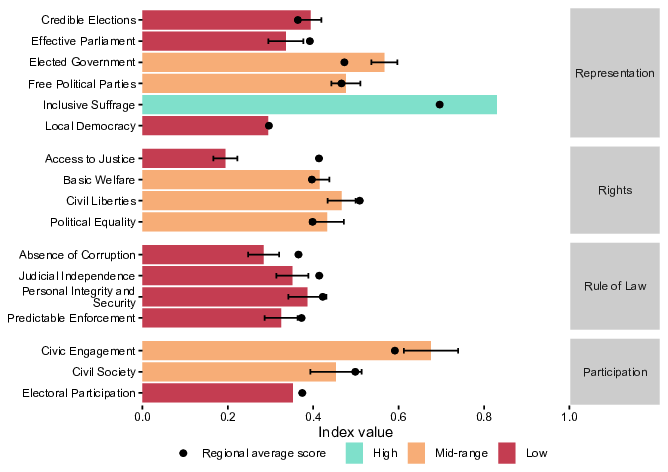
Category trends
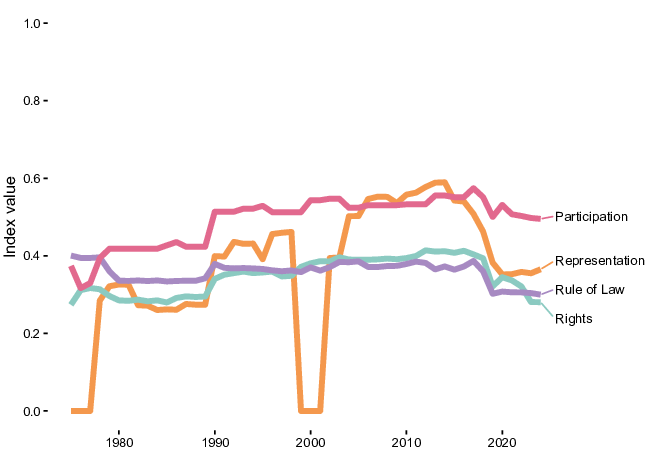
Congo (2024)
| Representation | Rights | Rule of Law | Participation | |
|---|---|---|---|---|
| Ranking | 134 | 153 | 142 | 133 |
| GSoD Indices score | 0.302 | 0.258 | 0.276 | 0.426 |
Factor scores in 2024
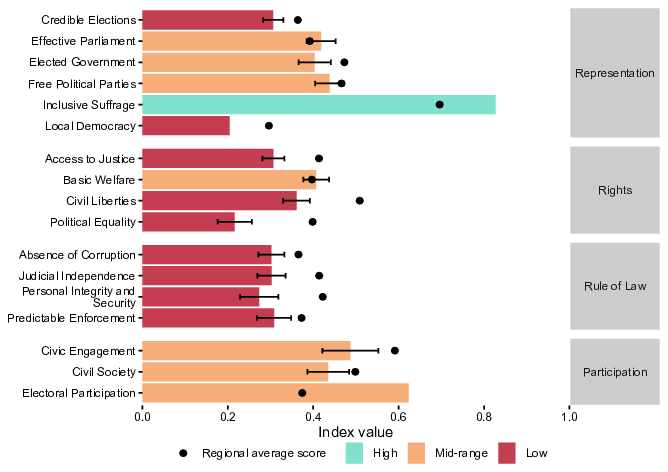
Category trends
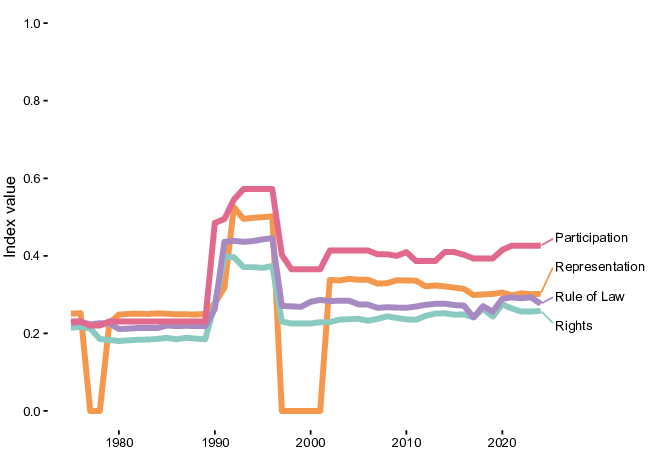
Costa Rica (2024)
| Representation | Rights | Rule of Law | Participation | |
|---|---|---|---|---|
| Ranking | 4 | 23 | 23 | 15 |
| GSoD Indices score | 0.876 | 0.782 | 0.719 | 0.786 |
Factor scores in 2024
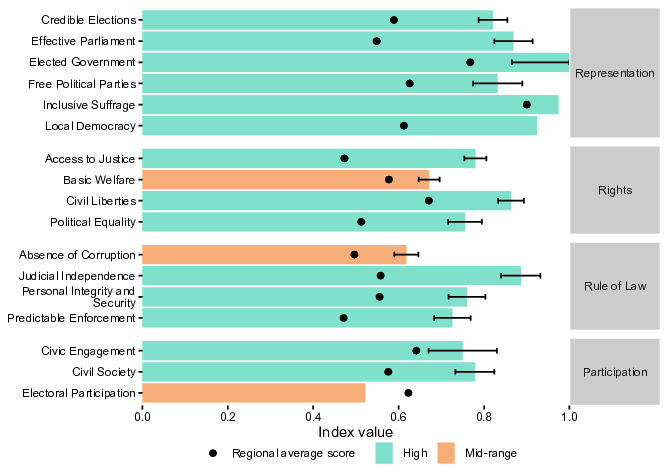
Category trends
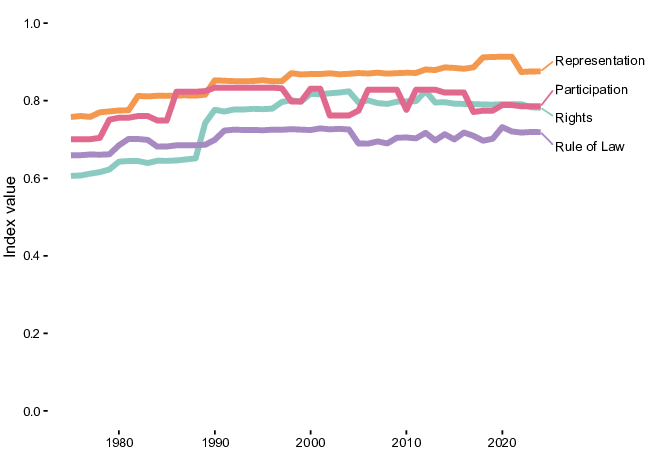
Côte d’Ivoire (2024)
| Representation | Rights | Rule of Law | Participation | |
|---|---|---|---|---|
| Ranking | 100 | 107 | 108 | 92 |
| GSoD Indices score | 0.47 | 0.422 | 0.386 | 0.542 |
Factor scores in 2024
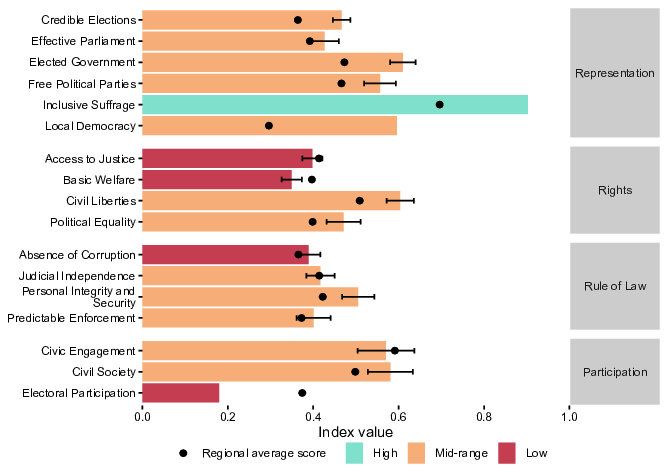
Category trends
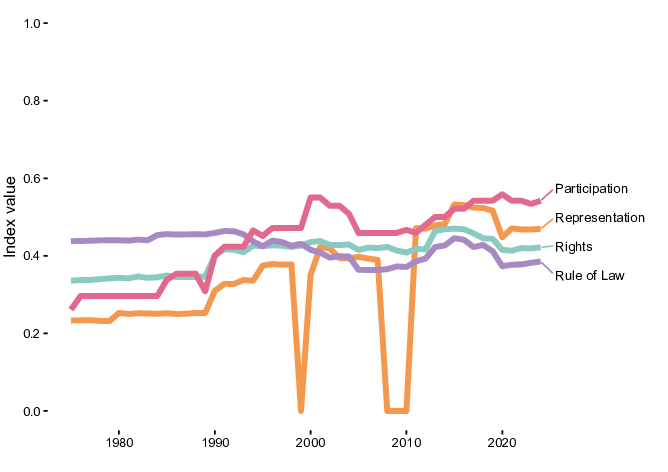
Croatia (2024)
| Representation | Rights | Rule of Law | Participation | |
|---|---|---|---|---|
| Ranking | 32 | 43 | 49 | 62 |
| GSoD Indices score | 0.763 | 0.627 | 0.556 | 0.603 |
Factor scores in 2024
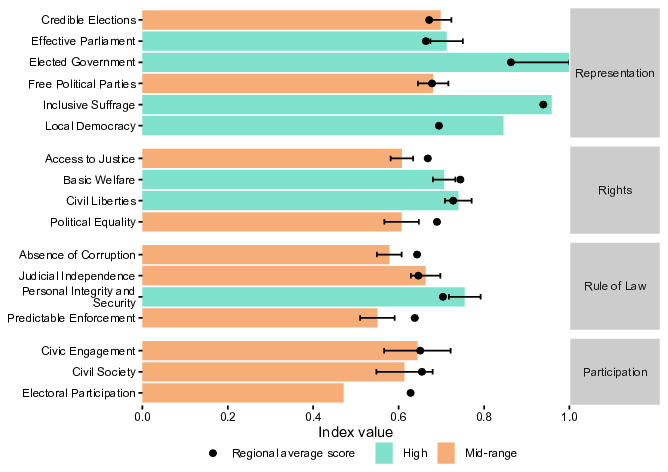
Category trends
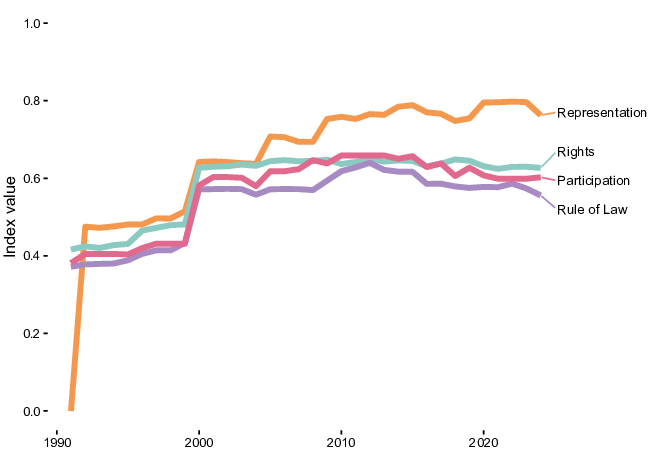
Cuba (2024)
| Representation | Rights | Rule of Law | Participation | |
|---|---|---|---|---|
| Ranking | 146 | 145 | 153 | 166 |
| GSoD Indices score | 0.25 | 0.283 | 0.211 | 0.199 |
Factor scores in 2024
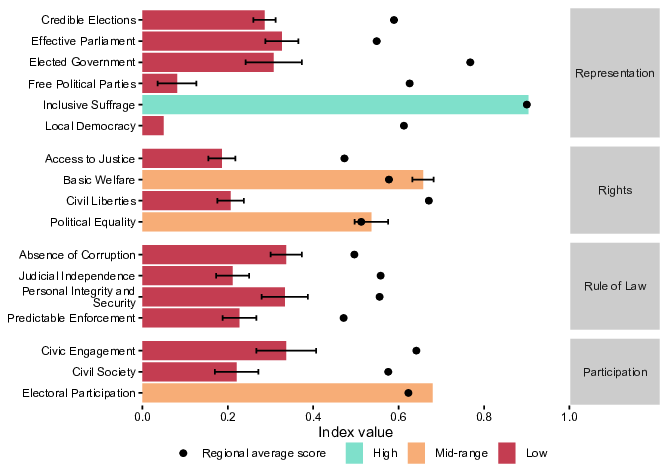
Category trends
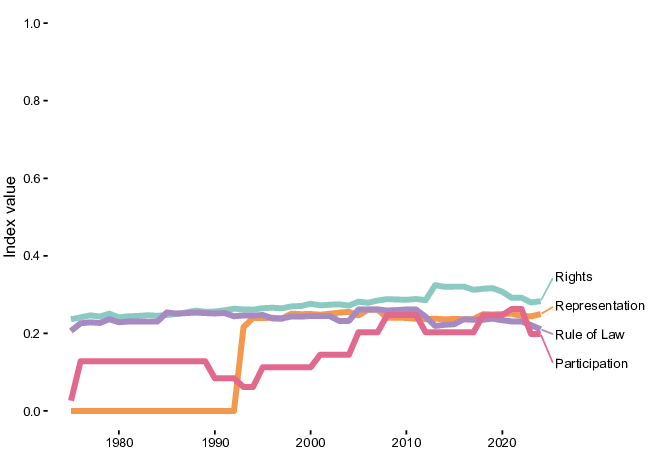
Cyprus (2024)
| Representation | Rights | Rule of Law | Participation | |
|---|---|---|---|---|
| Ranking | 31 | 25 | 30 | 39 |
| GSoD Indices score | 0.769 | 0.763 | 0.665 | 0.69 |
Factor scores in 2024
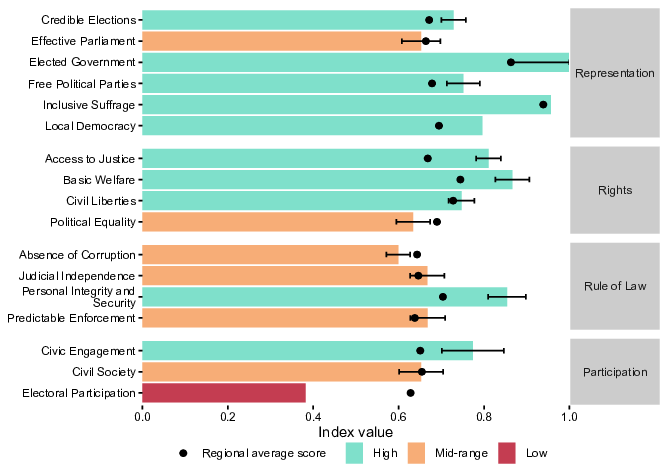
Category trends
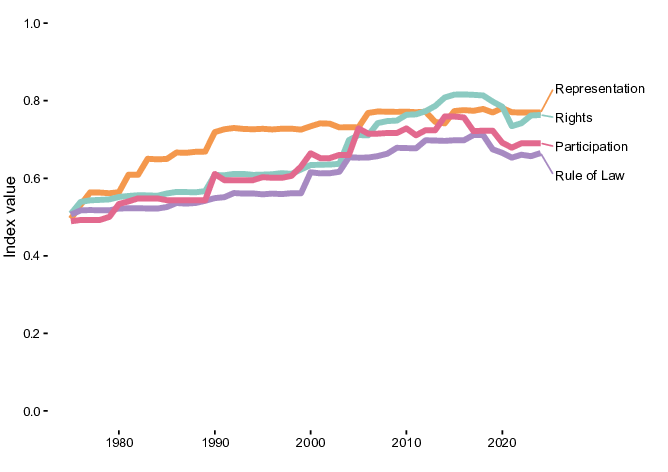
Czechia (2024)
| Representation | Rights | Rule of Law | Participation | |
|---|---|---|---|---|
| Ranking | 17 | 13 | 15 | 37 |
| GSoD Indices score | 0.828 | 0.832 | 0.787 | 0.696 |
Factor scores in 2024
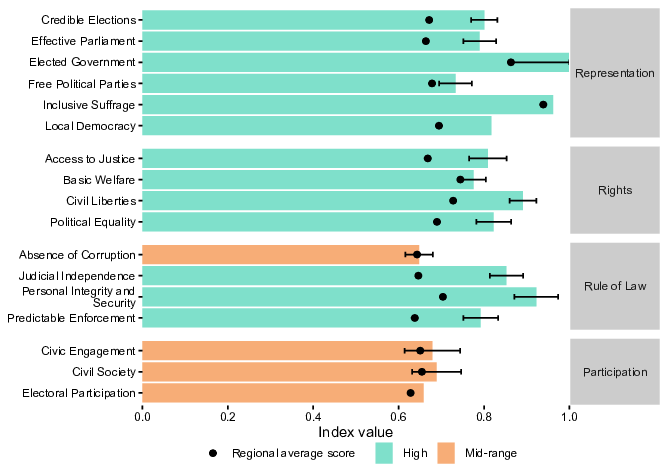
Category trends
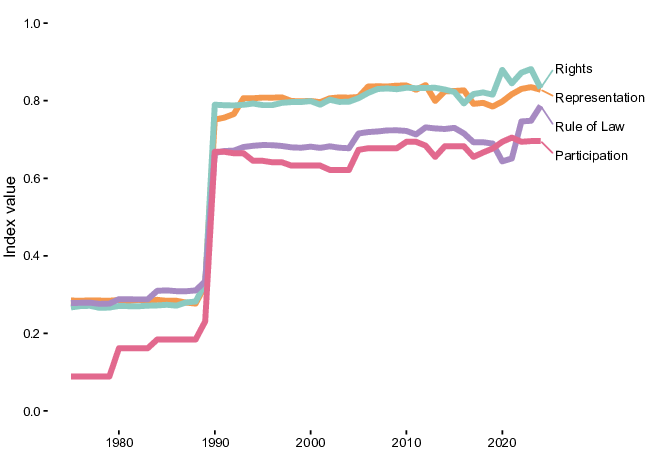
Democratic Republic of the Congo (2024)
| Representation | Rights | Rule of Law | Participation | |
|---|---|---|---|---|
| Ranking | 127 | 152 | 152 | 110 |
| GSoD Indices score | 0.33 | 0.259 | 0.212 | 0.479 |
Factor scores in 2024
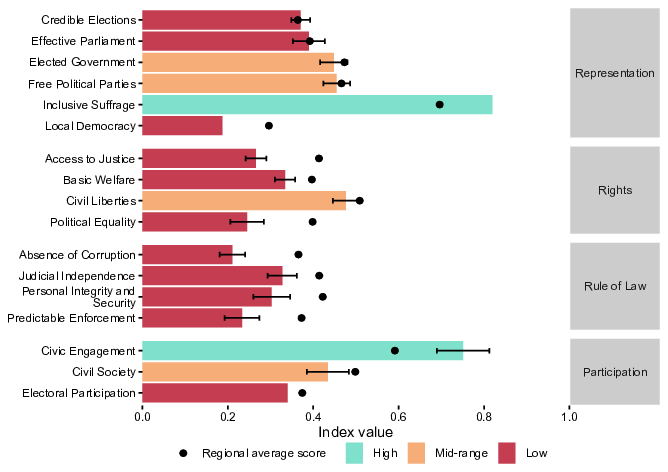
Category trends
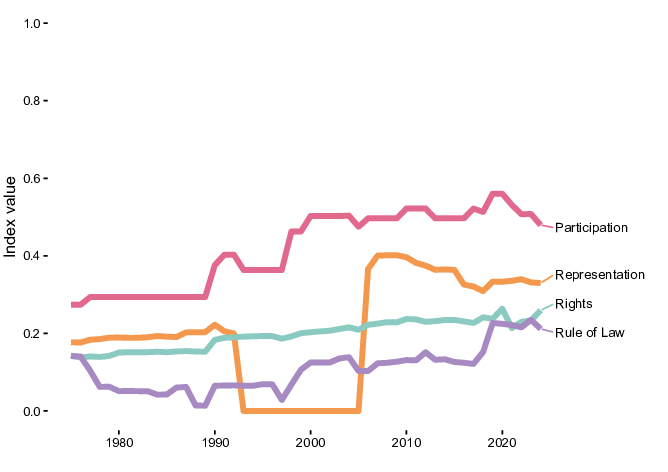
Denmark (2024)
| Representation | Rights | Rule of Law | Participation | |
|---|---|---|---|---|
| Ranking | 2 | 1 | 1 | 1 |
| GSoD Indices score | 0.88 | 0.951 | 0.993 | 0.964 |
Factor scores in 2024
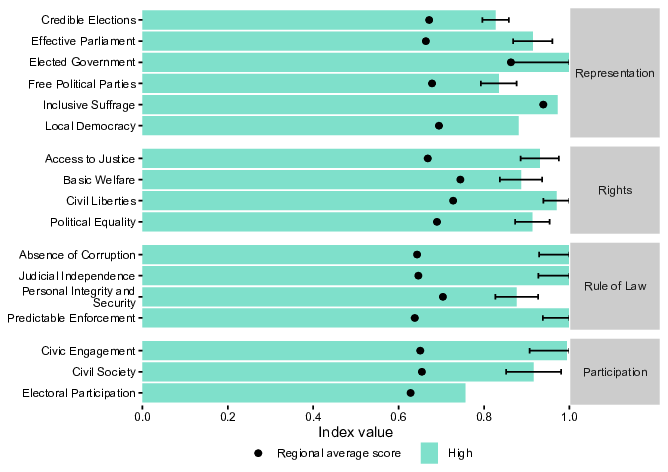
Category trends
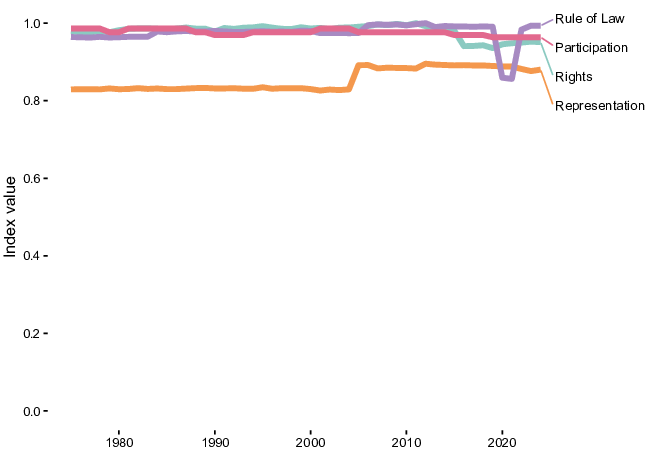
Djibouti (2024)
| Representation | Rights | Rule of Law | Participation | |
|---|---|---|---|---|
| Ranking | 130 | 123 | 127 | 142 |
| GSoD Indices score | 0.319 | 0.366 | 0.341 | 0.36 |
Factor scores in 2024
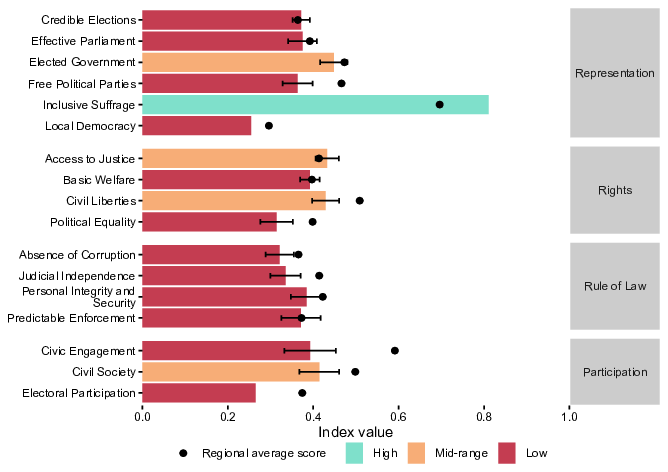
Category trends
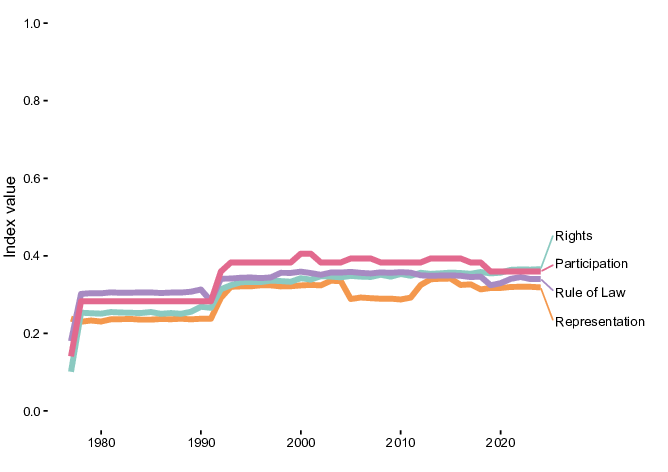
Dominican Republic (2024)
| Representation | Rights | Rule of Law | Participation | |
|---|---|---|---|---|
| Ranking | 67 | 101 | 89 | 53 |
| GSoD Indices score | 0.627 | 0.444 | 0.457 | 0.635 |
Factor scores in 2024
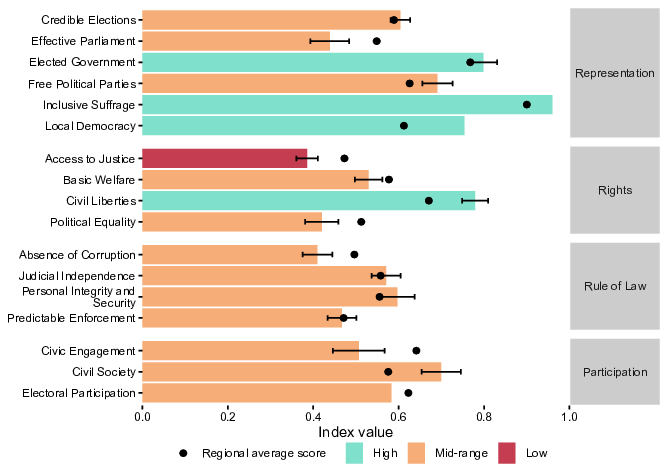
Category trends
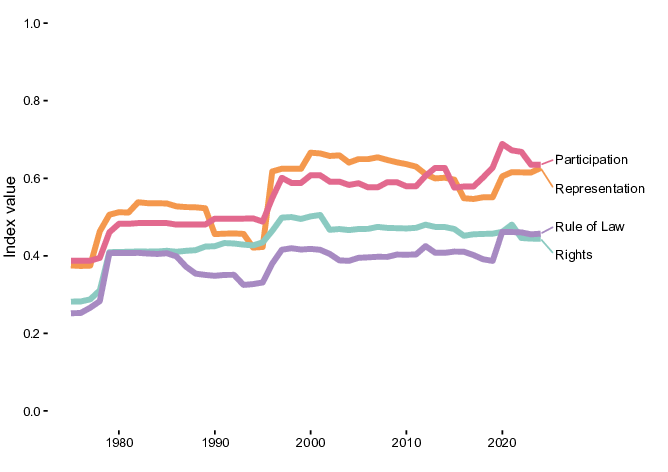
Ecuador (2024)
| Representation | Rights | Rule of Law | Participation | |
|---|---|---|---|---|
| Ranking | 57 | 95 | 102 | 87 |
| GSoD Indices score | 0.656 | 0.463 | 0.404 | 0.55 |
Factor scores in 2024
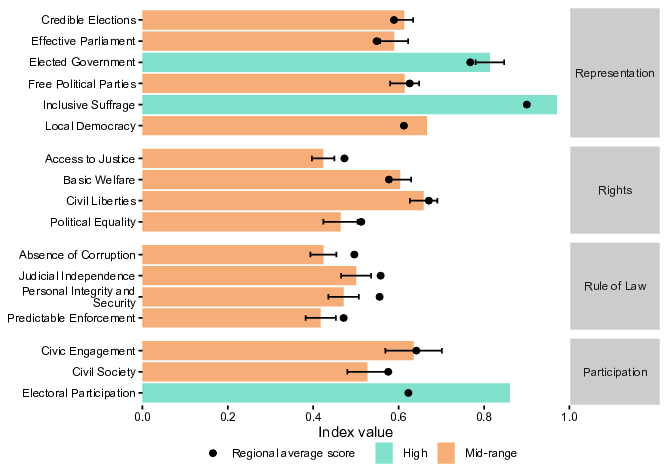
Category trends
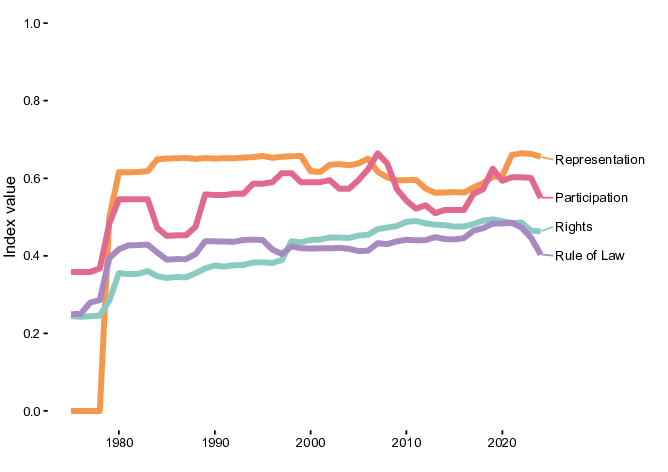
Egypt (2024)
| Representation | Rights | Rule of Law | Participation | |
|---|---|---|---|---|
| Ranking | 127 | 122 | 140 | 144 |
| GSoD Indices score | 0.33 | 0.367 | 0.288 | 0.348 |
Factor scores in 2024
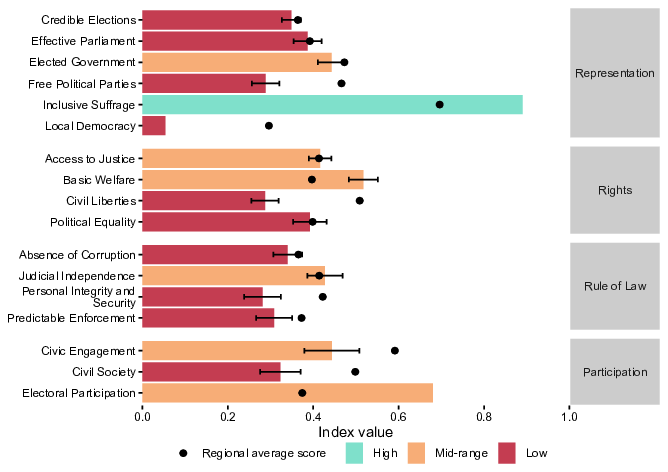
Category trends
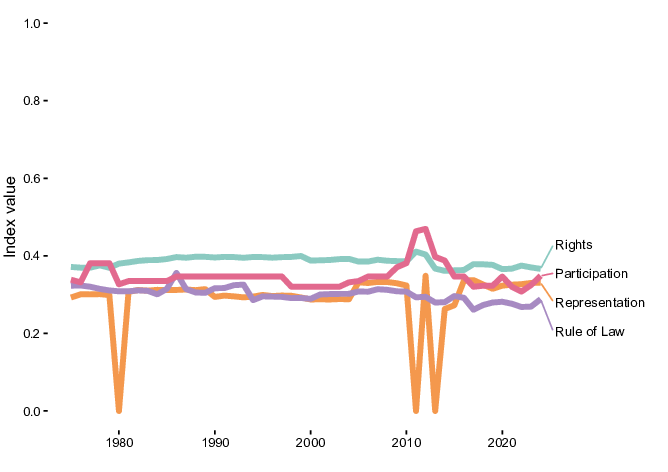
El Salvador (2024)
| Representation | Rights | Rule of Law | Participation | |
|---|---|---|---|---|
| Ranking | 106 | 147 | 149 | 108 |
| GSoD Indices score | 0.438 | 0.277 | 0.236 | 0.48 |
Factor scores in 2024
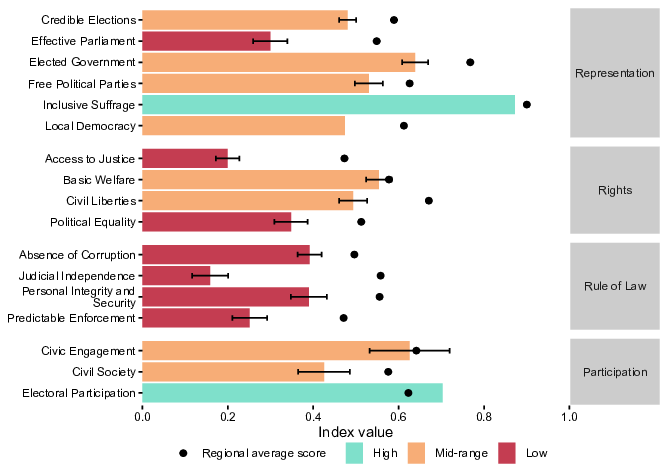
Category trends
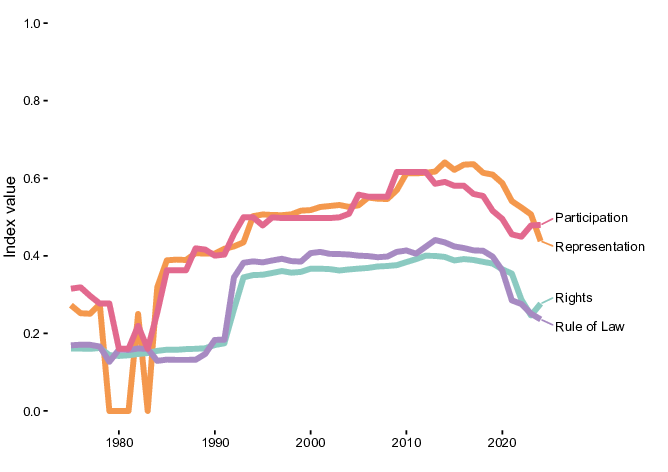
Equatorial Guinea (2024)
| Representation | Rights | Rule of Law | Participation | |
|---|---|---|---|---|
| Ranking | 142 | 163 | 158 | 165 |
| GSoD Indices score | 0.26 | 0.208 | 0.179 | 0.215 |
Factor scores in 2024
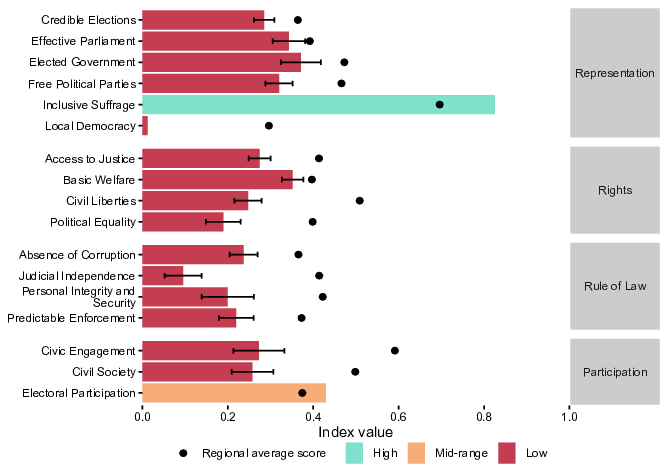
Category trends
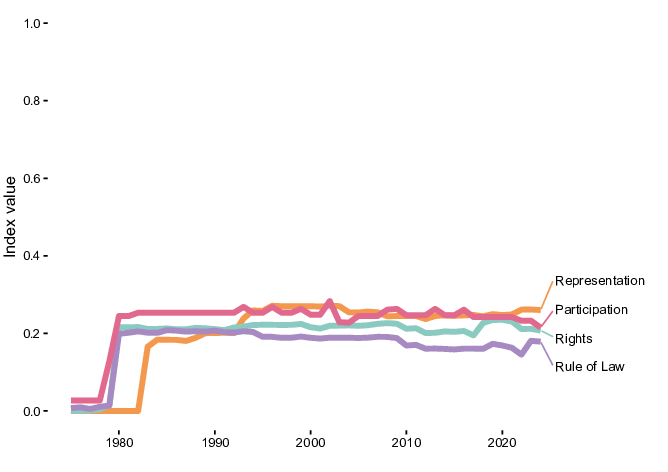
Eritrea (2024)
| Representation | Rights | Rule of Law | Participation | |
|---|---|---|---|---|
| Ranking | 151 | 167 | 169 | 173 |
| GSoD Indices score | 0 | 0.147 | 0.097 | 0.016 |
Factor scores in 2024
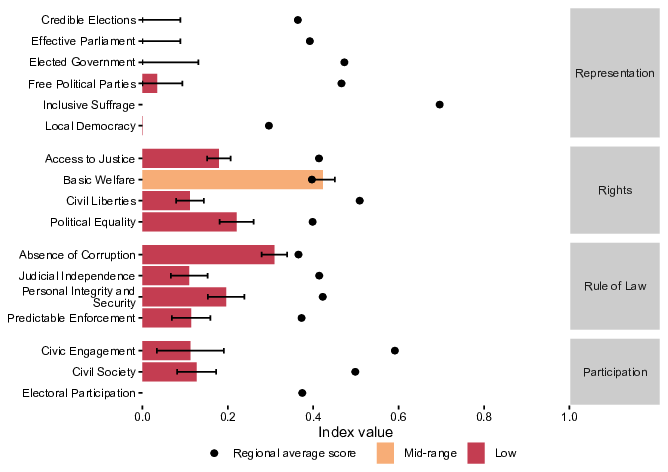
Category trends
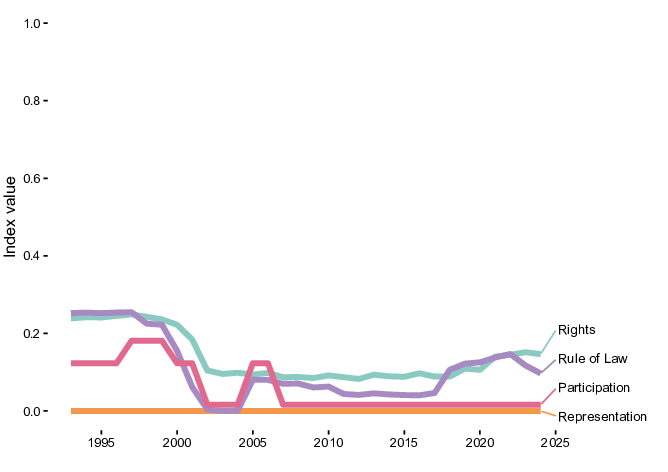
Estonia (2024)
| Representation | Rights | Rule of Law | Participation | |
|---|---|---|---|---|
| Ranking | 10 | 15 | 6 | 22 |
| GSoD Indices score | 0.854 | 0.817 | 0.86 | 0.737 |
Factor scores in 2024
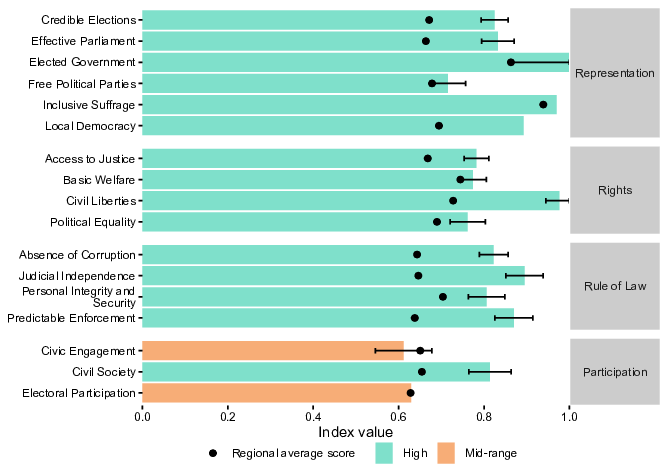
Category trends
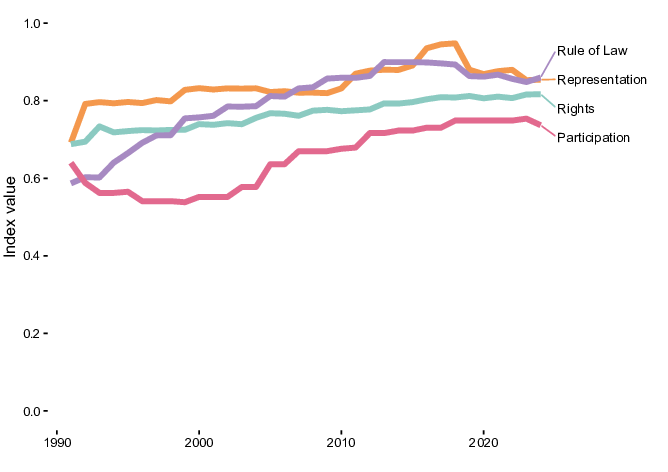
Eswatini (2024)
| Representation | Rights | Rule of Law | Participation | |
|---|---|---|---|---|
| Ranking | 131 | 130 | 148 | 126 |
| GSoD Indices score | 0.313 | 0.342 | 0.237 | 0.439 |
Factor scores in 2024
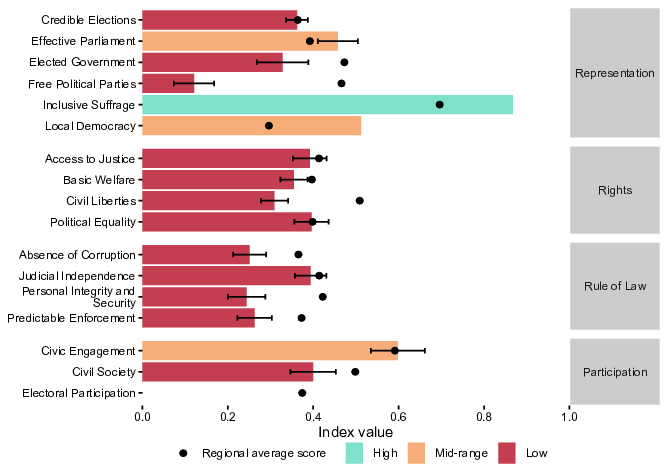
Category trends
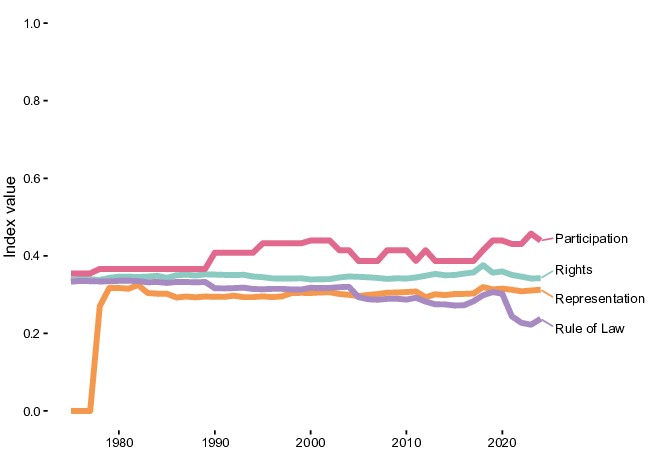
Ethiopia (2024)
| Representation | Rights | Rule of Law | Participation | |
|---|---|---|---|---|
| Ranking | 123 | 133 | 139 | 117 |
| GSoD Indices score | 0.357 | 0.335 | 0.291 | 0.463 |
Factor scores in 2024
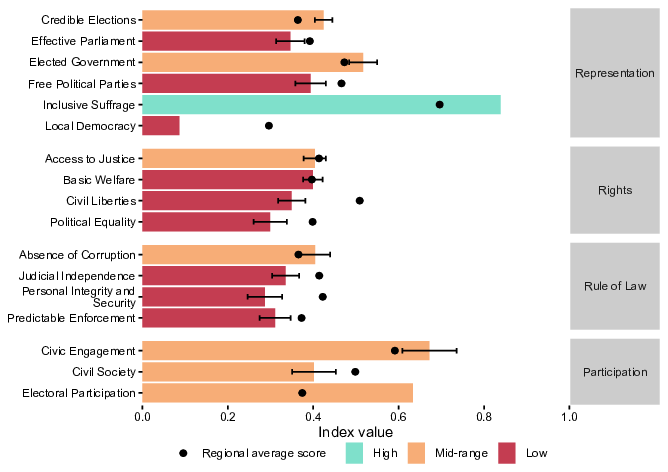
Category trends
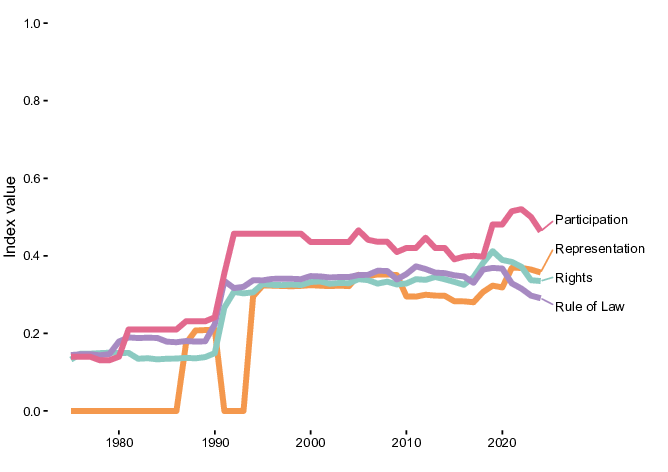
Fiji (2024)
| Representation | Rights | Rule of Law | Participation | |
|---|---|---|---|---|
| Ranking | 85 | 67 | 51 | 26 |
| GSoD Indices score | 0.544 | 0.544 | 0.55 | 0.717 |
Factor scores in 2024
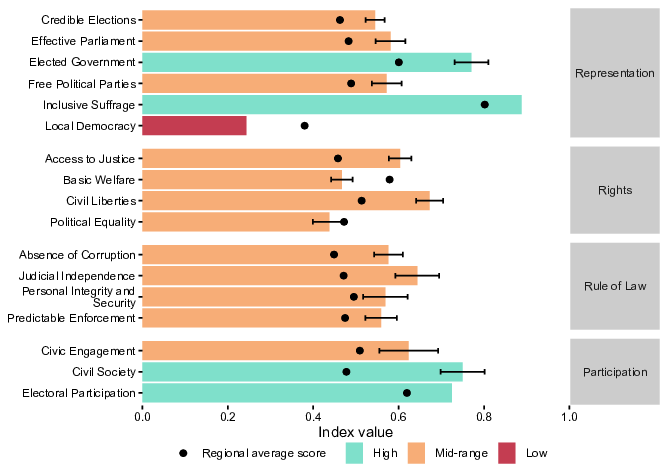
Category trends
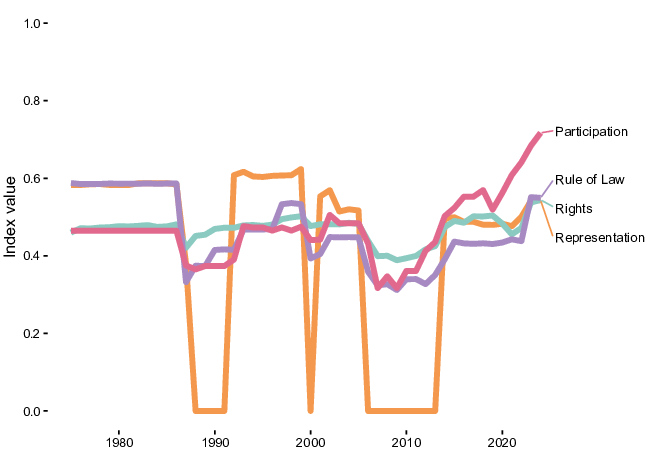
Finland (2024)
| Representation | Rights | Rule of Law | Participation | |
|---|---|---|---|---|
| Ranking | 7 | 7 | 10 | 2 |
| GSoD Indices score | 0.86 | 0.875 | 0.849 | 0.955 |
Factor scores in 2024
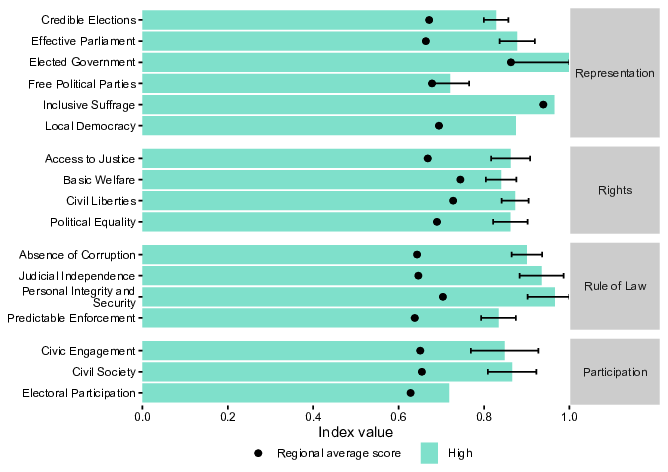
Category trends
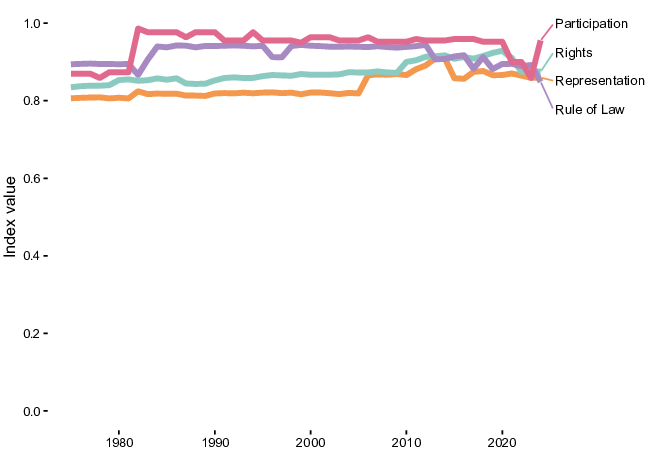
France (2024)
| Representation | Rights | Rule of Law | Participation | |
|---|---|---|---|---|
| Ranking | 12 | 31 | 19 | 9 |
| GSoD Indices score | 0.838 | 0.722 | 0.761 | 0.851 |
Factor scores in 2024
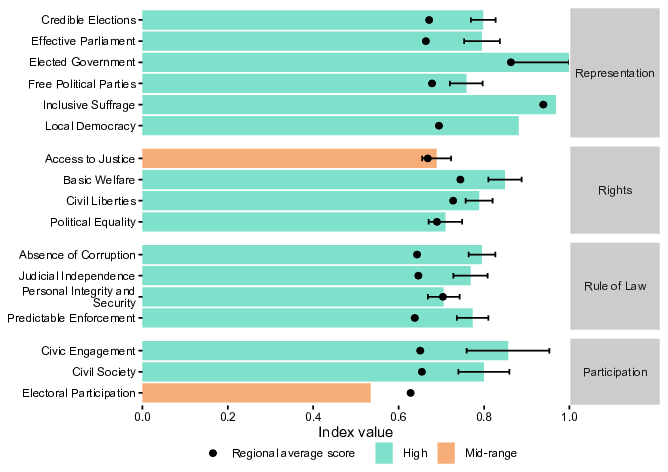
Category trends
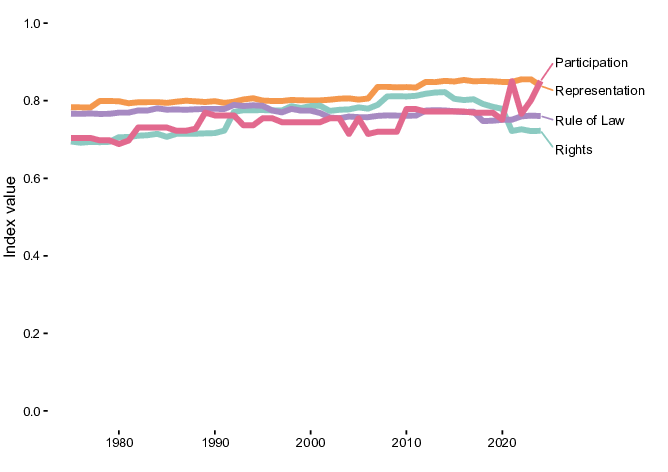
Gabon (2024)
| Representation | Rights | Rule of Law | Participation | |
|---|---|---|---|---|
| Ranking | 151 | 82 | 96 | 60 |
| GSoD Indices score | 0 | 0.496 | 0.424 | 0.614 |
Factor scores in 2024
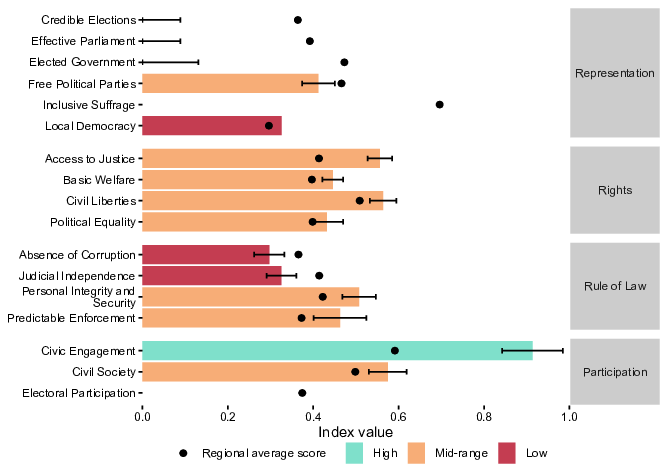
Category trends
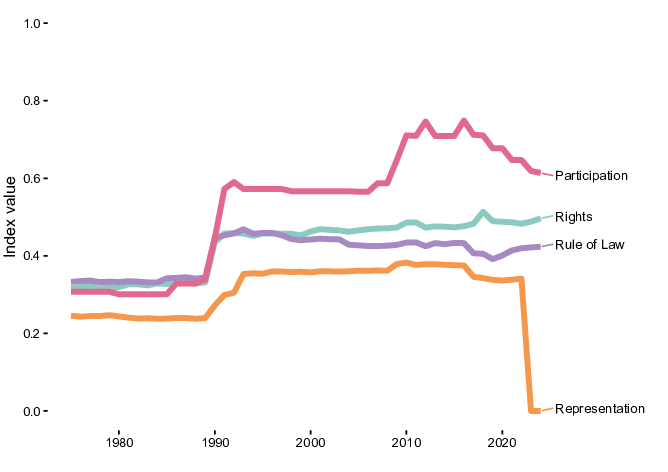
The Gambia (2024)
| Representation | Rights | Rule of Law | Participation | |
|---|---|---|---|---|
| Ranking | 79 | 57 | 56 | 47 |
| GSoD Indices score | 0.573 | 0.577 | 0.541 | 0.662 |
Factor scores in 2024
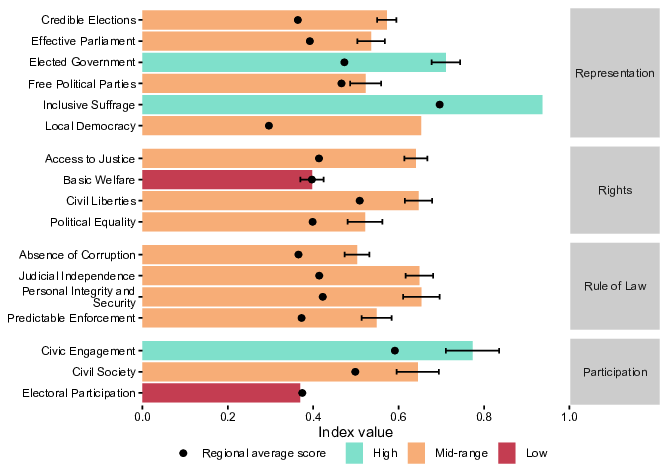
Category trends
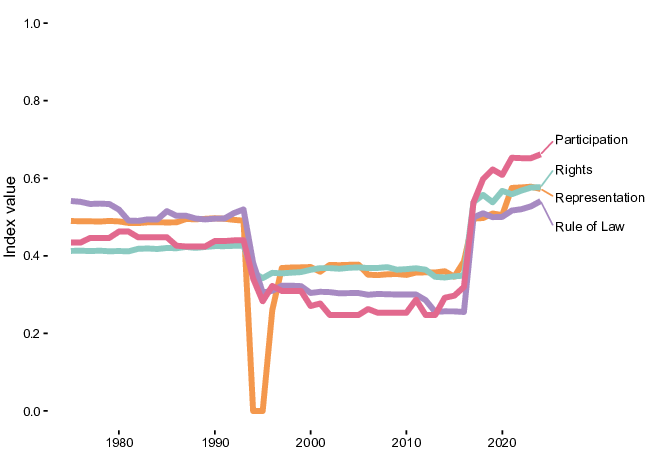
Georgia (2024)
| Representation | Rights | Rule of Law | Participation | |
|---|---|---|---|---|
| Ranking | 99 | 77 | 93 | 105 |
| GSoD Indices score | 0.471 | 0.509 | 0.439 | 0.494 |
Factor scores in 2024
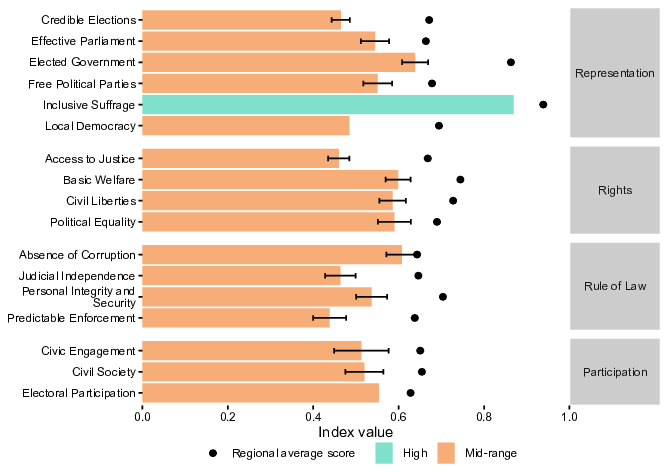
Category trends
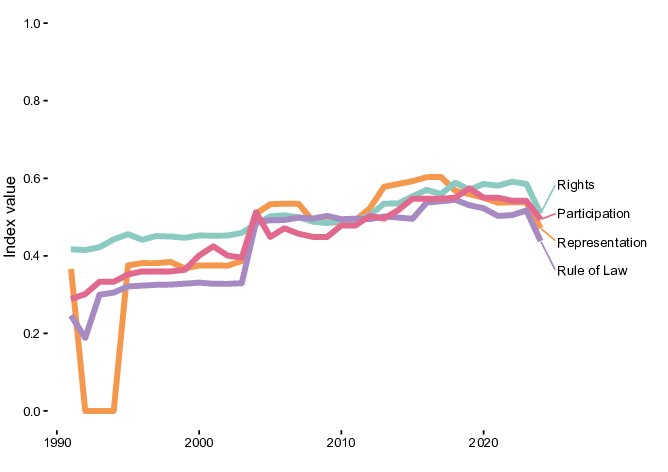
Germany (2024)
| Representation | Rights | Rule of Law | Participation | |
|---|---|---|---|---|
| Ranking | 1 | 3 | 2 | 11 |
| GSoD Indices score | 0.892 | 0.932 | 0.908 | 0.827 |
Factor scores in 2024
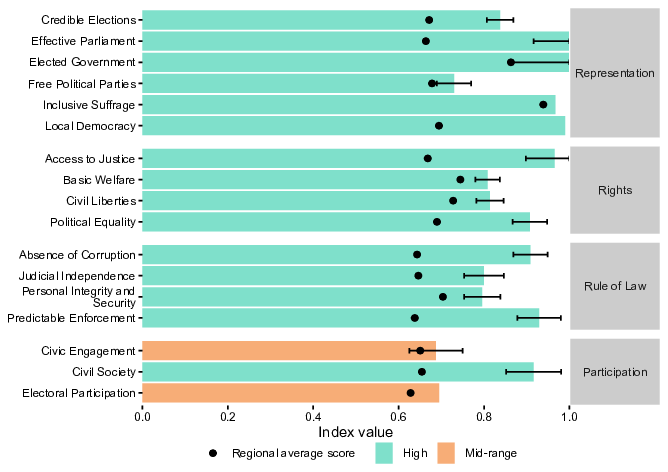
Category trends
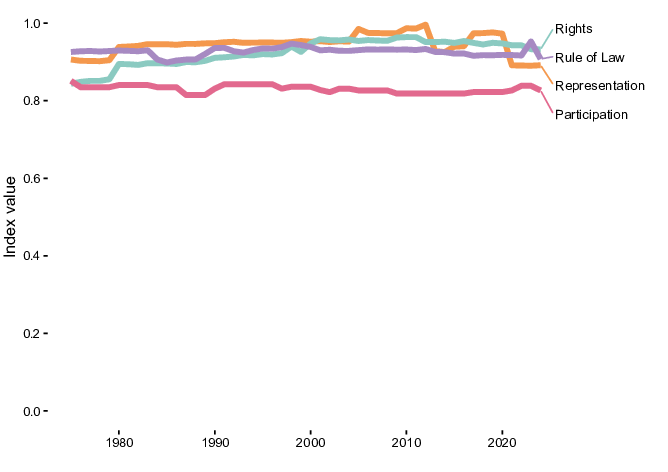
Ghana (2024)
| Representation | Rights | Rule of Law | Participation | |
|---|---|---|---|---|
| Ranking | 48 | 64 | 84 | 42 |
| GSoD Indices score | 0.696 | 0.556 | 0.467 | 0.679 |
Factor scores in 2024
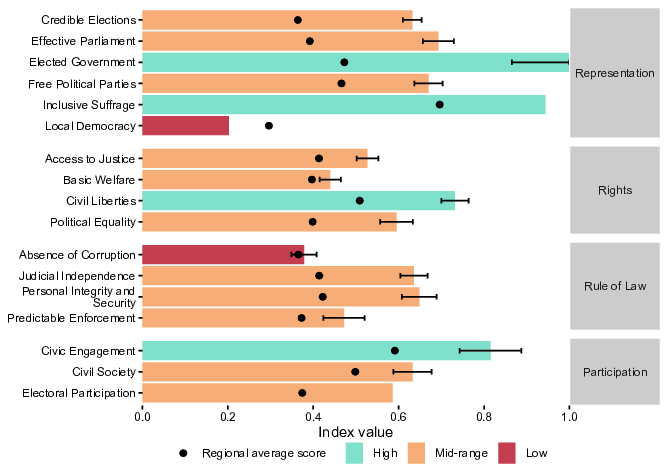
Category trends
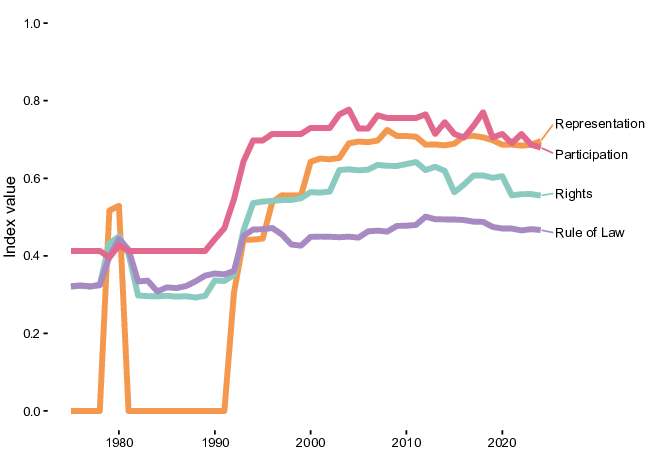
Greece (2024)
| Representation | Rights | Rule of Law | Participation | |
|---|---|---|---|---|
| Ranking | 28 | 35 | 35 | 40 |
| GSoD Indices score | 0.783 | 0.69 | 0.634 | 0.686 |
Factor scores in 2024
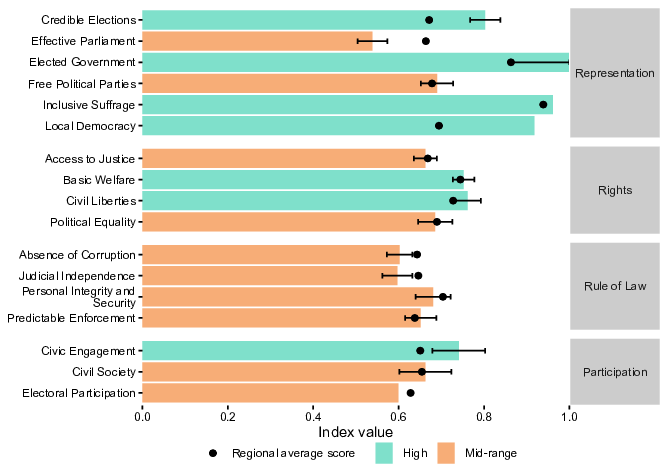
Category trends
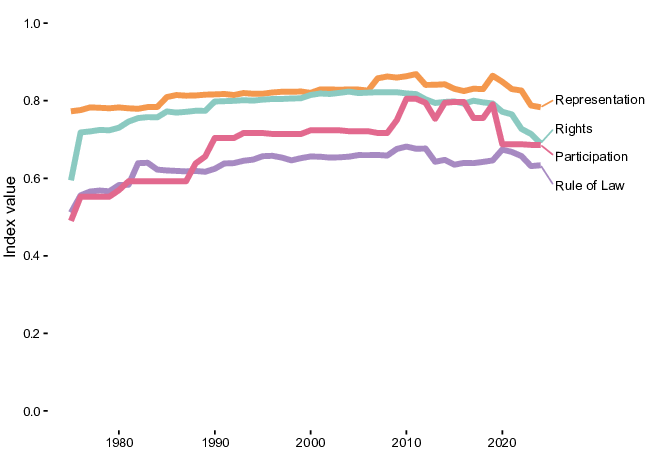
Guatemala (2024)
| Representation | Rights | Rule of Law | Participation | |
|---|---|---|---|---|
| Ranking | 75 | 130 | 97 | 118 |
| GSoD Indices score | 0.594 | 0.342 | 0.421 | 0.457 |
Factor scores in 2024
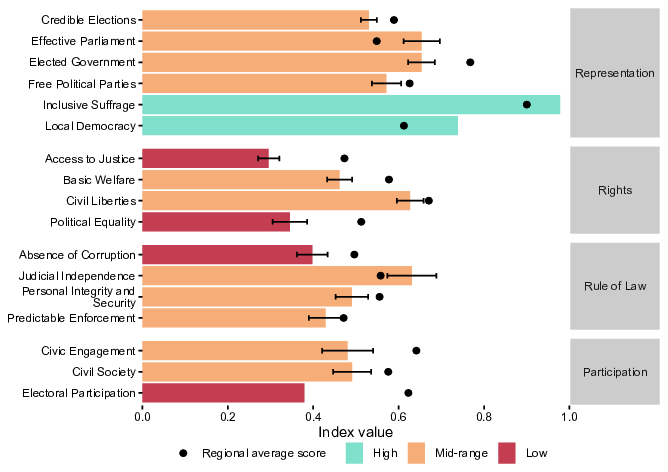
Category trends
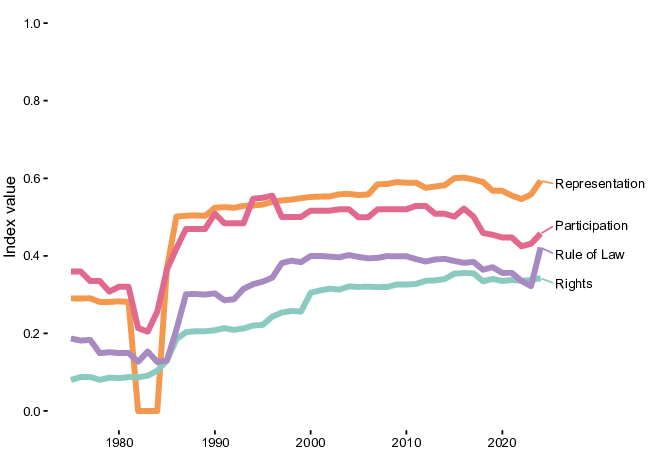
Guinea (2024)
| Representation | Rights | Rule of Law | Participation | |
|---|---|---|---|---|
| Ranking | 151 | 137 | 153 | 87 |
| GSoD Indices score | 0 | 0.315 | 0.211 | 0.55 |
Factor scores in 2024
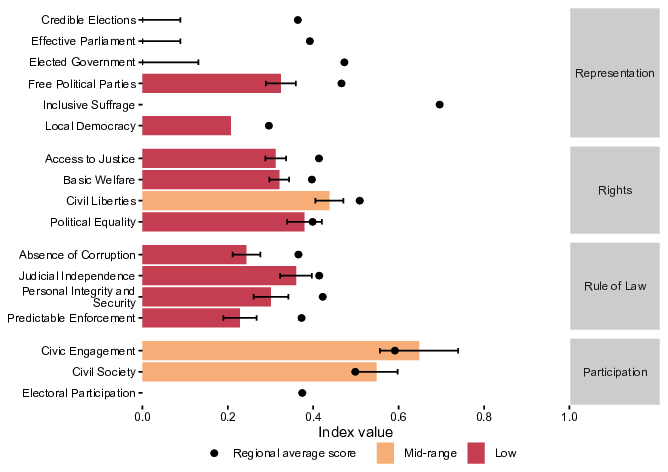
Category trends
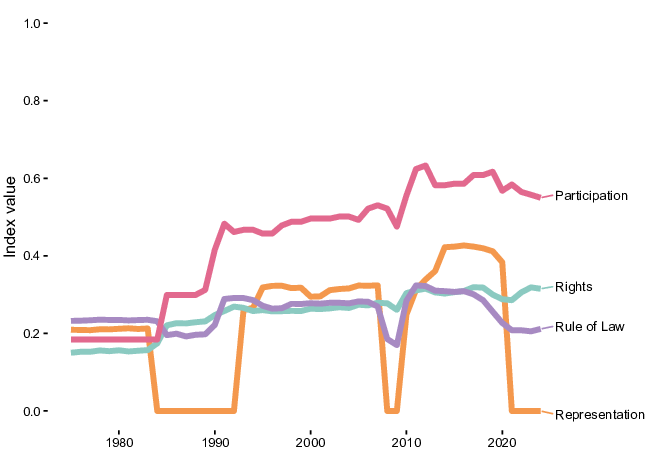
Guinea-Bissau (2024)
| Representation | Rights | Rule of Law | Participation | |
|---|---|---|---|---|
| Ranking | 151 | 126 | 135 | 68 |
| GSoD Indices score | 0 | 0.354 | 0.307 | 0.591 |
Factor scores in 2024
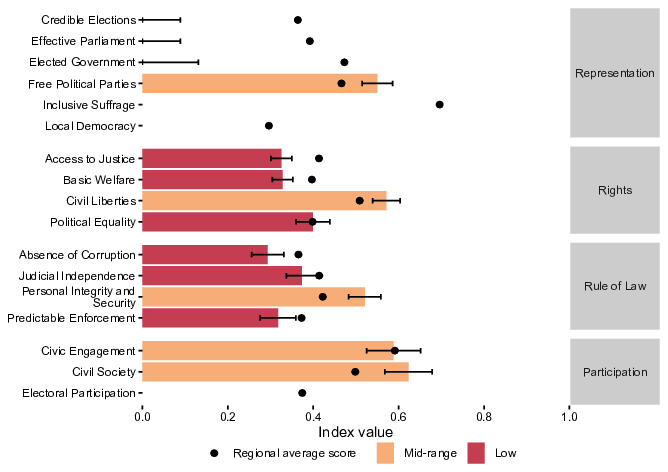
Category trends
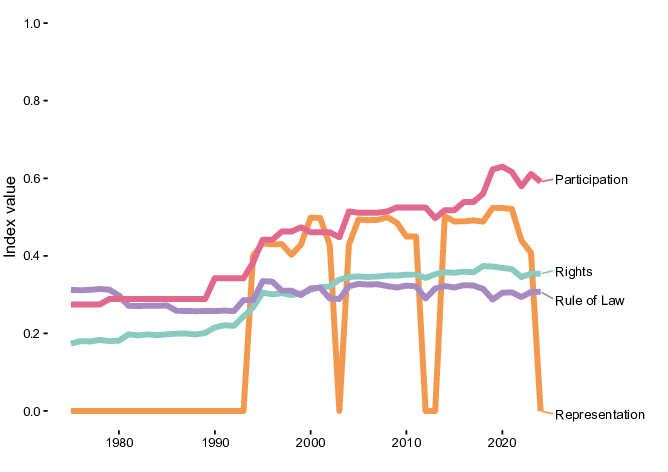
Guyana (2024)
| Representation | Rights | Rule of Law | Participation | |
|---|---|---|---|---|
| Ranking | 87 | 71 | 81 | 95 |
| GSoD Indices score | 0.536 | 0.535 | 0.471 | 0.534 |
Factor scores in 2024
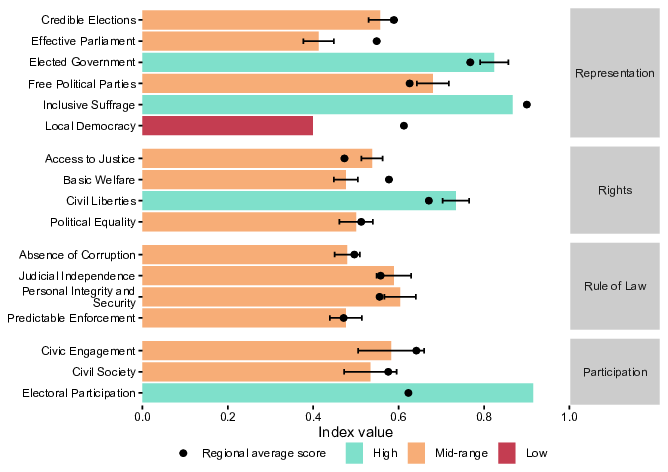
Category trends
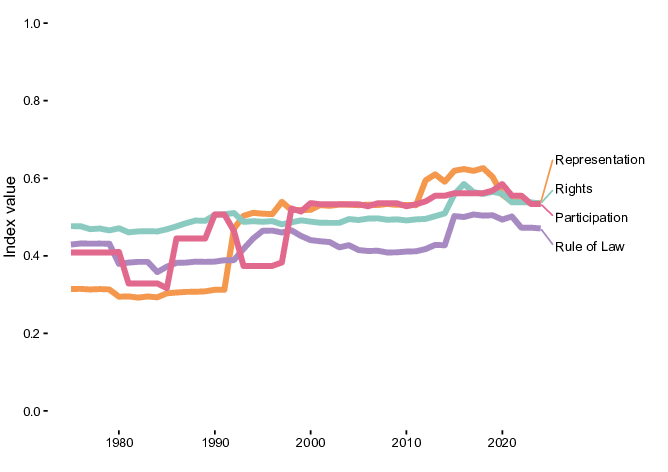
Haiti (2024)
| Representation | Rights | Rule of Law | Participation | |
|---|---|---|---|---|
| Ranking | 151 | 157 | 159 | 146 |
| GSoD Indices score | 0 | 0.242 | 0.156 | 0.324 |
Factor scores in 2024
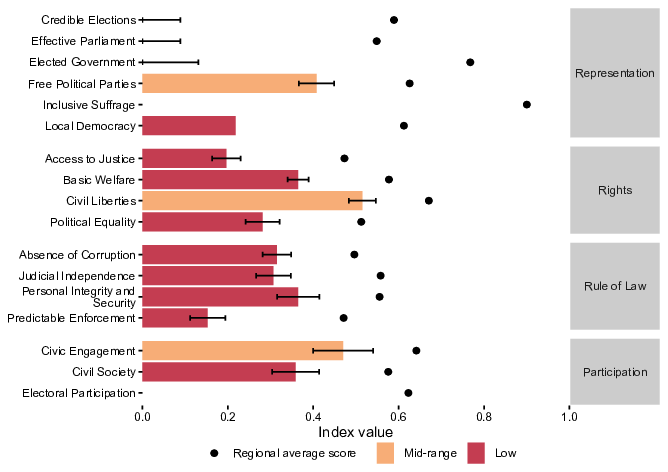
Category trends
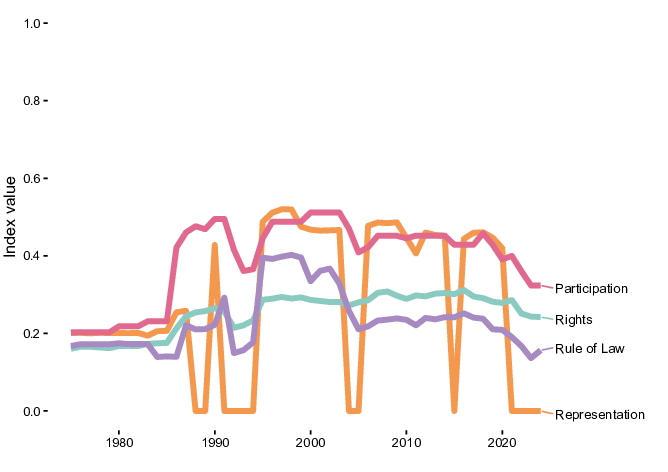
Honduras (2024)
| Representation | Rights | Rule of Law | Participation | |
|---|---|---|---|---|
| Ranking | 91 | 108 | 94 | 78 |
| GSoD Indices score | 0.525 | 0.42 | 0.429 | 0.564 |
Factor scores in 2024
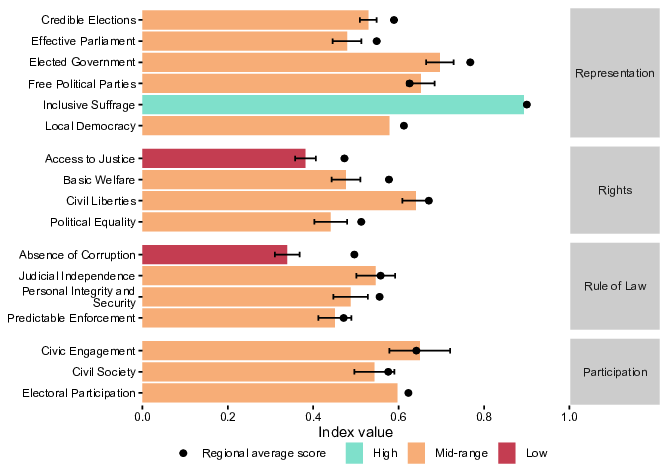
Category trends
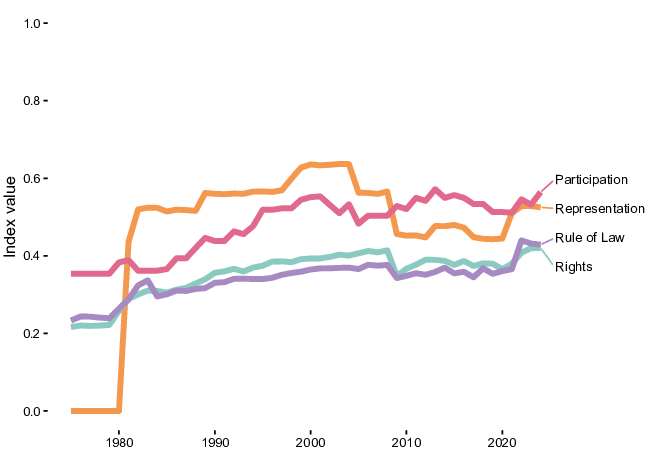
Hungary (2024)
| Representation | Rights | Rule of Law | Participation | |
|---|---|---|---|---|
| Ranking | 82 | 56 | 67 | 126 |
| GSoD Indices score | 0.553 | 0.581 | 0.503 | 0.439 |
Factor scores in 2024
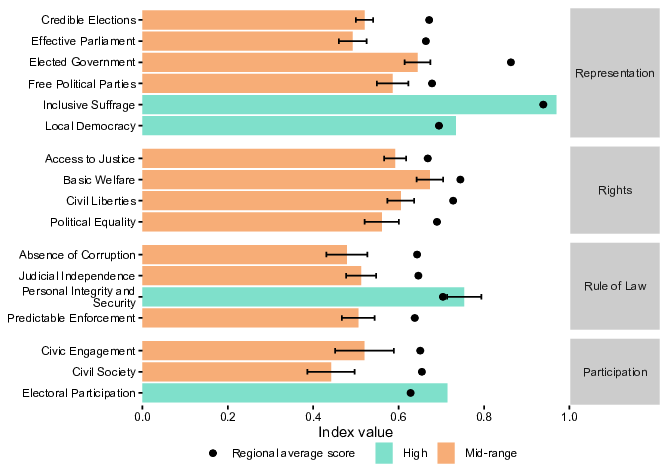
Category trends
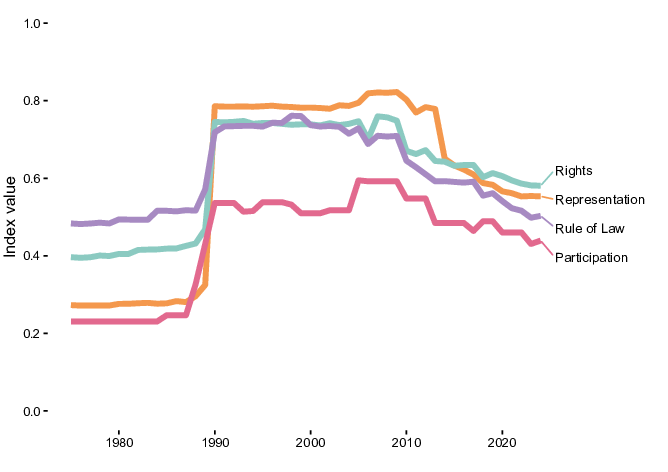
Iceland (2024)
| Representation | Rights | Rule of Law | Participation | |
|---|---|---|---|---|
| Ranking | 33 | 22 | 12 | 21 |
| GSoD Indices score | 0.762 | 0.791 | 0.834 | 0.74 |
Factor scores in 2024
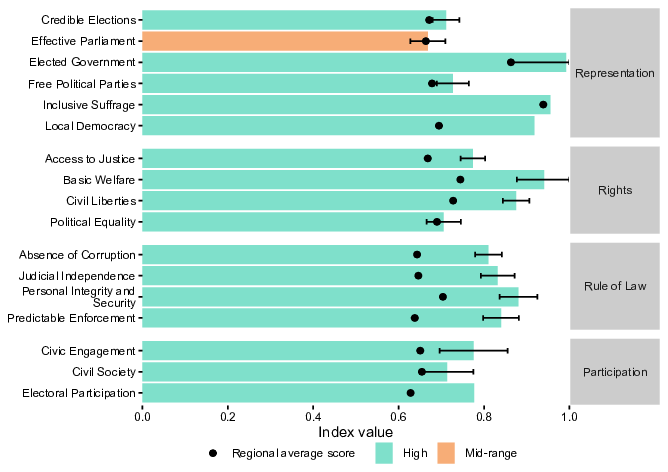
Category trends
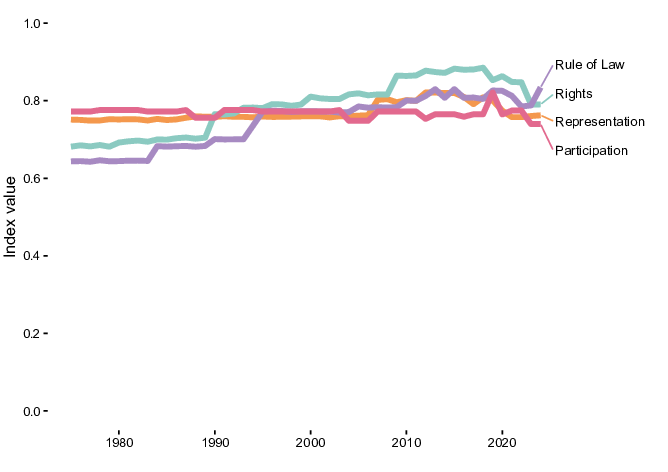
India (2024)
| Representation | Rights | Rule of Law | Participation | |
|---|---|---|---|---|
| Ranking | 73 | 112 | 76 | 99 |
| GSoD Indices score | 0.597 | 0.401 | 0.485 | 0.523 |
Factor scores in 2024
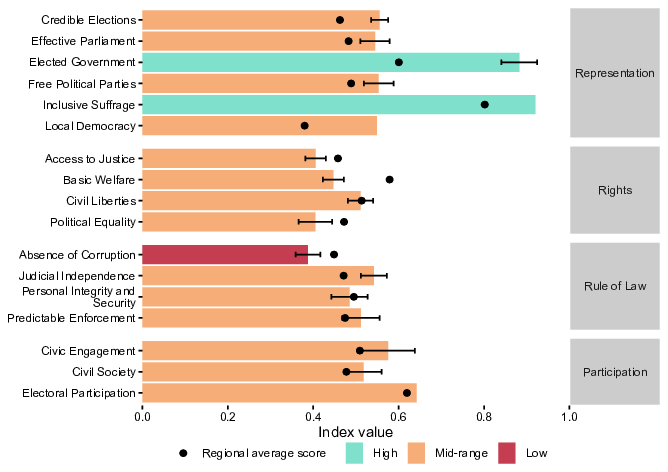
Category trends
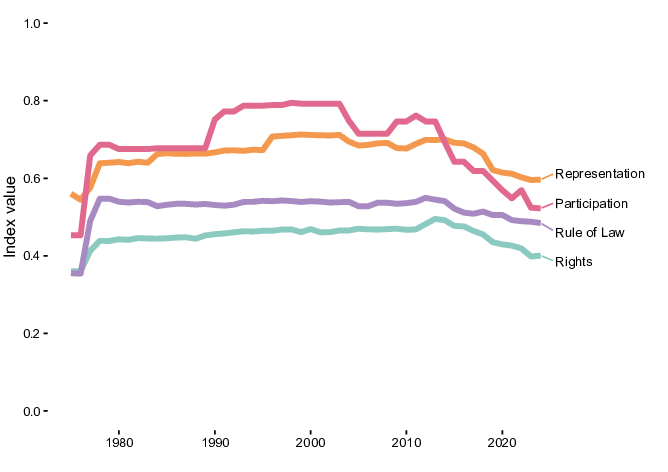
Indonesia (2024)
| Representation | Rights | Rule of Law | Participation | |
|---|---|---|---|---|
| Ranking | 72 | 101 | 98 | 36 |
| GSoD Indices score | 0.6 | 0.444 | 0.417 | 0.702 |
Factor scores in 2024
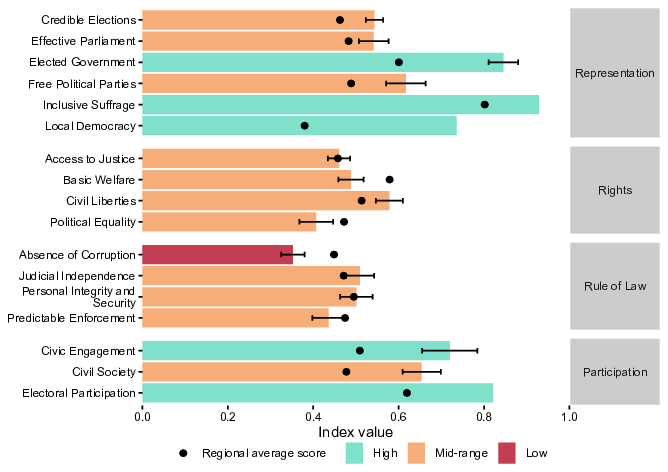
Category trends
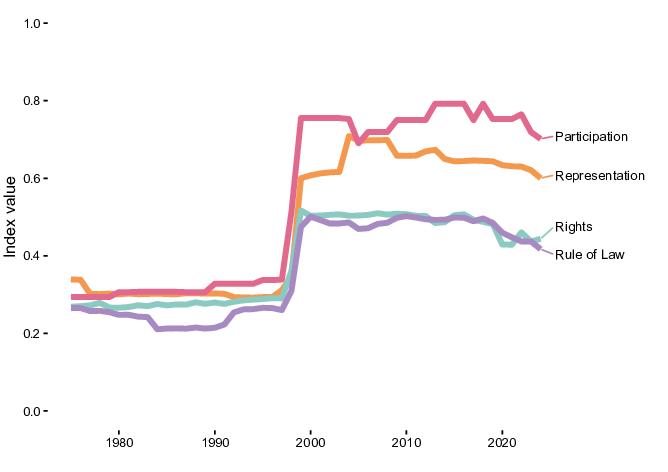
Iran (2024)
| Representation | Rights | Rule of Law | Participation | |
|---|---|---|---|---|
| Ranking | 135 | 142 | 126 | 152 |
| GSoD Indices score | 0.299 | 0.291 | 0.343 | 0.296 |
Factor scores in 2024
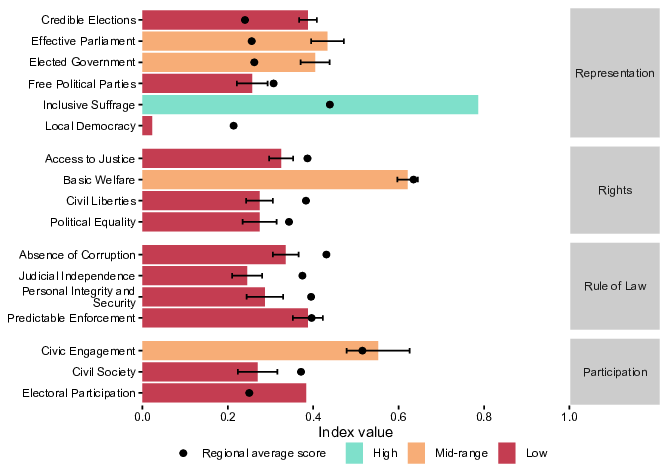
Category trends
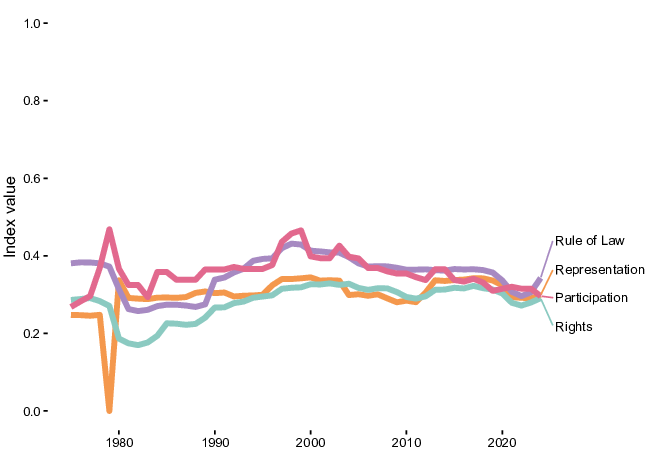
Iraq (2024)
| Representation | Rights | Rule of Law | Participation | |
|---|---|---|---|---|
| Ranking | 97 | 139 | 138 | 115 |
| GSoD Indices score | 0.472 | 0.307 | 0.299 | 0.471 |
Factor scores in 2024
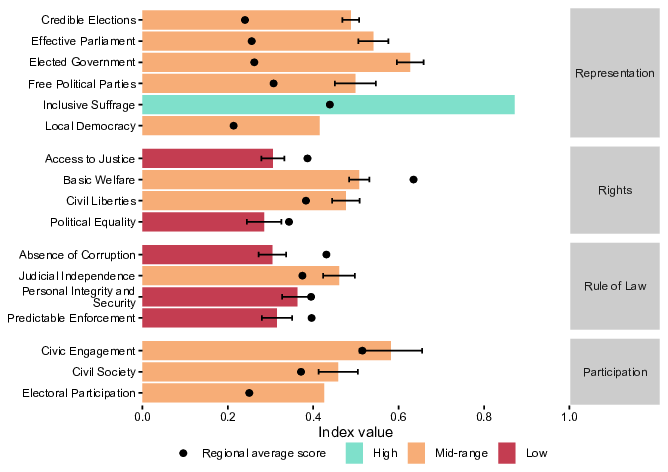
Category trends
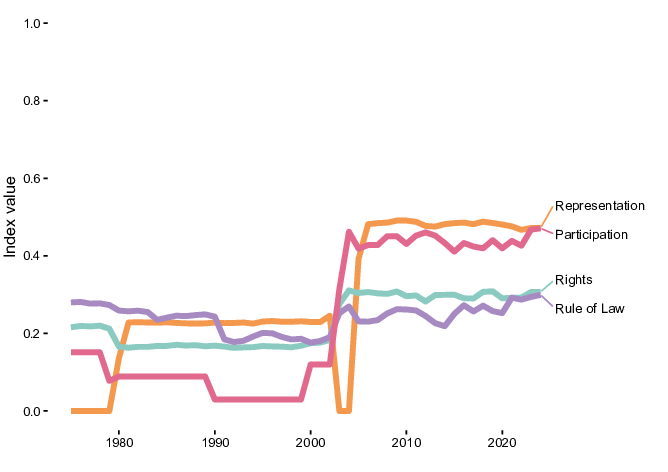
Ireland (2024)
| Representation | Rights | Rule of Law | Participation | |
|---|---|---|---|---|
| Ranking | 27 | 8 | 8 | 12 |
| GSoD Indices score | 0.789 | 0.863 | 0.854 | 0.826 |
Factor scores in 2024
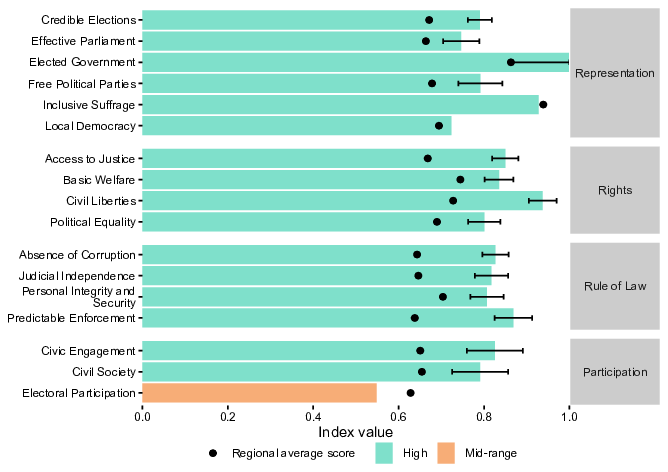
Category trends
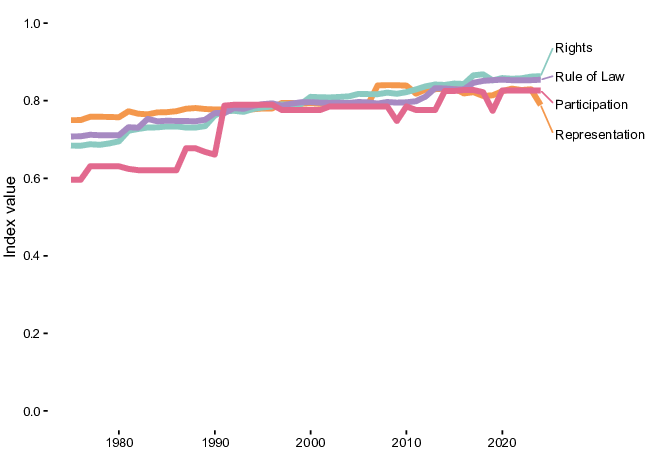
Israel (2024)
| Representation | Rights | Rule of Law | Participation | |
|---|---|---|---|---|
| Ranking | 37 | 48 | 30 | 33 |
| GSoD Indices score | 0.753 | 0.609 | 0.665 | 0.706 |
Factor scores in 2024
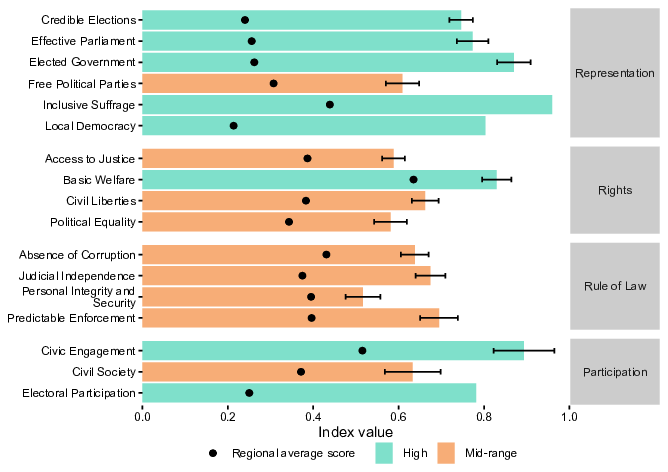
Category trends
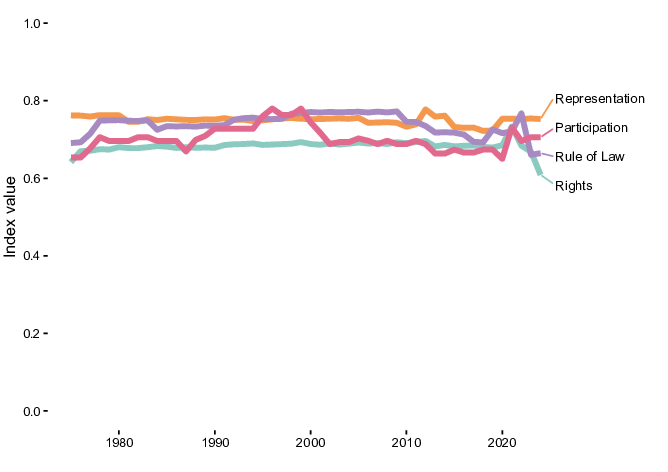
Italy (2024)
| Representation | Rights | Rule of Law | Participation | |
|---|---|---|---|---|
| Ranking | 8 | 20 | 37 | 20 |
| GSoD Indices score | 0.855 | 0.8 | 0.627 | 0.747 |
Factor scores in 2024
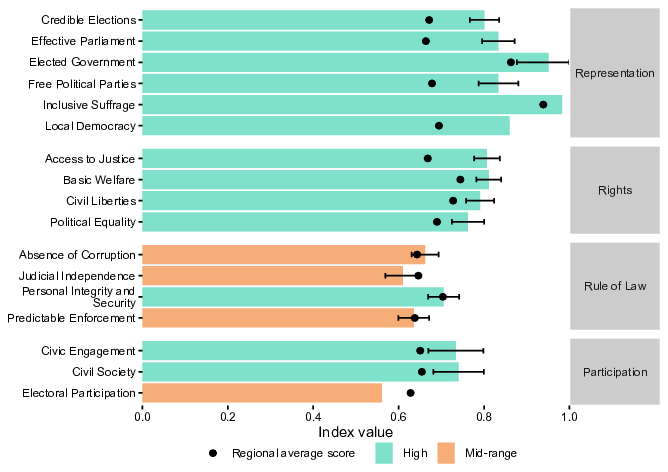
Category trends
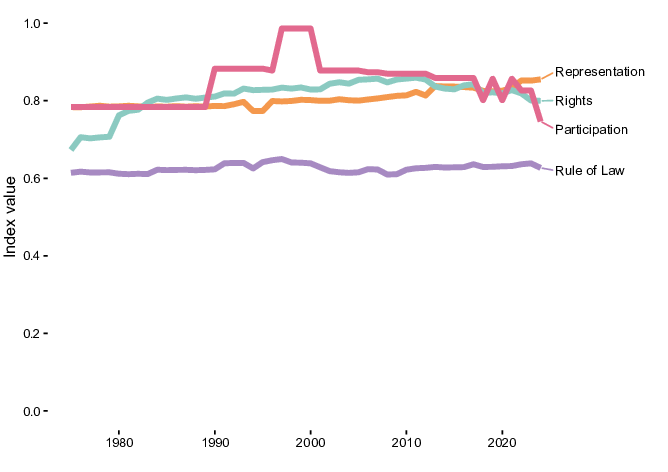
Jamaica (2024)
| Representation | Rights | Rule of Law | Participation | |
|---|---|---|---|---|
| Ranking | 38 | 39 | 40 | 71 |
| GSoD Indices score | 0.748 | 0.66 | 0.618 | 0.582 |
Factor scores in 2024
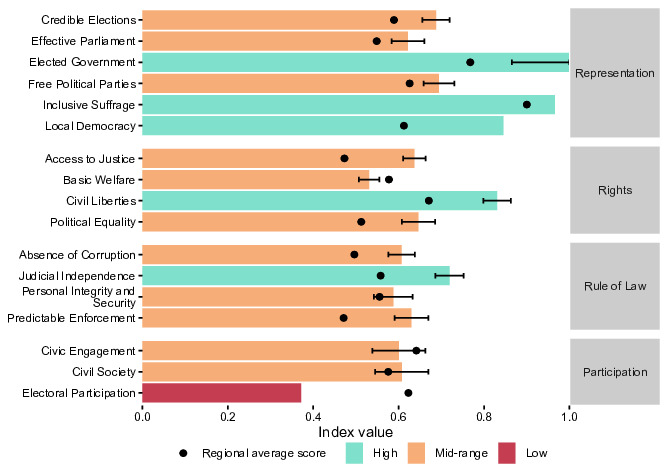
Category trends
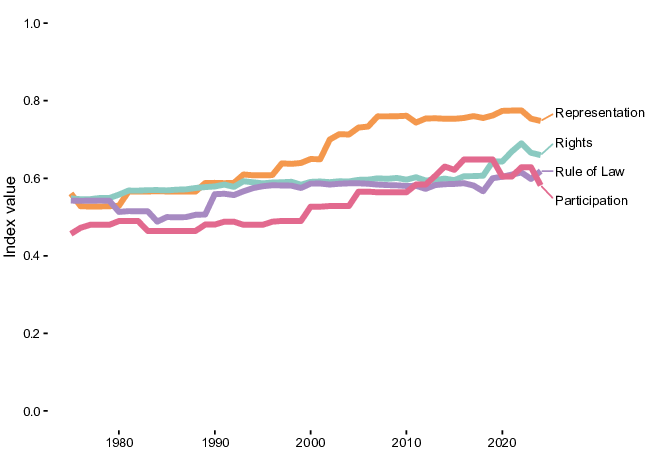
Japan (2024)
| Representation | Rights | Rule of Law | Participation | |
|---|---|---|---|---|
| Ranking | 25 | 9 | 17 | 54 |
| GSoD Indices score | 0.795 | 0.853 | 0.768 | 0.633 |
Factor scores in 2024
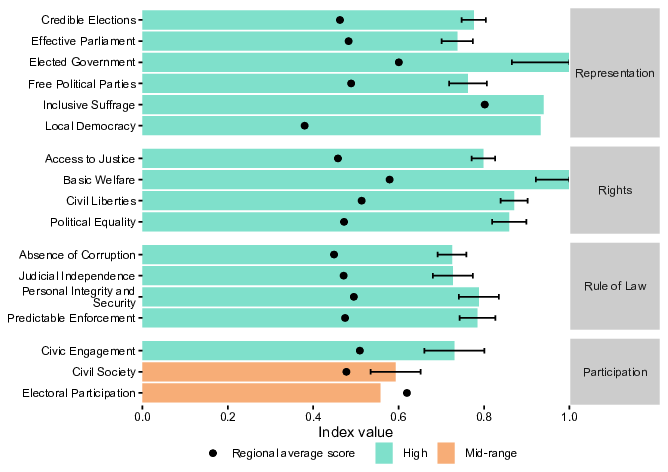
Category trends
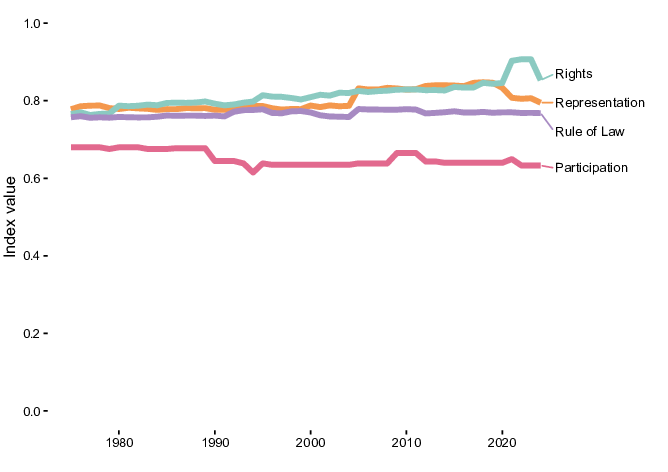
Jordan (2024)
| Representation | Rights | Rule of Law | Participation | |
|---|---|---|---|---|
| Ranking | 102 | 79 | 82 | 108 |
| GSoD Indices score | 0.456 | 0.505 | 0.47 | 0.48 |
Factor scores in 2024
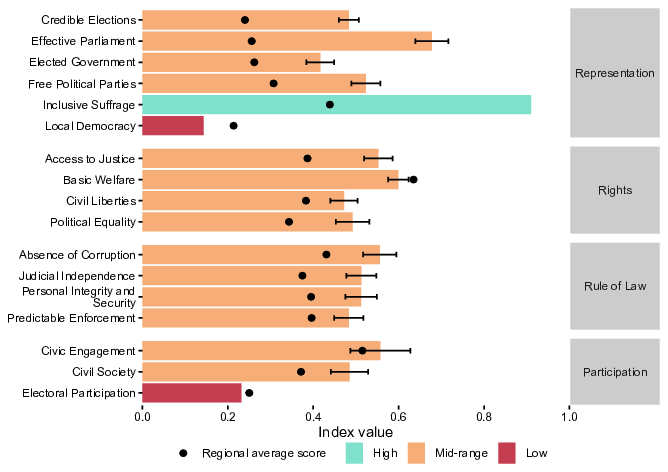
Category trends
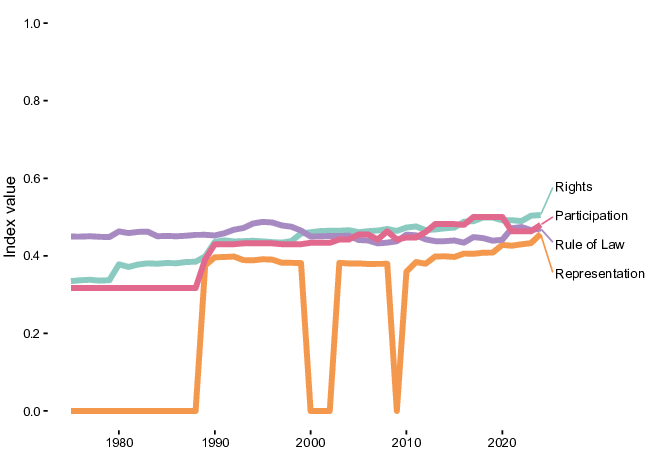
Kazakhstan (2024)
| Representation | Rights | Rule of Law | Participation | |
|---|---|---|---|---|
| Ranking | 124 | 117 | 111 | 141 |
| GSoD Indices score | 0.349 | 0.388 | 0.384 | 0.364 |
Factor scores in 2024
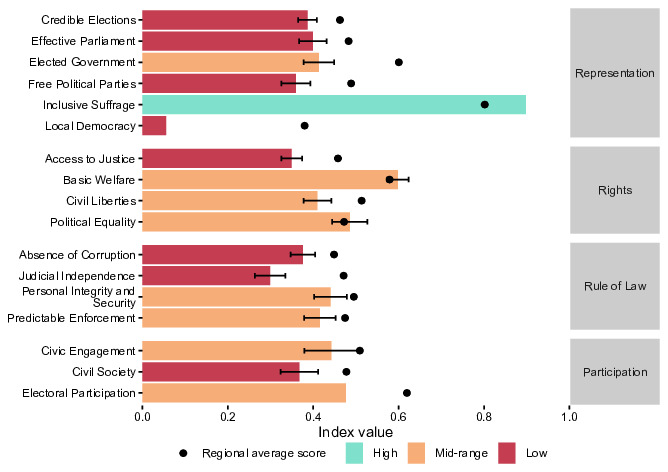
Category trends
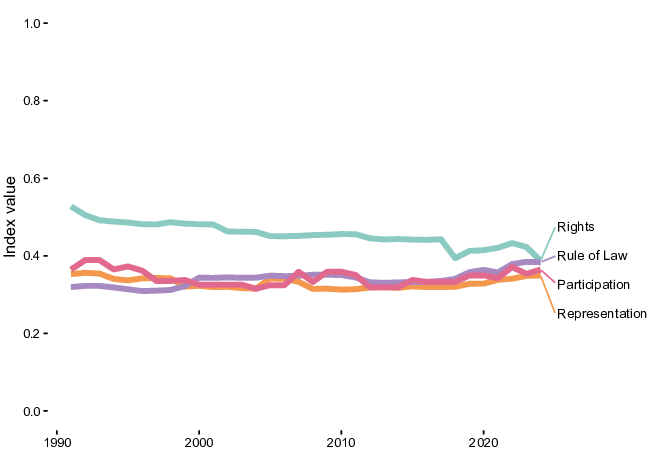
Kenya (2024)
| Representation | Rights | Rule of Law | Participation | |
|---|---|---|---|---|
| Ranking | 87 | 99 | 87 | 66 |
| GSoD Indices score | 0.536 | 0.453 | 0.461 | 0.598 |
Factor scores in 2024
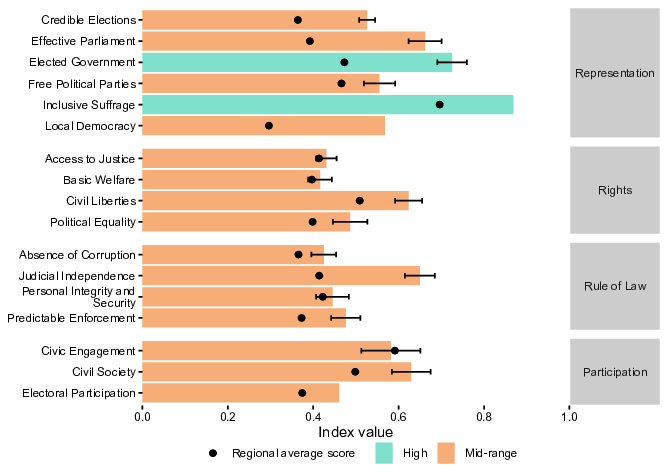
Category trends
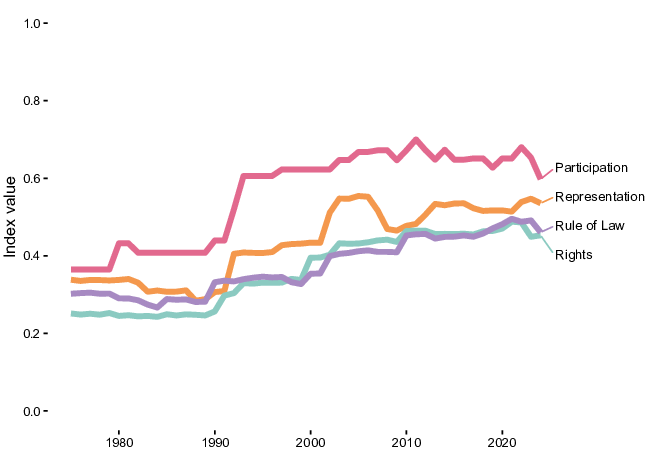
Kosovo (2024)
| Representation | Rights | Rule of Law | Participation | |
|---|---|---|---|---|
| Ranking | 68 | 75 | 72 | 102 |
| GSoD Indices score | 0.619 | 0.522 | 0.497 | 0.502 |
Factor scores in 2024
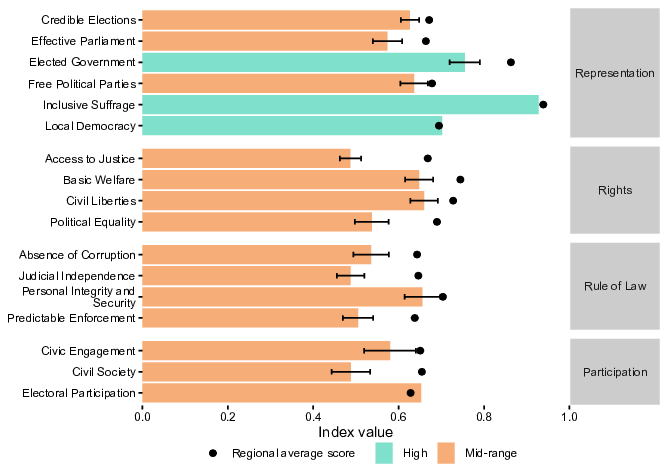
Category trends
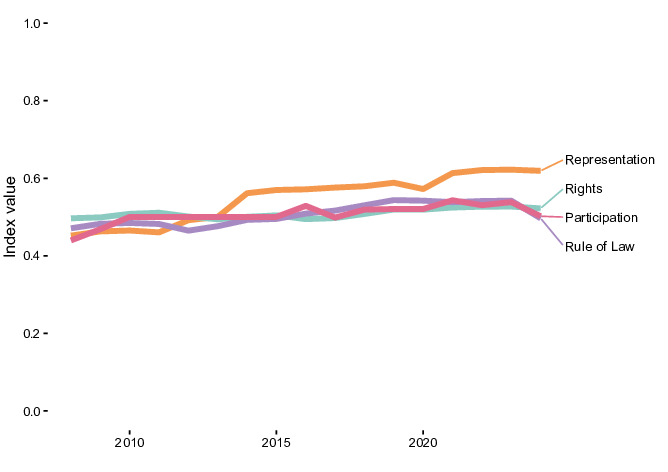
Kuwait (2024)
| Representation | Rights | Rule of Law | Participation | |
|---|---|---|---|---|
| Ranking | 151 | 85 | 61 | 135 |
| GSoD Indices score | 0 | 0.489 | 0.522 | 0.4 |
Factor scores in 2024
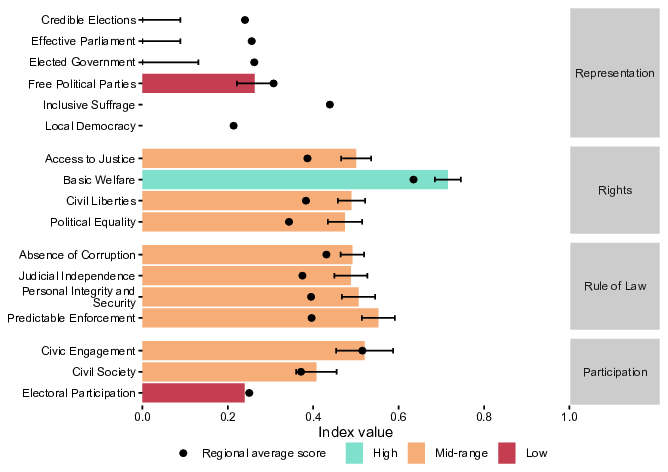
Category trends
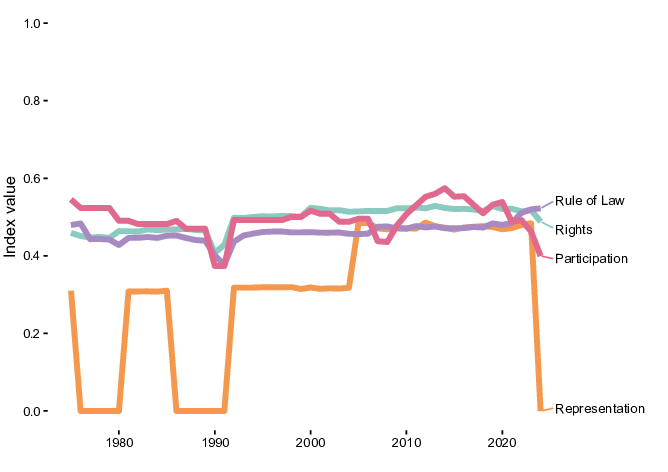
Kyrgyzstan (2024)
| Representation | Rights | Rule of Law | Participation | |
|---|---|---|---|---|
| Ranking | 115 | 115 | 114 | 137 |
| GSoD Indices score | 0.389 | 0.392 | 0.378 | 0.386 |
Factor scores in 2024
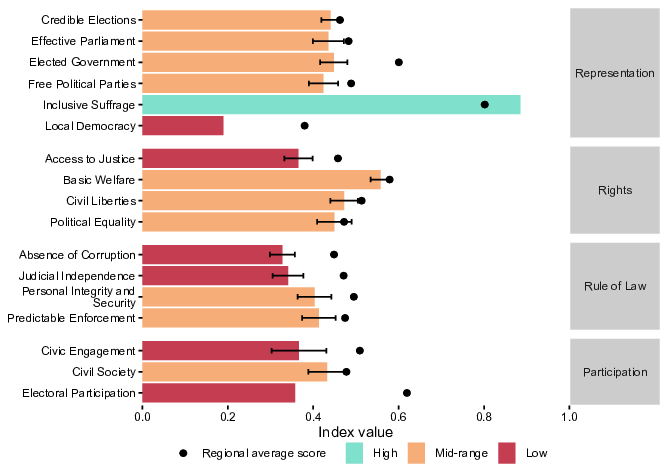
Category trends
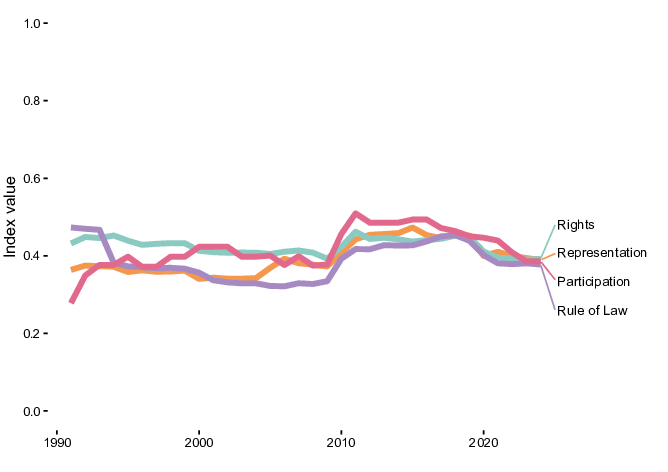
Laos (2024)
| Representation | Rights | Rule of Law | Participation | |
|---|---|---|---|---|
| Ranking | 139 | 144 | 131 | 156 |
| GSoD Indices score | 0.268 | 0.285 | 0.328 | 0.259 |
Factor scores in 2024
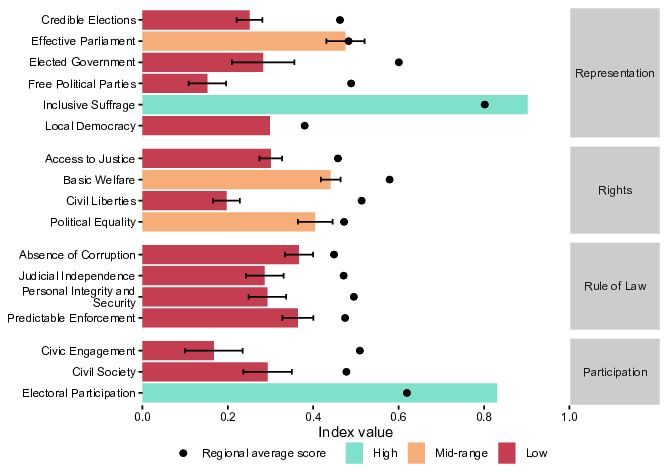
Category trends
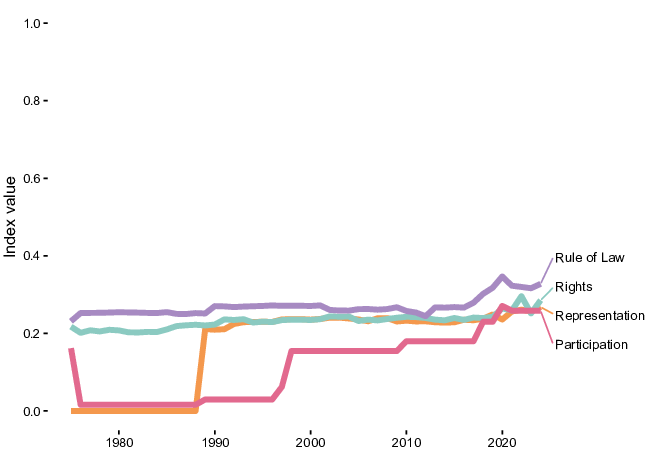
Latvia (2024)
| Representation | Rights | Rule of Law | Participation | |
|---|---|---|---|---|
| Ranking | 41 | 12 | 13 | 34 |
| GSoD Indices score | 0.747 | 0.842 | 0.823 | 0.704 |
Factor scores in 2024
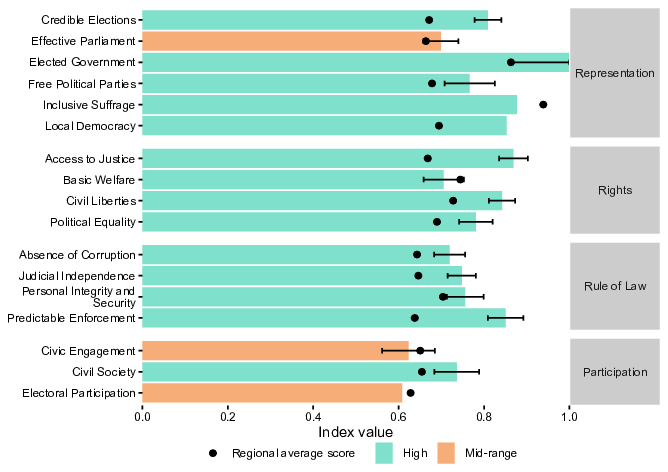
Category trends
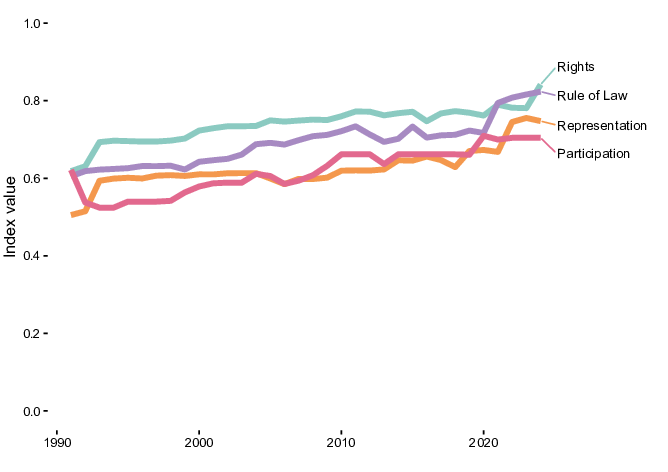
Lebanon (2024)
| Representation | Rights | Rule of Law | Participation | |
|---|---|---|---|---|
| Ranking | 105 | 109 | 144 | 73 |
| GSoD Indices score | 0.441 | 0.412 | 0.258 | 0.576 |
Factor scores in 2024
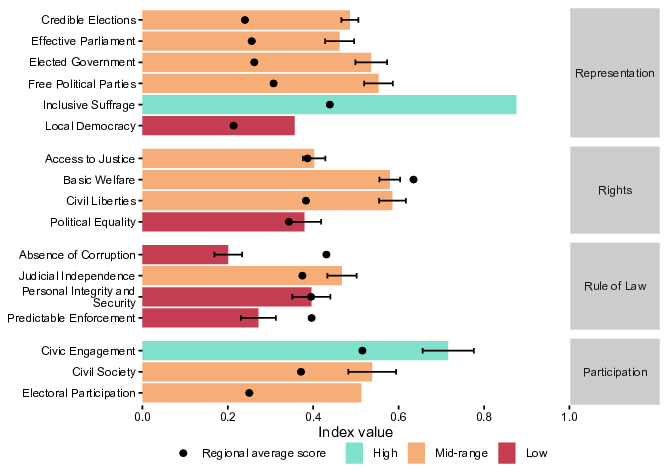
Category trends
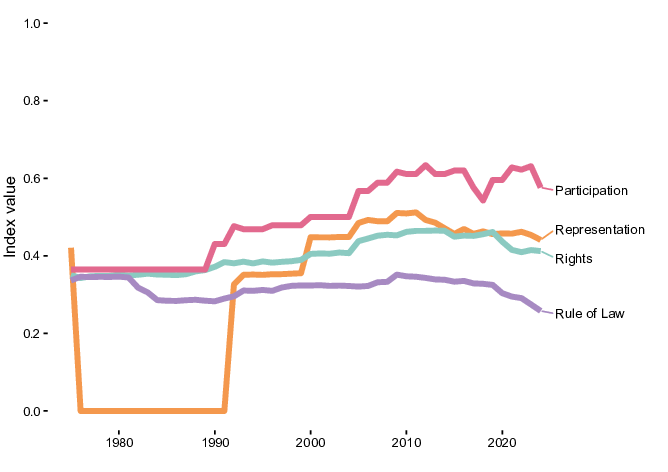
Lesotho (2024)
| Representation | Rights | Rule of Law | Participation | |
|---|---|---|---|---|
| Ranking | 60 | 71 | 88 | 90 |
| GSoD Indices score | 0.648 | 0.535 | 0.46 | 0.547 |
Factor scores in 2024
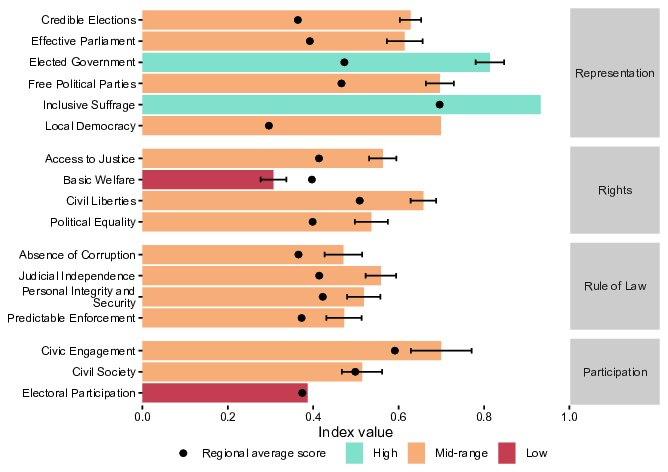
Category trends
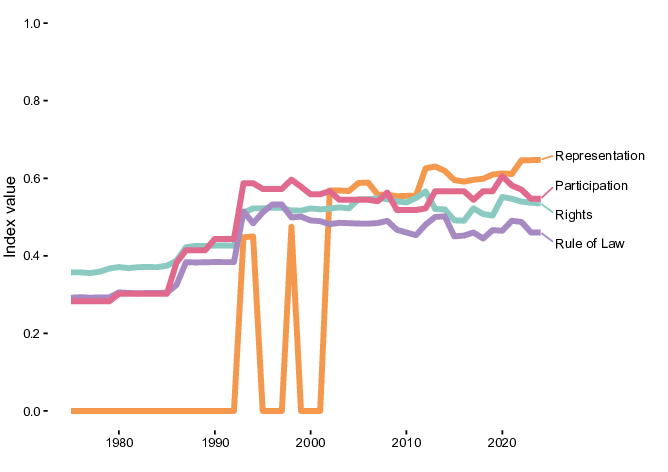
Liberia (2024)
| Representation | Rights | Rule of Law | Participation | |
|---|---|---|---|---|
| Ranking | 74 | 92 | 112 | 67 |
| GSoD Indices score | 0.596 | 0.467 | 0.381 | 0.597 |
Factor scores in 2024
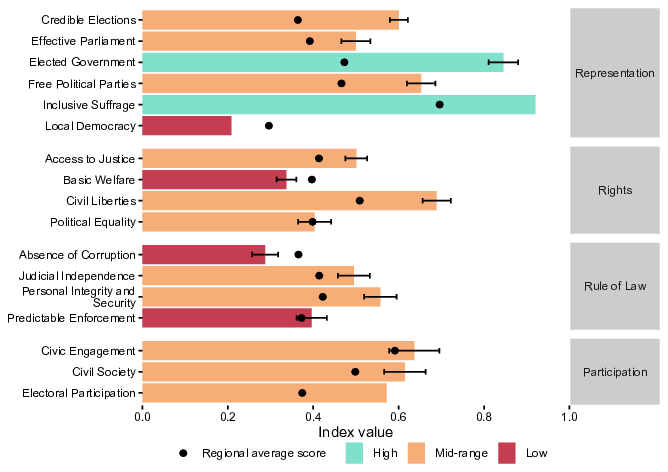
Category trends
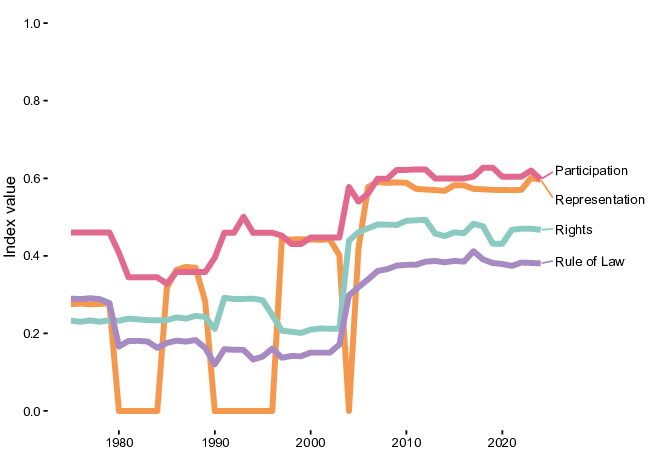
Libya (2024)
| Representation | Rights | Rule of Law | Participation | |
|---|---|---|---|---|
| Ranking | 151 | 155 | 170 | 131 |
| GSoD Indices score | 0 | 0.245 | 0.092 | 0.432 |
Factor scores in 2024
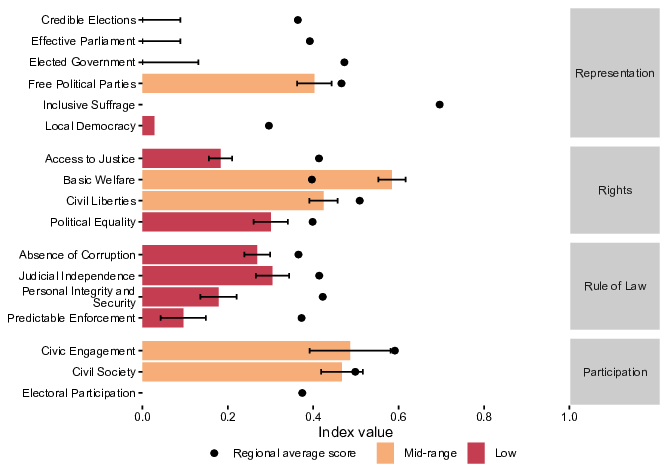
Category trends
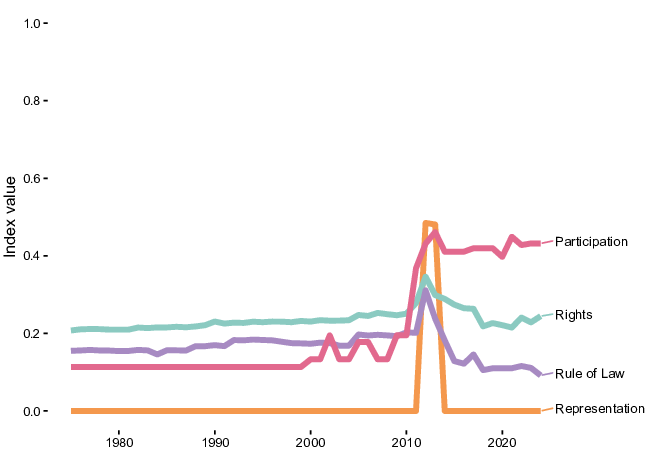
Lithuania (2024)
| Representation | Rights | Rule of Law | Participation | |
|---|---|---|---|---|
| Ranking | 24 | 16 | 32 | 41 |
| GSoD Indices score | 0.803 | 0.804 | 0.664 | 0.68 |
Factor scores in 2024
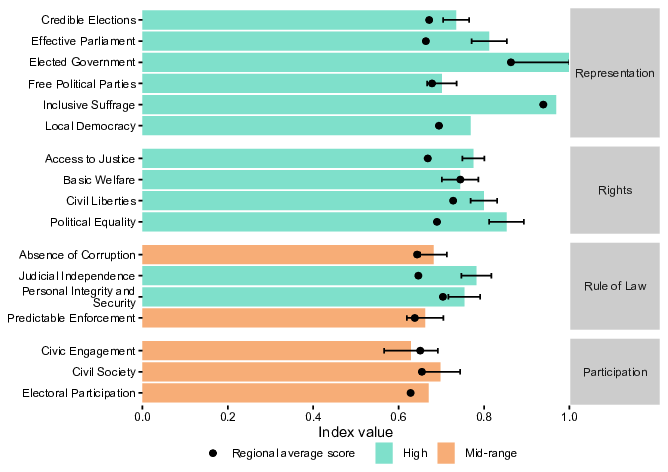
Category trends
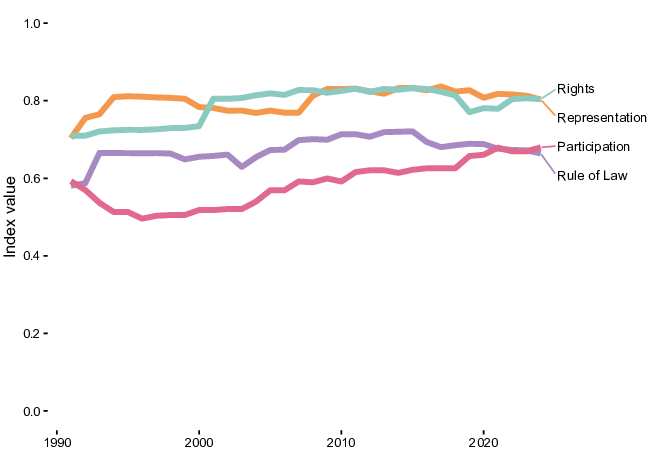
Luxembourg (2024)
| Representation | Rights | Rule of Law | Participation | |
|---|---|---|---|---|
| Ranking | 30 | 4 | 4 | 13 |
| GSoD Indices score | 0.771 | 0.918 | 0.89 | 0.802 |
Factor scores in 2024
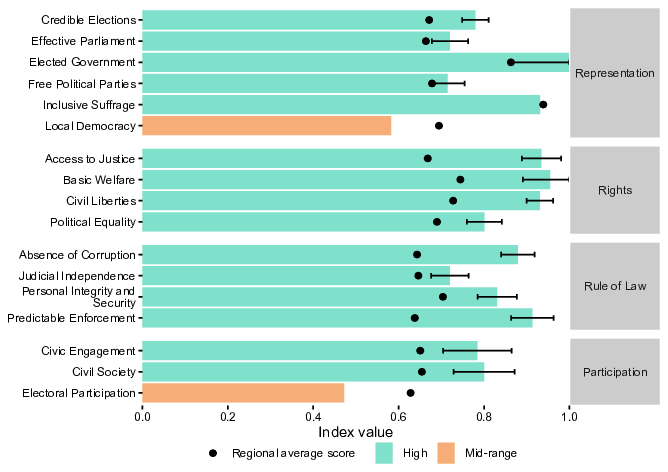
Category trends
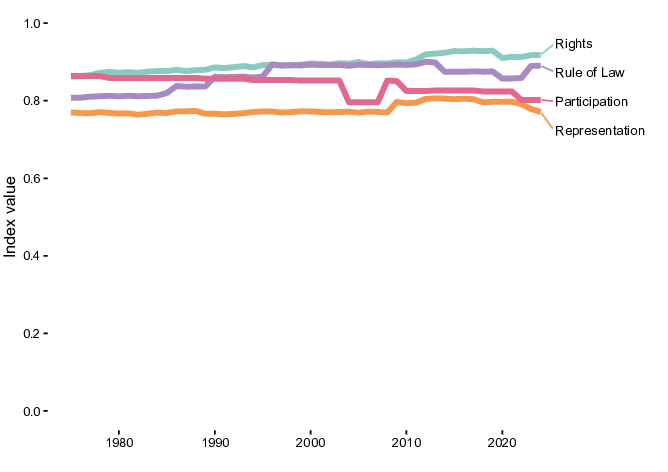
Madagascar (2024)
| Representation | Rights | Rule of Law | Participation | |
|---|---|---|---|---|
| Ranking | 108 | 126 | 129 | 118 |
| GSoD Indices score | 0.428 | 0.354 | 0.33 | 0.457 |
Factor scores in 2024
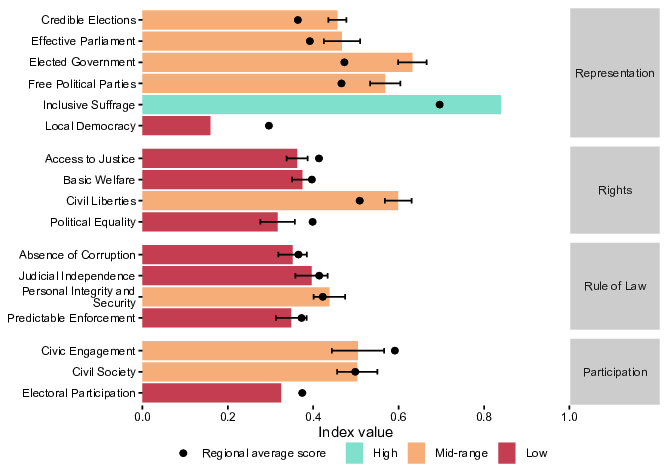
Category trends
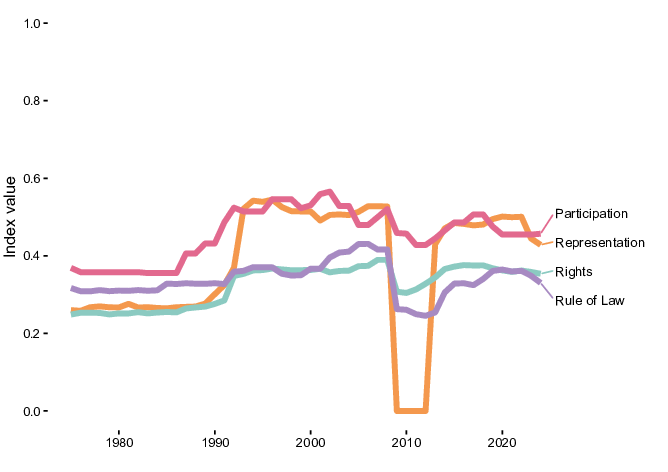
Malawi (2024)
| Representation | Rights | Rule of Law | Participation | |
|---|---|---|---|---|
| Ranking | 65 | 90 | 54 | 50 |
| GSoD Indices score | 0.633 | 0.473 | 0.544 | 0.649 |
Factor scores in 2024
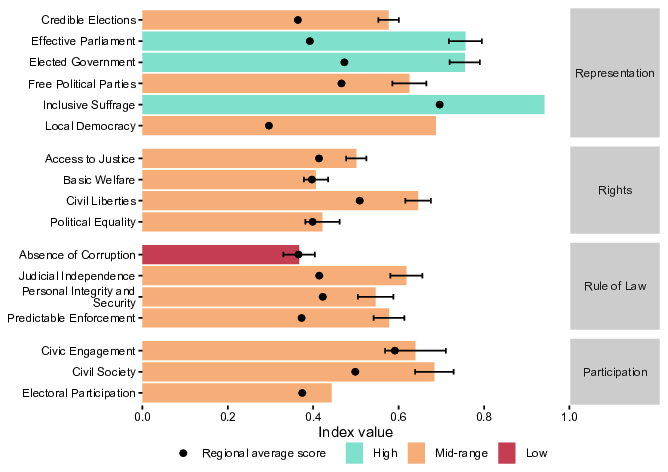
Category trends
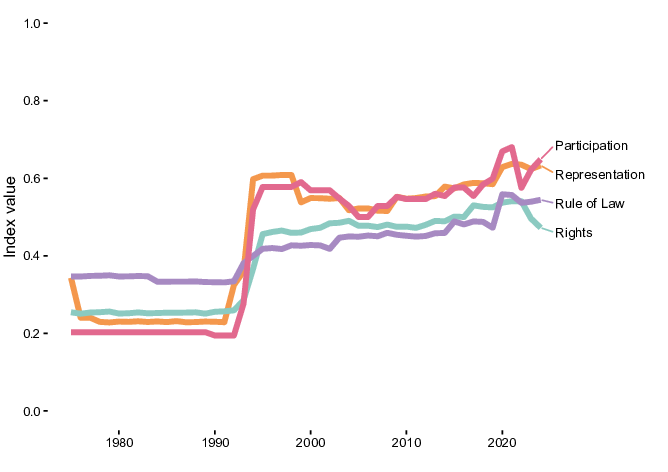
Malaysia (2024)
| Representation | Rights | Rule of Law | Participation | |
|---|---|---|---|---|
| Ranking | 90 | 81 | 69 | 83 |
| GSoD Indices score | 0.526 | 0.504 | 0.5 | 0.558 |
Factor scores in 2024
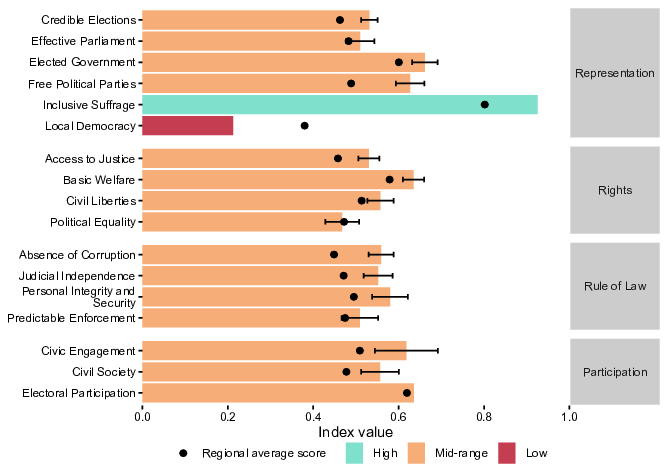
Category trends
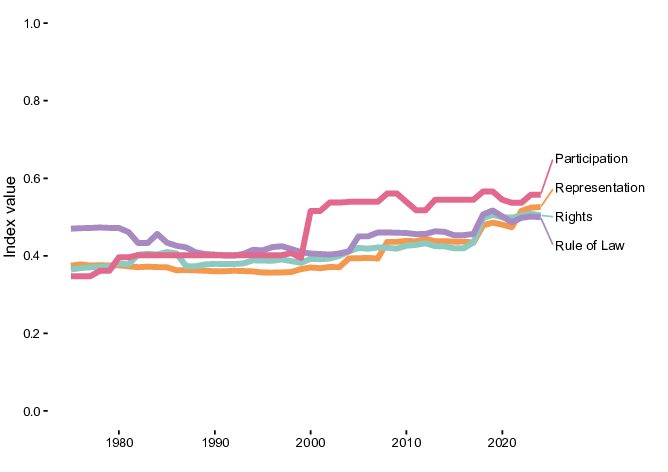
Maldives (2024)
| Representation | Rights | Rule of Law | Participation | |
|---|---|---|---|---|
| Ranking | 89 | 86 | 59 | 76 |
| GSoD Indices score | 0.532 | 0.48 | 0.528 | 0.573 |
Factor scores in 2024
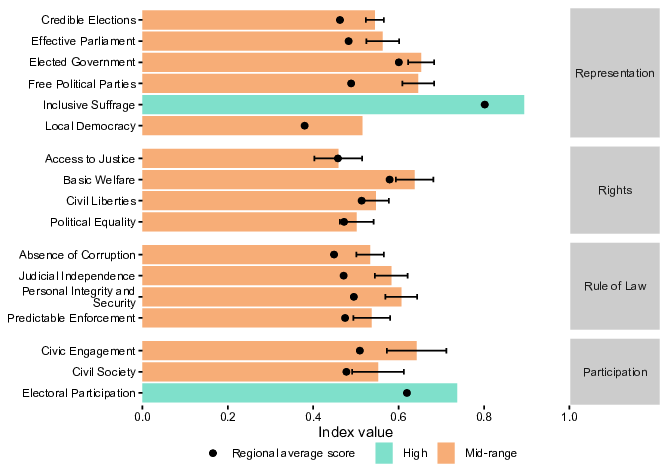
Category trends
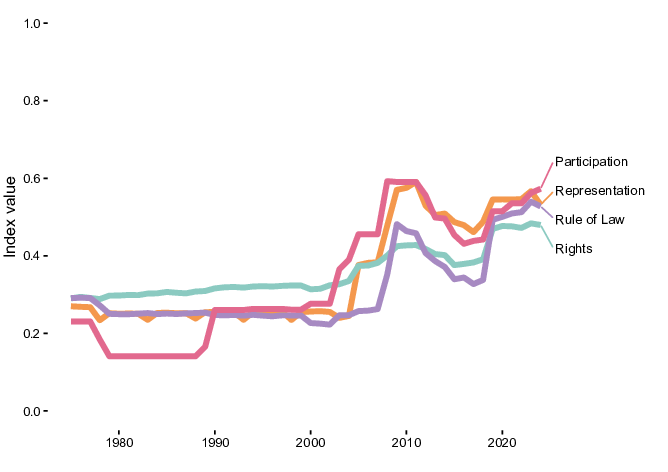
Mali (2024)
| Representation | Rights | Rule of Law | Participation | |
|---|---|---|---|---|
| Ranking | 151 | 116 | 133 | 61 |
| GSoD Indices score | 0 | 0.389 | 0.311 | 0.608 |
Factor scores in 2024
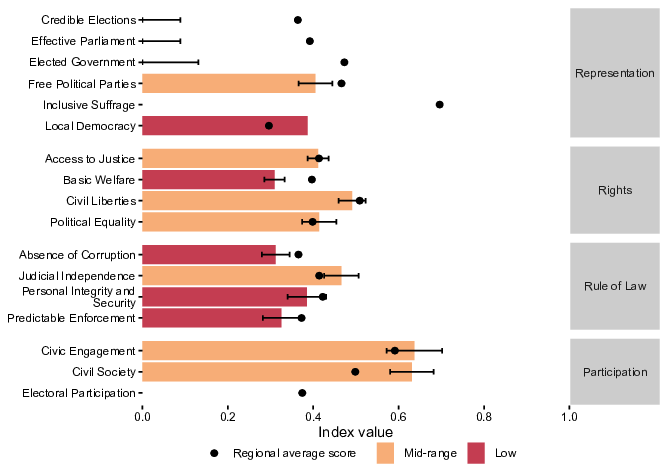
Category trends
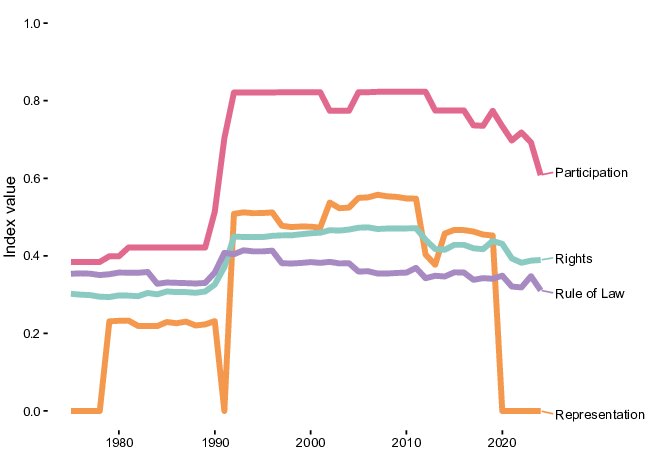
Malta (2024)
| Representation | Rights | Rule of Law | Participation | |
|---|---|---|---|---|
| Ranking | 45 | 29 | 38 | 58 |
| GSoD Indices score | 0.726 | 0.732 | 0.621 | 0.625 |
Factor scores in 2024
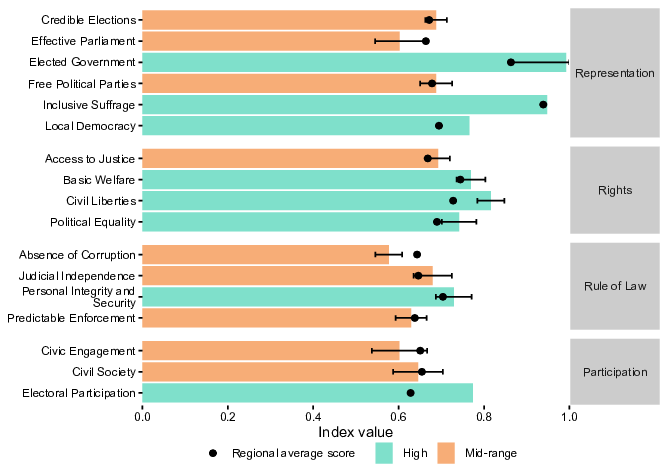
Category trends
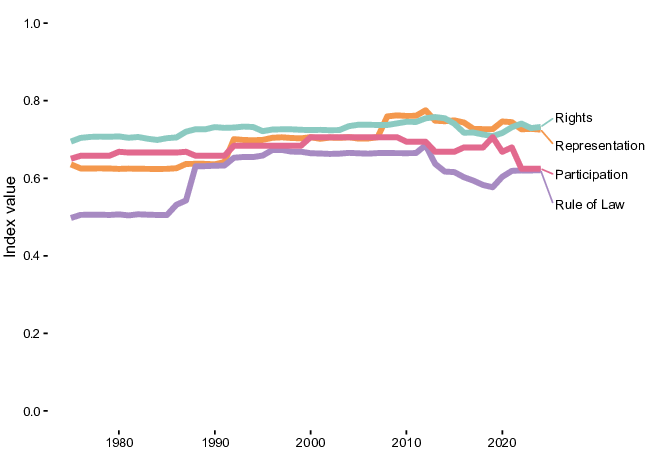
Mauritania (2024)
| Representation | Rights | Rule of Law | Participation | |
|---|---|---|---|---|
| Ranking | 114 | 158 | 134 | 123 |
| GSoD Indices score | 0.391 | 0.231 | 0.308 | 0.451 |
Factor scores in 2024
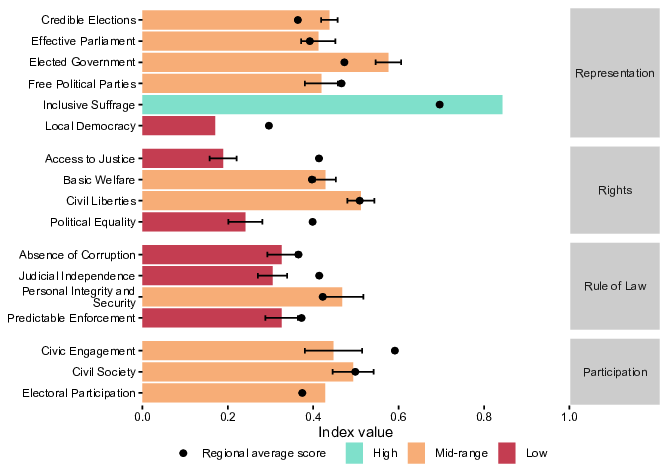
Category trends
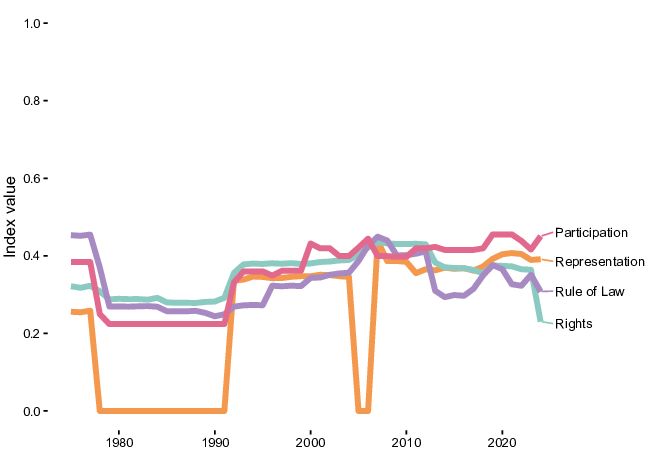
Mauritius (2024)
| Representation | Rights | Rule of Law | Participation | |
|---|---|---|---|---|
| Ranking | 52 | 74 | 65 | 25 |
| GSoD Indices score | 0.671 | 0.526 | 0.514 | 0.72 |
Factor scores in 2024
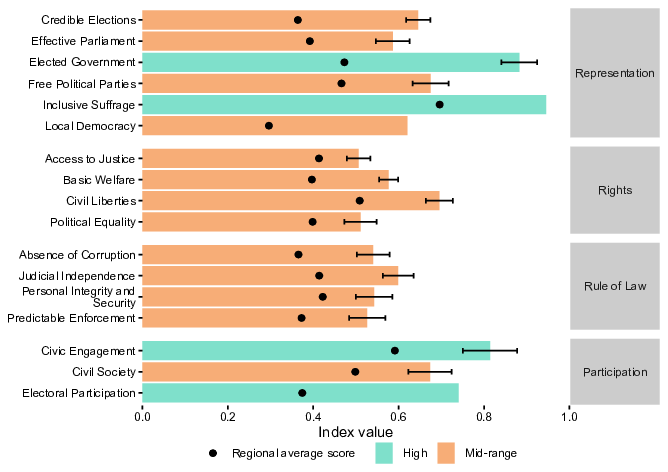
Category trends
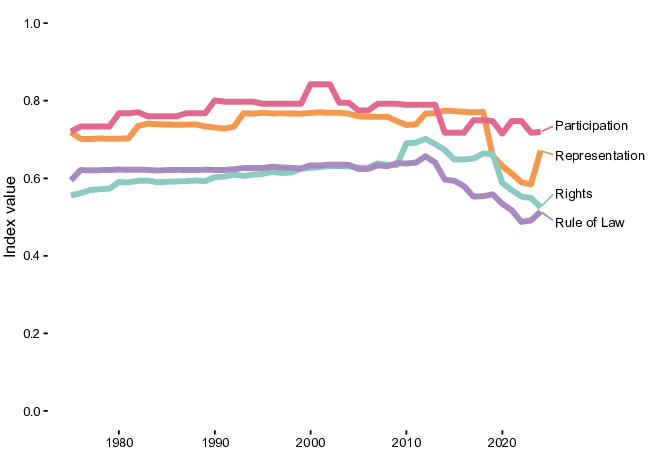
Mexico (2024)
| Representation | Rights | Rule of Law | Participation | |
|---|---|---|---|---|
| Ranking | 82 | 110 | 119 | 124 |
| GSoD Indices score | 0.553 | 0.407 | 0.361 | 0.449 |
Factor scores in 2024
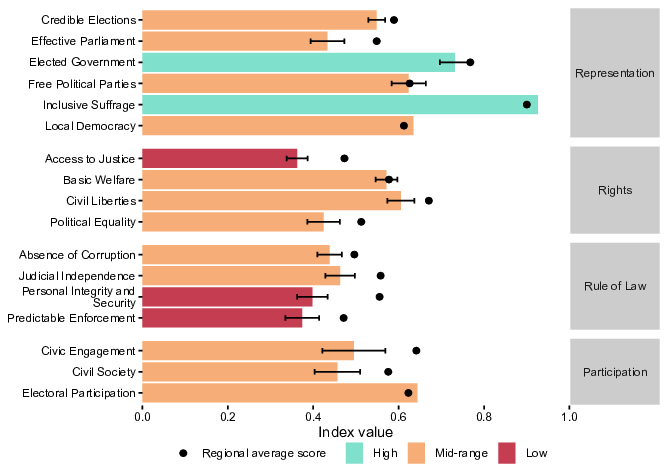
Category trends
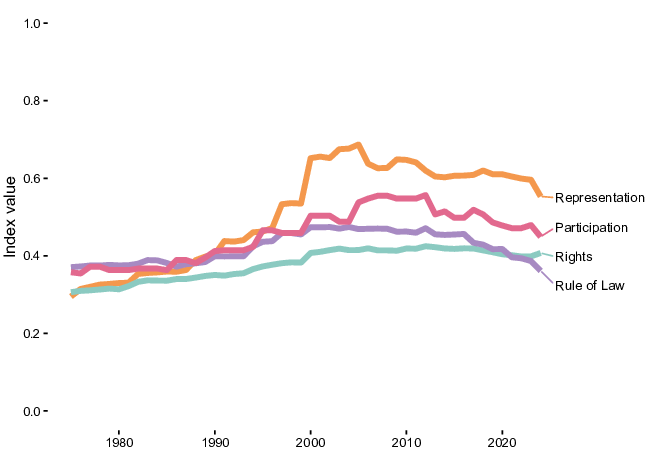
Moldova (2024)
| Representation | Rights | Rule of Law | Participation | |
|---|---|---|---|---|
| Ranking | 69 | 52 | 64 | 85 |
| GSoD Indices score | 0.609 | 0.595 | 0.515 | 0.554 |
Factor scores in 2024
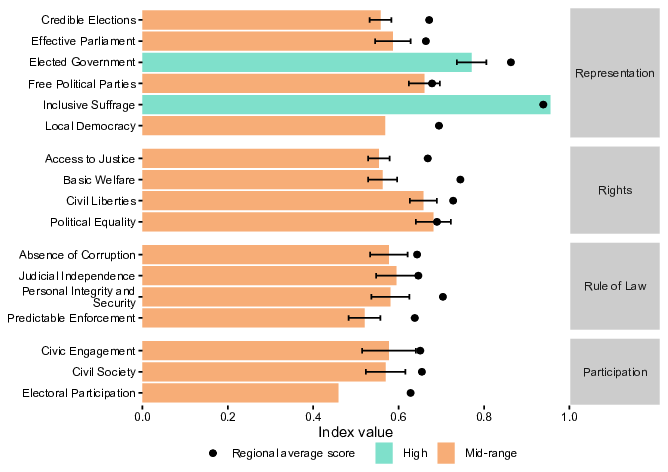
Category trends
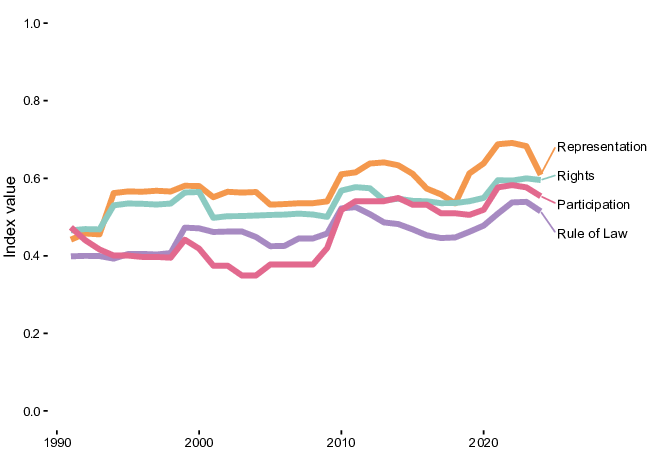
Mongolia (2024)
| Representation | Rights | Rule of Law | Participation | |
|---|---|---|---|---|
| Ranking | 56 | 68 | 68 | 91 |
| GSoD Indices score | 0.662 | 0.541 | 0.501 | 0.543 |
Factor scores in 2024
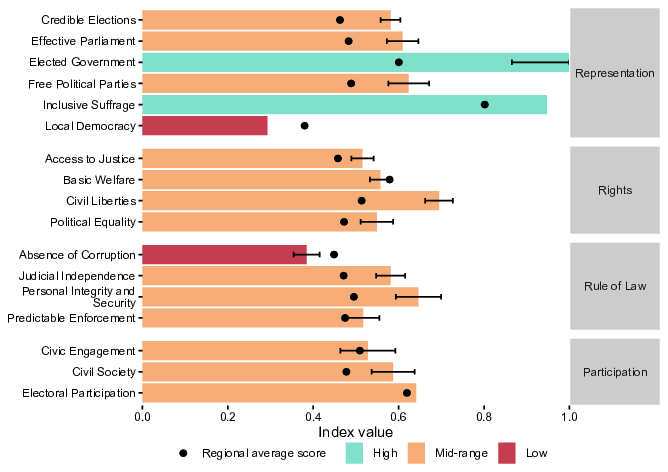
Category trends
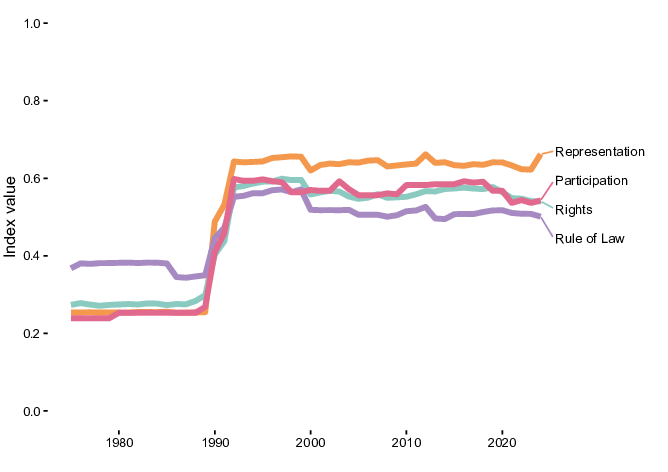
Montenegro (2024)
| Representation | Rights | Rule of Law | Participation | |
|---|---|---|---|---|
| Ranking | 76 | 44 | 43 | 62 |
| GSoD Indices score | 0.586 | 0.617 | 0.601 | 0.603 |
Factor scores in 2024
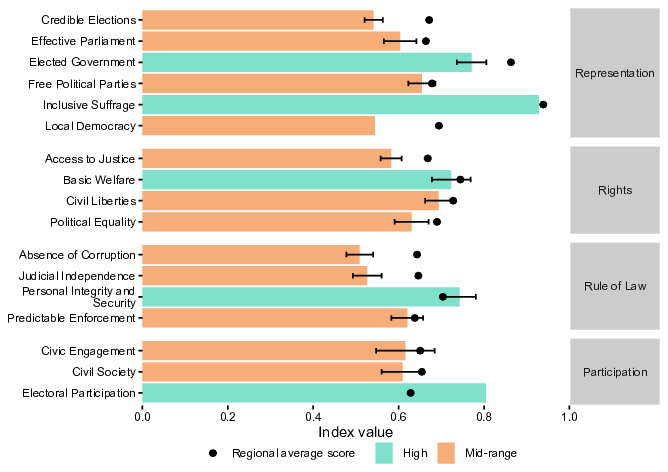
Category trends
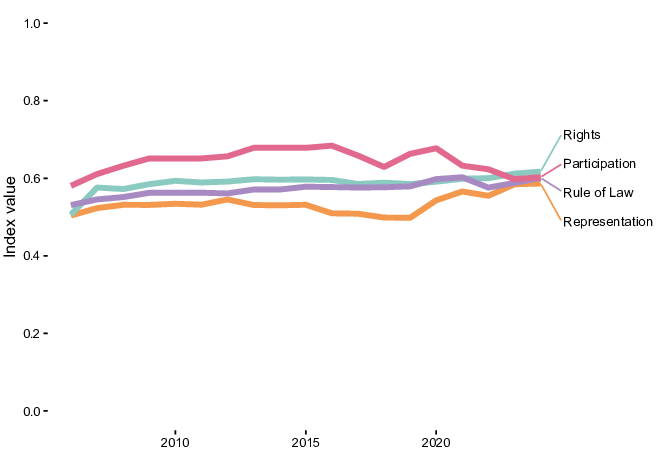
Morocco (2024)
| Representation | Rights | Rule of Law | Participation | |
|---|---|---|---|---|
| Ranking | 107 | 77 | 103 | 96 |
| GSoD Indices score | 0.432 | 0.509 | 0.396 | 0.531 |
Factor scores in 2024
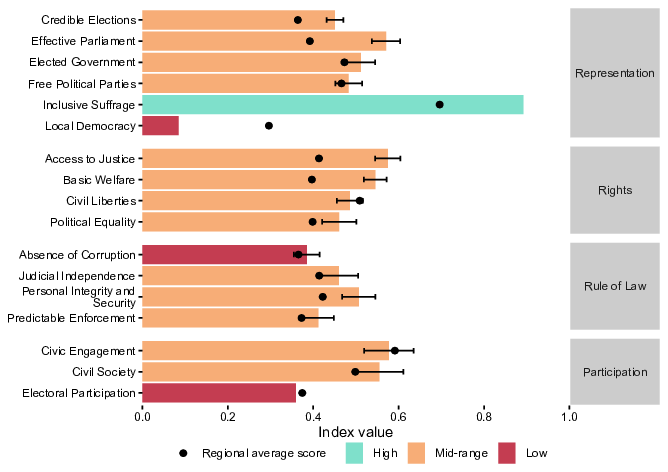
Category trends
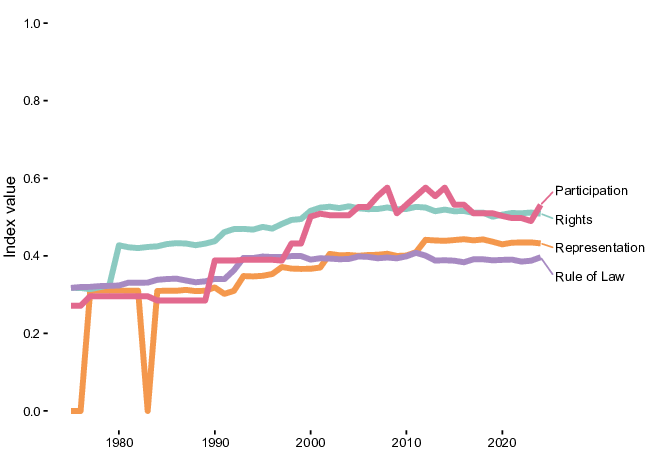
Mozambique (2024)
| Representation | Rights | Rule of Law | Participation | |
|---|---|---|---|---|
| Ranking | 122 | 125 | 131 | 126 |
| GSoD Indices score | 0.361 | 0.358 | 0.328 | 0.439 |
Factor scores in 2024
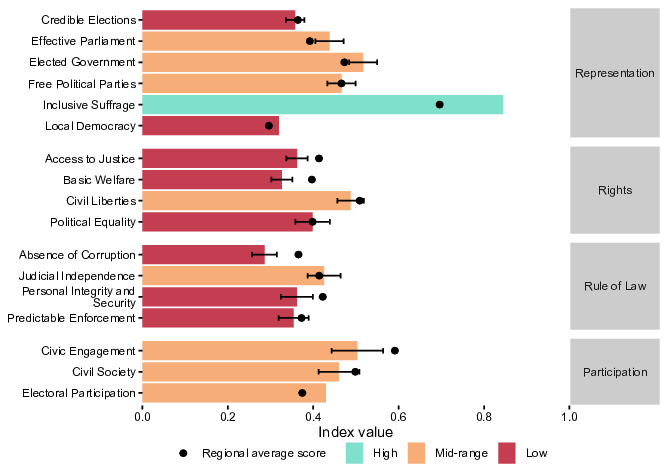
Category trends
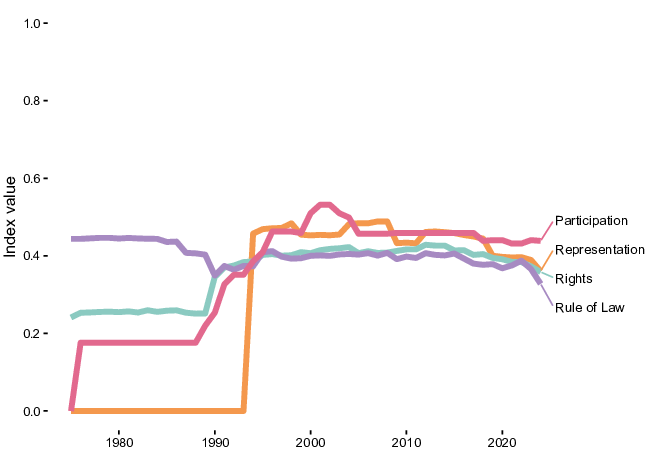
Myanmar (2024)
| Representation | Rights | Rule of Law | Participation | |
|---|---|---|---|---|
| Ranking | 151 | 166 | 161 | 161 |
| GSoD Indices score | 0 | 0.178 | 0.143 | 0.232 |
Factor scores in 2024
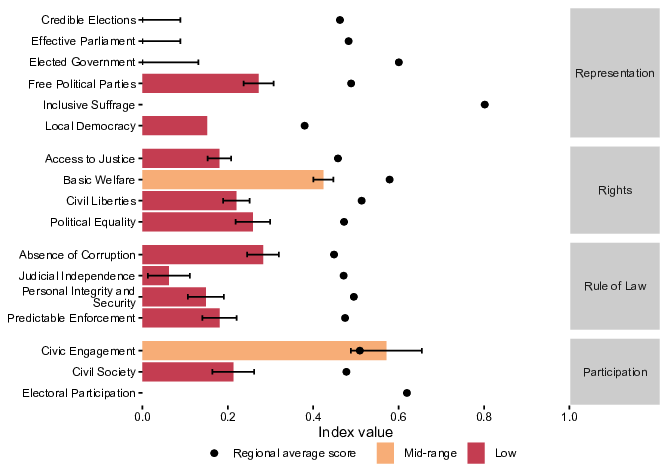
Category trends
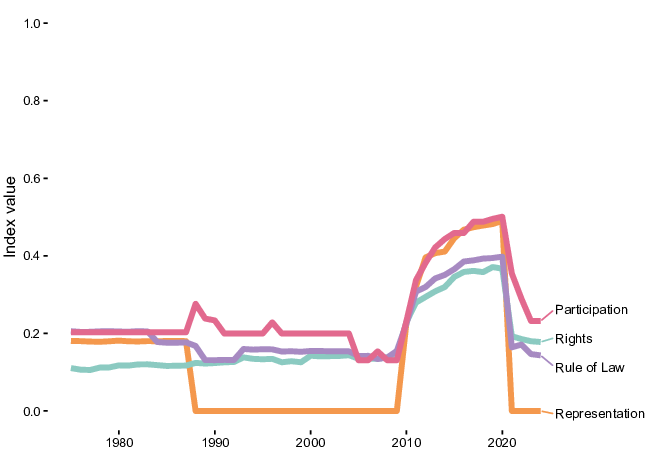
Namibia (2024)
| Representation | Rights | Rule of Law | Participation | |
|---|---|---|---|---|
| Ranking | 64 | 64 | 42 | 81 |
| GSoD Indices score | 0.635 | 0.556 | 0.613 | 0.562 |
Factor scores in 2024
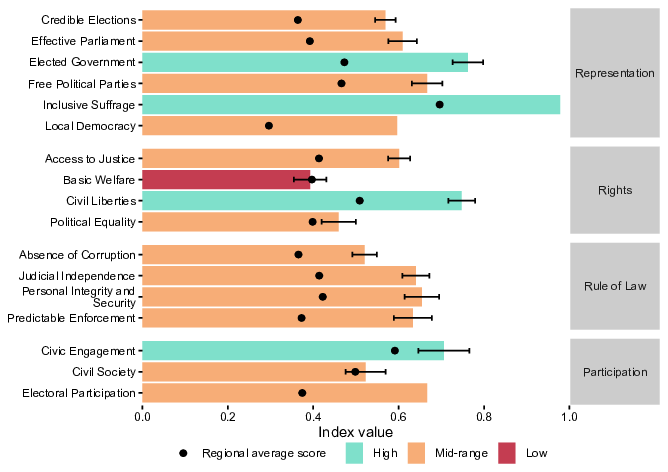
Category trends
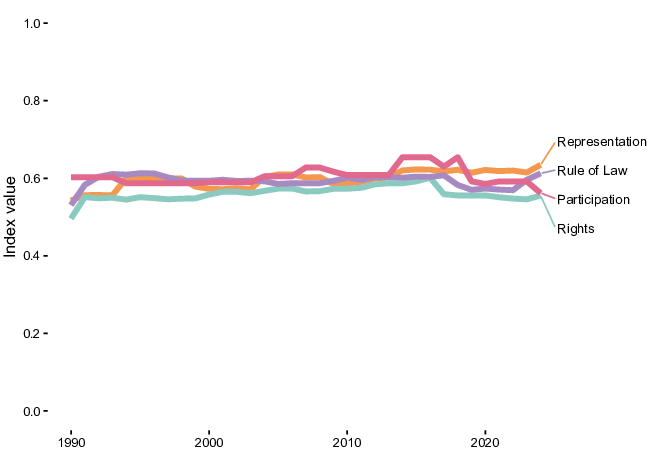
Nepal (2024)
| Representation | Rights | Rule of Law | Participation | |
|---|---|---|---|---|
| Ranking | 62 | 70 | 78 | 73 |
| GSoD Indices score | 0.644 | 0.539 | 0.481 | 0.576 |
Factor scores in 2024
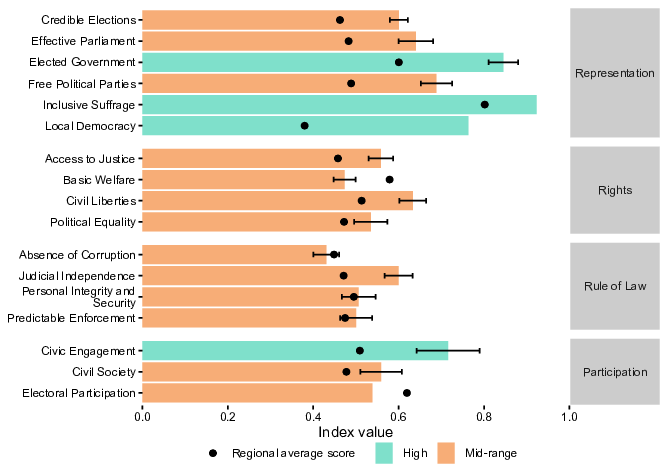
Category trends
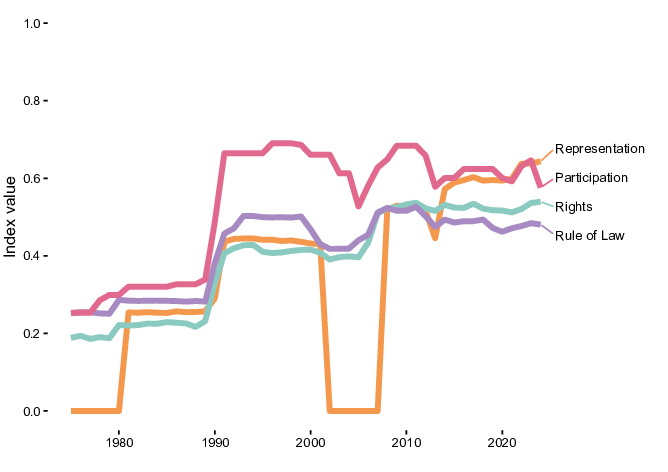
Netherlands (2024)
| Representation | Rights | Rule of Law | Participation | |
|---|---|---|---|---|
| Ranking | 8 | 19 | 20 | 15 |
| GSoD Indices score | 0.855 | 0.801 | 0.747 | 0.786 |
Factor scores in 2024
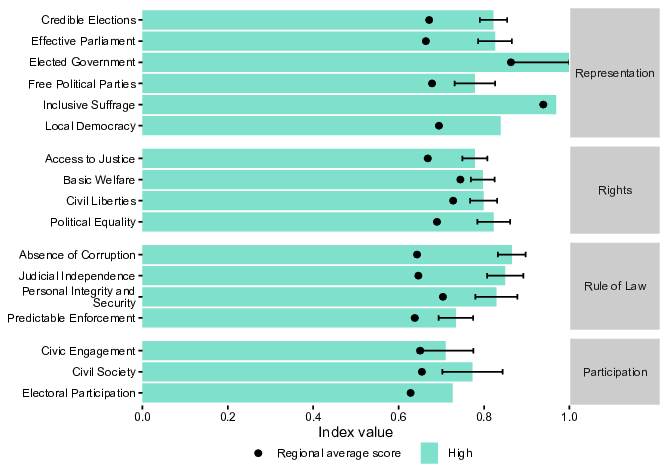
Category trends
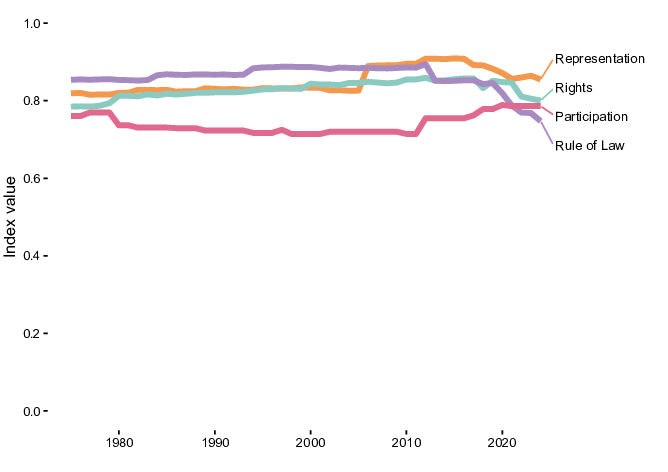
New Zealand (2024)
| Representation | Rights | Rule of Law | Participation | |
|---|---|---|---|---|
| Ranking | 14 | 21 | 9 | 58 |
| GSoD Indices score | 0.835 | 0.799 | 0.853 | 0.625 |
Factor scores in 2024
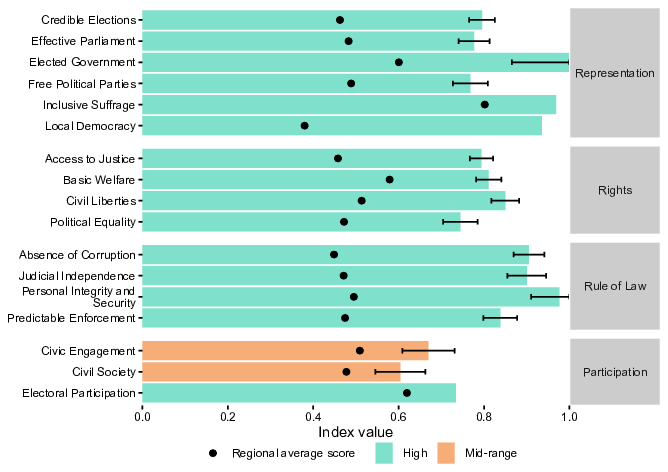
Category trends
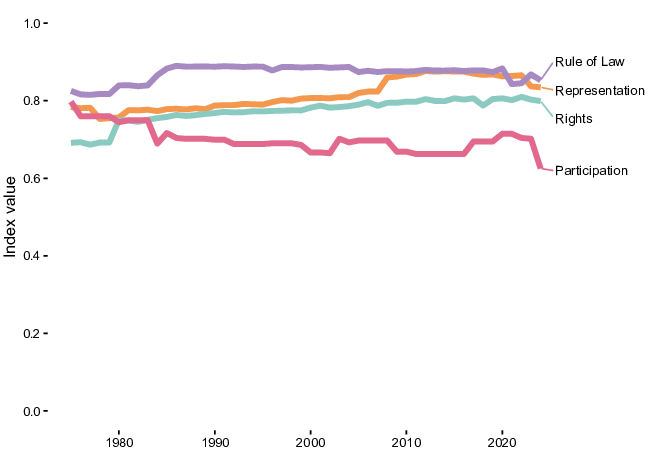
Nicaragua (2024)
| Representation | Rights | Rule of Law | Participation | |
|---|---|---|---|---|
| Ranking | 144 | 169 | 168 | 167 |
| GSoD Indices score | 0.256 | 0.144 | 0.107 | 0.197 |
Factor scores in 2024
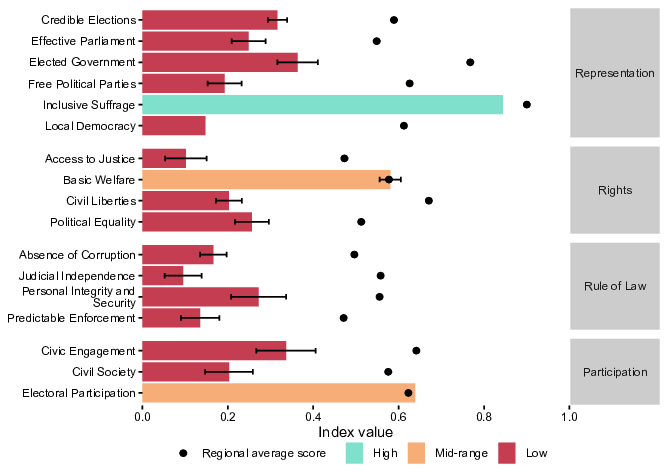
Category trends
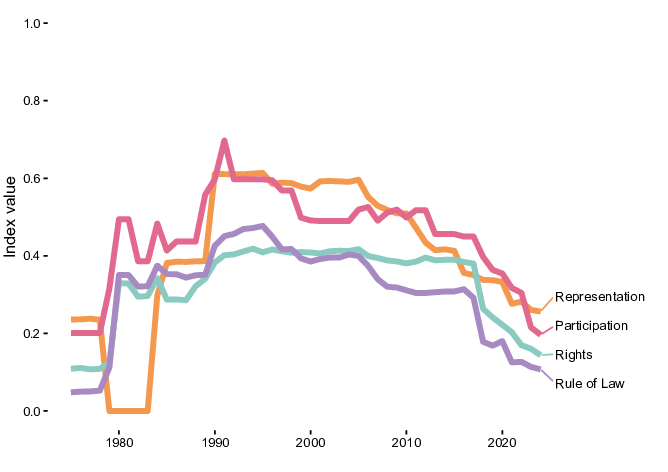
Niger (2024)
| Representation | Rights | Rule of Law | Participation | |
|---|---|---|---|---|
| Ranking | 151 | 76 | 100 | 65 |
| GSoD Indices score | 0 | 0.515 | 0.415 | 0.599 |
Factor scores in 2024
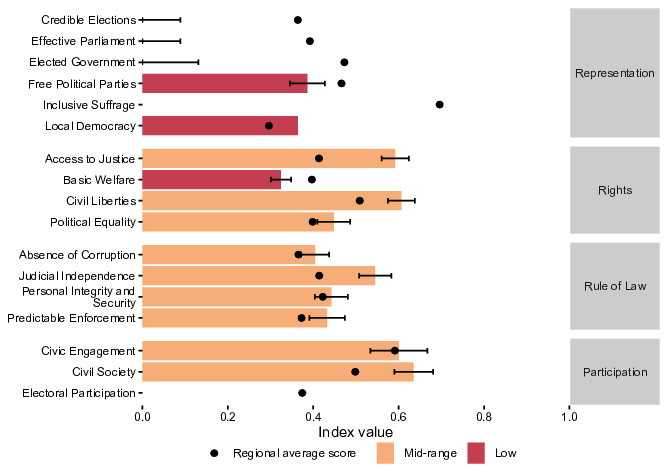
Category trends
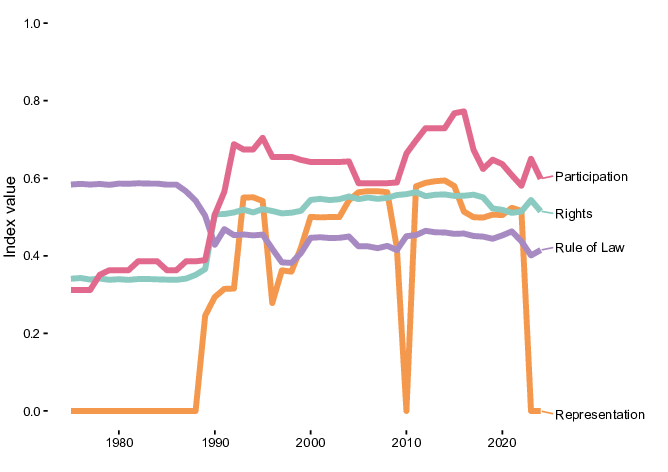
Nigeria (2024)
| Representation | Rights | Rule of Law | Participation | |
|---|---|---|---|---|
| Ranking | 95 | 97 | 128 | 73 |
| GSoD Indices score | 0.487 | 0.457 | 0.332 | 0.576 |
Factor scores in 2024
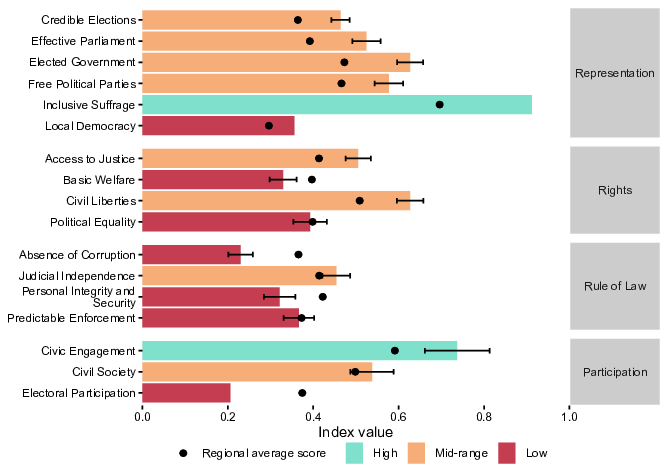
Category trends
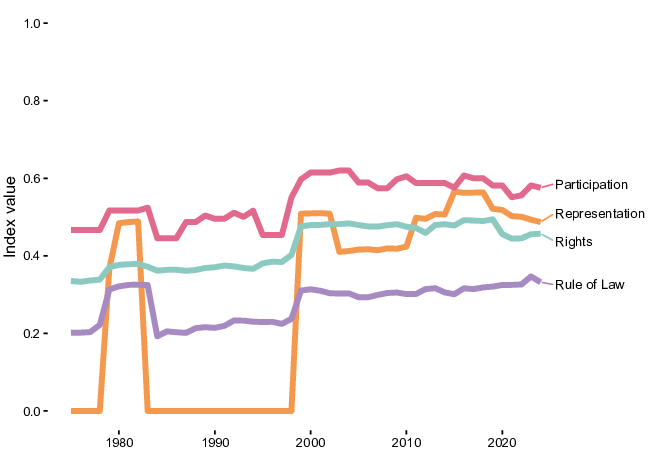
North Korea (2024)
| Representation | Rights | Rule of Law | Participation | |
|---|---|---|---|---|
| Ranking | 150 | 170 | 166 | 172 |
| GSoD Indices score | 0.187 | 0.132 | 0.131 | 0.03 |
Factor scores in 2024
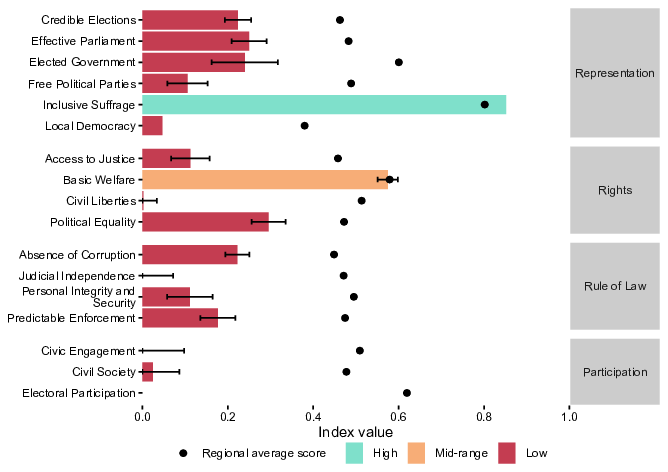
Category trends
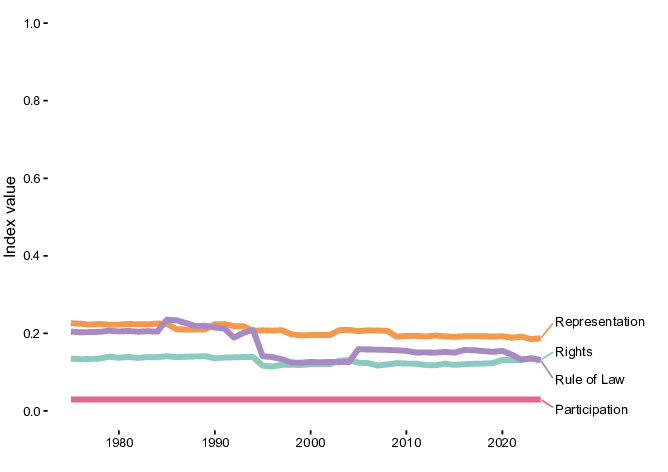
North Macedonia (2024)
| Representation | Rights | Rule of Law | Participation | |
|---|---|---|---|---|
| Ranking | 70 | 68 | 90 | 78 |
| GSoD Indices score | 0.607 | 0.541 | 0.442 | 0.564 |
Factor scores in 2024
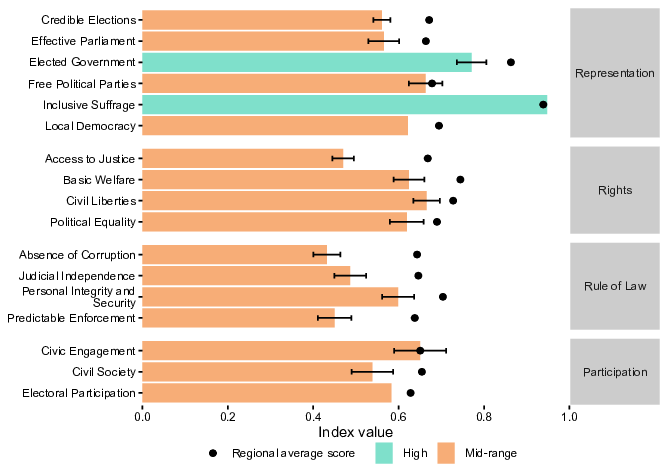
Category trends
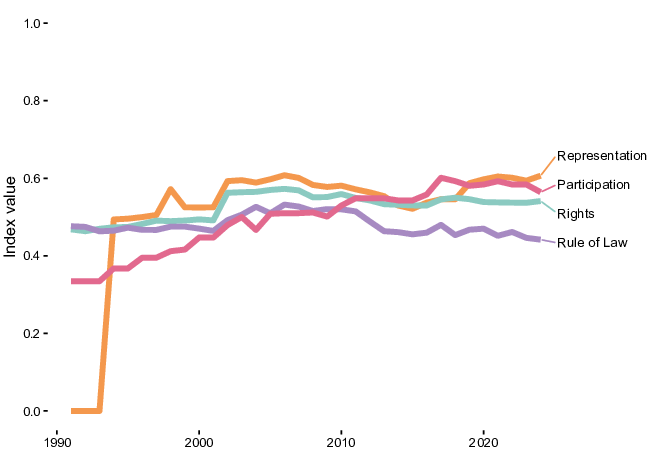
Norway (2024)
| Representation | Rights | Rule of Law | Participation | |
|---|---|---|---|---|
| Ranking | 3 | 6 | 7 | 4 |
| GSoD Indices score | 0.878 | 0.909 | 0.858 | 0.9 |
Factor scores in 2024
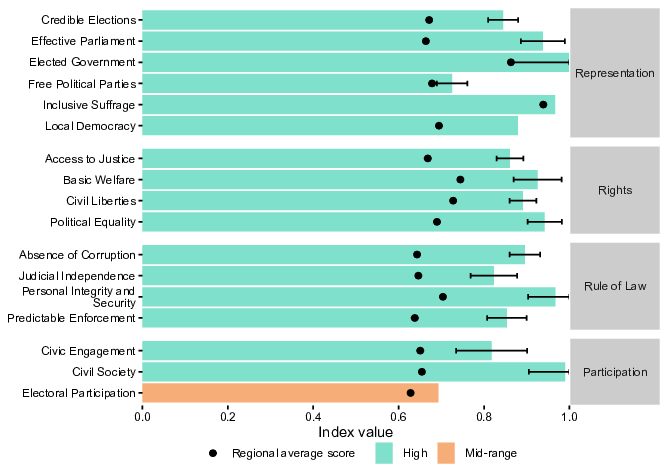
Category trends
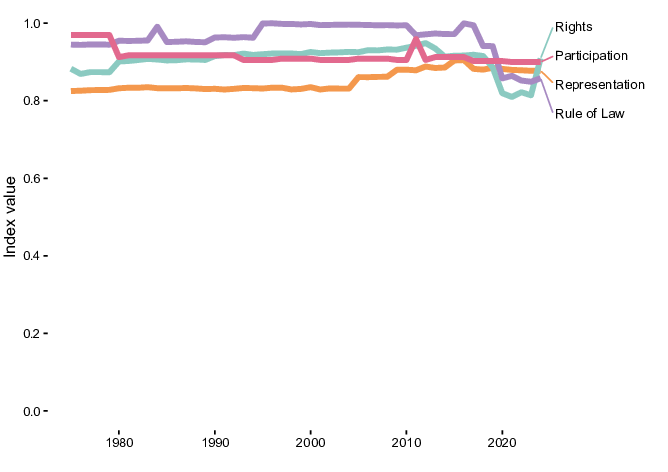
Oman (2024)
| Representation | Rights | Rule of Law | Participation | |
|---|---|---|---|---|
| Ranking | 119 | 106 | 80 | 154 |
| GSoD Indices score | 0.37 | 0.427 | 0.477 | 0.291 |
Factor scores in 2024
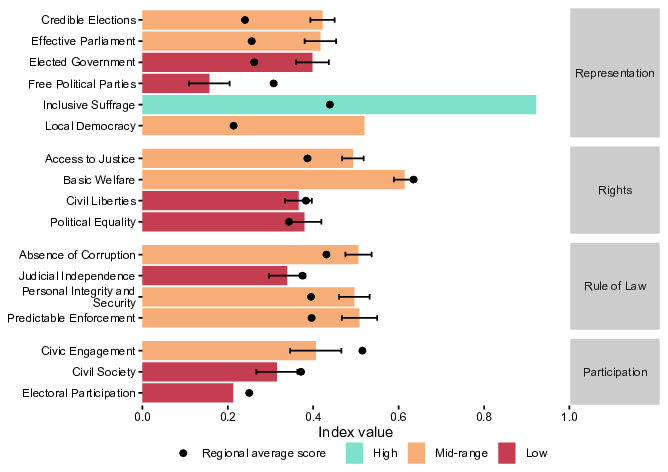
Category trends
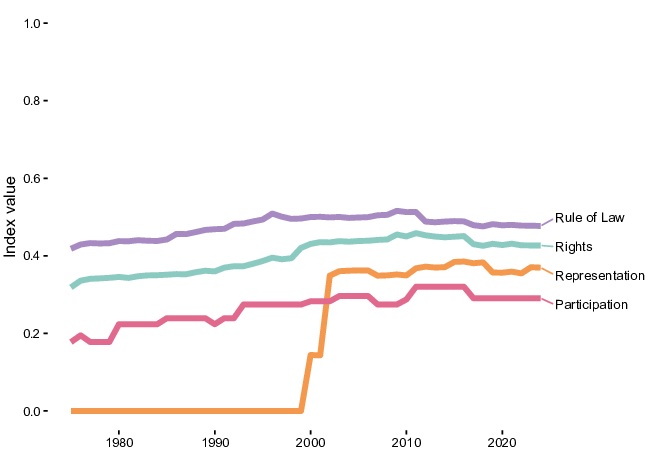
Pakistan (2024)
| Representation | Rights | Rule of Law | Participation | |
|---|---|---|---|---|
| Ranking | 113 | 128 | 124 | 94 |
| GSoD Indices score | 0.4 | 0.348 | 0.346 | 0.536 |
Factor scores in 2024
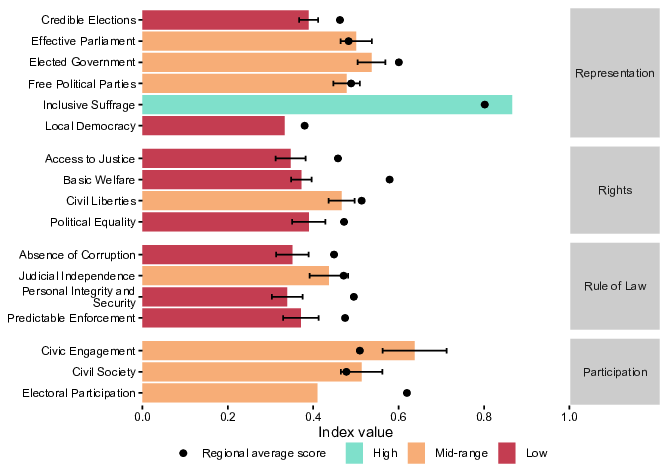
Category trends
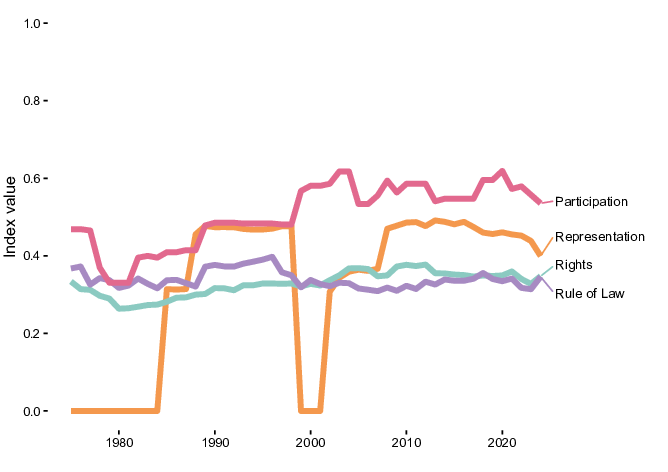
Palestine (2024)
| Representation | Rights | Rule of Law | Participation | |
|---|---|---|---|---|
| Ranking | 151 | 105 | 130 | 129 |
| GSoD Indices score | 0 | 0.435 | 0.329 | 0.437 |
Factor scores in 2024
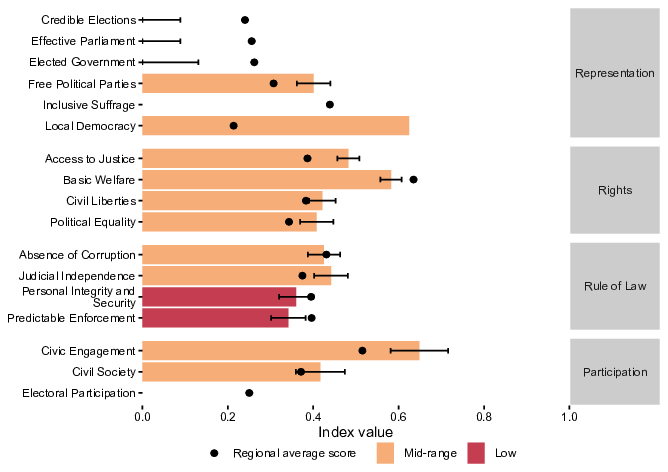
Category trends
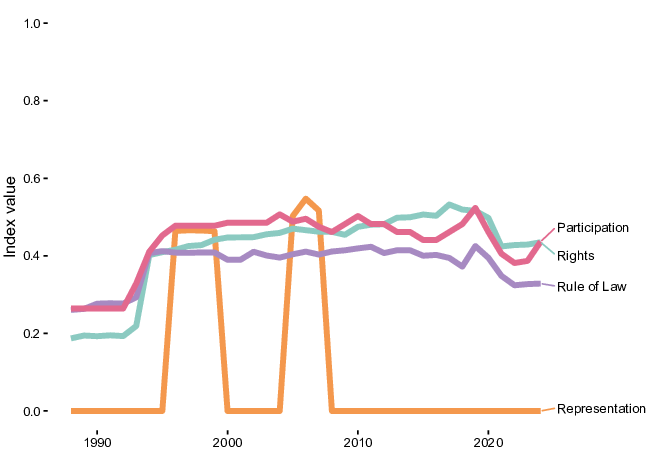
Panama (2024)
| Representation | Rights | Rule of Law | Participation | |
|---|---|---|---|---|
| Ranking | 36 | 62 | 71 | 62 |
| GSoD Indices score | 0.757 | 0.559 | 0.498 | 0.603 |
Factor scores in 2024
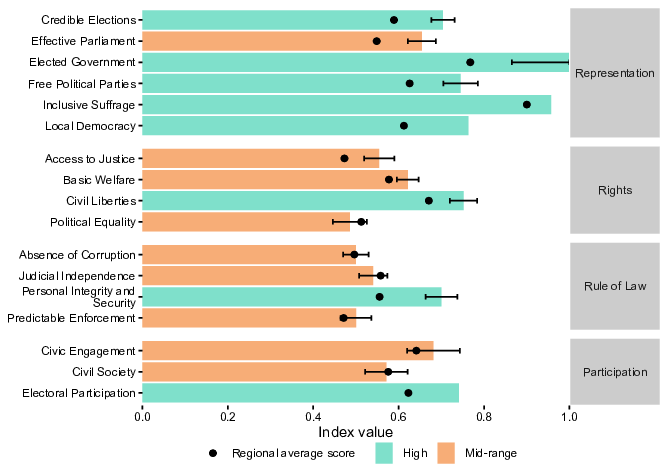
Category trends
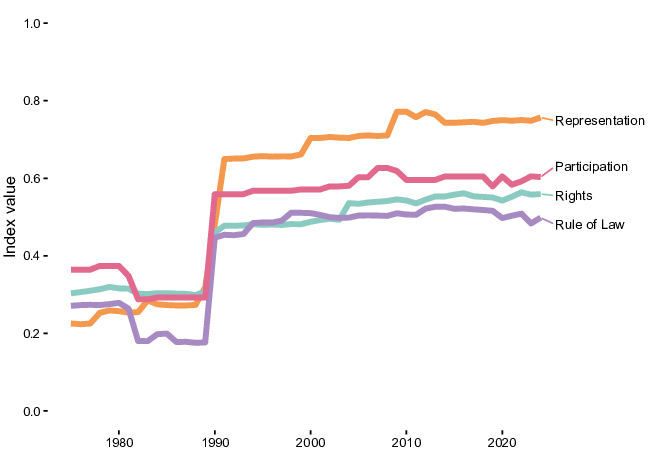
Papua New Guinea (2024)
| Representation | Rights | Rule of Law | Participation | |
|---|---|---|---|---|
| Ranking | 94 | 87 | 101 | 125 |
| GSoD Indices score | 0.493 | 0.477 | 0.411 | 0.441 |
Factor scores in 2024
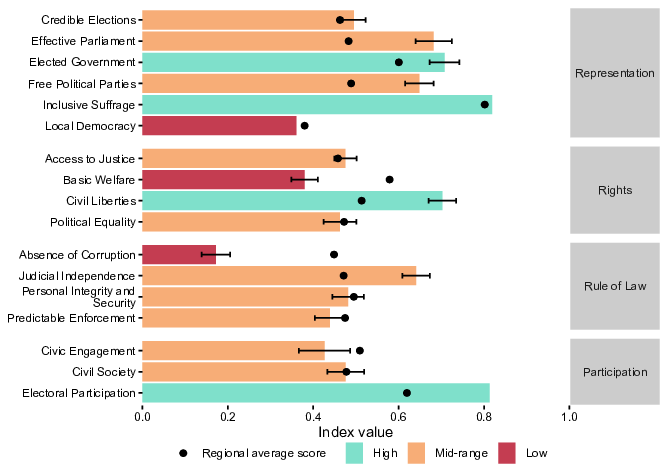
Category trends
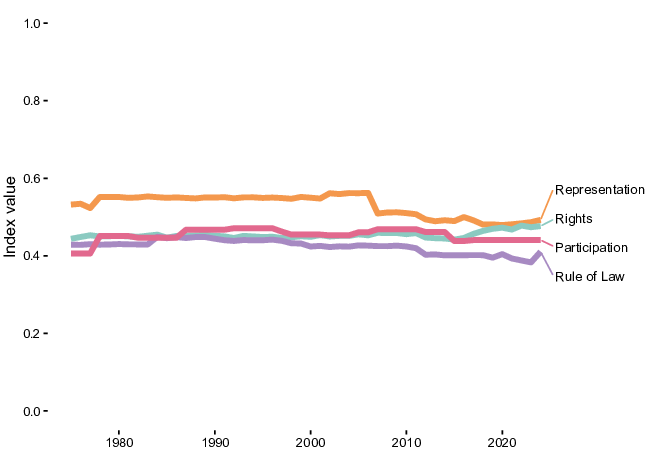
Paraguay (2024)
| Representation | Rights | Rule of Law | Participation | |
|---|---|---|---|---|
| Ranking | 84 | 103 | 105 | 120 |
| GSoD Indices score | 0.552 | 0.437 | 0.395 | 0.453 |
Factor scores in 2024
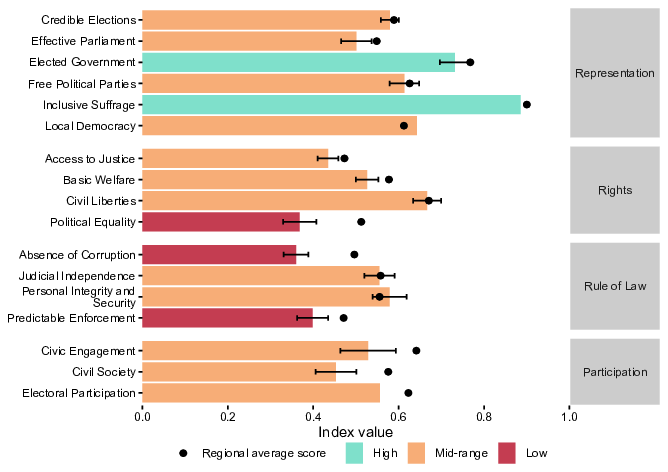
Category trends
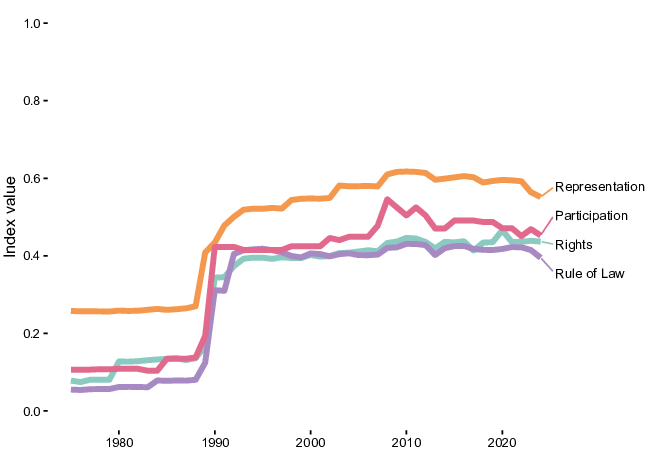
Peru (2024)
| Representation | Rights | Rule of Law | Participation | |
|---|---|---|---|---|
| Ranking | 55 | 96 | 86 | 86 |
| GSoD Indices score | 0.665 | 0.462 | 0.464 | 0.553 |
Factor scores in 2024
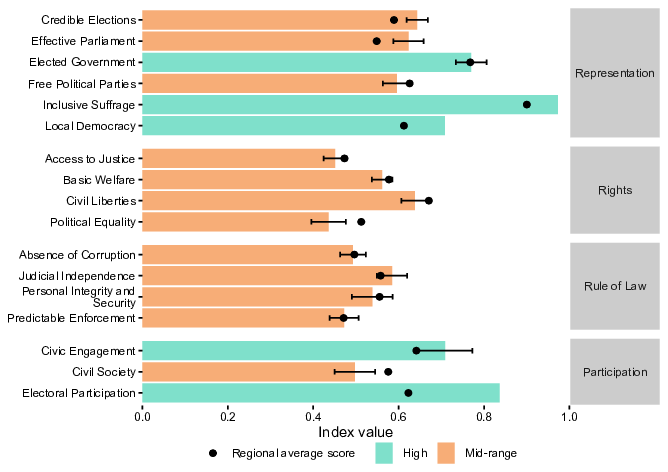
Category trends
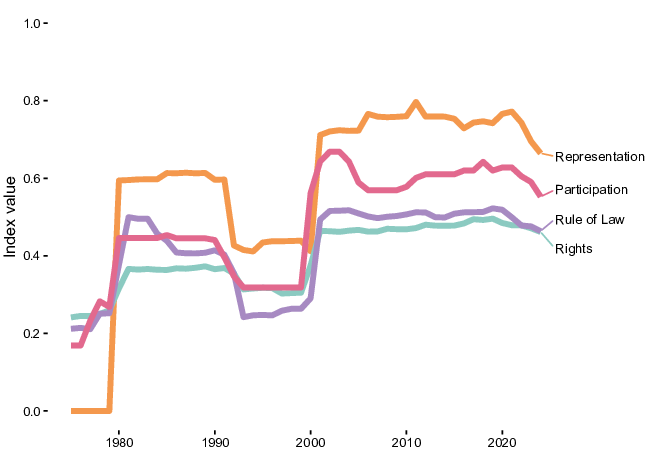
Philippines (2024)
| Representation | Rights | Rule of Law | Participation | |
|---|---|---|---|---|
| Ranking | 86 | 92 | 103 | 72 |
| GSoD Indices score | 0.541 | 0.467 | 0.396 | 0.581 |
Factor scores in 2024
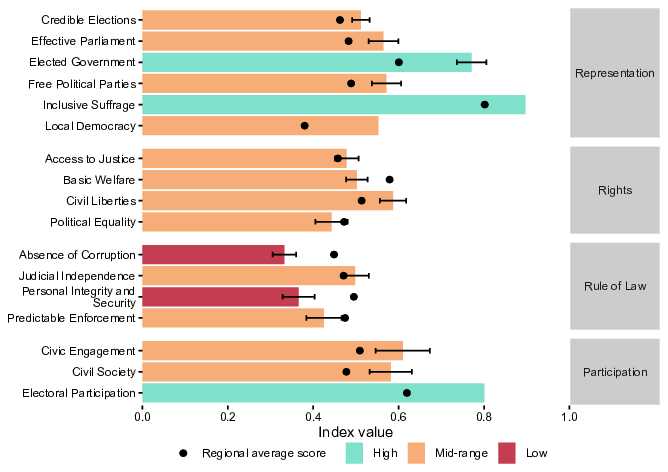
Category trends
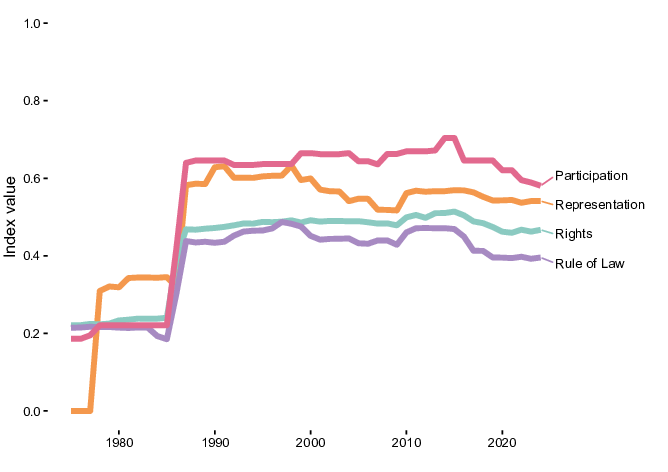
Poland (2024)
| Representation | Rights | Rule of Law | Participation | |
|---|---|---|---|---|
| Ranking | 49 | 40 | 39 | 48 |
| GSoD Indices score | 0.678 | 0.651 | 0.619 | 0.654 |
Factor scores in 2024
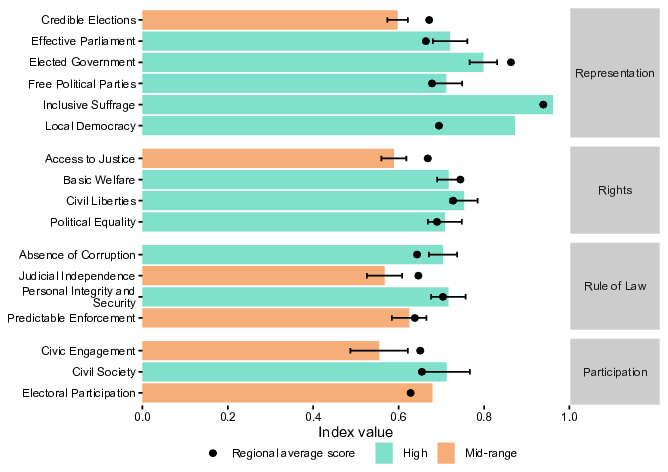
Category trends
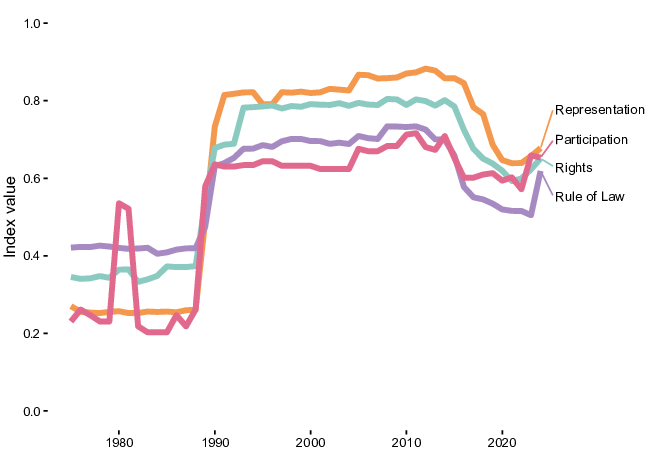
Portugal (2024)
| Representation | Rights | Rule of Law | Participation | |
|---|---|---|---|---|
| Ranking | 13 | 37 | 33 | 55 |
| GSoD Indices score | 0.837 | 0.671 | 0.649 | 0.631 |
Factor scores in 2024
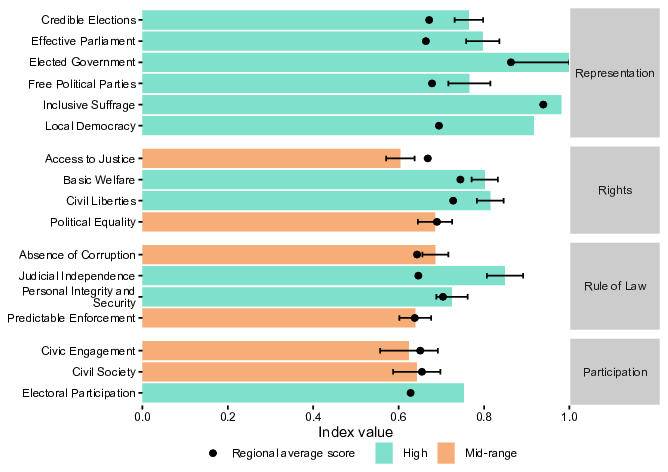
Category trends
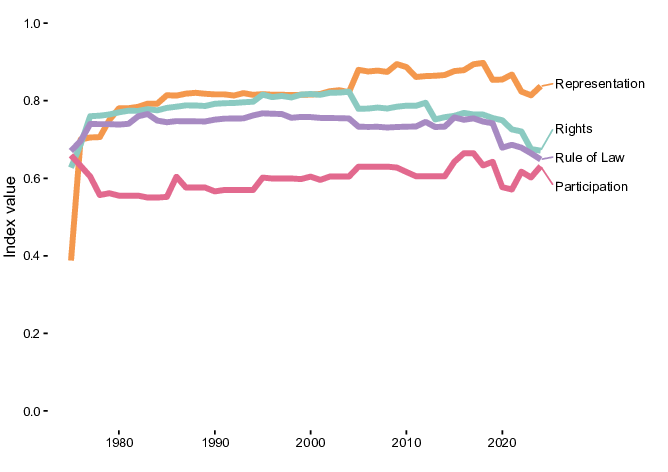
Qatar (2024)
| Representation | Rights | Rule of Law | Participation | |
|---|---|---|---|---|
| Ranking | 151 | 114 | 109 | 159 |
| GSoD Indices score | 0 | 0.394 | 0.385 | 0.239 |
Factor scores in 2024
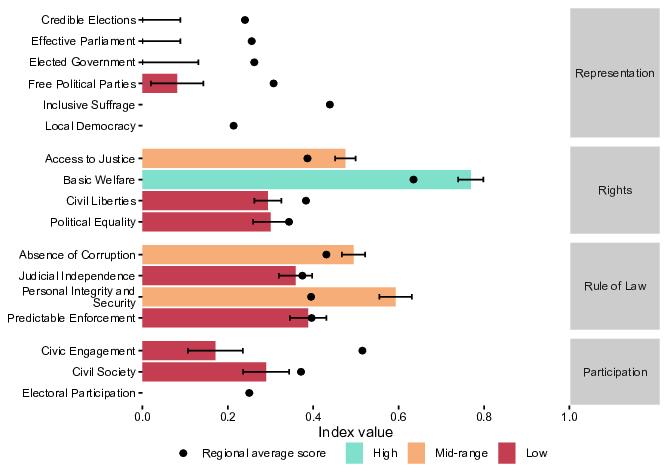
Category trends
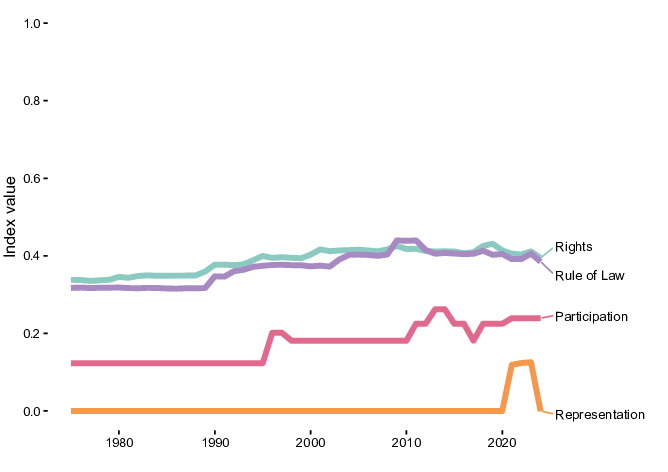
Romania (2024)
| Representation | Rights | Rule of Law | Participation | |
|---|---|---|---|---|
| Ranking | 61 | 53 | 75 | 111 |
| GSoD Indices score | 0.647 | 0.592 | 0.486 | 0.478 |
Factor scores in 2024
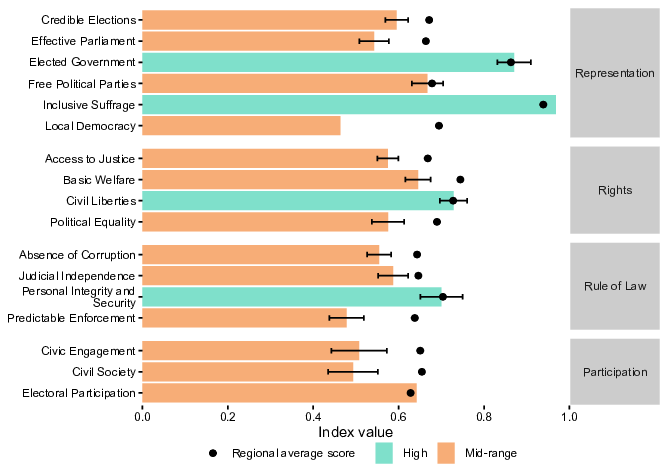
Category trends
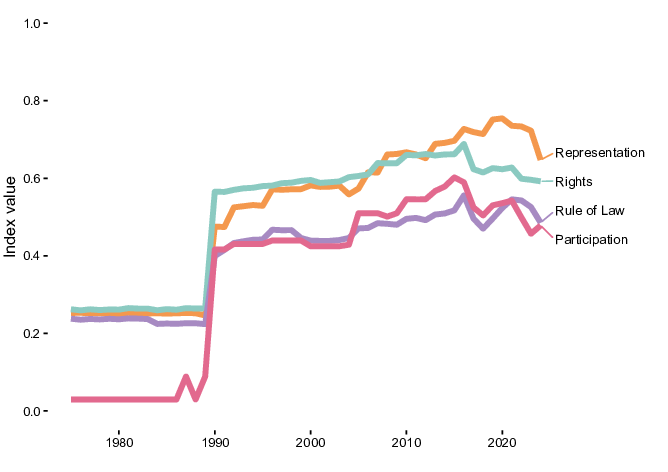
Russia (2024)
| Representation | Rights | Rule of Law | Participation | |
|---|---|---|---|---|
| Ranking | 137 | 143 | 141 | 160 |
| GSoD Indices score | 0.283 | 0.289 | 0.28 | 0.238 |
Factor scores in 2024
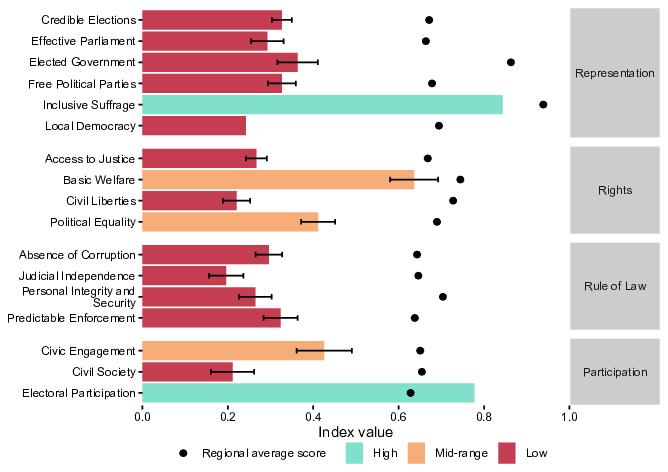
Category trends
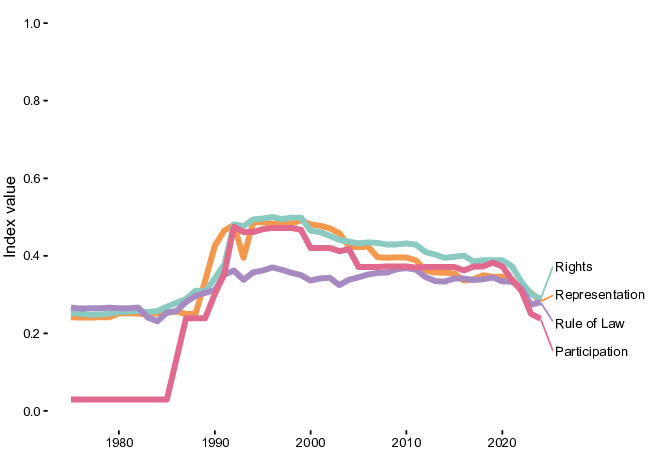
Rwanda (2024)
| Representation | Rights | Rule of Law | Participation | |
|---|---|---|---|---|
| Ranking | 126 | 136 | 121 | 151 |
| GSoD Indices score | 0.332 | 0.318 | 0.359 | 0.299 |
Factor scores in 2024
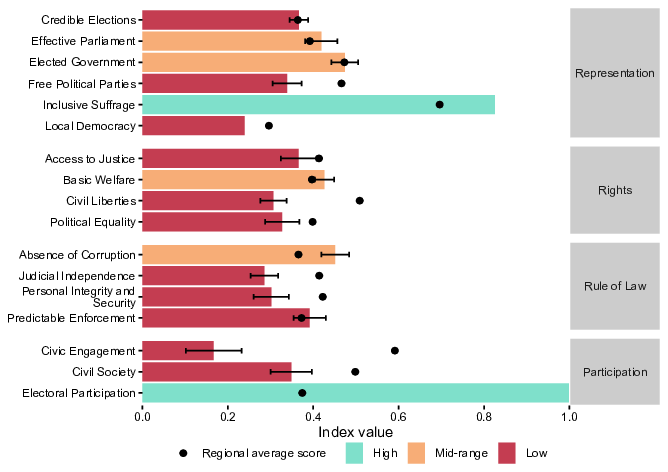
Category trends
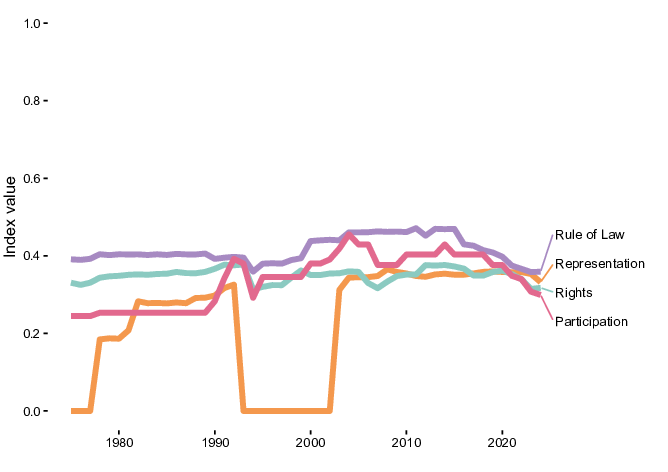
Saudi Arabia (2024)
| Representation | Rights | Rule of Law | Participation | |
|---|---|---|---|---|
| Ranking | 151 | 140 | 118 | 157 |
| GSoD Indices score | 0 | 0.302 | 0.364 | 0.245 |
Factor scores in 2024
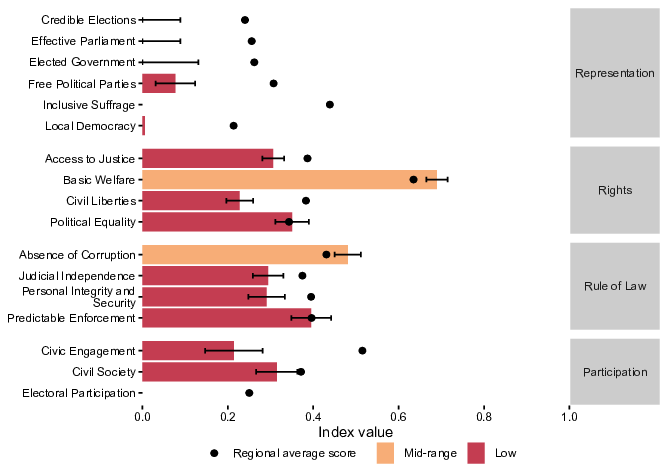
Category trends
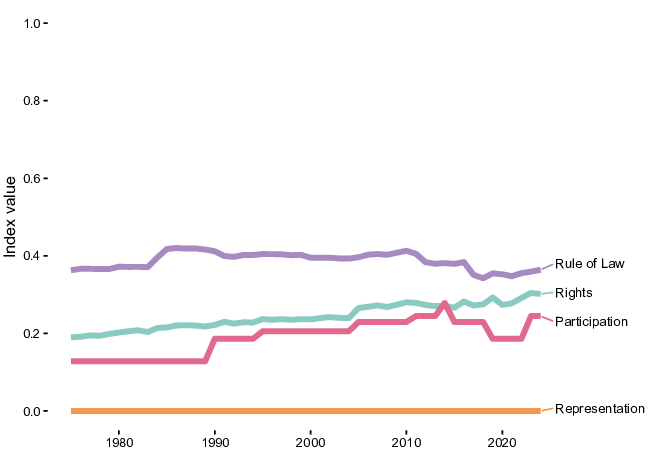
Senegal (2024)
| Representation | Rights | Rule of Law | Participation | |
|---|---|---|---|---|
| Ranking | 66 | 79 | 48 | 22 |
| GSoD Indices score | 0.631 | 0.505 | 0.563 | 0.737 |
Factor scores in 2024
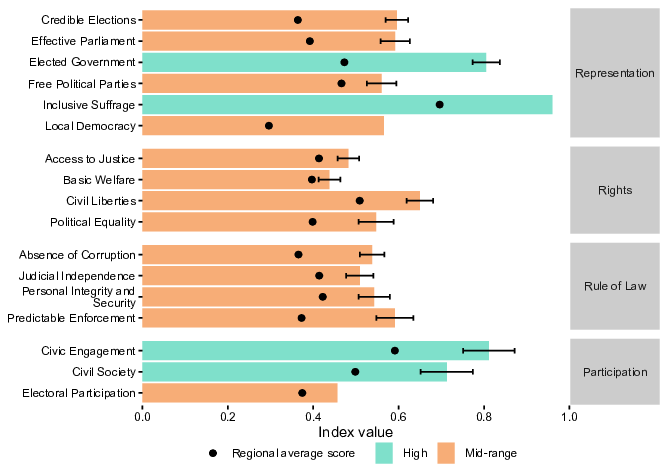
Category trends
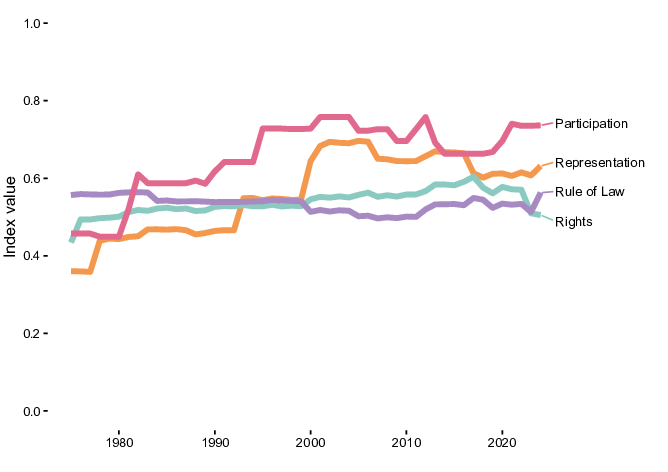
Serbia (2024)
| Representation | Rights | Rule of Law | Participation | |
|---|---|---|---|---|
| Ranking | 109 | 58 | 72 | 93 |
| GSoD Indices score | 0.424 | 0.574 | 0.497 | 0.54 |
Factor scores in 2024
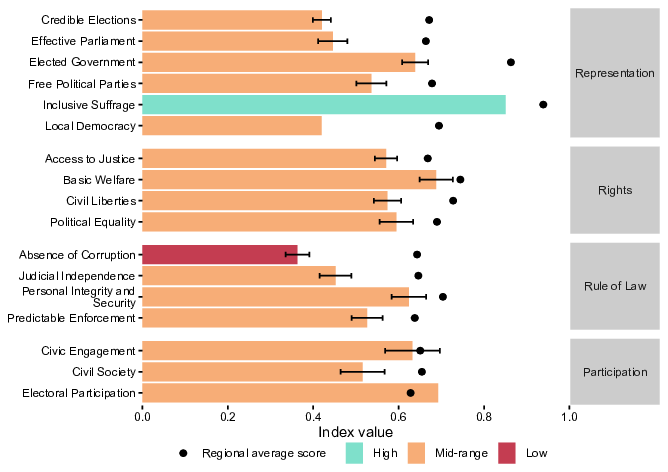
Category trends
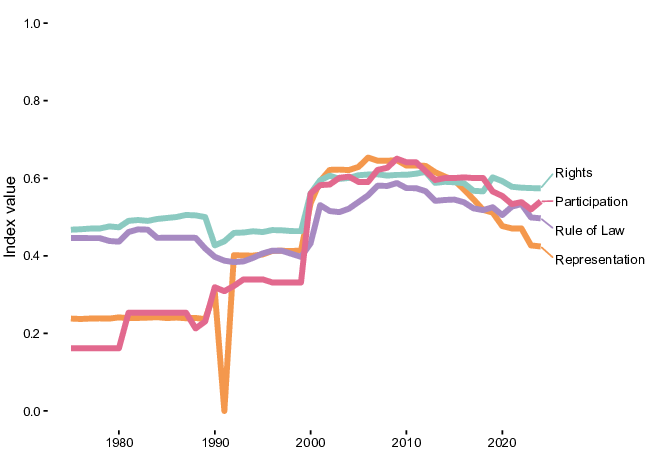
Sierra Leone (2024)
| Representation | Rights | Rule of Law | Participation | |
|---|---|---|---|---|
| Ranking | 101 | 73 | 95 | 34 |
| GSoD Indices score | 0.465 | 0.53 | 0.425 | 0.704 |
Factor scores in 2024
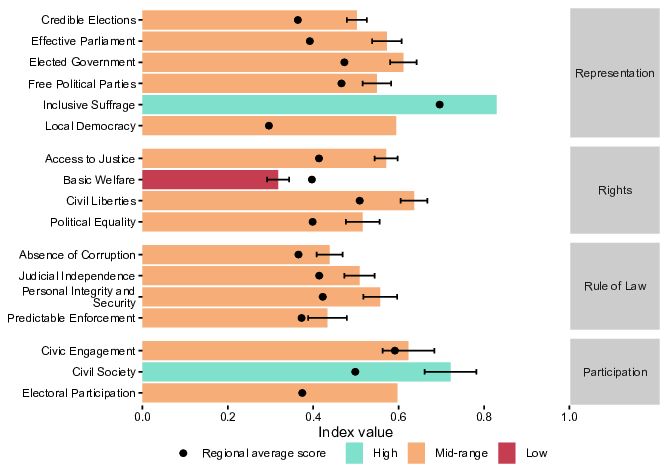
Category trends
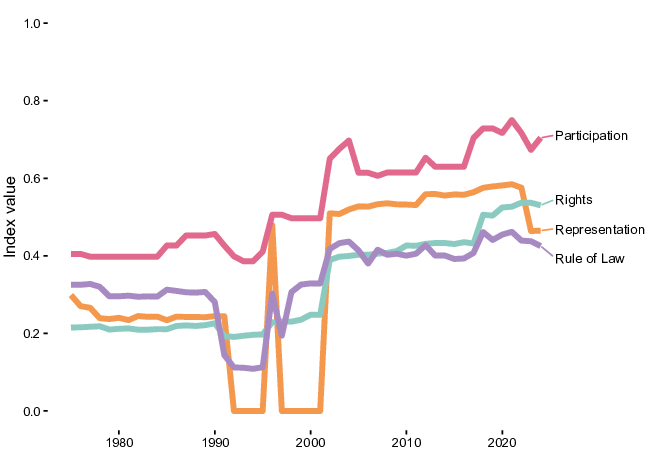
Singapore (2024)
| Representation | Rights | Rule of Law | Participation | |
|---|---|---|---|---|
| Ranking | 96 | 41 | 14 | 116 |
| GSoD Indices score | 0.48 | 0.634 | 0.817 | 0.468 |
Factor scores in 2024
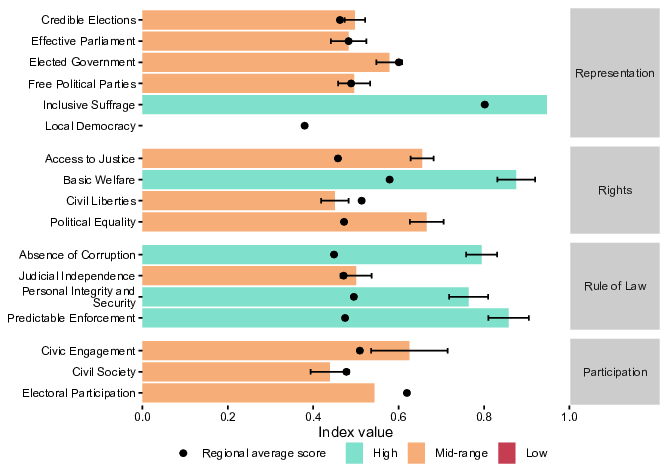
Category trends
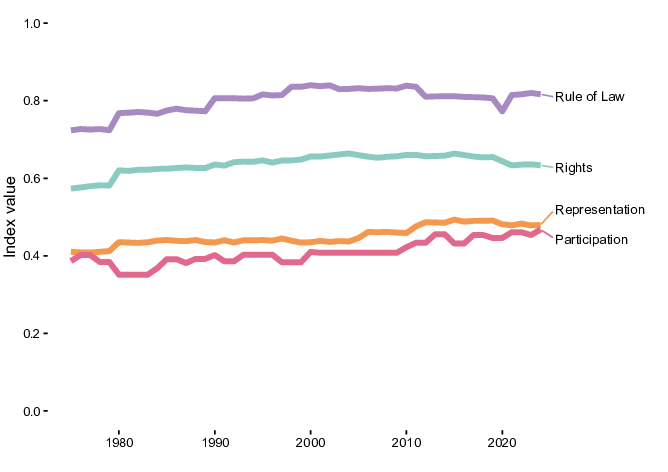
Slovakia (2024)
| Representation | Rights | Rule of Law | Participation | |
|---|---|---|---|---|
| Ranking | 29 | 36 | 57 | 69 |
| GSoD Indices score | 0.778 | 0.673 | 0.532 | 0.589 |
Factor scores in 2024
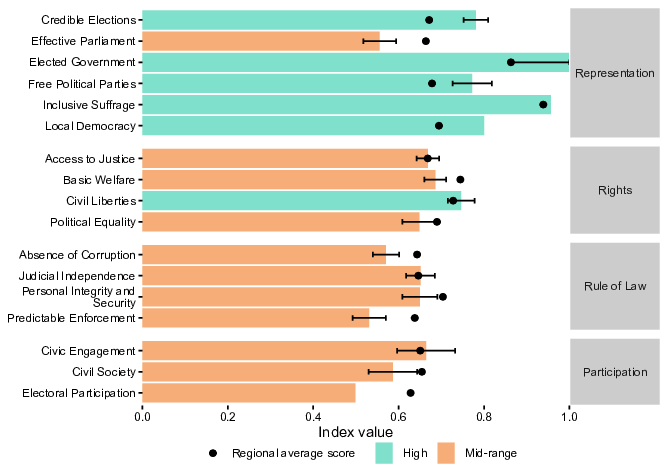
Category trends
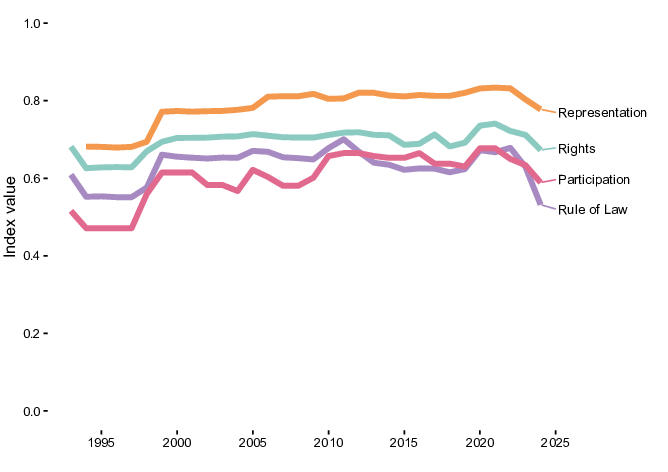
Slovenia (2024)
| Representation | Rights | Rule of Law | Participation | |
|---|---|---|---|---|
| Ranking | 19 | 17 | 27 | 17 |
| GSoD Indices score | 0.816 | 0.803 | 0.685 | 0.771 |
Factor scores in 2024
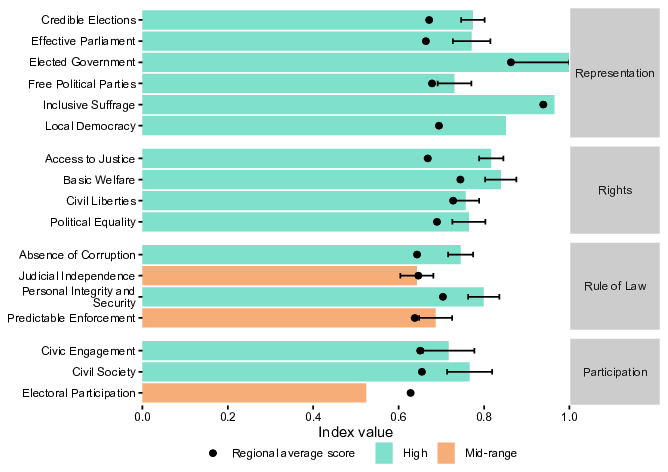
Category trends
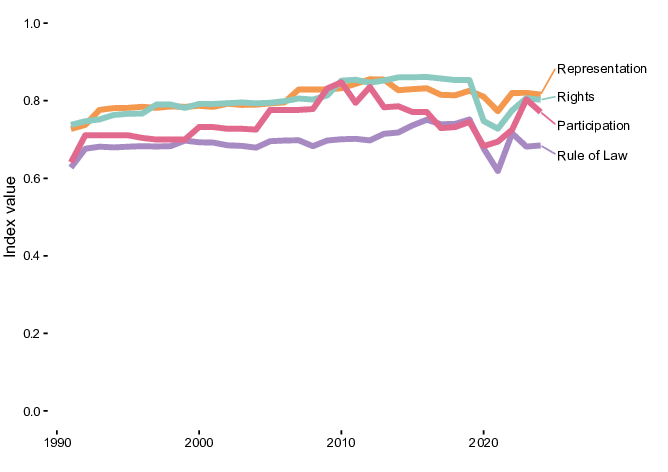
Solomon Islands (2024)
| Representation | Rights | Rule of Law | Participation | |
|---|---|---|---|---|
| Ranking | 78 | 60 | 76 | 97 |
| GSoD Indices score | 0.575 | 0.564 | 0.485 | 0.527 |
Factor scores in 2024
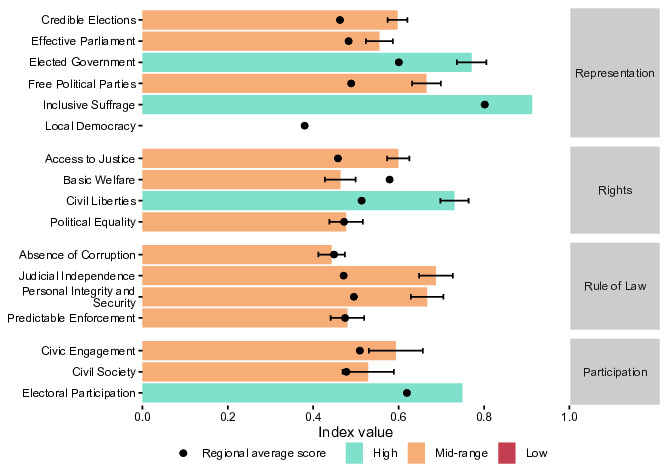
Category trends
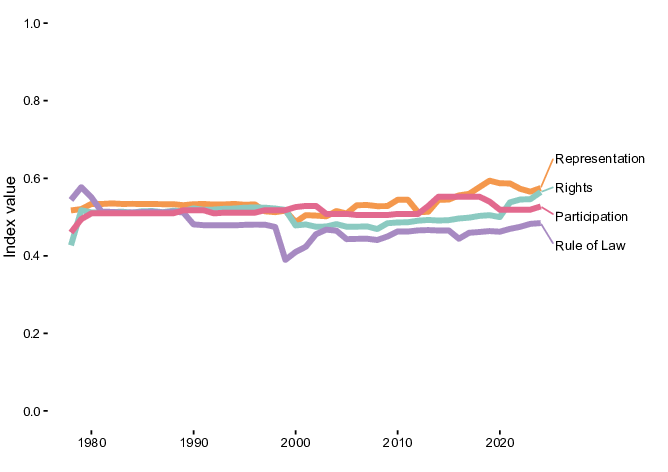
Somalia (2024)
| Representation | Rights | Rule of Law | Participation | |
|---|---|---|---|---|
| Ranking | 151 | 148 | 151 | 139 |
| GSoD Indices score | 0 | 0.275 | 0.229 | 0.38 |
Factor scores in 2024
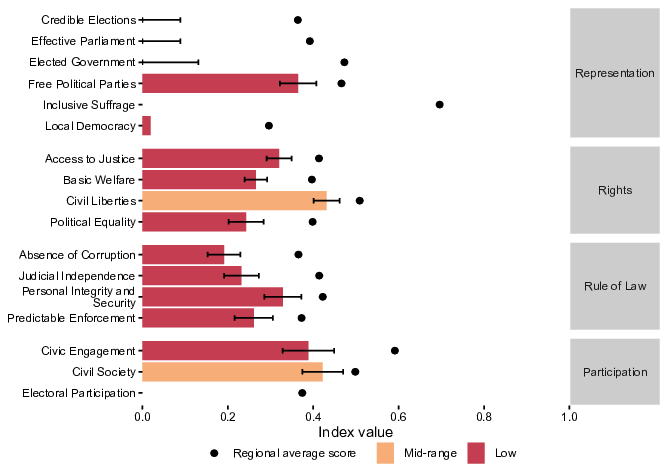
Category trends
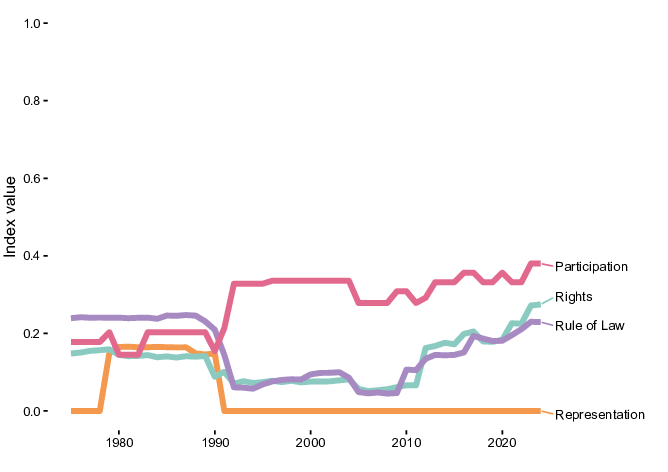
South Africa (2024)
| Representation | Rights | Rule of Law | Participation | |
|---|---|---|---|---|
| Ranking | 43 | 50 | 55 | 43 |
| GSoD Indices score | 0.733 | 0.604 | 0.543 | 0.678 |
Factor scores in 2024
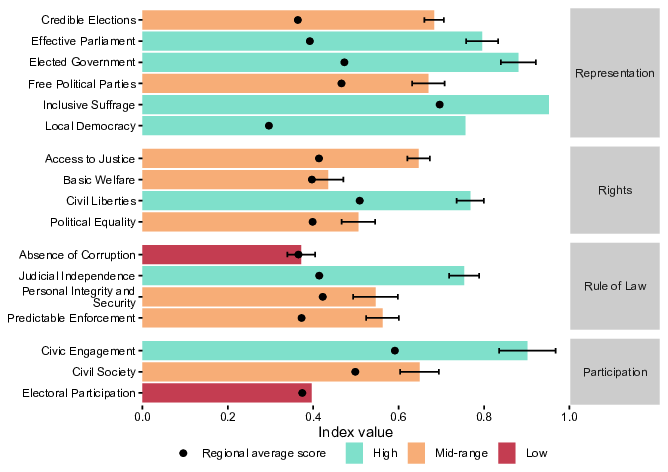
Category trends
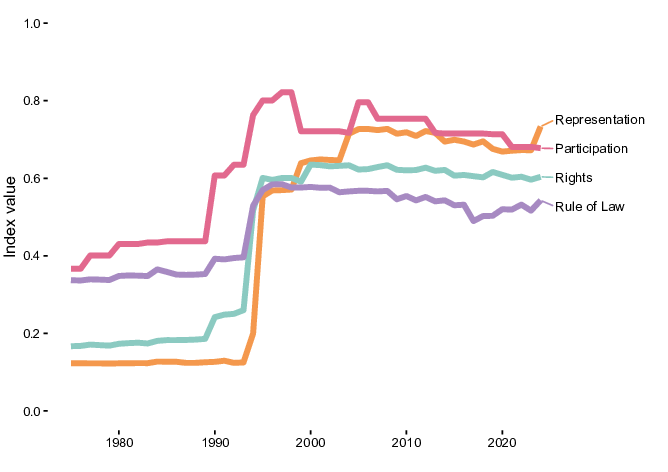
South Korea (2024)
| Representation | Rights | Rule of Law | Participation | |
|---|---|---|---|---|
| Ranking | 38 | 28 | 41 | 31 |
| GSoD Indices score | 0.748 | 0.736 | 0.614 | 0.707 |
Factor scores in 2024
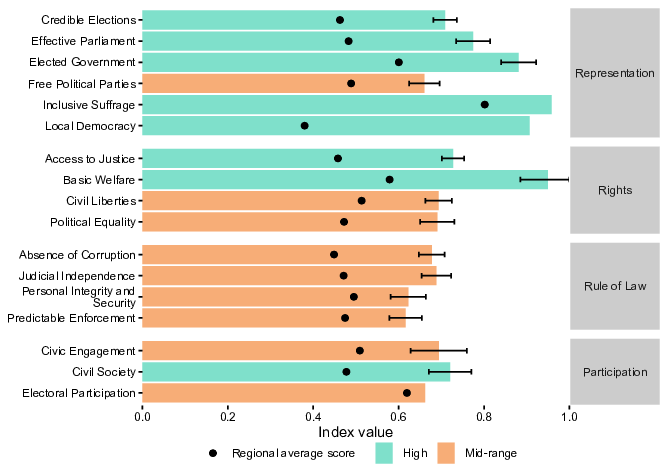
Category trends
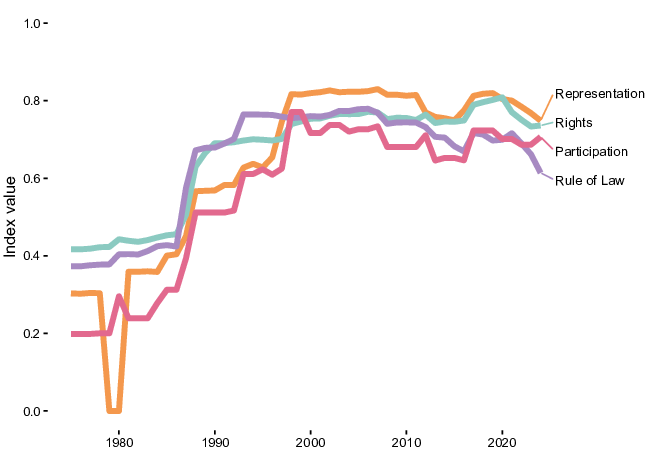
South Sudan (2024)
| Representation | Rights | Rule of Law | Participation | |
|---|---|---|---|---|
| Ranking | 151 | 165 | 164 | 161 |
| GSoD Indices score | 0 | 0.195 | 0.136 | 0.232 |
Factor scores in 2024
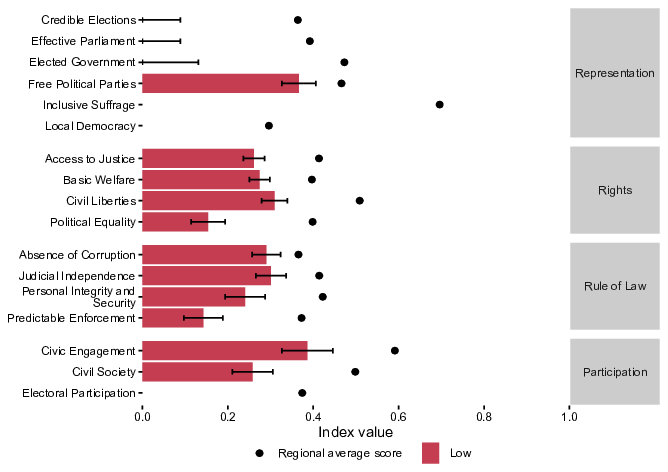
Category trends
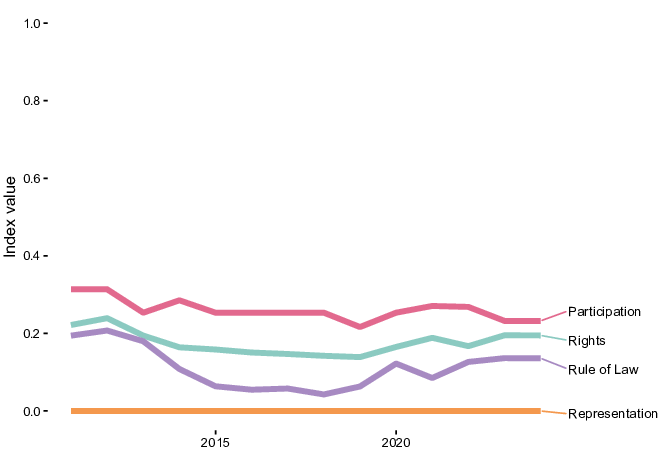
Spain (2024)
| Representation | Rights | Rule of Law | Participation | |
|---|---|---|---|---|
| Ranking | 22 | 11 | 24 | 31 |
| GSoD Indices score | 0.813 | 0.844 | 0.713 | 0.707 |
Factor scores in 2024
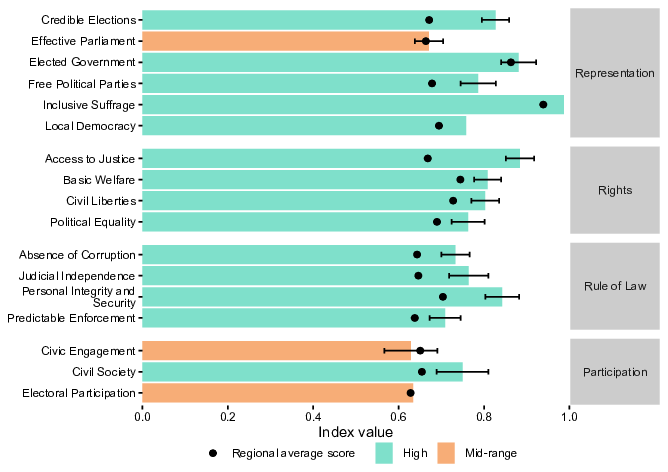
Category trends
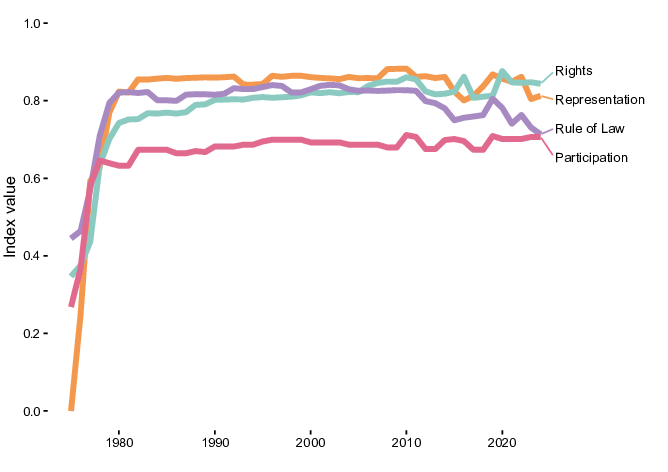
Sri Lanka (2024)
| Representation | Rights | Rule of Law | Participation | |
|---|---|---|---|---|
| Ranking | 58 | 88 | 60 | 51 |
| GSoD Indices score | 0.655 | 0.476 | 0.526 | 0.643 |
Factor scores in 2024
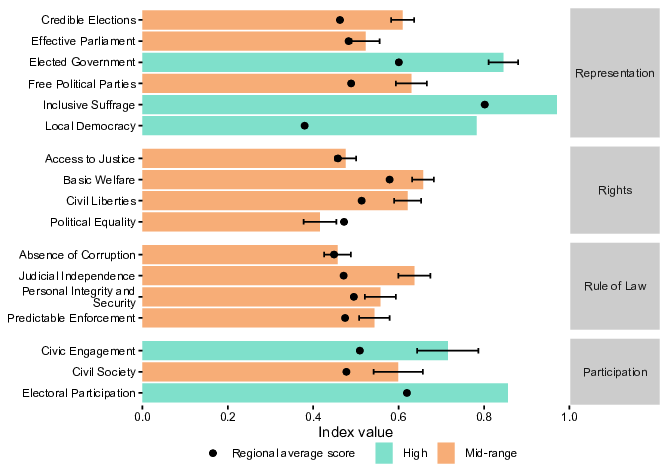
Category trends
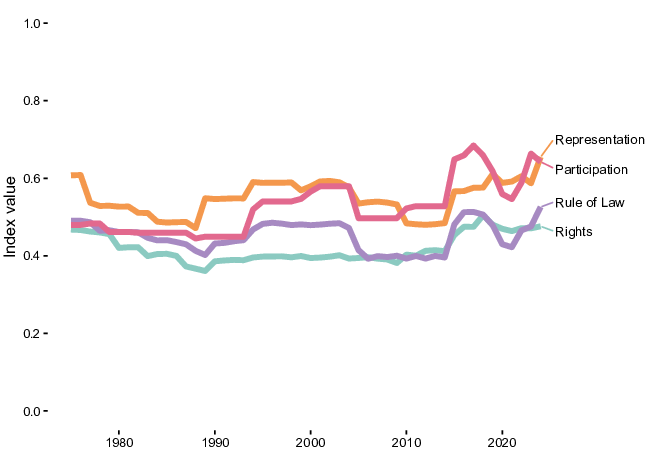
Sudan (2024)
| Representation | Rights | Rule of Law | Participation | |
|---|---|---|---|---|
| Ranking | 151 | 159 | 163 | 136 |
| GSoD Indices score | 0 | 0.225 | 0.142 | 0.395 |
Factor scores in 2024
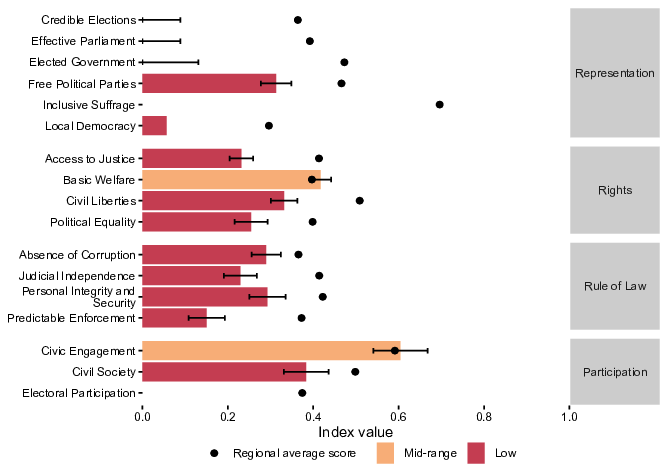
Category trends
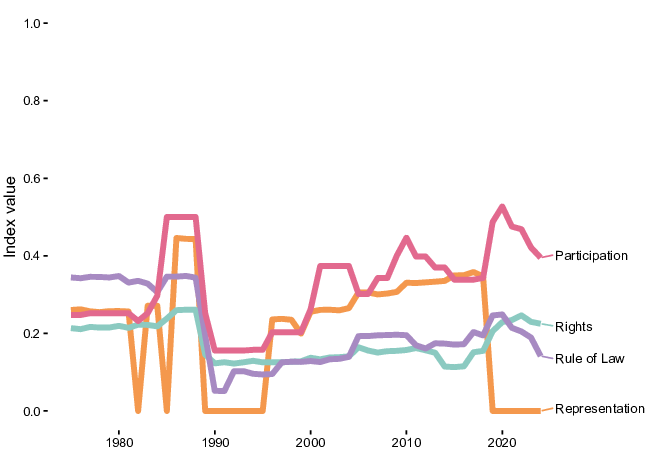
Suriname (2024)
| Representation | Rights | Rule of Law | Participation | |
|---|---|---|---|---|
| Ranking | 51 | 47 | 63 | 29 |
| GSoD Indices score | 0.674 | 0.612 | 0.517 | 0.711 |
Factor scores in 2024
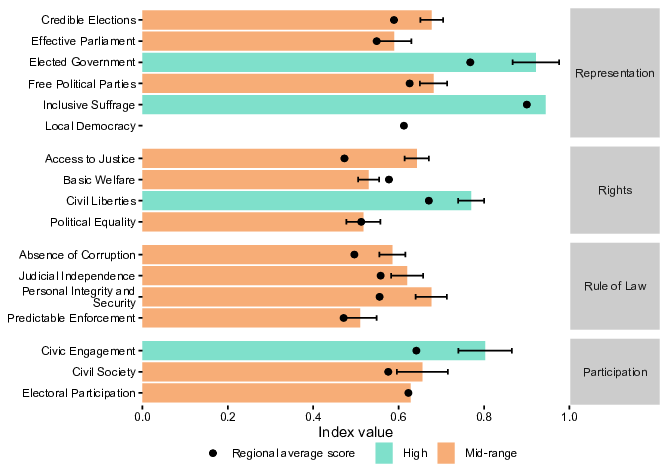
Category trends
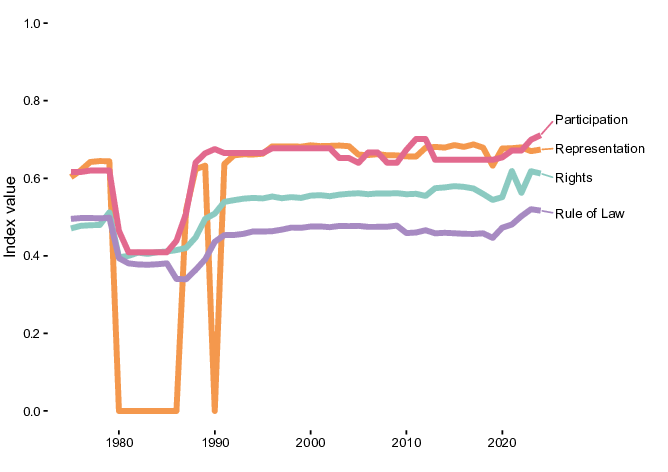
Sweden (2024)
| Representation | Rights | Rule of Law | Participation | |
|---|---|---|---|---|
| Ranking | 6 | 10 | 11 | 10 |
| GSoD Indices score | 0.867 | 0.849 | 0.845 | 0.843 |
Factor scores in 2024
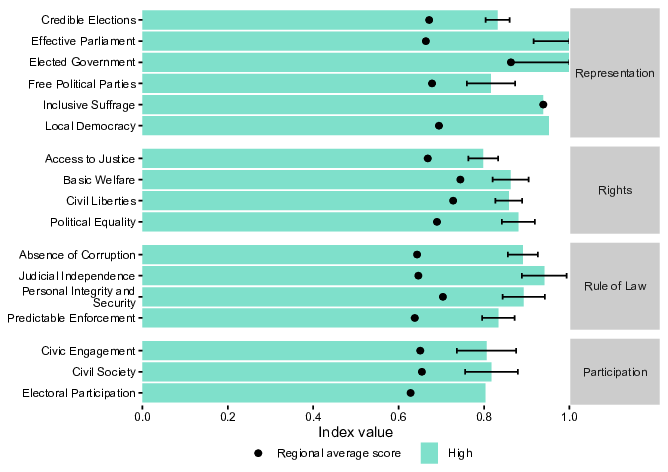
Category trends
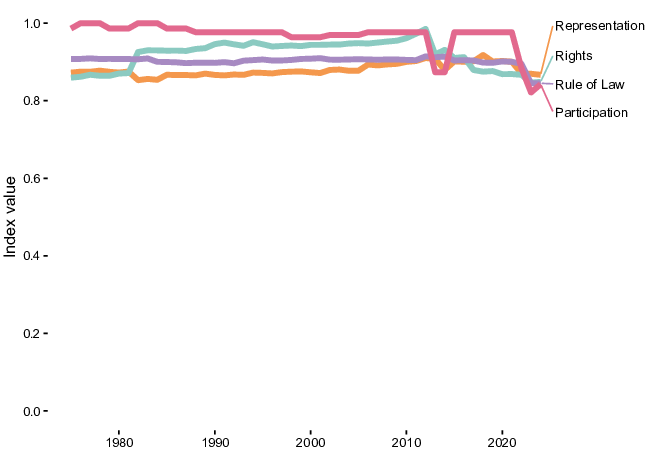
Switzerland (2024)
| Representation | Rights | Rule of Law | Participation | |
|---|---|---|---|---|
| Ranking | 23 | 2 | 3 | 3 |
| GSoD Indices score | 0.809 | 0.938 | 0.893 | 0.939 |
Factor scores in 2024
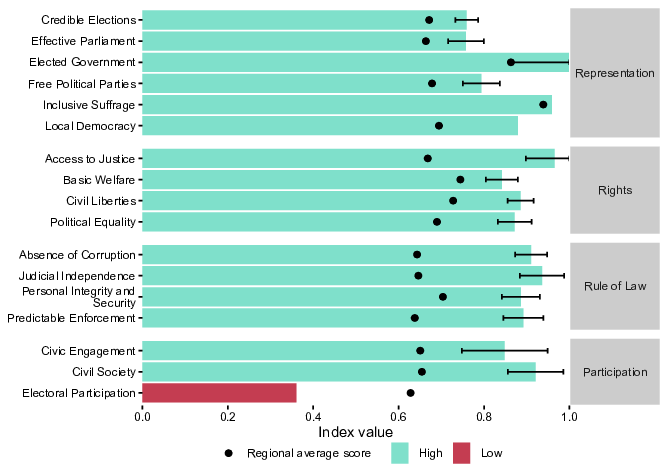
Category trends
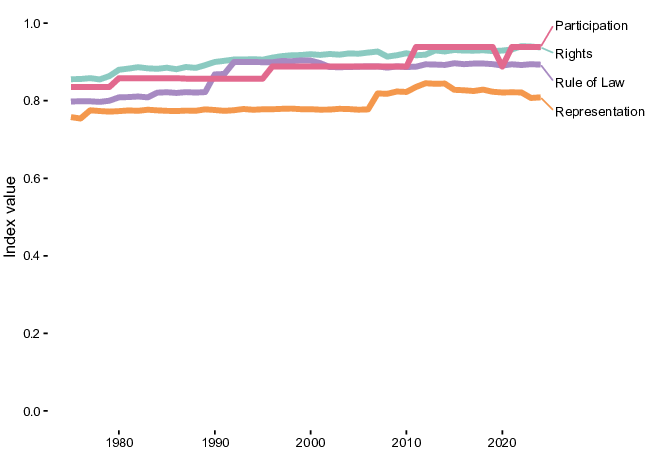
Syria (2024)
| Representation | Rights | Rule of Law | Participation | |
|---|---|---|---|---|
| Ranking | 151 | 172 | 165 | 168 |
| GSoD Indices score | 0 | 0.124 | 0.134 | 0.174 |
Factor scores in 2024
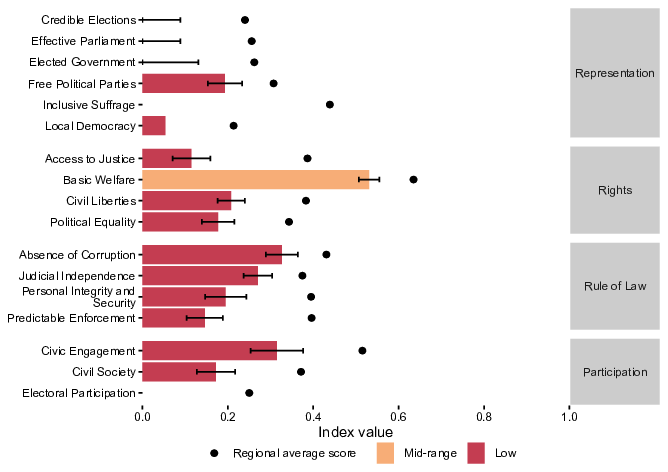
Category trends
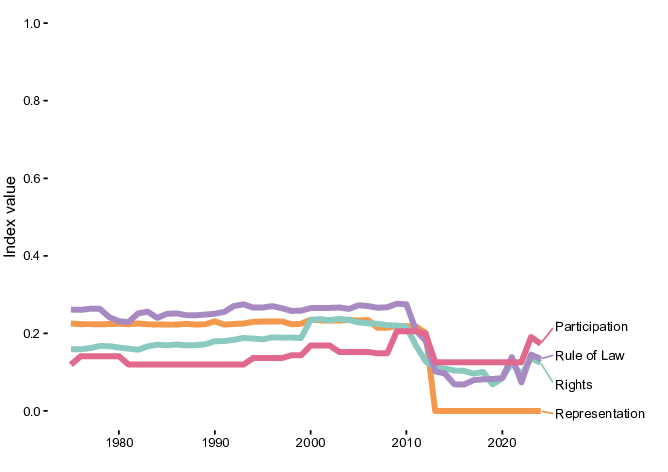
Taiwan (2024)
| Representation | Rights | Rule of Law | Participation | |
|---|---|---|---|---|
| Ranking | 18 | 24 | 18 | 8 |
| GSoD Indices score | 0.825 | 0.78 | 0.762 | 0.861 |
Factor scores in 2024
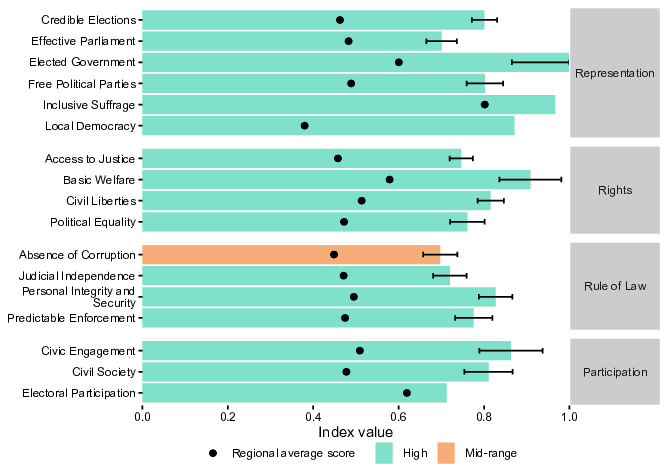
Category trends
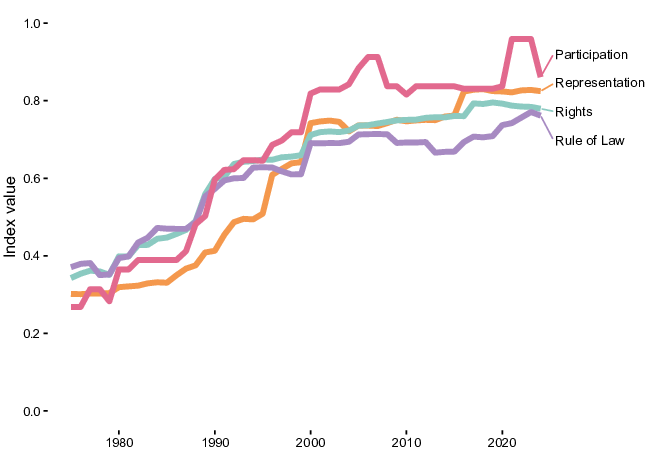
Tajikistan (2024)
| Representation | Rights | Rule of Law | Participation | |
|---|---|---|---|---|
| Ranking | 145 | 171 | 157 | 163 |
| GSoD Indices score | 0.252 | 0.131 | 0.188 | 0.228 |
Factor scores in 2024
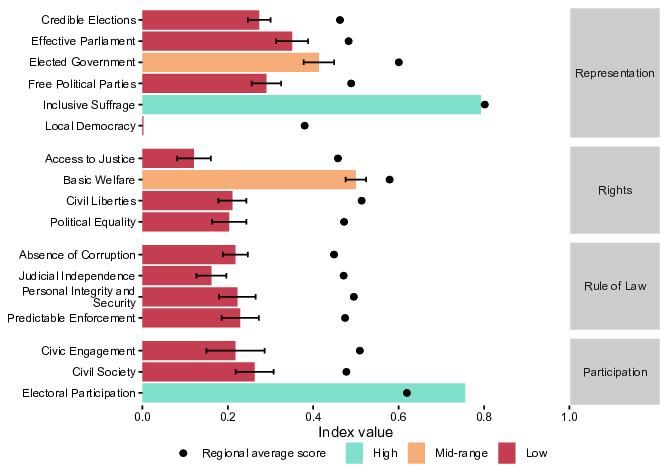
Category trends
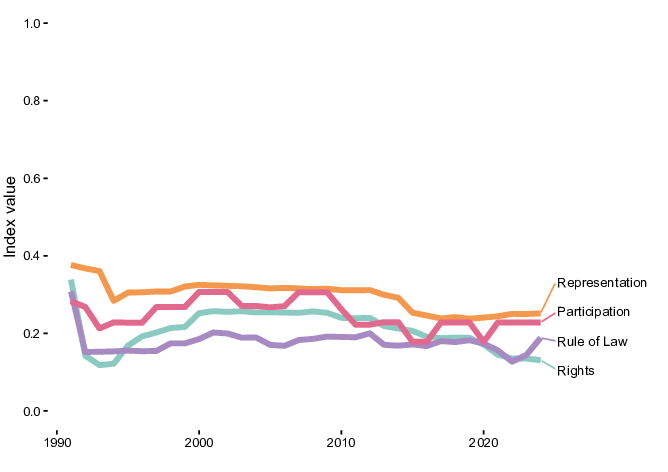
Tanzania (2024)
| Representation | Rights | Rule of Law | Participation | |
|---|---|---|---|---|
| Ranking | 103 | 83 | 53 | 100 |
| GSoD Indices score | 0.446 | 0.493 | 0.547 | 0.509 |
Factor scores in 2024
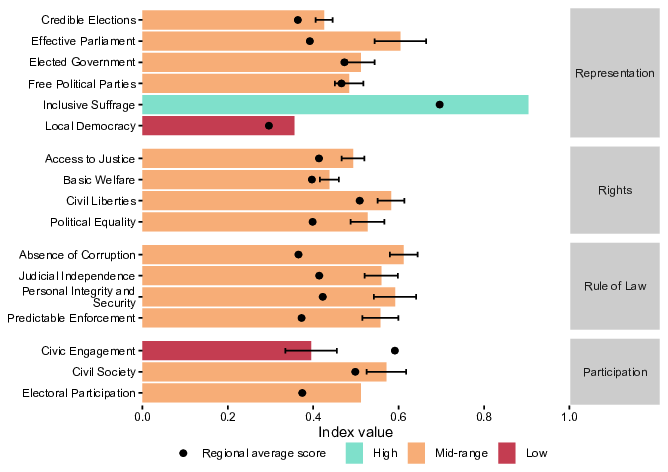
Category trends
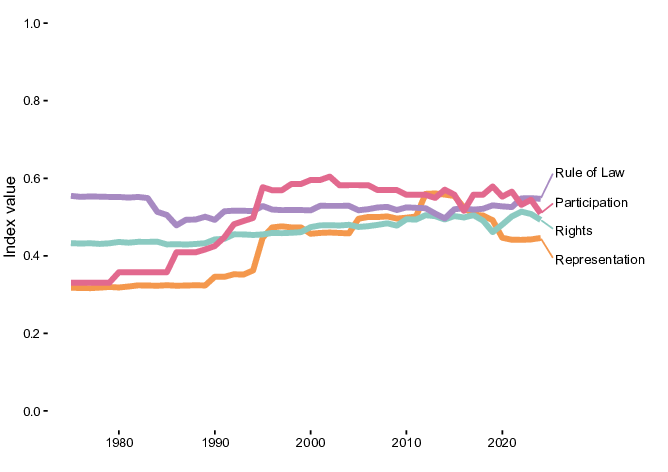
Thailand (2024)
| Representation | Rights | Rule of Law | Participation | |
|---|---|---|---|---|
| Ranking | 110 | 113 | 123 | 106 |
| GSoD Indices score | 0.415 | 0.4 | 0.348 | 0.493 |
Factor scores in 2024
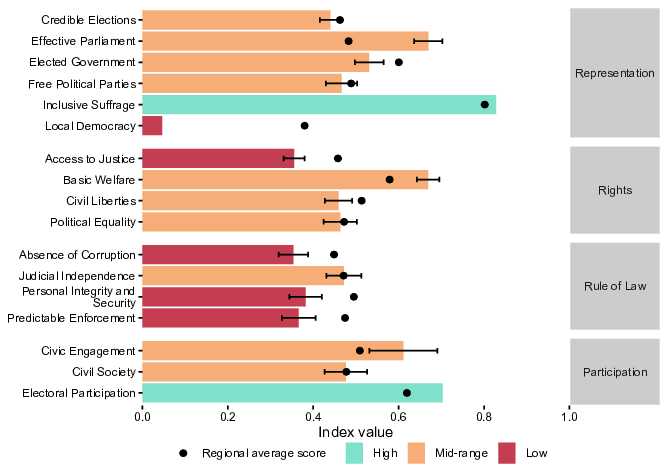
Category trends
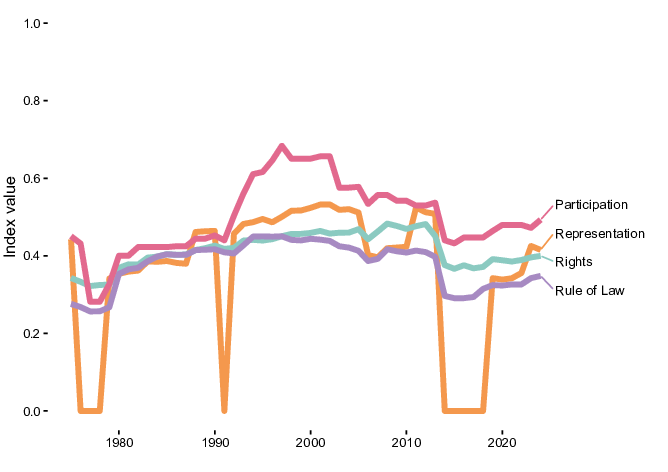
Timor-Leste (2024)
| Representation | Rights | Rule of Law | Participation | |
|---|---|---|---|---|
| Ranking | 52 | 94 | 66 | 70 |
| GSoD Indices score | 0.671 | 0.465 | 0.508 | 0.584 |
Factor scores in 2024
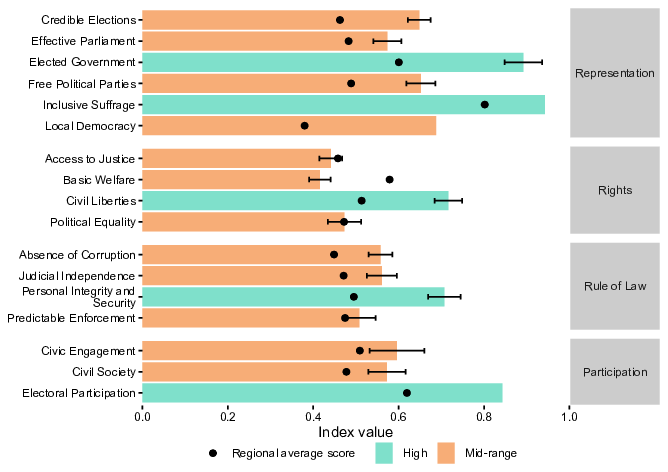
Category trends
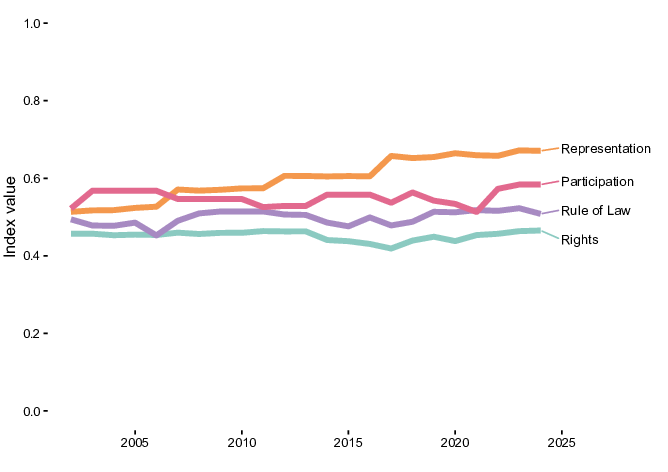
Togo (2024)
| Representation | Rights | Rule of Law | Participation | |
|---|---|---|---|---|
| Ranking | 111 | 129 | 122 | 77 |
| GSoD Indices score | 0.408 | 0.346 | 0.351 | 0.568 |
Factor scores in 2024
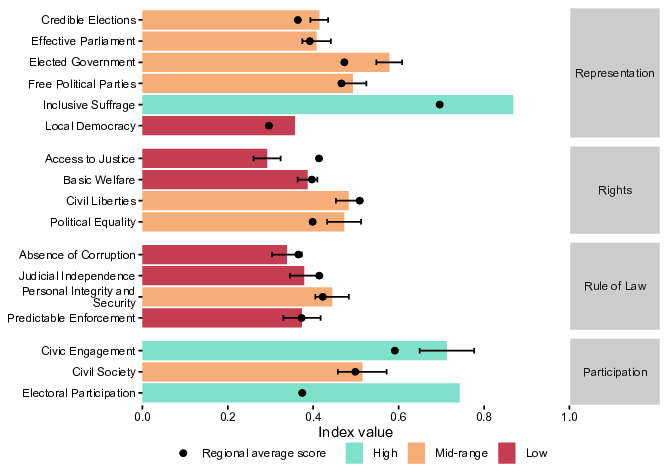
Category trends
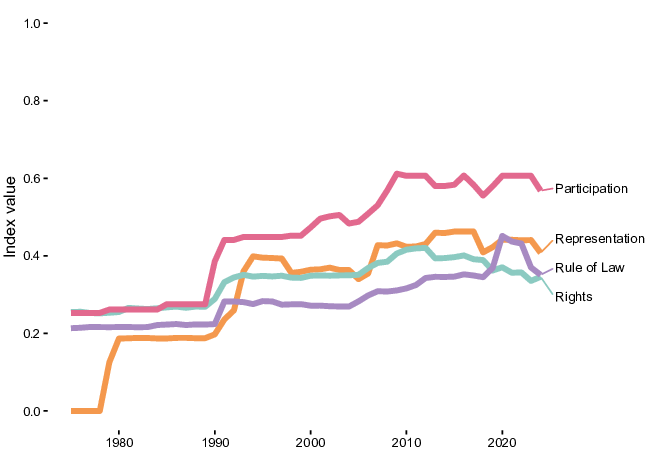
Trinidad and Tobago (2024)
| Representation | Rights | Rule of Law | Participation | |
|---|---|---|---|---|
| Ranking | 42 | 42 | 44 | 18 |
| GSoD Indices score | 0.737 | 0.633 | 0.579 | 0.756 |
Factor scores in 2024
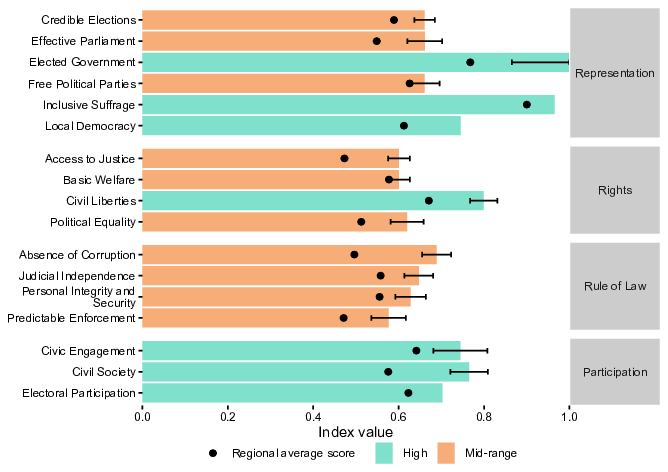
Category trends
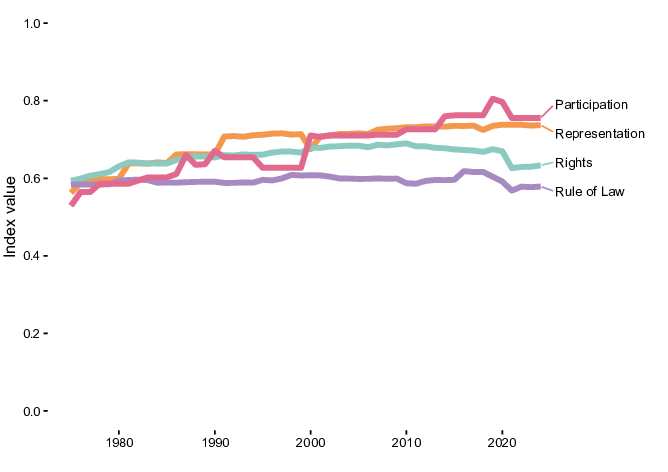
Tunisia (2024)
| Representation | Rights | Rule of Law | Participation | |
|---|---|---|---|---|
| Ranking | 112 | 54 | 98 | 103 |
| GSoD Indices score | 0.405 | 0.585 | 0.417 | 0.497 |
Factor scores in 2024
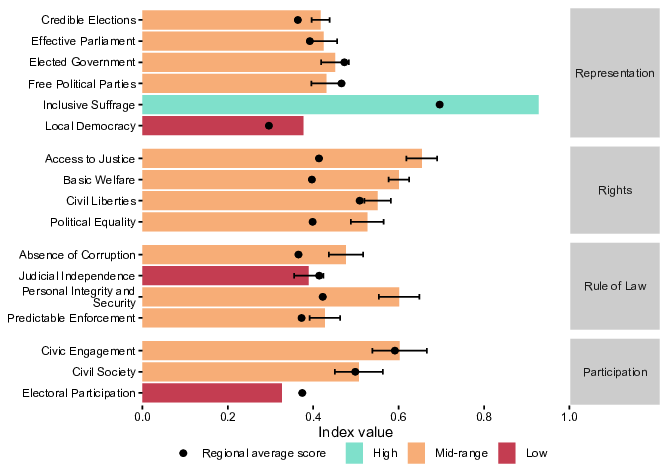
Category trends
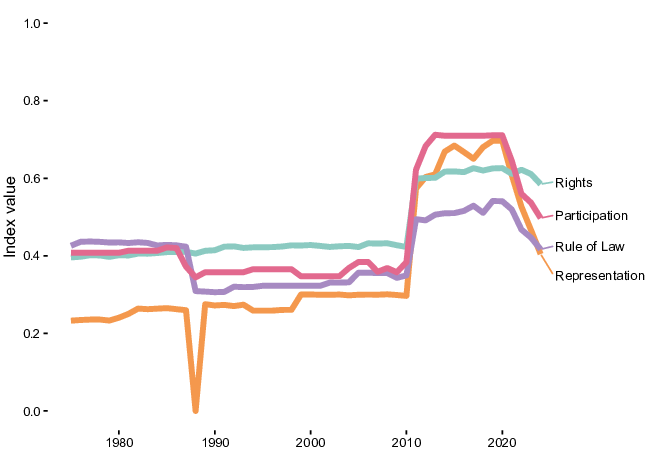
Türkiye (2024)
| Representation | Rights | Rule of Law | Participation | |
|---|---|---|---|---|
| Ranking | 104 | 135 | 143 | 140 |
| GSoD Indices score | 0.444 | 0.32 | 0.264 | 0.375 |
Factor scores in 2024
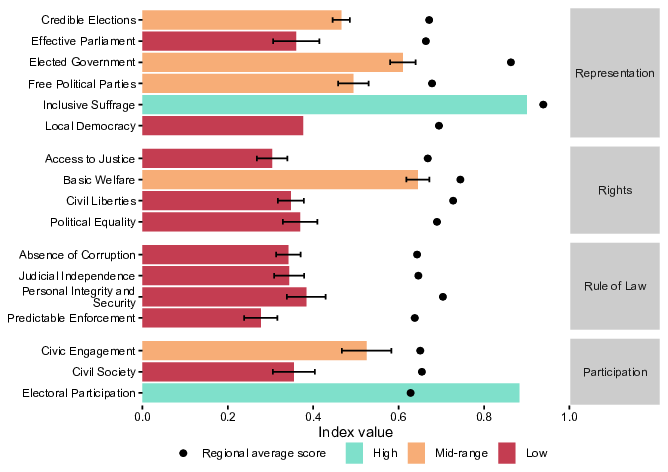
Category trends
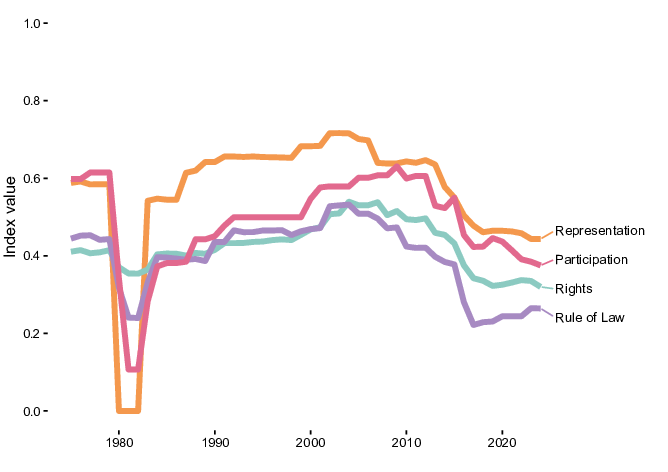
Turkmenistan (2024)
| Representation | Rights | Rule of Law | Participation | |
|---|---|---|---|---|
| Ranking | 149 | 164 | 160 | 171 |
| GSoD Indices score | 0.219 | 0.203 | 0.153 | 0.061 |
Factor scores in 2024
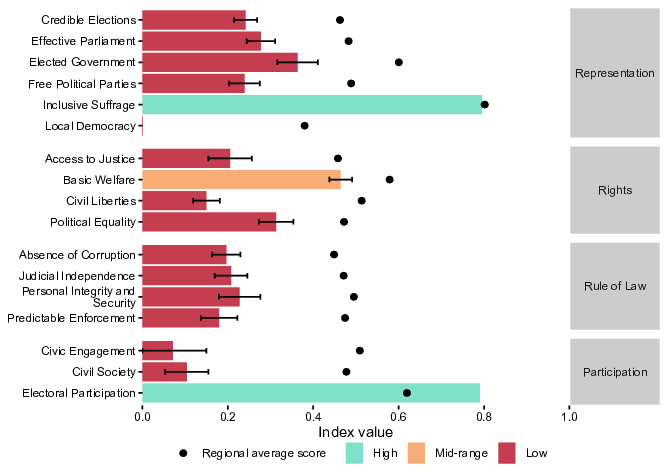
Category trends
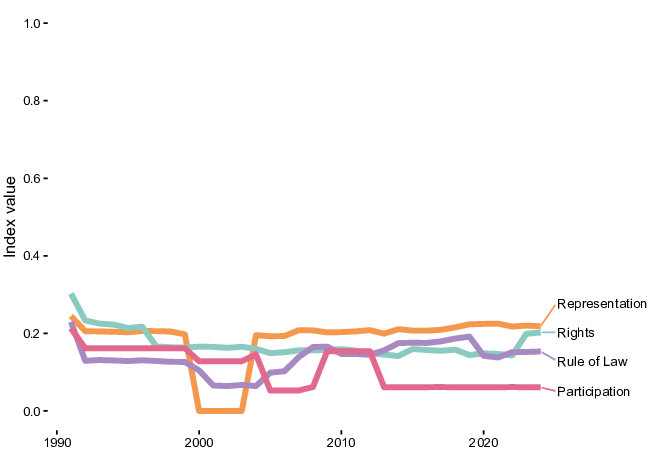
Uganda (2024)
| Representation | Rights | Rule of Law | Participation | |
|---|---|---|---|---|
| Ranking | 117 | 124 | 107 | 113 |
| GSoD Indices score | 0.374 | 0.359 | 0.387 | 0.476 |
Factor scores in 2024
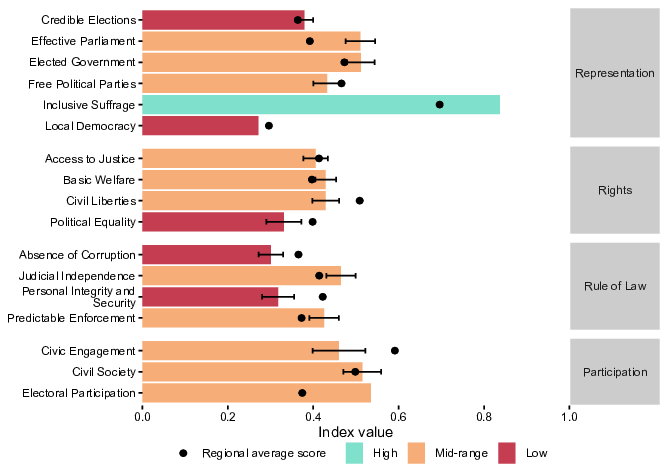
Category trends
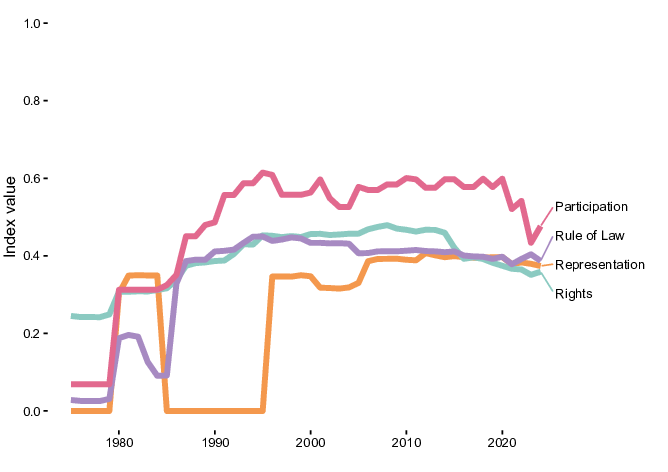
Ukraine (2024)
| Representation | Rights | Rule of Law | Participation | |
|---|---|---|---|---|
| Ranking | 92 | 89 | 114 | 56 |
| GSoD Indices score | 0.517 | 0.474 | 0.378 | 0.628 |
Factor scores in 2024
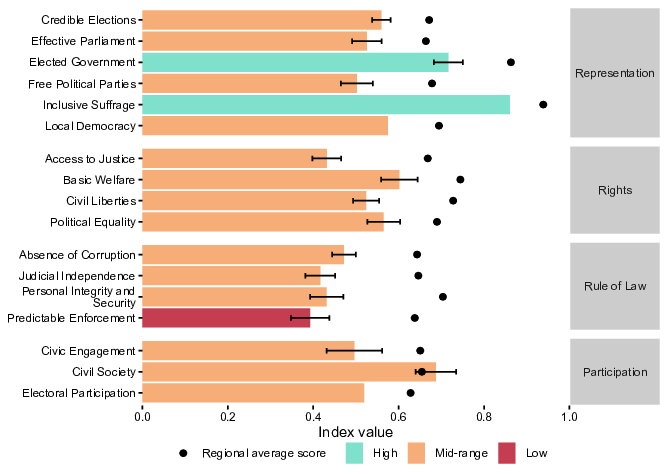
Category trends
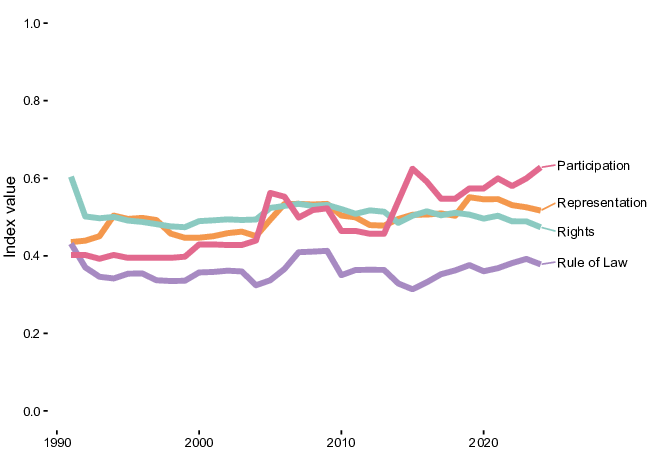
United Arab Emirates (2024)
| Representation | Rights | Rule of Law | Participation | |
|---|---|---|---|---|
| Ranking | 151 | 121 | 44 | 152 |
| GSoD Indices score | 0 | 0.371 | 0.579 | 0.296 |
Factor scores in 2024
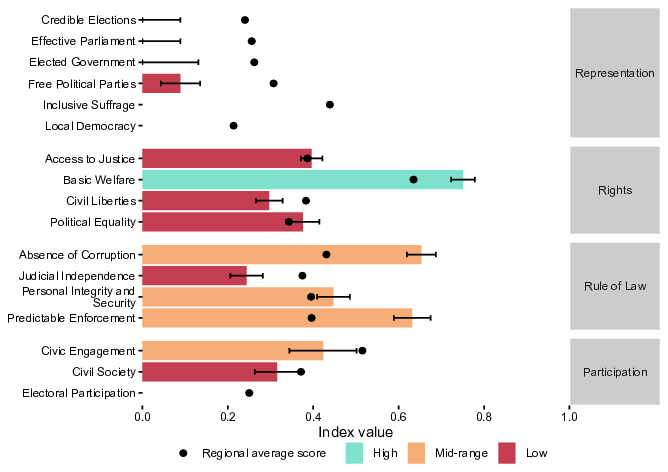
Category trends
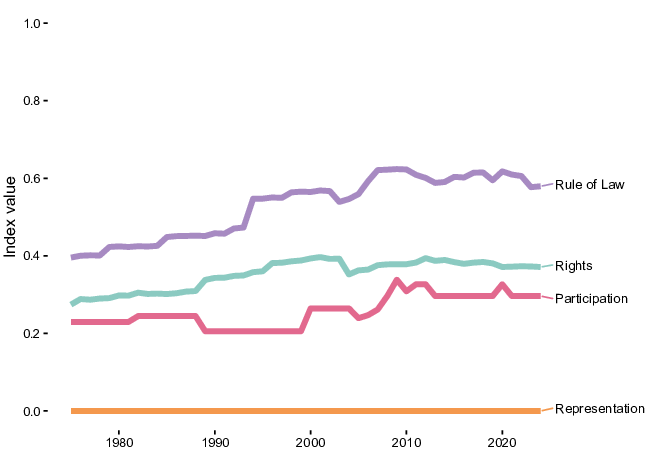
United Kingdom (2024)
| Representation | Rights | Rule of Law | Participation | |
|---|---|---|---|---|
| Ranking | 15 | 38 | 21 | 28 |
| GSoD Indices score | 0.831 | 0.665 | 0.743 | 0.712 |
Factor scores in 2024
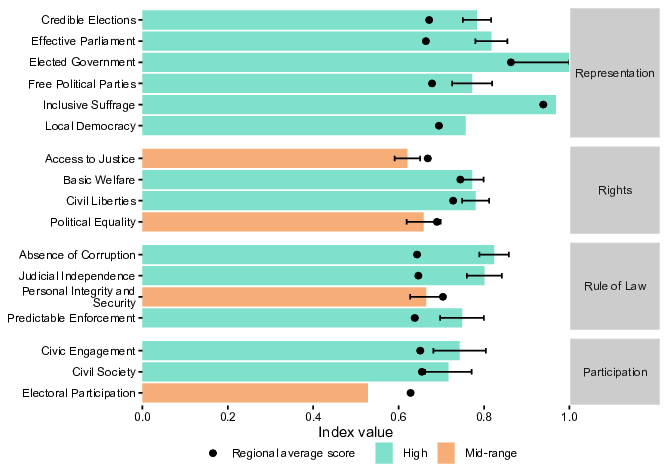
Category trends
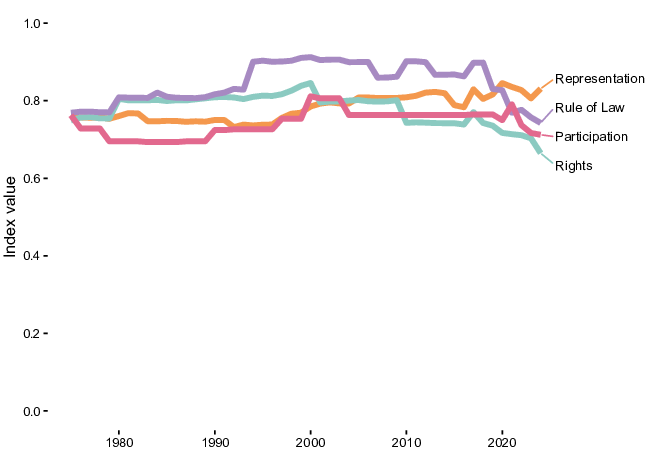
United States (2024)
| Representation | Rights | Rule of Law | Participation | |
|---|---|---|---|---|
| Ranking | 35 | 32 | 26 | 6 |
| GSoD Indices score | 0.758 | 0.715 | 0.687 | 0.864 |
Factor scores in 2024
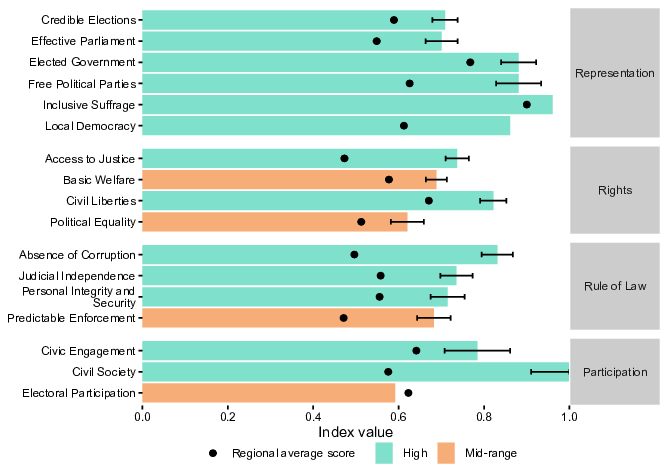
Category trends
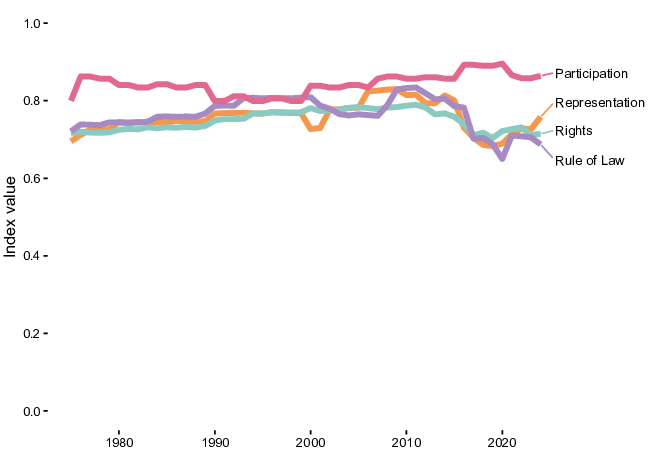
Uruguay (2024)
| Representation | Rights | Rule of Law | Participation | |
|---|---|---|---|---|
| Ranking | 20 | 30 | 29 | 4 |
| GSoD Indices score | 0.814 | 0.731 | 0.675 | 0.9 |
Factor scores in 2024
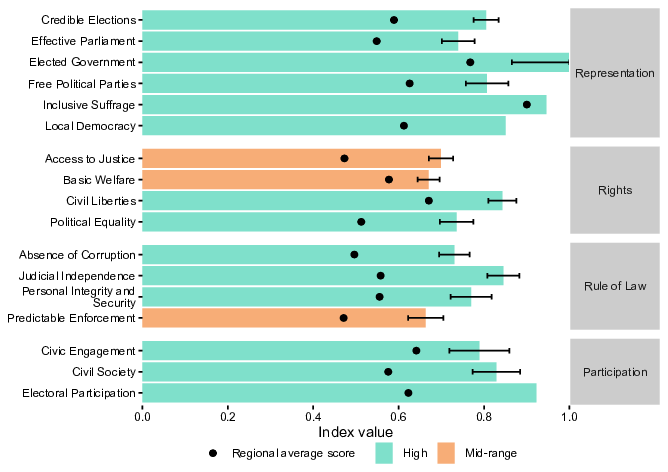
Category trends
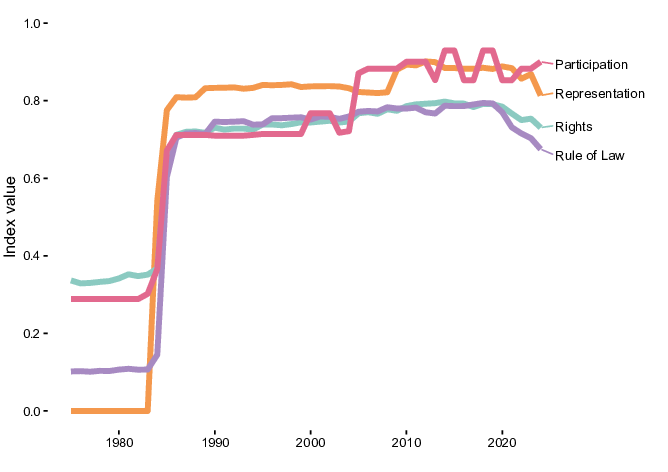
Uzbekistan (2024)
| Representation | Rights | Rule of Law | Participation | |
|---|---|---|---|---|
| Ranking | 136 | 132 | 117 | 147 |
| GSoD Indices score | 0.286 | 0.341 | 0.372 | 0.322 |
Factor scores in 2024
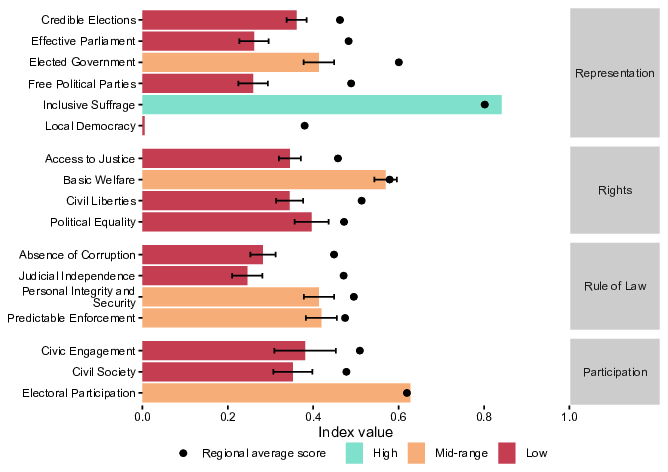
Category trends
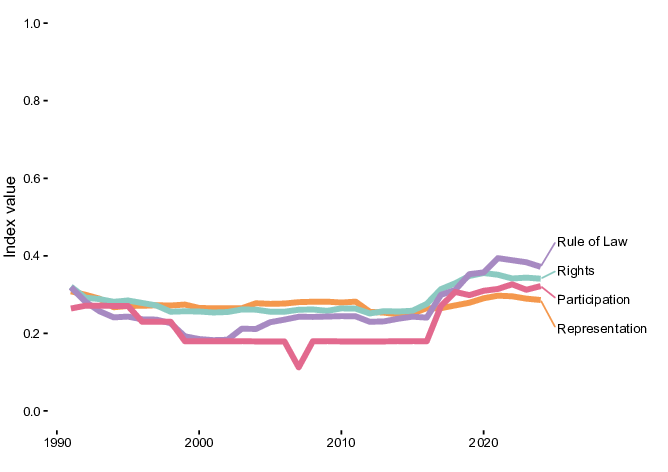
Vanuatu (2024)
| Representation | Rights | Rule of Law | Participation | |
|---|---|---|---|---|
| Ranking | 46 | 26 | 47 | 52 |
| GSoD Indices score | 0.718 | 0.749 | 0.575 | 0.641 |
Factor scores in 2024
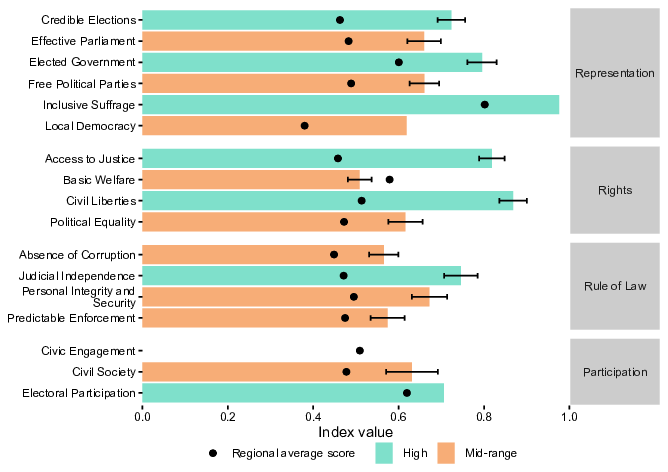
Category trends
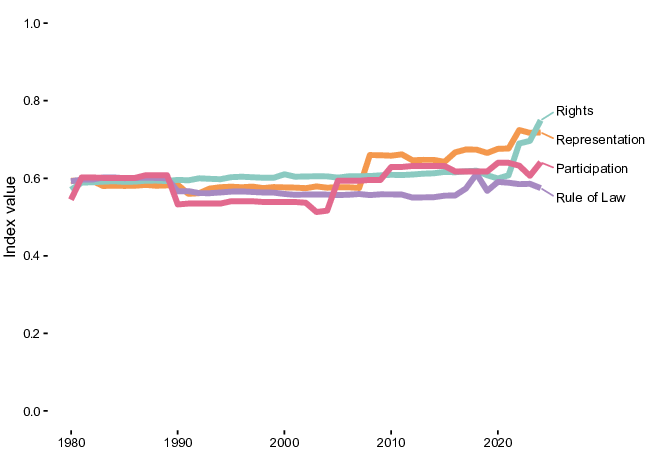
Venezuela (2024)
| Representation | Rights | Rule of Law | Participation | |
|---|---|---|---|---|
| Ranking | 148 | 154 | 173 | 149 |
| GSoD Indices score | 0.226 | 0.25 | 0.035 | 0.311 |
Factor scores in 2024
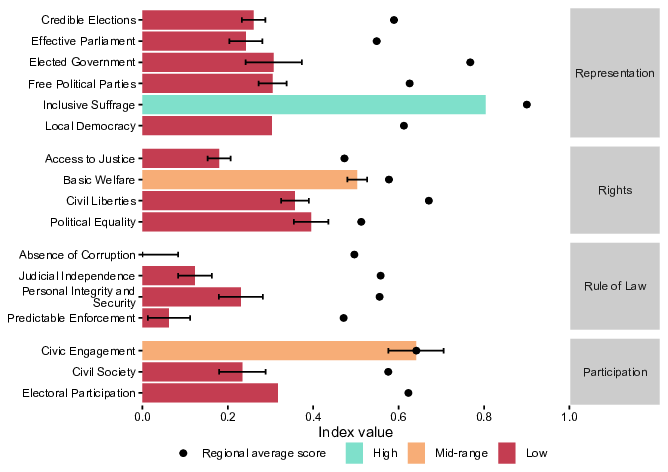
Category trends
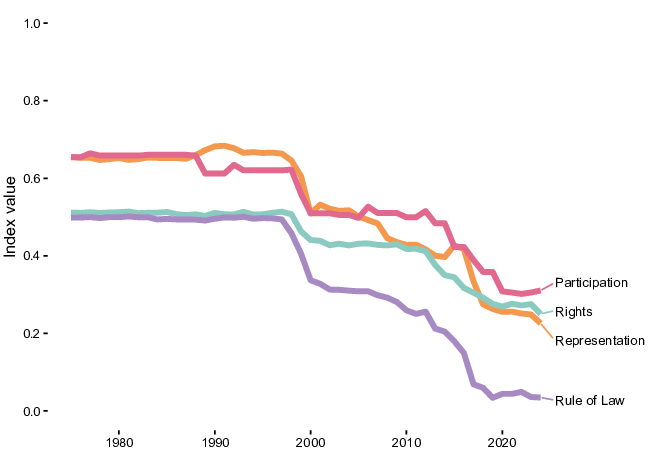
Vietnam (2024)
| Representation | Rights | Rule of Law | Participation | |
|---|---|---|---|---|
| Ranking | 133 | 120 | 109 | 122 |
| GSoD Indices score | 0.308 | 0.377 | 0.385 | 0.452 |
Factor scores in 2024
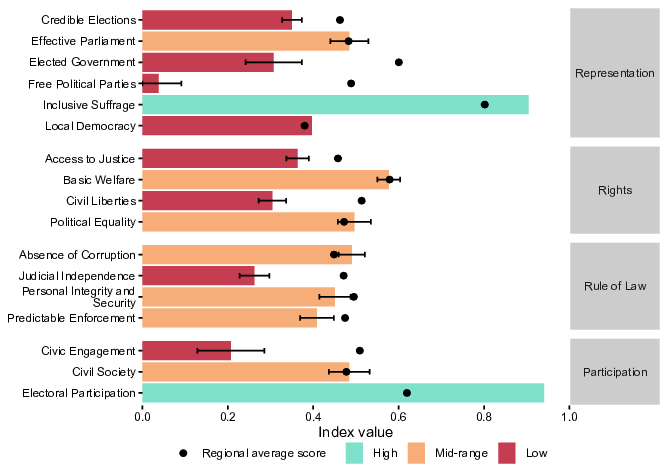
Category trends
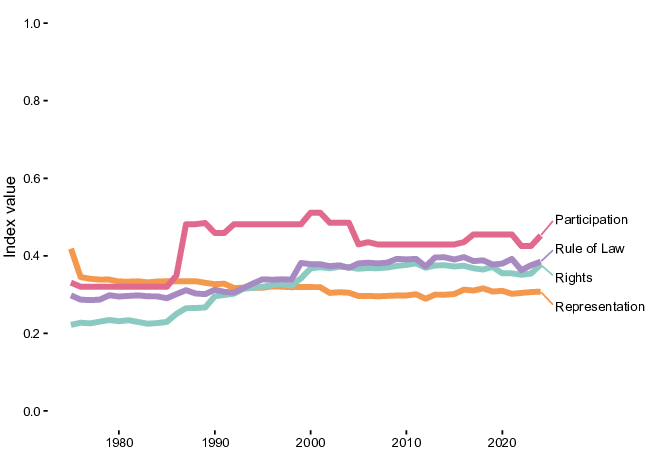
Yemen (2024)
| Representation | Rights | Rule of Law | Participation | |
|---|---|---|---|---|
| Ranking | 151 | 168 | 171 | 155 |
| GSoD Indices score | 0 | 0.146 | 0.088 | 0.283 |
Factor scores in 2024
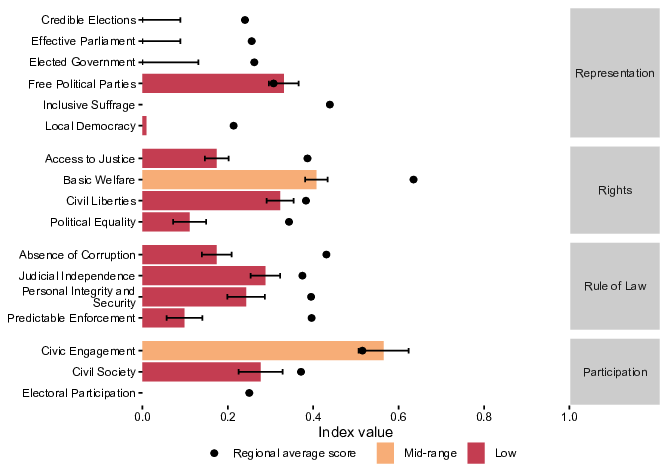
Category trends
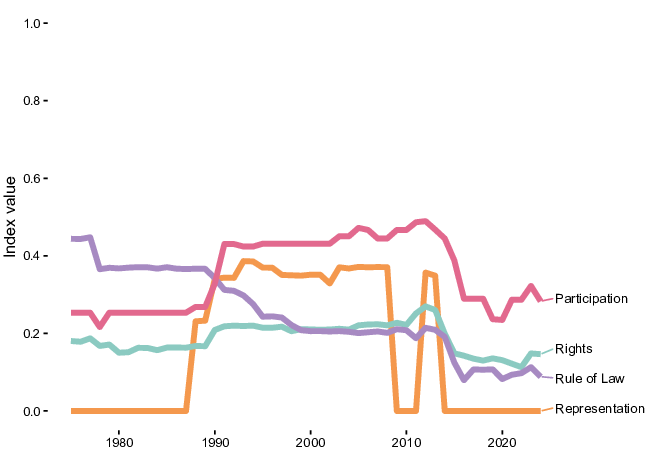
Zambia (2024)
| Representation | Rights | Rule of Law | Participation | |
|---|---|---|---|---|
| Ranking | 81 | 100 | 82 | 45 |
| GSoD Indices score | 0.555 | 0.448 | 0.47 | 0.672 |
Factor scores in 2024
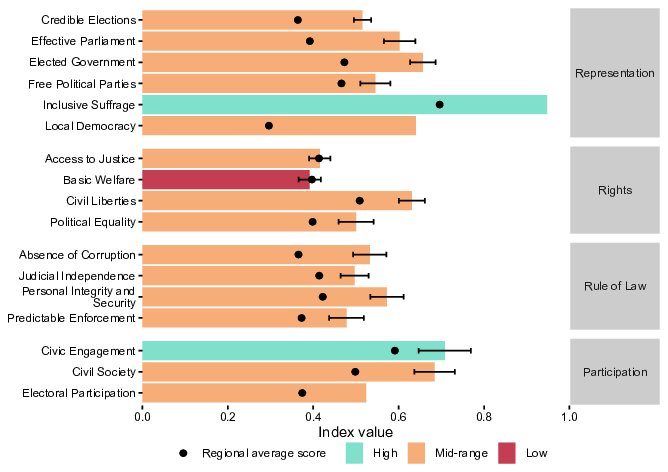
Category trends
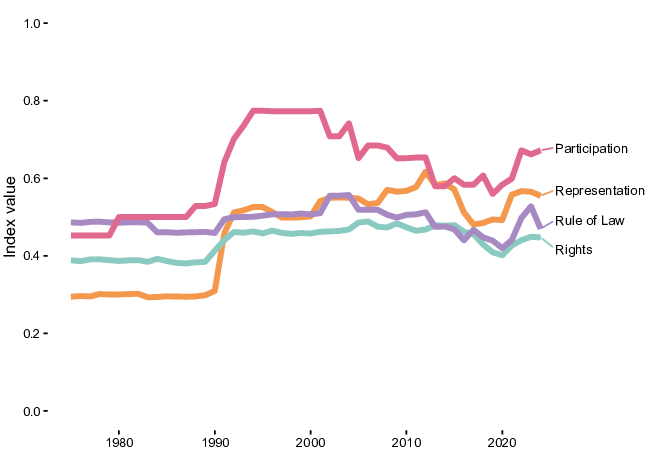
Zimbabwe (2024)
| Representation | Rights | Rule of Law | Participation | |
|---|---|---|---|---|
| Ranking | 116 | 118 | 147 | 111 |
| GSoD Indices score | 0.385 | 0.383 | 0.243 | 0.478 |
Factor scores in 2024
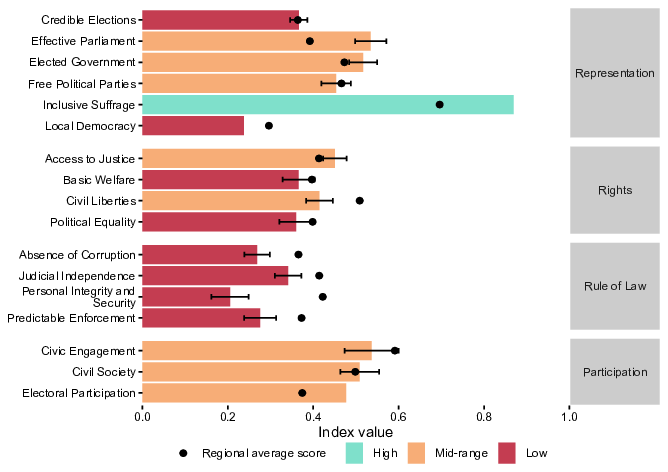
Category trends
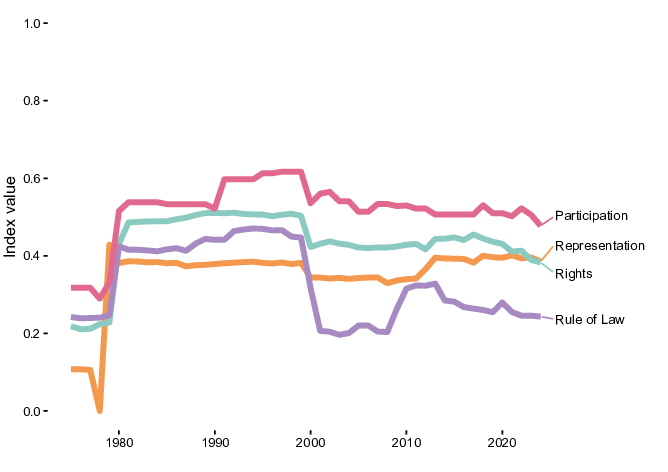
- The data covered 173 countries in 2024, but the number was lower in years before the mid-1990s. The only country to be dropped from the data set is the German Democratic Republic, which was covered from 1975 to 1990.
- Countries are organized into four broad regions: Africa and West Asia, the Americas, Asia and the Pacific, and Europe. Each of these regions is further divided into subregions. These divisions are used to facilitate analysis; they do not reflect political opinions or positions of International IDEA.
- International IDEA’s GSoD Indices use ‘Palestine’ as a reporting unit for consistency across datasets; references herein follow that convention. This does not imply a position on legal status. Indices data on Palestine is limited to the West Bank.
- People migrate for various reasons: refugees and asylum-seekers may be fleeing conflict, persecution or climate emergencies; migrant workers may be in search of greater economic opportunity; students may emigrate for opportunities to take particular courses of study; and still others may move to be closer to family. The International Organization for Migration defines ‘migrant’ as ‘an umbrella term, not defined under international law, reflecting the common lay understanding of a person who moves away from his or her place of usual residence, whether within a country or across an international border, temporarily or permanently, and for a variety of reasons’ (IOM n.d.c).
- Besides the distinction between original and naturalized citizens, there is also a significant population of stateless people known as Bidoon in the Gulf. This group is particularly large in Kuwait (Bjorklund 2020).
- Naturalized citizens in Kuwait have long faced structural limitations, including a 20-year waiting period before gaining voting rights and exclusion from running for parliament (ACE Electoral Knowledge Network n.d.b).
- Between 1993 and 2020, over 38,000 women had been naturalized through marriage (Arab Times Kuwait 2024).
- J.G.G. v Trump, No. 25-766 (JEB) (D DC, 16 April 2025), <https://www.courthousenews.com/wp-content/uploads/2025/04/boasberg-probable-cause-contempt-venezuelan-deporations-opinion.pdf>, accessed 30 July 2025.
- Kovačević v Bosnia and Herzegovina, App no. 43651/22 (ECtHR, 29 August 2023), <https://hudoc.echr.coe.int/?i=001-226386>, accessed 31 May 2025.
- Most of the data that we use in this report are migrant stock data, which counts all forms of international migration (including refugees and asylum seekers) without differentiation (UNDESA 2025). Moreover, stock data are not intended to inform us about the flow of migrants.
- International IDEA consulted Kreshnik Spahiu, Director of the Information Technology Department at the CEC, and Lirik Krasniqi, acting Director of the Division for Voter Services.
- International IDEA consulted Albert Krasniqi, Director of Programs at Democracy Plus.
- Email communication 28 May 2025.
Abbreviations
| CEC | Central Electoral Commission, Kosovo |
|---|---|
| CSO | Civil society organization |
| EMB | Electoral management body |
| GSoD | Global State of Democracy |
| OCV | Out-of-country voting |
| UNDESA | United Nations Department of Economic and Social Affairs |
© 2025 International Institute for Democracy and Electoral Assistance
International IDEA publications are independent of specific national or political interests. Views expressed in this publication do not necessarily represent the views of International IDEA, its Board or its Council members.
The country names shown in this publication do not imply official endorsement or acceptance by International IDEA or its Member States.
Design and layout: International IDEA
Cover image: Diella Valla, original artwork for the Global State of Democracy 2025 report. Images for Box 4.2 are AI generated.
DOI: <https://doi.org/10.31752/idea.2025.53>
ISBN: 978-91-7671-988-6 (HTML)
ISBN: 978-91-7671-987-9 (PDF)
ISBN: 978-91-7671-986-2 (Print)